Frequent persons on Poland's street signs
countries
1012 names / 38873 streets
Tadeusz Kościuszko
 1102
Andrzej Tadeusz Bonawentura Kościuszko was a Polish military engineer, statesman, and military leader who then became a national hero in Poland, the United States, and Belarus. He fought in the...
1102
Andrzej Tadeusz Bonawentura Kościuszko was a Polish military engineer, statesman, and military leader who then became a national hero in Poland, the United States, and Belarus. He fought in the...
Adam Mickiewicz
 1086
Adam Bernard Mickiewicz was a Polish poet, dramatist, essayist, publicist, translator and political activist. He is regarded as national poet in Poland, Lithuania and Belarus. He also largely...
1086
Adam Bernard Mickiewicz was a Polish poet, dramatist, essayist, publicist, translator and political activist. He is regarded as national poet in Poland, Lithuania and Belarus. He also largely...
Henryk Sienkiewicz
 833
Henryk Adam Aleksander Pius Sienkiewicz, also known by the pseudonym Litwos, was an epic Polish writer. He is remembered for his historical novels, such as the Trilogy series and especially for his...
833
Henryk Adam Aleksander Pius Sienkiewicz, also known by the pseudonym Litwos, was an epic Polish writer. He is remembered for his historical novels, such as the Trilogy series and especially for his...
Juliusz Słowacki
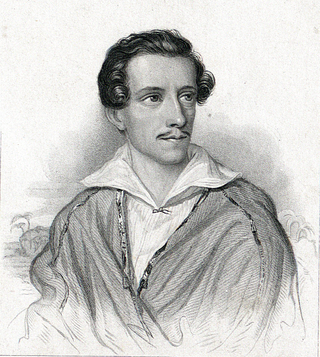 789
Juliusz Słowacki was a Polish Romantic poet. He is considered one of the "Three Bards" of Polish literature — a major figure in the Polish Romantic period, and the father of modern Polish drama. His...
789
Juliusz Słowacki was a Polish Romantic poet. He is considered one of the "Three Bards" of Polish literature — a major figure in the Polish Romantic period, and the father of modern Polish drama. His...
Maria Konopnicka
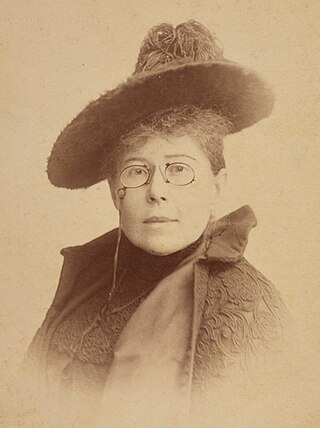 747
Maria Konopnicka was a Polish poet, novelist, children's writer, translator, journalist, critic, and activist for women's rights and for Polish independence. She used pseudonyms, including Jan Sawa....
747
Maria Konopnicka was a Polish poet, novelist, children's writer, translator, journalist, critic, and activist for women's rights and for Polish independence. She used pseudonyms, including Jan Sawa....
Pope John Paul II
 695
Pope John Paul II was head of the Catholic Church and sovereign of the Vatican City State from 1978 until his death in 2005.
695
Pope John Paul II was head of the Catholic Church and sovereign of the Vatican City State from 1978 until his death in 2005.
Nicolaus Copernicus
 652
Nicolaus Copernicus was a Renaissance polymath, active as a mathematician, astronomer, and Catholic canon, who formulated a model of the universe that placed the Sun rather than Earth at its center....
652
Nicolaus Copernicus was a Renaissance polymath, active as a mathematician, astronomer, and Catholic canon, who formulated a model of the universe that placed the Sun rather than Earth at its center....
Stefan Żeromski
 580
Stefan Żeromski was a Polish novelist and dramatist belonging to the Young Poland movement at the turn of the 20th century. He was called the "conscience of Polish literature".
580
Stefan Żeromski was a Polish novelist and dramatist belonging to the Young Poland movement at the turn of the 20th century. He was called the "conscience of Polish literature".
Frédéric Chopin
 538
Frédéric François Chopin was a Polish composer and virtuoso pianist of the Romantic period, who wrote primarily for solo piano. He has maintained worldwide renown as a leading musician of his era,...
538
Frédéric François Chopin was a Polish composer and virtuoso pianist of the Romantic period, who wrote primarily for solo piano. He has maintained worldwide renown as a leading musician of his era,...
Bolesław Prus
 531
Aleksander Głowacki, better known by his pen name Bolesław Prus, was a Polish novelist, a leading figure in the history of Polish literature and philosophy, as well as a distinctive voice in world...
531
Aleksander Głowacki, better known by his pen name Bolesław Prus, was a Polish novelist, a leading figure in the history of Polish literature and philosophy, as well as a distinctive voice in world...
Władysław Sikorski
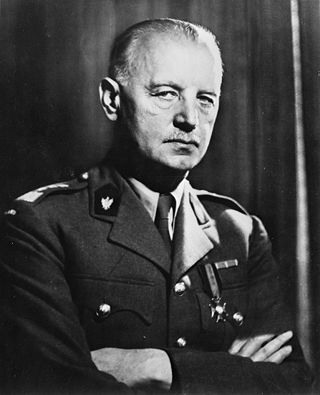 486
Władysław Eugeniusz Sikorski was a Polish military and political leader.
486
Władysław Eugeniusz Sikorski was a Polish military and political leader.
Władysław Reymont
 484
Władysław Stanisław Reymont was a Polish novelist and the laureate of the 1924 Nobel Prize in Literature. His best-known work is the award-winning four-volume novel Chłopi.
484
Władysław Stanisław Reymont was a Polish novelist and the laureate of the 1924 Nobel Prize in Literature. His best-known work is the award-winning four-volume novel Chłopi.
Józef Piłsudski
 472
Józef Klemens Piłsudski[a] was a Polish statesman who served as the Chief of State (1918–1922) and first Marshal of Poland. In the aftermath of World War I, he became an increasingly dominant figure...
472
Józef Klemens Piłsudski[a] was a Polish statesman who served as the Chief of State (1918–1922) and first Marshal of Poland. In the aftermath of World War I, he became an increasingly dominant figure...
Jan Kochanowski
 472
Jan Kochanowski was a Polish Renaissance poet who wrote in Latin and Polish and established poetic patterns that would become integral to Polish literary language. He has been called the greatest...
472
Jan Kochanowski was a Polish Renaissance poet who wrote in Latin and Polish and established poetic patterns that would become integral to Polish literary language. He has been called the greatest...
Mikołaj Rej
 444
Mikołaj Rej or Mikołaj Rey of Nagłowice was a Polish poet and prose writer of the emerging Renaissance in Poland as it succeeded the Middle Ages, as well as a politician and musician. He was the...
444
Mikołaj Rej or Mikołaj Rey of Nagłowice was a Polish poet and prose writer of the emerging Renaissance in Poland as it succeeded the Middle Ages, as well as a politician and musician. He was the...
Wincenty Witos
 443
Wincenty Witos was a Polish statesman, prominent member and leader of the Polish People's Party (PSL), who served three times as the Prime Minister of Poland in the 1920s.
443
Wincenty Witos was a Polish statesman, prominent member and leader of the Polish People's Party (PSL), who served three times as the Prime Minister of Poland in the 1920s.
Jan Kiliński
 415
Jan Kiliński was a Polish soldier and one of the commanders of the Kościuszko Uprising. A shoemaker by trade, he commanded the Warsaw Uprising of 1794 against the Russian garrison stationed in...
415
Jan Kiliński was a Polish soldier and one of the commanders of the Kościuszko Uprising. A shoemaker by trade, he commanded the Warsaw Uprising of 1794 against the Russian garrison stationed in...
Eliza Orzeszkowa
 403
Eliza Orzeszkowa was a Polish novelist and a leading writer of the Positivism movement during foreign Partitions of Poland. In 1905, together with Henryk Sienkiewicz, she was nominated for the Nobel...
403
Eliza Orzeszkowa was a Polish novelist and a leading writer of the Positivism movement during foreign Partitions of Poland. In 1905, together with Henryk Sienkiewicz, she was nominated for the Nobel...
Stanisław Moniuszko
 395
Stanisław Moniuszko was a Polish composer, conductor and teacher. He wrote many popular art songs and operas, and his music is filled with patriotic folk themes of the peoples of the former...
395
Stanisław Moniuszko was a Polish composer, conductor and teacher. He wrote many popular art songs and operas, and his music is filled with patriotic folk themes of the peoples of the former...
Bolesław I the Brave
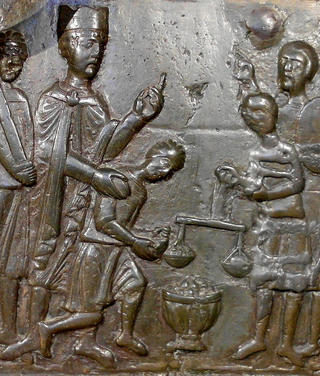 395
Bolesław I the Brave, less often known as Bolesław the Great, was Duke of Poland from 992 to 1025, and the first King of Poland in 1025. He was also Duke of Bohemia between 1003 and 1004 as Boleslaus...
395
Bolesław I the Brave, less often known as Bolesław the Great, was Duke of Poland from 992 to 1025, and the first King of Poland in 1025. He was also Duke of Bohemia between 1003 and 1004 as Boleslaus...
John III Sobieski
 368
John III Sobieski was King of Poland and Grand Duke of Lithuania from 1674 until his death in 1696.
368
John III Sobieski was King of Poland and Grand Duke of Lithuania from 1674 until his death in 1696.
Stanisław Staszic
 366
Stanisław Wawrzyniec Staszic was a leading figure in the Polish Enlightenment: a Catholic priest, philosopher, geologist, writer, poet, translator and statesman. A physiocrat, monist, pan-Slavist and...
366
Stanisław Wawrzyniec Staszic was a leading figure in the Polish Enlightenment: a Catholic priest, philosopher, geologist, writer, poet, translator and statesman. A physiocrat, monist, pan-Slavist and...
Jan Matejko
 349
Jan Alojzy Matejko was a Polish painter, a leading 19th-century exponent of history painting, known for depicting nodal events from Polish history. His works include large scale oil paintings such as...
349
Jan Alojzy Matejko was a Polish painter, a leading 19th-century exponent of history painting, known for depicting nodal events from Polish history. His works include large scale oil paintings such as...
Stefan Wyszyński
 346
Stefan Wyszyński was a Polish prelate of the Catholic Church. He served as Bishop of Lublin from 1946 to 1948, Archbishop of Warsaw and Archbishop of Gniezno from 1948 to 1981. He was created a...
346
Stefan Wyszyński was a Polish prelate of the Catholic Church. He served as Bishop of Lublin from 1946 to 1948, Archbishop of Warsaw and Archbishop of Gniezno from 1948 to 1981. He was created a...
Cyprian Norwid
 330
Cyprian Kamil Norwid was a Polish poet, dramatist, painter, sculptor, and philosopher. He is now considered one of the four most important Polish Romantic poets, though scholars still debate whether...
330
Cyprian Kamil Norwid was a Polish poet, dramatist, painter, sculptor, and philosopher. He is now considered one of the four most important Polish Romantic poets, though scholars still debate whether...
Julian Tuwim
 317
Julian Tuwim, known also under the pseudonym Oldlen as a lyricist, was a Polish poet, born in Łódź, then part of the Russian Partition. He was educated in Łódź and in Warsaw where he studied law and...
317
Julian Tuwim, known also under the pseudonym Oldlen as a lyricist, was a Polish poet, born in Łódź, then part of the Russian Partition. He was educated in Łódź and in Warsaw where he studied law and...
Ignacy Jan Paderewski
 316
Ignacy Jan Paderewski was a Polish pianist, composer and statesman who was a spokesman for Polish independence. In 1919, he was the nation's prime minister and foreign minister during which he signed...
316
Ignacy Jan Paderewski was a Polish pianist, composer and statesman who was a spokesman for Polish independence. In 1919, he was the nation's prime minister and foreign minister during which he signed...
Adam Asnyk
 316
Adam Asnyk, was a Polish poet and dramatist of the Positivist era.
316
Adam Asnyk, was a Polish poet and dramatist of the Positivist era.
Stanisław Wyspiański
 306
Stanisław Mateusz Ignacy Wyspiański was a Polish playwright, painter and poet, as well as interior and furniture designer. A patriotic writer, he created a series of symbolic, national dramas within...
306
Stanisław Mateusz Ignacy Wyspiański was a Polish playwright, painter and poet, as well as interior and furniture designer. A patriotic writer, he created a series of symbolic, national dramas within...
Jadwiga of Poland
 299
Jadwiga, also known as Hedwig, was the first woman to be crowned as monarch of the Kingdom of Poland. She reigned from 16 October 1384 until her death. She was the youngest daughter of Louis the...
299
Jadwiga, also known as Hedwig, was the first woman to be crowned as monarch of the Kingdom of Poland. She reigned from 16 October 1384 until her death. She was the youngest daughter of Louis the...
Józef Bem
 293
Józef Zachariasz Bem was a Polish engineer and general, an Ottoman pasha and a national hero of Poland and Hungary, and a figure intertwined with other European patriotic movements. Like Tadeusz...
293
Józef Zachariasz Bem was a Polish engineer and general, an Ottoman pasha and a national hero of Poland and Hungary, and a figure intertwined with other European patriotic movements. Like Tadeusz...
Władysław Broniewski
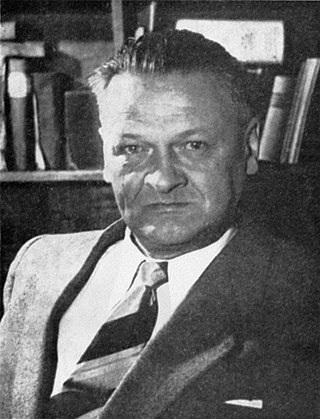 291
Władysław Kazimierz Broniewski was a Polish poet, writer, translator and soldier. Known for his revolutionary and patriotic writings.
291
Władysław Kazimierz Broniewski was a Polish poet, writer, translator and soldier. Known for his revolutionary and patriotic writings.
Romuald Traugutt
 279
Romuald Traugutt was a Polish military officer and politician who served as the last dictator of the January Uprising.
279
Romuald Traugutt was a Polish military officer and politician who served as the last dictator of the January Uprising.
Marie Curie
 279
Maria Salomea Skłodowska-Curie, known simply as Marie Curie, was a Polish and naturalised-French physicist and chemist who conducted pioneering research on radioactivity. She was the first woman to...
279
Maria Salomea Skłodowska-Curie, known simply as Marie Curie, was a Polish and naturalised-French physicist and chemist who conducted pioneering research on radioactivity. She was the first woman to...
Mieszko I
 263
Mieszko I was the first ruler of Poland and the founder of the first independent Polish state, Civitas Schinesghe also known as the Duchy of Poland. His reign stretched from 960 to his death and he...
263
Mieszko I was the first ruler of Poland and the founder of the first independent Polish state, Civitas Schinesghe also known as the Duchy of Poland. His reign stretched from 960 to his death and he...
Władysław II Jagiełło
 263
Jogaila, later Władysław II Jagiełło, was Grand Duke of Lithuania, later giving the position to his cousin Vytautas in exchange for the title of Supreme Duke of Lithuania (1401–1434) and then King of...
263
Jogaila, later Władysław II Jagiełło, was Grand Duke of Lithuania, later giving the position to his cousin Vytautas in exchange for the title of Supreme Duke of Lithuania (1401–1434) and then King of...
Casimir III the Great
 261
Casimir III the Great reigned as the King of Poland from 1333 to 1370. He also later became King of Ruthenia in 1340, and fought to retain the title in the Galicia-Volhynia Wars. He was the last...
261
Casimir III the Great reigned as the King of Poland from 1333 to 1370. He also later became King of Ruthenia in 1340, and fought to retain the title in the Galicia-Volhynia Wars. He was the last...
Stephen Báthory
 258
Stephen Báthory was Voivode of Transylvania (1571–1576), Prince of Transylvania (1576–1586), King of Poland and Grand Duke of Lithuania (1576–1586).
258
Stephen Báthory was Voivode of Transylvania (1571–1576), Prince of Transylvania (1576–1586), King of Poland and Grand Duke of Lithuania (1576–1586).
Stanisław Wigura
 248
Stanisław Wigura was a Polish aircraft designer and aviator, co-founder of the RWD aircraft construction team and lecturer at the Warsaw University of Technology. Along with Franciszek Żwirko, he won...
248
Stanisław Wigura was a Polish aircraft designer and aviator, co-founder of the RWD aircraft construction team and lecturer at the Warsaw University of Technology. Along with Franciszek Żwirko, he won...
Ignacy Krasicki
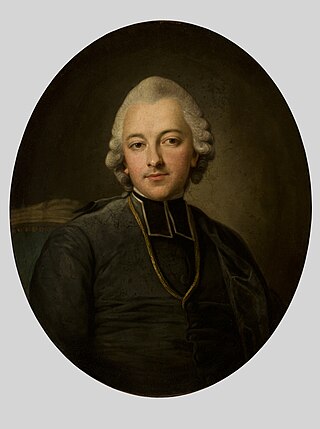 229
Ignacy Błażej Franciszek Krasicki, from 1766 Prince-Bishop of Warmia and from 1795 Archbishop of Gniezno, was Poland's leading Enlightenment poet, a critic of the clergy, Poland's La Fontaine, author...
229
Ignacy Błażej Franciszek Krasicki, from 1766 Prince-Bishop of Warmia and from 1795 Archbishop of Gniezno, was Poland's leading Enlightenment poet, a critic of the clergy, Poland's La Fontaine, author...
Władysław I Łokietek
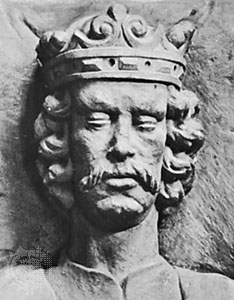 227
Władysław I Łokietek, in English known as the "Elbow-high" or Ladislaus the Short, was King of Poland from 1320 to 1333, and duke of several of the provinces and principalities in the preceding...
227
Władysław I Łokietek, in English known as the "Elbow-high" or Ladislaus the Short, was King of Poland from 1320 to 1333, and duke of several of the provinces and principalities in the preceding...
Hugo Kołłątaj
 215
Hugo Stumberg Kołłątaj, also spelled Kołłątay, was a prominent Polish constitutional reformer and educationalist, and one of the most prominent figures of the Polish Enlightenment. He served as...
215
Hugo Stumberg Kołłątaj, also spelled Kołłątay, was a prominent Polish constitutional reformer and educationalist, and one of the most prominent figures of the Polish Enlightenment. He served as...
Casimir Pulaski
Janusz Korczak
Józef Ignacy Kraszewski
 212
Józef Ignacy Kraszewski was a Polish novelist, journalist, historian, publisher, painter, and musician.
212
Józef Ignacy Kraszewski was a Polish novelist, journalist, historian, publisher, painter, and musician.
Wojciech Bartosz Głowacki
Gabriel Narutowicz
 201
Gabriel Józef Narutowicz was a Polish professor of hydroelectric engineering and politician who served as the first President of Poland from 11 December 1922 until his assassination on 16 December,...
201
Gabriel Józef Narutowicz was a Polish professor of hydroelectric engineering and politician who served as the first President of Poland from 11 December 1922 until his assassination on 16 December,...
Stefan Aleksander Okrzeja
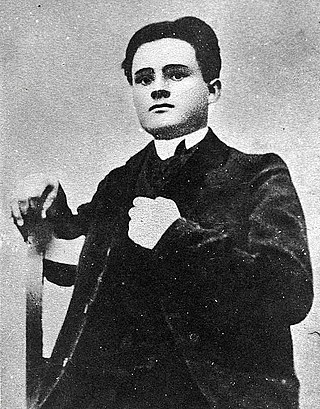 193
Stefan Aleksander Okrzeja was a Polish worker, socialist and activist for Poland's independence.
193
Stefan Aleksander Okrzeja was a Polish worker, socialist and activist for Poland's independence.
Jan Kasprowicz
 192
Jan Kasprowicz was a poet, playwright, critic and translator; a foremost representative of Young Poland.
192
Jan Kasprowicz was a poet, playwright, critic and translator; a foremost representative of Young Poland.
Władysław Anders
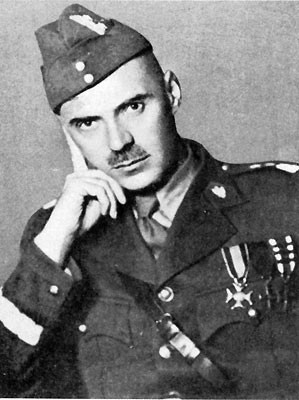 184
Władysław Albert Anders was a general in the Polish Army and later in life a politician and prominent member of the Polish government-in-exile in London.
184
Władysław Albert Anders was a general in the Polish Army and later in life a politician and prominent member of the Polish government-in-exile in London.
Krzysztof Kamil Baczyński
 170
Krzysztof Kamil Baczyński, was a Polish poet and Home Army soldier, one of the most well known of the Generation of Columbuses, the young generation of Polish poets, of whom several perished in the...
170
Krzysztof Kamil Baczyński, was a Polish poet and Home Army soldier, one of the most well known of the Generation of Columbuses, the young generation of Polish poets, of whom several perished in the...
Aleksander Fredro
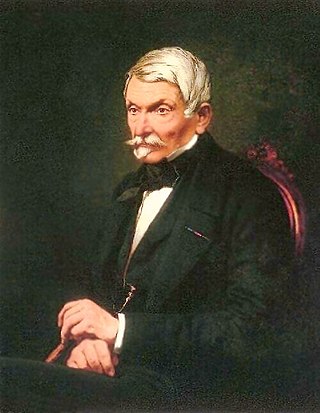 166
Aleksander Fredro was a Polish poet, playwright and author active during Polish Romanticism in the period of partitions by neighboring empires. His works including plays written in the octosyllabic...
166
Aleksander Fredro was a Polish poet, playwright and author active during Polish Romanticism in the period of partitions by neighboring empires. His works including plays written in the octosyllabic...
Jan Henryk Dąbrowski
 163
Jan Henryk Dąbrowski was a Polish general and statesman, widely respected after his death for his patriotic attitude, and described as a national hero who spent his whole life restoring the legacy of...
163
Jan Henryk Dąbrowski was a Polish general and statesman, widely respected after his death for his patriotic attitude, and described as a national hero who spent his whole life restoring the legacy of...
Maria Dąbrowska
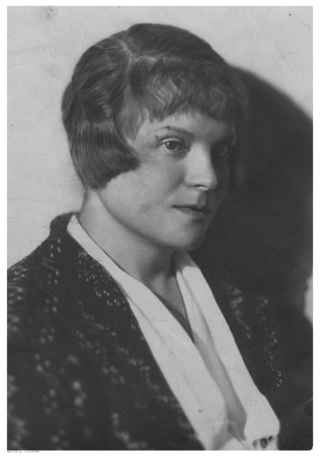 160
Maria Dąbrowska was a Polish writer, novelist, essayist, journalist and playwright, author of the popular Polish historical novel Noce i dnie written between 1932 and 1934 in four separate volumes....
160
Maria Dąbrowska was a Polish writer, novelist, essayist, journalist and playwright, author of the popular Polish historical novel Noce i dnie written between 1932 and 1934 in four separate volumes....
Czesław Miłosz
 159
Czesław Miłosz was a Polish-American poet, prose writer, translator, and diplomat. He primarily wrote his poetry in Polish. Regarded as one of the great poets of the 20th century, he won the 1980...
159
Czesław Miłosz was a Polish-American poet, prose writer, translator, and diplomat. He primarily wrote his poetry in Polish. Regarded as one of the great poets of the 20th century, he won the 1980...
Stefan Czarniecki
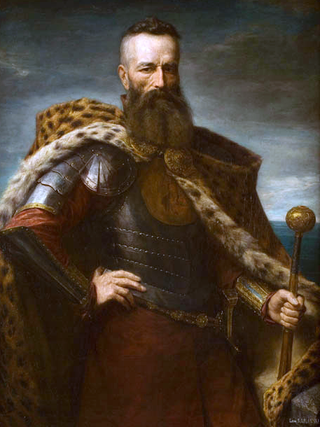 157
Stefan Czarniecki was a Polish nobleman, general and military commander. In his career, he rose from a petty nobleman to a magnate holding one of the highest offices in the Commonwealth, something...
157
Stefan Czarniecki was a Polish nobleman, general and military commander. In his career, he rose from a petty nobleman to a magnate holding one of the highest offices in the Commonwealth, something...
Józef Haller
 156
Józef Haller von Hallenburg was a lieutenant general of the Polish Army, a legionary in the Polish Legions, harcmistrz, the president of the Polish Scouting and Guiding Association (ZHP), and a...
156
Józef Haller von Hallenburg was a lieutenant general of the Polish Army, a legionary in the Polish Legions, harcmistrz, the president of the Polish Scouting and Guiding Association (ZHP), and a...
Karol Szymanowski
 156
Karol Maciej Szymanowski was a Polish composer and pianist. He was a member of the modernist Young Poland movement that flourished in the late 19th and early 20th century.
156
Karol Maciej Szymanowski was a Polish composer and pianist. He was a member of the modernist Young Poland movement that flourished in the late 19th and early 20th century.
Józef Poniatowski
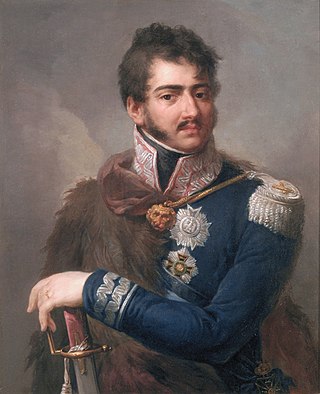 155
Prince Józef Antoni Poniatowski was a Polish general, minister of war and army chief, who became a Marshal of the French Empire during the Napoleonic Wars.
155
Prince Józef Antoni Poniatowski was a Polish general, minister of war and army chief, who became a Marshal of the French Empire during the Napoleonic Wars.
Zofia Nałkowska
 155
Zofia Nałkowska was a Polish prose writer, dramatist, and prolific essayist. She served as the executive member of the prestigious Polish Academy of Literature (1933–1939) during the interwar period.
155
Zofia Nałkowska was a Polish prose writer, dramatist, and prolific essayist. She served as the executive member of the prestigious Polish Academy of Literature (1933–1939) during the interwar period.
Jan Brzechwa
 155
Jan Brzechwa, was a Polish poet, author and lawyer, known mostly for his contribution to children's literature. He was born Jan Wiktor Lesman to a Polish family of Jewish descent.
155
Jan Brzechwa, was a Polish poet, author and lawyer, known mostly for his contribution to children's literature. He was born Jan Wiktor Lesman to a Polish family of Jewish descent.
Konstanty Ildefons Gałczyński
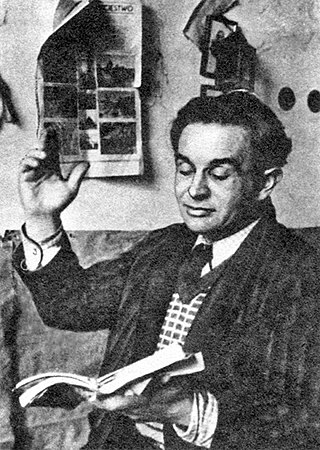 152
Konstanty Ildefons Gałczyński, alias Karakuliambro, was a Polish poet. He is well known for the "paradramatic" absurd humorous sketches of the Green Goose Theatre.
152
Konstanty Ildefons Gałczyński, alias Karakuliambro, was a Polish poet. He is well known for the "paradramatic" absurd humorous sketches of the Green Goose Theatre.
Zygmunt Krasiński
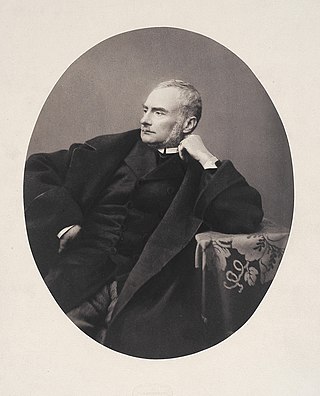 150
Napoleon Stanisław Adam Feliks Zygmunt Krasiński was a Polish poet traditionally ranked after Adam Mickiewicz and Juliusz Słowacki as one of Poland's Three Bards – the Romantic poets who influenced...
150
Napoleon Stanisław Adam Feliks Zygmunt Krasiński was a Polish poet traditionally ranked after Adam Mickiewicz and Juliusz Słowacki as one of Poland's Three Bards – the Romantic poets who influenced...
Jerzy Popiełuszko
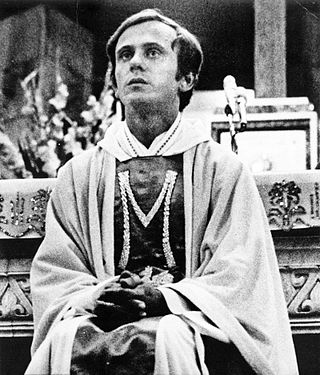 150
Jerzy Popiełuszko was a Polish Roman Catholic priest who became associated with the opposition Solidarity trade union in communist Poland. He was murdered in 1984 by three agents of Służba...
150
Jerzy Popiełuszko was a Polish Roman Catholic priest who became associated with the opposition Solidarity trade union in communist Poland. He was murdered in 1984 by three agents of Służba...
Józef Wybicki
 148
Józef Rufin Wybicki was a Polish nobleman, jurist, poet, political and military activist of Kashubian descent. He is best remembered as the author of "Mazurek Dąbrowskiego", which was adopted as the...
148
Józef Rufin Wybicki was a Polish nobleman, jurist, poet, political and military activist of Kashubian descent. He is best remembered as the author of "Mazurek Dąbrowskiego", which was adopted as the...
Józef Chełmoński
 143
Józef Marian Chełmoński was a Polish painter of the realist school with roots in the historical and social context of the late Romantic period in partitioned Poland. He is famous for monumental...
143
Józef Marian Chełmoński was a Polish painter of the realist school with roots in the historical and social context of the late Romantic period in partitioned Poland. He is famous for monumental...
Ludwik Waryński
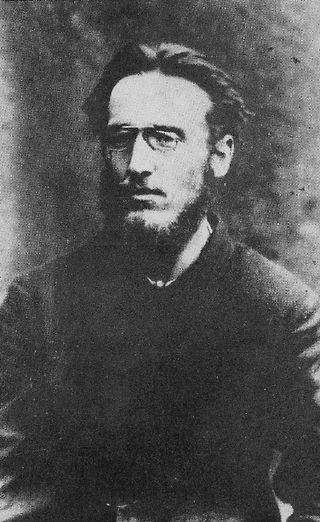 139
Ludwik Tadeusz Waryński was an activist and theoretician of the socialist movement in Poland.
139
Ludwik Tadeusz Waryński was an activist and theoretician of the socialist movement in Poland.
Emilia Plater
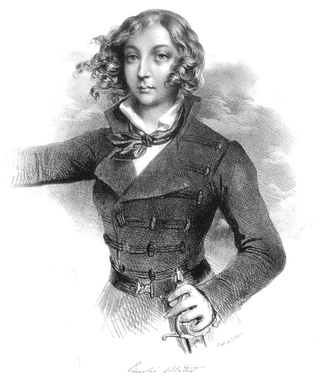 137
Countess Emilia Broel-Plater was a Polish–Lithuanian noblewoman and revolutionary from the lands of the partitioned Polish–Lithuanian Commonwealth. Raised in a patriotic tradition in Līksna near...
137
Countess Emilia Broel-Plater was a Polish–Lithuanian noblewoman and revolutionary from the lands of the partitioned Polish–Lithuanian Commonwealth. Raised in a patriotic tradition in Līksna near...
Piotr Skarga
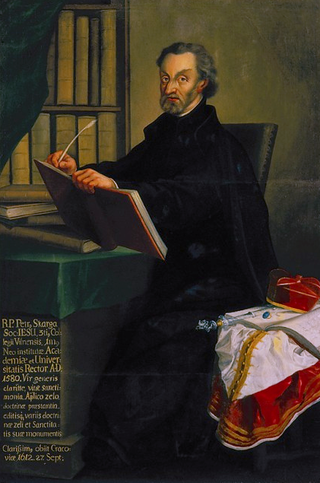 135
Piotr Skarga was a Polish Jesuit, preacher, hagiographer, polemicist, and leading figure of the Counter-Reformation in the Polish–Lithuanian Commonwealth. Due to his oratorical gifts, he has been...
135
Piotr Skarga was a Polish Jesuit, preacher, hagiographer, polemicist, and leading figure of the Counter-Reformation in the Polish–Lithuanian Commonwealth. Due to his oratorical gifts, he has been...
Jan Długosz
 132
Jan Długosz, also known in Latin as Johannes Longinus, was a Polish priest, chronicler, diplomat, soldier, and secretary to Bishop Zbigniew Oleśnicki of Kraków. He is considered Poland's first...
132
Jan Długosz, also known in Latin as Johannes Longinus, was a Polish priest, chronicler, diplomat, soldier, and secretary to Bishop Zbigniew Oleśnicki of Kraków. He is considered Poland's first...
Ignacy Daszyński
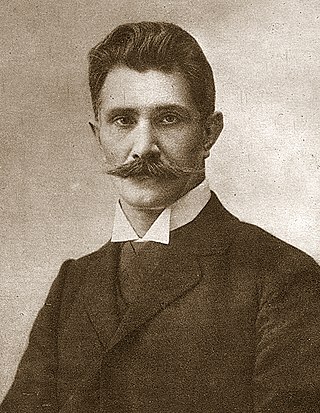 131
Ignacy Ewaryst Daszyński was a Polish socialist politician, journalist, and very briefly Prime Minister of the Second Polish Republic's first government, formed in Lublin in 1918.
131
Ignacy Ewaryst Daszyński was a Polish socialist politician, journalist, and very briefly Prime Minister of the Second Polish Republic's first government, formed in Lublin in 1918.
Leopold Staff
 129
Leopold Henryk Staff was a Polish poet; an artist of European modernism twice granted the Degree of Doctor honoris causa by universities in Warsaw and in Kraków. He was also nominated for the Nobel...
129
Leopold Henryk Staff was a Polish poet; an artist of European modernism twice granted the Degree of Doctor honoris causa by universities in Warsaw and in Kraków. He was also nominated for the Nobel...
Michał Drzymała
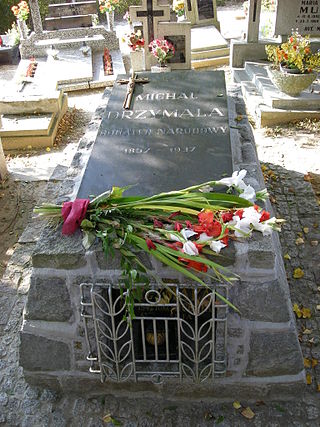 126
Michał Drzymała was a Polish peasant living in the Greater Poland region under Prussian rule. He is a Polish folk hero because, after he was denied permission to build a house on his own land by the...
126
Michał Drzymała was a Polish peasant living in the Greater Poland region under Prussian rule. He is a Polish folk hero because, after he was denied permission to build a house on his own land by the...
Janusz Kusociński
 126
Janusz Tadeusz Kusociński was a Polish athlete, winner in the 10,000 meters event at the 1932 Summer Olympics.
126
Janusz Tadeusz Kusociński was a Polish athlete, winner in the 10,000 meters event at the 1932 Summer Olympics.
Saint Florian
 126
Florian was a Christian holy man and the patron saint of chimney sweeps; soapmakers, and firefighters. His feast day is 4 May. Florian is also the patron saint of Poland, the city of Linz, Austria,...
126
Florian was a Christian holy man and the patron saint of chimney sweeps; soapmakers, and firefighters. His feast day is 4 May. Florian is also the patron saint of Poland, the city of Linz, Austria,...
Henryk Wieniawski
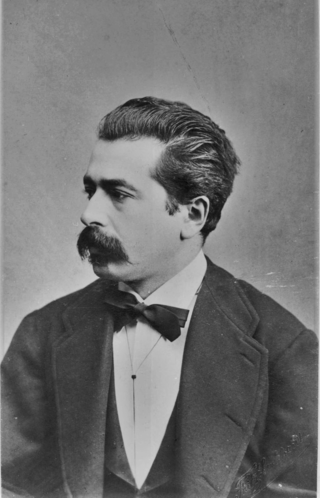 124
Henryk Wieniawski was a Polish virtuoso violinist, composer and pedagogue, who is regarded amongst the most distinguished violinists in history. His younger brother Józef Wieniawski and nephew Adam...
124
Henryk Wieniawski was a Polish virtuoso violinist, composer and pedagogue, who is regarded amongst the most distinguished violinists in history. His younger brother Józef Wieniawski and nephew Adam...
Jarosław Dąbrowski
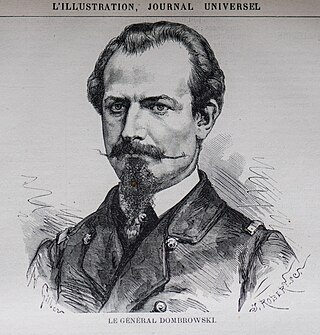 120
Jarosław Żądło-Dąbrowski, also known as Jaroslav Dombrowski, was a Polish nobleman and military officer in the Imperial Russian Army, a Polish nationalist and radical republican for Poland, and...
120
Jarosław Żądło-Dąbrowski, also known as Jaroslav Dombrowski, was a Polish nobleman and military officer in the Imperial Russian Army, a Polish nationalist and radical republican for Poland, and...
Stefan Rowecki
 116
Stefan Paweł Rowecki was a Polish general, journalist and the leader of the Armia Krajowa. He was murdered by the Gestapo in prison on the personal order of Heinrich Himmler.
116
Stefan Paweł Rowecki was a Polish general, journalist and the leader of the Armia Krajowa. He was murdered by the Gestapo in prison on the personal order of Heinrich Himmler.
Henryk Sucharski
 115
Henryk Sucharski (1898–1946) was a Polish military officer and a major in the Polish Army. At the outbreak of World War II, he was one of the commanders of the Westerplatte position in Gdańsk, which...
115
Henryk Sucharski (1898–1946) was a Polish military officer and a major in the Polish Army. At the outbreak of World War II, he was one of the commanders of the Westerplatte position in Gdańsk, which...
Bolesław III Wrymouth
 112
Bolesław III Wrymouth, also known as Boleslaus the Wry-mouthed, was the duke of Lesser Poland, Silesia and Sandomierz between 1102 and 1107 and over the whole of Poland between 1107 and 1138. He was...
112
Bolesław III Wrymouth, also known as Boleslaus the Wry-mouthed, was the duke of Lesser Poland, Silesia and Sandomierz between 1102 and 1107 and over the whole of Poland between 1107 and 1138. He was...
Karol Miarka (father)
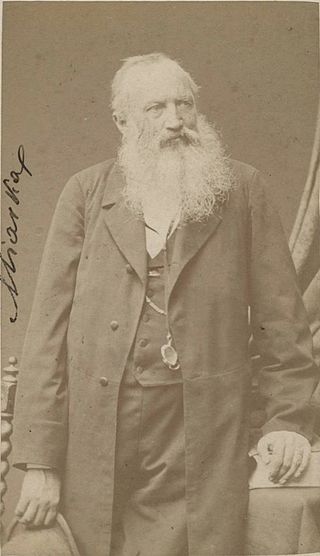 112
Karol Miarka also called Elder or Father was a Polish social activist in Upper Silesia, teacher, writer, publicist and printer. Initiator of the establishment and organizer of many Polish social and...
112
Karol Miarka also called Elder or Father was a Polish social activist in Upper Silesia, teacher, writer, publicist and printer. Initiator of the establishment and organizer of many Polish social and...
Witold Pilecki
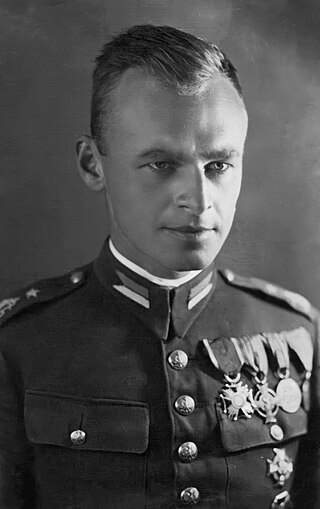 110
Witold Pilecki was a Polish World War II cavalry officer, intelligence agent, and resistance leader.
110
Witold Pilecki was a Polish World War II cavalry officer, intelligence agent, and resistance leader.
Jacek Malczewski
 106
Jacek Malczewski was a Polish symbolist painter who was one of the central figures of the patriotic Young Poland movement. His creative output combined the predominant style of his times with...
106
Jacek Malczewski was a Polish symbolist painter who was one of the central figures of the patriotic Young Poland movement. His creative output combined the predominant style of his times with...
Władysław Orkan
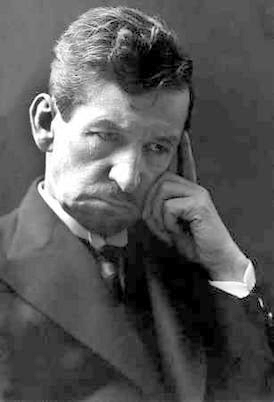 106
Władysław Orkan was a Polish Goral writer and poet from the Young Poland period. He is known as one of the greatest Goral writers. The most famous of his works portray the common people from the...
106
Władysław Orkan was a Polish Goral writer and poet from the Young Poland period. He is known as one of the greatest Goral writers. The most famous of his works portray the common people from the...
Kazimierz Przerwa-Tetmajer
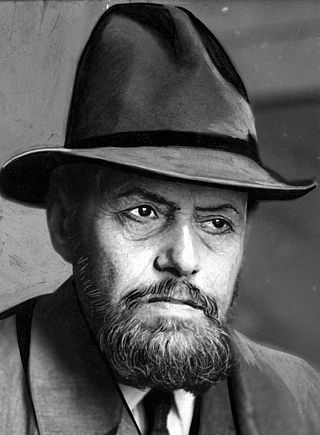 104
Kazimierz Przerwa-Tetmajer was a Polish Goral poet, novelist, playwright, journalist and writer. He was a member of the Young Poland movement.
104
Kazimierz Przerwa-Tetmajer was a Polish Goral poet, novelist, playwright, journalist and writer. He was a member of the Young Poland movement.
Stanisław Konarski
 103
Stanisław Konarski, Sch.P. was a Polish pedagogue, educational reformer, political writer, poet, dramatist, Piarist priest and precursor of the Enlightenment in the Polish–Lithuanian Commonwealth.
103
Stanisław Konarski, Sch.P. was a Polish pedagogue, educational reformer, political writer, poet, dramatist, Piarist priest and precursor of the Enlightenment in the Polish–Lithuanian Commonwealth.
Stanisław Maczek
 103
Lieutenant General Stanisław Maczek was a Polish tank commander of World War II, whose division was instrumental in the Allied liberation of France, closing the Falaise pocket, resulting in the...
103
Lieutenant General Stanisław Maczek was a Polish tank commander of World War II, whose division was instrumental in the Allied liberation of France, closing the Falaise pocket, resulting in the...
Maciej Rataj
 103
Maciej Rataj was a Polish politician and writer.
103
Maciej Rataj was a Polish politician and writer.
Piotr Ściegienny
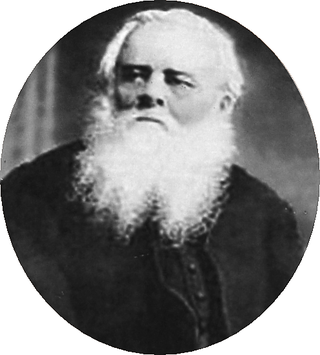 102
Piotr Wojciech Ściegienny – polski ksiądz katolicki, działacz niepodległościowy i socjalistyczny, przywódca ludowy.
102
Piotr Wojciech Ściegienny – polski ksiądz katolicki, działacz niepodległościowy i socjalistyczny, przywódca ludowy.
Henryk Dobrzański
 99
Major Henryk Dobrzański was a Polish soldier, sportsman and partisan. He fought in the Polish Legions in World War I, Polish–Ukrainian War of 1918, the Polish–Bolshevik War of 1919–1921 and the...
99
Major Henryk Dobrzański was a Polish soldier, sportsman and partisan. He fought in the Polish Legions in World War I, Polish–Ukrainian War of 1918, the Polish–Bolshevik War of 1919–1921 and the...
Tadeusz Rejtan
 98
Tadeusz Reytan was a nobleman from the Polish–Lithuanian Commonwealth. He was a member of the Sejm of the Polish–Lithuanian Commonwealth from the Nowogródek Voivodeship. Reytan is remembered for a...
98
Tadeusz Reytan was a nobleman from the Polish–Lithuanian Commonwealth. He was a member of the Sejm of the Polish–Lithuanian Commonwealth from the Nowogródek Voivodeship. Reytan is remembered for a...
Artur Grottger
 98
Artur Grottger was a Polish Romantic painter and graphic artist, one of the most prominent artists of the mid 19th century under the partitions of Poland, despite a life cut short by incurable...
98
Artur Grottger was a Polish Romantic painter and graphic artist, one of the most prominent artists of the mid 19th century under the partitions of Poland, despite a life cut short by incurable...
Kornel Makuszyński
 95
Kornel Makuszyński was a Polish writer of children's and youth literature. He was an elected member of the prestigious Polish Academy of Literature in the interwar Poland.
95
Kornel Makuszyński was a Polish writer of children's and youth literature. He was an elected member of the prestigious Polish Academy of Literature in the interwar Poland.
Adalbert of Prague
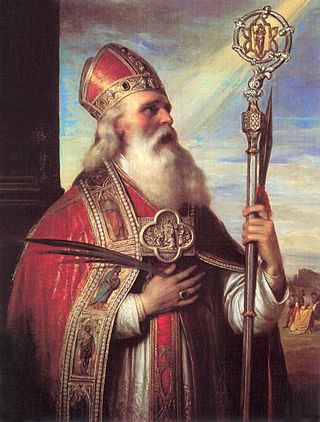 94
Adalbert of Prague, known in the Czech Republic, Poland and Slovakia by his birth name Vojtěch, was a Czech missionary and Christian saint. He was the Bishop of Prague and a missionary to the...
94
Adalbert of Prague, known in the Czech Republic, Poland and Slovakia by his birth name Vojtěch, was a Czech missionary and Christian saint. He was the Bishop of Prague and a missionary to the...
Bolesław Leśmian
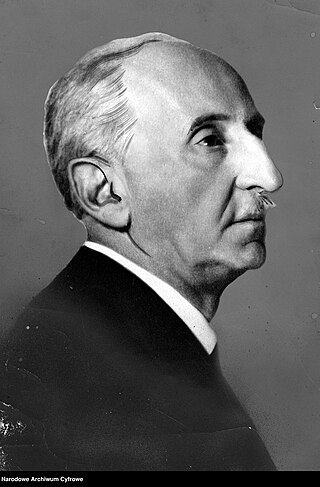 93
Bolesław Leśmian was a Polish poet, artist, and member of the Polish Academy of Literature, one of the first poets to introduce Symbolism and Expressionism to Polish verse.
93
Bolesław Leśmian was a Polish poet, artist, and member of the Polish Academy of Literature, one of the first poets to introduce Symbolism and Expressionism to Polish verse.
Gustaw Morcinek
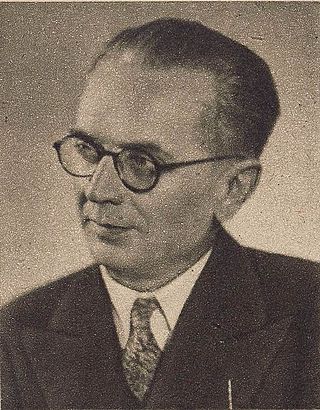 92
Gustaw Morcinek was a Polish writer, educator and later member of Sejm from 1952 to 1957. He is considered one of the most important writers from Silesia.
92
Gustaw Morcinek was a Polish writer, educator and later member of Sejm from 1952 to 1957. He is considered one of the most important writers from Silesia.
Leopold Okulicki
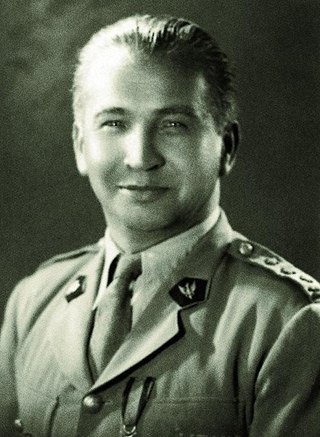 91
General Leopold Okulicki was a Polish Army general and the last commander of the anti-Nazi underground Home Army during World War II and the German occupation of Poland (1939–1945).
91
General Leopold Okulicki was a Polish Army general and the last commander of the anti-Nazi underground Home Army during World War II and the German occupation of Poland (1939–1945).
Joachim Lelewel
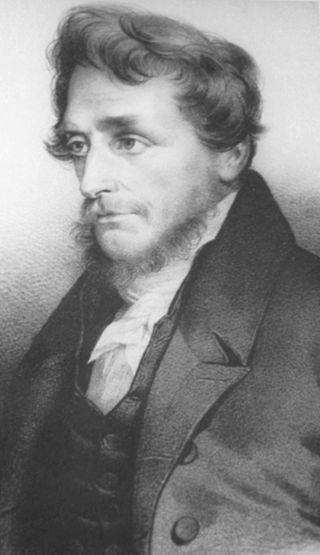 90
Joachim Lelewel was a Polish historian, geographer, bibliographer, polyglot and politician.
90
Joachim Lelewel was a Polish historian, geographer, bibliographer, polyglot and politician.
Wojciech Korfanty
 89
Wojciech Korfanty was a Polish activist, journalist and politician, who served as a member of the German parliaments, the Reichstag and the Prussian Landtag, and later, in the Polish Sejm. Briefly,...
89
Wojciech Korfanty was a Polish activist, journalist and politician, who served as a member of the German parliaments, the Reichstag and the Prussian Landtag, and later, in the Polish Sejm. Briefly,...
Onufry Zagłoba
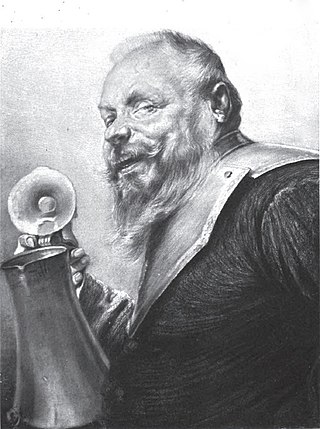 88
Jan Onufry Zagłoba is a fictional character in the Trilogy by Henryk Sienkiewicz. Together with other characters of The Trilogy, Zagłoba engages in various adventures, fighting for the...
88
Jan Onufry Zagłoba is a fictional character in the Trilogy by Henryk Sienkiewicz. Together with other characters of The Trilogy, Zagłoba engages in various adventures, fighting for the...
Gabriela Zapolska
 87
Maria Gabriela Stefania Korwin-Piotrowska (1857–1921), known as Gabriela Zapolska, was a Polish novelist, playwright, naturalist writer, feuilletonist, theatre critic and stage actress. Zapolska...
87
Maria Gabriela Stefania Korwin-Piotrowska (1857–1921), known as Gabriela Zapolska, was a Polish novelist, playwright, naturalist writer, feuilletonist, theatre critic and stage actress. Zapolska...
Józef Sowiński
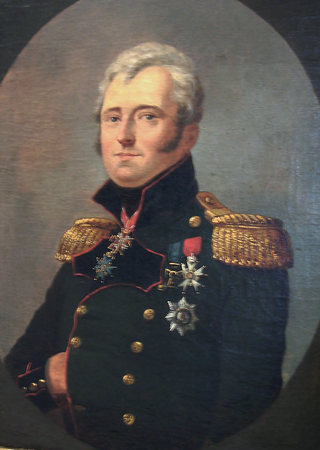 85
Józef Sowiński (1777–1831) was a Polish artillery general and a hero of Poland's November 1830 Uprising.
85
Józef Sowiński (1777–1831) was a Polish artillery general and a hero of Poland's November 1830 Uprising.
Wisława Szymborska
 84
Maria Wisława Anna Szymborska was a Polish poet, essayist, translator, and recipient of the 1996 Nobel Prize in Literature. Born in Prowent, she resided in Kraków until the end of her life. In...
84
Maria Wisława Anna Szymborska was a Polish poet, essayist, translator, and recipient of the 1996 Nobel Prize in Literature. Born in Prowent, she resided in Kraków until the end of her life. In...
Wojciech Kossak
 81
Wojciech Horacy Kossak was a Polish painter and member of the celebrated Kossak family of artists and writers. He was the son of painter Juliusz Kossak, and twin brother of freedom fighter Tadeusz...
81
Wojciech Horacy Kossak was a Polish painter and member of the celebrated Kossak family of artists and writers. He was the son of painter Juliusz Kossak, and twin brother of freedom fighter Tadeusz...
John the Evangelist
 78
John the Evangelist is the name traditionally given to the author of the Gospel of John. Christians have traditionally identified him with John the Apostle, John of Patmos, and John the Presbyter,...
78
John the Evangelist is the name traditionally given to the author of the Gospel of John. Christians have traditionally identified him with John the Apostle, John of Patmos, and John the Presbyter,...
Marian Raciborski
 78
Marian Raciborski – polski botanik, jeden z pierwszych w Polsce paleobotaników, pionier ruchu ochrony przyrody w Polsce, przewodniczący Prezydium Komitetu Obywatelskiego Polskiego Skarbu Wojskowego w...
78
Marian Raciborski – polski botanik, jeden z pierwszych w Polsce paleobotaników, pionier ruchu ochrony przyrody w Polsce, przewodniczący Prezydium Komitetu Obywatelskiego Polskiego Skarbu Wojskowego w...
Andrzej Strug
 77
Andrzej Strug, real name Tadeusz Gałecki was a Polish socialist politician, publicist and activist for Poland's independence. He was also a freemason and declined the offer to join the prestigious...
77
Andrzej Strug, real name Tadeusz Gałecki was a Polish socialist politician, publicist and activist for Poland's independence. He was also a freemason and declined the offer to join the prestigious...
Mieczysław Karłowicz
 77
Mieczysław Karłowicz was a Polish composer and conductor.
77
Mieczysław Karłowicz was a Polish composer and conductor.
Andrzej Kmicic
 77
Andrzej Kmicic is best known as a fictional character created by Henryk Sienkiewicz featured in the novel The Deluge. He is a typical szlachcic from the Polish–Lithuanian Commonwealth; unruly yet...
77
Andrzej Kmicic is best known as a fictional character created by Henryk Sienkiewicz featured in the novel The Deluge. He is a typical szlachcic from the Polish–Lithuanian Commonwealth; unruly yet...
Jarosław Iwaszkiewicz
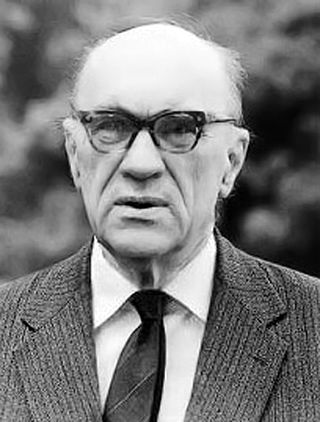 76
Jarosław Leon Iwaszkiewicz, was a Polish writer, poet, essayist, dramatist and translator. He is recognized for his literary achievements, beginning with poetry and prose written after World War I....
76
Jarosław Leon Iwaszkiewicz, was a Polish writer, poet, essayist, dramatist and translator. He is recognized for his literary achievements, beginning with poetry and prose written after World War I....
Ignacy Łukasiewicz
 76
Jan Józef Ignacy Łukasiewicz was a Polish pharmacist, engineer, businessman, inventor, and philanthropist. He was one of the most prominent philanthropists in the Kingdom of Galicia and Lodomeria,...
76
Jan Józef Ignacy Łukasiewicz was a Polish pharmacist, engineer, businessman, inventor, and philanthropist. He was one of the most prominent philanthropists in the Kingdom of Galicia and Lodomeria,...
Julian Ursyn Niemcewicz
 76
Julian Ursyn Niemcewicz was a Polish poet, playwright and statesman. He was a leading advocate for the Polish–Lithuanian Commonwealth's Constitution of 3 May 1791.
76
Julian Ursyn Niemcewicz was a Polish poet, playwright and statesman. He was a leading advocate for the Polish–Lithuanian Commonwealth's Constitution of 3 May 1791.
Zbigniew Herbert
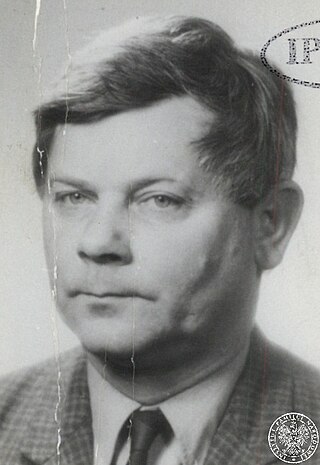 75
Zbigniew Herbert was a Polish poet, essayist, drama writer and moralist. He is one of the best known and the most translated post-war Polish writers. While he was first published in the 1950s, soon...
75
Zbigniew Herbert was a Polish poet, essayist, drama writer and moralist. He is one of the best known and the most translated post-war Polish writers. While he was first published in the 1950s, soon...
Józef Lompa
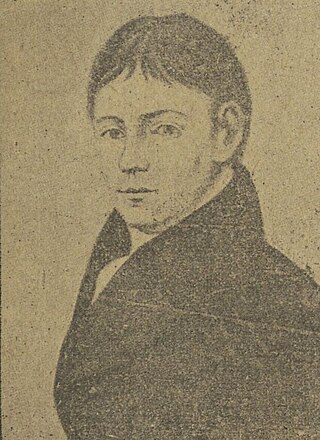 73
Józef Piotr Lompa – polski działacz, poeta, tłumacz, publicysta – współpracownik wielu ówczesnych pism, prozaik, pionier oświaty ludowej oraz etnografii na Śląsku. Prekursor procesu polskiego...
73
Józef Piotr Lompa – polski działacz, poeta, tłumacz, publicysta – współpracownik wielu ówczesnych pism, prozaik, pionier oświaty ludowej oraz etnografii na Śląsku. Prekursor procesu polskiego...
Roman Dmowski
 73
Roman Stanisław Dmowski was a Polish politician, statesman, and co-founder and chief ideologue of the National Democracy political movement. He saw the Germanization of Polish territories controlled...
73
Roman Stanisław Dmowski was a Polish politician, statesman, and co-founder and chief ideologue of the National Democracy political movement. He saw the Germanization of Polish territories controlled...
Michał Wołodyjowski
 71
Jerzy Michał Wołodyjowski is a fictional Polish hero in Henryk Sienkiewicz's Trilogy: With Fire and Sword, The Deluge and Pan Wołodyjowski.
71
Jerzy Michał Wołodyjowski is a fictional Polish hero in Henryk Sienkiewicz's Trilogy: With Fire and Sword, The Deluge and Pan Wołodyjowski.
Winnie-the-Pooh
 70
Winnie-the-Pooh is a fictional anthropomorphic teddy bear created by English author A. A. Milne and English illustrator E. H. Shepard. Winnie-the-Pooh first appeared by name in a children's story...
70
Winnie-the-Pooh is a fictional anthropomorphic teddy bear created by English author A. A. Milne and English illustrator E. H. Shepard. Winnie-the-Pooh first appeared by name in a children's story...
Wincenty Pol
 68
Wincenty Pol was a Polish poet and geographer.
68
Wincenty Pol was a Polish poet and geographer.
Marian Langiewicz
 66
Marian Langiewicz, full name Marian Antoni Melchior Langiewicz, was one of the leaders of the Polish January Uprising against the Russian Empire in 1863.
66
Marian Langiewicz, full name Marian Antoni Melchior Langiewicz, was one of the leaders of the Polish January Uprising against the Russian Empire in 1863.
Jan Karol Chodkiewicz
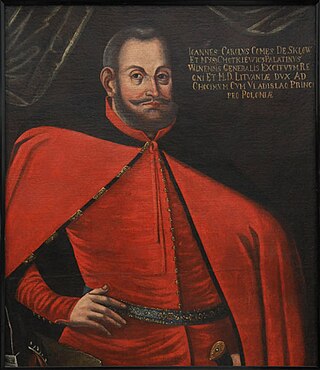 64
Jan Karol Chodkiewicz was a military commander of the Grand Ducal Lithuanian Army, who was from 1601 Field Hetman of Lithuania, and from 1605 Grand Hetman of Lithuania. He was one of the most...
64
Jan Karol Chodkiewicz was a military commander of the Grand Ducal Lithuanian Army, who was from 1601 Field Hetman of Lithuania, and from 1605 Grand Hetman of Lithuania. He was one of the most...
Stanisław Żółkiewski
 64
Stanisław Żółkiewski was a Polish nobleman of the Lubicz coat of arms, a magnate, military commander, and Chancellor of the Polish Crown in the Polish–Lithuanian Commonwealth who took part in many...
64
Stanisław Żółkiewski was a Polish nobleman of the Lubicz coat of arms, a magnate, military commander, and Chancellor of the Polish Crown in the Polish–Lithuanian Commonwealth who took part in many...
Feliks Nowowiejski
 64
Feliks Nowowiejski was a Polish composer, conductor, concert organist, and music teacher. Nowowiejski was born in Wartenburg in Warmia in the Prussian Partition of Poland. He died in Poznań, Poland.
64
Feliks Nowowiejski was a Polish composer, conductor, concert organist, and music teacher. Nowowiejski was born in Wartenburg in Warmia in the Prussian Partition of Poland. He died in Poznań, Poland.
Zawisza the Black
 64
Zawisza the Black of Garbów, of Sulima coat of arms, was a Polish knight and nobleman who served as a commander and diplomat under Polish king Władysław II Jagiełło and Hungarian-Bohemian king...
64
Zawisza the Black of Garbów, of Sulima coat of arms, was a Polish knight and nobleman who served as a commander and diplomat under Polish king Władysław II Jagiełło and Hungarian-Bohemian king...
Leon Wyczółkowski
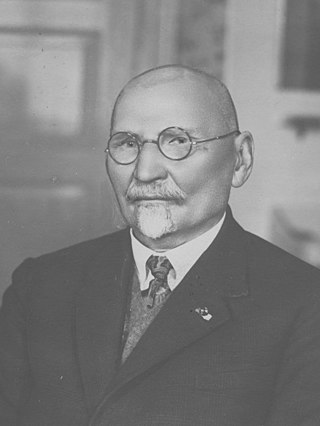 63
Leon Jan Wyczółkowski was one of the leading painters of the Young Poland movement, as well as the principal representative of Polish Realism in art of the Interbellum. From 1895 to 1911 he served as...
63
Leon Jan Wyczółkowski was one of the leading painters of the Young Poland movement, as well as the principal representative of Polish Realism in art of the Interbellum. From 1895 to 1911 he served as...
Juliusz Kossak
 62
Juliusz Fortunat Kossak was a Polish historical painter and master illustrator who specialized in battle scenes, military portraits and horses. He was the progenitor of an artistic family that...
62
Juliusz Fortunat Kossak was a Polish historical painter and master illustrator who specialized in battle scenes, military portraits and horses. He was the progenitor of an artistic family that...
Walery Antoni Wróblewski
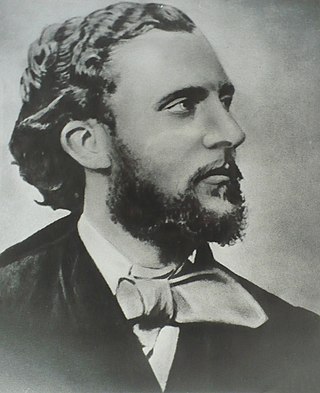 61
Walery Antoni Wróblewski was a Polish-Belarusian and French revolutionary, politician, general of Paris Commune and commander of January Uprising and one of the leaders of the Reds.
61
Walery Antoni Wróblewski was a Polish-Belarusian and French revolutionary, politician, general of Paris Commune and commander of January Uprising and one of the leaders of the Reds.
Stanisław Lem
 61
Stanisław Herman Lem was a Polish writer of science fiction and essays on various subjects, including philosophy, futurology, and literary criticism. Many of his science fiction stories are of...
61
Stanisław Herman Lem was a Polish writer of science fiction and essays on various subjects, including philosophy, futurology, and literary criticism. Many of his science fiction stories are of...
Saint Anne
 60
According to apocrypha, as well as Christian and Islamic tradition, Saint Anne was the mother of Mary, the wife of Joachim and the maternal grandmother of Jesus. Mary's mother is not named in the...
60
According to apocrypha, as well as Christian and Islamic tradition, Saint Anne was the mother of Mary, the wife of Joachim and the maternal grandmother of Jesus. Mary's mother is not named in the...
Juliusz Ligoń
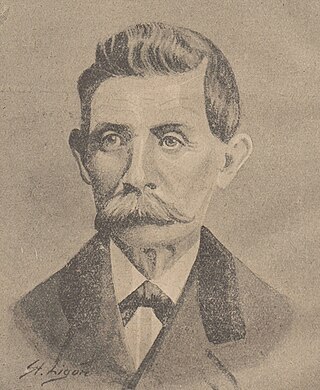 60
Juliusz Ligoń – polski działacz społeczny Górnego Śląska, śląski poeta ludowy, publicysta, dziadek Stanisława Ligonia.
60
Juliusz Ligoń – polski działacz społeczny Górnego Śląska, śląski poeta ludowy, publicysta, dziadek Stanisława Ligonia.
Ludwik Solski
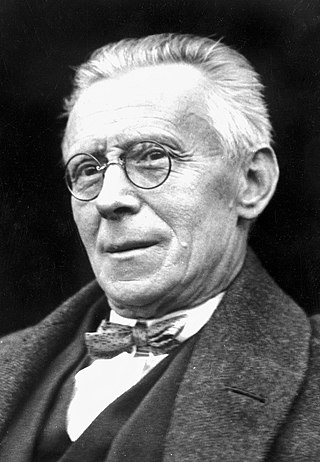 60
Ludwik Solski, born Ludwik Napoleon Karol Sosnowski,
was a Polish stage actor and theatre director. From his stage debut in 1876 until his death he played in nearly a thousand roles. He was married...
60
Ludwik Solski, born Ludwik Napoleon Karol Sosnowski,
was a Polish stage actor and theatre director. From his stage debut in 1876 until his death he played in nearly a thousand roles. He was married...
Bolesław Limanowski
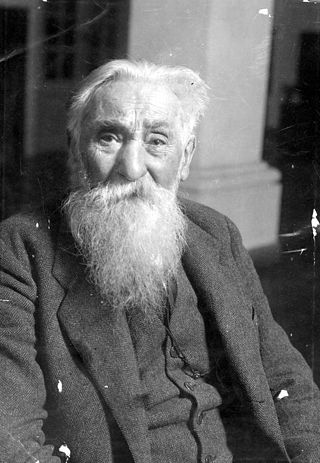 59
Bolesław Limanowski was a Polish socialist politician, as well as historian and journalist and advocate of Agrarianism. He was one of the first people to promote socialist ideas in Poland.
59
Bolesław Limanowski was a Polish socialist politician, as well as historian and journalist and advocate of Agrarianism. He was one of the first people to promote socialist ideas in Poland.
John II Casimir Vasa
 58
John II Casimir Vasa was King of Poland and Grand Duke of Lithuania from 1648 to his abdication in 1668 as well as a claimant to the throne of Sweden from 1648 to 1660. He was the first son of...
58
John II Casimir Vasa was King of Poland and Grand Duke of Lithuania from 1648 to his abdication in 1668 as well as a claimant to the throne of Sweden from 1648 to 1660. He was the first son of...
Jan Skrzetuski
 58
Jan Skrzetuski is a fictional character created by Polish author Henryk Sienkiewicz in the novel With Fire and Sword. He is a man of honour, always faithful to his master, duke Jeremi Wiśniowiecki....
58
Jan Skrzetuski is a fictional character created by Polish author Henryk Sienkiewicz in the novel With Fire and Sword. He is a man of honour, always faithful to his master, duke Jeremi Wiśniowiecki....
Franciszek Kleeberg
 57
Franciszek Kleeberg was a Polish general. He served in the Austro-Hungarian Army before joining the Polish Legions in World War I and following the Polish Independence later the Polish Army. During...
57
Franciszek Kleeberg was a Polish general. He served in the Austro-Hungarian Army before joining the Polish Legions in World War I and following the Polish Independence later the Polish Army. During...
Saint Barbara
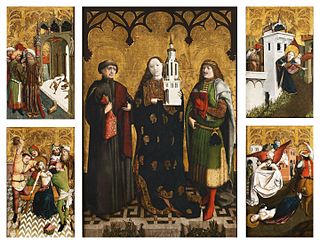 57
Saint Barbara, known in the Eastern Orthodox Church as the Great Martyr Barbara, was an early Christian Greek saint and martyr.
57
Saint Barbara, known in the Eastern Orthodox Church as the Great Martyr Barbara, was an early Christian Greek saint and martyr.
L. L. Zamenhof
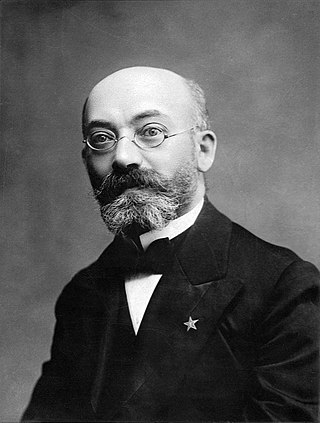 57
L. L. Zamenhof was the creator of Esperanto, the most widely used constructed international auxiliary language.
57
L. L. Zamenhof was the creator of Esperanto, the most widely used constructed international auxiliary language.
Marcin Kasprzak
 56
Marcin Kasprzak was a Polish Marxist revolutionary and a prominent leader of Poland's labour movement. He was a member of the Social Democratic Party of Germany, the First Proletariat party, the...
56
Marcin Kasprzak was a Polish Marxist revolutionary and a prominent leader of Poland's labour movement. He was a member of the Social Democratic Party of Germany, the First Proletariat party, the...
Michał Kajka
 56
Michał Kajka również Kayka, ps. „Prawdziński”, „Obserwator spod Ełku” – mazurski poeta ludowy, artysta, działacz mazurski, działacz na rzecz polskości Mazur.
56
Michał Kajka również Kayka, ps. „Prawdziński”, „Obserwator spod Ełku” – mazurski poeta ludowy, artysta, działacz mazurski, działacz na rzecz polskości Mazur.
Melchior Wańkowicz
 55
Melchior Wańkowicz was a Polish army officer, popular writer, political journalist and publisher. He is most famous for his reporting for the Polish Armed Forces in the West during World War II and...
55
Melchior Wańkowicz was a Polish army officer, popular writer, political journalist and publisher. He is most famous for his reporting for the Polish Armed Forces in the West during World War II and...
Julian Fałat
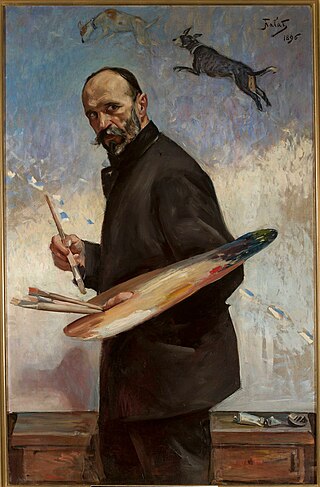 55
Julian Fałat was one of the most prolific Polish watercolorists, one of the country's foremost landscapists, and a leading impressionist.
55
Julian Fałat was one of the most prolific Polish watercolorists, one of the country's foremost landscapists, and a leading impressionist.
Zygmunt I Stary
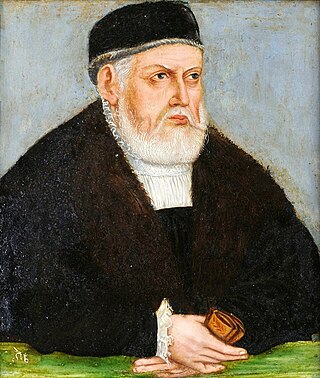 53
Zygmunt I Stary – od roku 1506 wielki książę litewski, od 1507 do 1548 roku król Polski. Był przedostatnim z dynastii Jagiellonów. Na tronie polskim zasiadł po śmierci swego brata Aleksandra...
53
Zygmunt I Stary – od roku 1506 wielki książę litewski, od 1507 do 1548 roku król Polski. Był przedostatnim z dynastii Jagiellonów. Na tronie polskim zasiadł po śmierci swego brata Aleksandra...
Helena Modjeska
 53
Helena Modrzejewska, known professionally as Helena Modjeska, was a Polish actress who specialized in Shakespearean and tragic roles. She was successful first on the Polish stage. After emigrating to...
53
Helena Modrzejewska, known professionally as Helena Modjeska, was a Polish actress who specialized in Shakespearean and tragic roles. She was successful first on the Polish stage. After emigrating to...
Tadeusz Boy-Żeleński
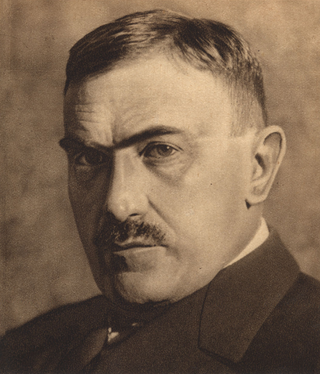 53
Tadeusz Kamil Marcjan Żeleński, better known by his pen name Tadeusz Boy-Żeleński or simply as Boy, was a Polish stage writer, poet, critic and, above all, the translator of over 100 French literary...
53
Tadeusz Kamil Marcjan Żeleński, better known by his pen name Tadeusz Boy-Żeleński or simply as Boy, was a Polish stage writer, poet, critic and, above all, the translator of over 100 French literary...
Jan Śniadecki
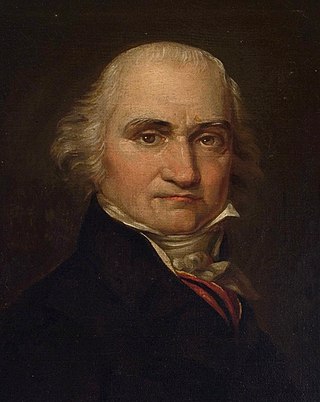 52
Jan Śniadecki was a Polish mathematician, philosopher, and astronomer at the turn of the 18th and 19th centuries.
52
Jan Śniadecki was a Polish mathematician, philosopher, and astronomer at the turn of the 18th and 19th centuries.
Saint Joseph
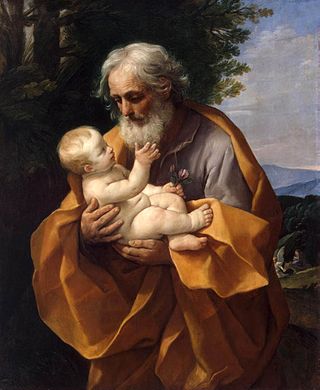 52
Joseph was a 1st-century Jewish man of Nazareth who, according to the canonical Gospels, was married to Mary, the mother of Jesus, and was the legal father of Jesus.
52
Joseph was a 1st-century Jewish man of Nazareth who, according to the canonical Gospels, was married to Mary, the mother of Jesus, and was the legal father of Jesus.
Bolesław II the Bold
 52
Bolesław II the Bold, also known as the Generous was Duke of Poland from 1058 to 1076 and King of Poland from 1076 to 1079. He was the eldest son of Duke Casimir I the Restorer and Maria Dobroniega...
52
Bolesław II the Bold, also known as the Generous was Duke of Poland from 1058 to 1076 and King of Poland from 1076 to 1079. He was the eldest son of Duke Casimir I the Restorer and Maria Dobroniega...
Xawery Dunikowski
 52
Xawery Dunikowski was a Polish sculptor and artist, notable for surviving Auschwitz concentration camp, and best known for his Neo-Romantic sculptures and Auschwitz-inspired art.
52
Xawery Dunikowski was a Polish sculptor and artist, notable for surviving Auschwitz concentration camp, and best known for his Neo-Romantic sculptures and Auschwitz-inspired art.
Wojciech Bogusławski
 52
Wojciech Romuald Bogusławski was a Polish actor, theater director and playwright of the Polish Enlightenment. He was the director of the National Theatre, Warsaw,, during three distinct periods, as...
52
Wojciech Romuald Bogusławski was a Polish actor, theater director and playwright of the Polish Enlightenment. He was the director of the National Theatre, Warsaw,, during three distinct periods, as...
Leonid Teliga
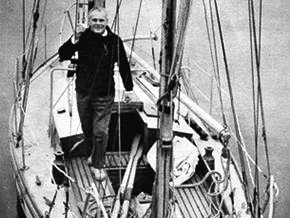 51
Leonid Teliga was a Polish sailor, writer, journalist, translator, and the first Pole to single-handedly circumnavigate the globe on his yawl Opty.
51
Leonid Teliga was a Polish sailor, writer, journalist, translator, and the first Pole to single-handedly circumnavigate the globe on his yawl Opty.
Maximilian Kolbe
 51
Maximilian Maria Kolbe was a Polish Catholic priest and Conventual Franciscan friar who volunteered to die in place of a man named Franciszek Gajowniczek in the German death camp of Auschwitz,...
51
Maximilian Maria Kolbe was a Polish Catholic priest and Conventual Franciscan friar who volunteered to die in place of a man named Franciszek Gajowniczek in the German death camp of Auschwitz,...
Bona Sforza
 51
Bona Sforza d'Aragona was Queen of Poland and Grand Duchess of Lithuania as the second wife of Sigismund the Old, and Duchess of Bari and Rossano by her own right. She was a surviving member of the...
51
Bona Sforza d'Aragona was Queen of Poland and Grand Duchess of Lithuania as the second wife of Sigismund the Old, and Duchess of Bari and Rossano by her own right. She was a surviving member of the...
Louis I of Hungary
Albert Chmielowski
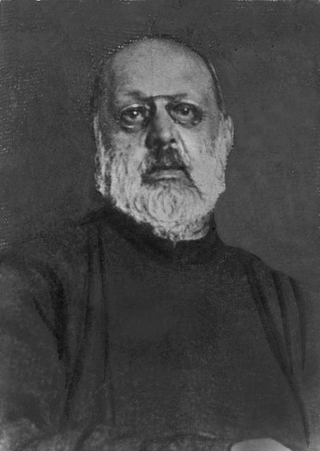 50
Albert Chmielowski - born Adam Hilary Bernard Chmielowski - was a Polish Franciscan tertiary, painter, disabled veteran of the Uprising of 1863, and founder of both the Albertine Brothers and...
50
Albert Chmielowski - born Adam Hilary Bernard Chmielowski - was a Polish Franciscan tertiary, painter, disabled veteran of the Uprising of 1863, and founder of both the Albertine Brothers and...
Casimir IV Jagiellon
 50
Casimir IV was Grand Duke of Lithuania from 1440 and King of Poland from 1447 until his death in 1492. He was one of the most active Polish-Lithuanian rulers; under him, Poland defeated the Teutonic...
50
Casimir IV was Grand Duke of Lithuania from 1440 and King of Poland from 1447 until his death in 1492. He was one of the most active Polish-Lithuanian rulers; under him, Poland defeated the Teutonic...
Augustyn Kordecki
 49
Abbot Augustyn Kordecki was a prior of the Jasna Góra Monastery, Poland.
49
Abbot Augustyn Kordecki was a prior of the Jasna Góra Monastery, Poland.
Walerian Łukasiński
 49
Walerian Łukasiński was a Polish officer and political activist. He was sentenced by Russian Imperial authorities to 14 years' imprisonment. He died after 46 years of solitary incarceration. He...
49
Walerian Łukasiński was a Polish officer and political activist. He was sentenced by Russian Imperial authorities to 14 years' imprisonment. He died after 46 years of solitary incarceration. He...
Johannes Hevelius
 48
Johannes Hevelius was a councillor and mayor of Gdańsk in the Polish–Lithuanian Commonwealth. As an astronomer, he gained a reputation as "the founder of lunar topography", and described ten new...
48
Johannes Hevelius was a councillor and mayor of Gdańsk in the Polish–Lithuanian Commonwealth. As an astronomer, he gained a reputation as "the founder of lunar topography", and described ten new...
Stanisław Mikołajczyk
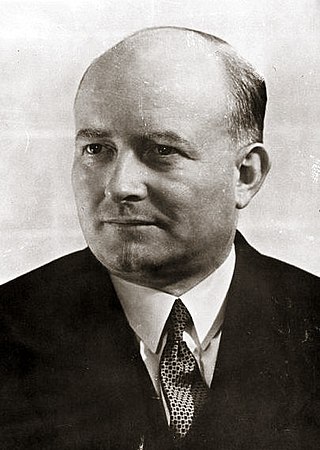 48
Stanisław Mikołajczyk was a Polish politician. He was a Prime Minister of the Polish government-in-exile during World War II, and later Deputy Prime Minister in post-war Poland until 1947.
48
Stanisław Mikołajczyk was a Polish politician. He was a Prime Minister of the Polish government-in-exile during World War II, and later Deputy Prime Minister in post-war Poland until 1947.
Ignacy Skorupka
 48
Ignacy Skorupka was a Polish priest, chaplain of the Polish Army. He died during the battle of Warsaw. He became one of the most famous casualties of the battle.
48
Ignacy Skorupka was a Polish priest, chaplain of the Polish Army. He died during the battle of Warsaw. He became one of the most famous casualties of the battle.
Stefan Jaracz
 47
Stefan Jaracz was a Polish actor and theater producer. He served as the artistic director of Ateneum Theatre in Warsaw during the interwar period (1930–32), and within a short period raised its...
47
Stefan Jaracz was a Polish actor and theater producer. He served as the artistic director of Ateneum Theatre in Warsaw during the interwar period (1930–32), and within a short period raised its...
Eugeniusz Kwiatkowski
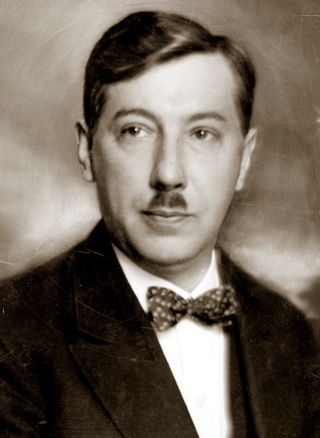 47
Eugeniusz Kwiatkowski was a Polish politician and economist, Deputy Prime Minister of Poland, government minister and manager of the Second Polish Republic.
47
Eugeniusz Kwiatkowski was a Polish politician and economist, Deputy Prime Minister of Poland, government minister and manager of the Second Polish Republic.
Oskar Kolberg
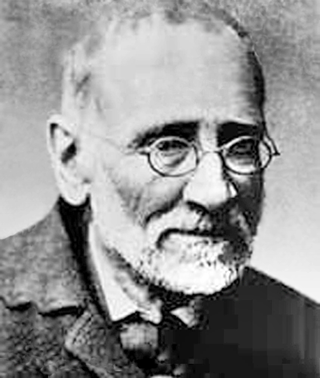 47
Henryk Oskar Kolberg was a Polish ethnographer, folklorist, and composer active in Partitioned Poland.
47
Henryk Oskar Kolberg was a Polish ethnographer, folklorist, and composer active in Partitioned Poland.
Johann Dzierzon
 47
Johann Dzierzon, or Jan Dzierżon or Dzierżoń, also John Dzierzon, was a Polish apiarist who discovered the phenomenon of parthenogenesis in bees.
47
Johann Dzierzon, or Jan Dzierżon or Dzierżoń, also John Dzierzon, was a Polish apiarist who discovered the phenomenon of parthenogenesis in bees.
Karol Kurpiński
 47
Karol Kazimierz Kurpiński was a Polish composer, conductor and pedagogue. He was a representative of late classicism and a member of the Warsaw Society of Friends of Learning. He is also known for...
47
Karol Kazimierz Kurpiński was a Polish composer, conductor and pedagogue. He was a representative of late classicism and a member of the Warsaw Society of Friends of Learning. He is also known for...
Piotr Wysocki
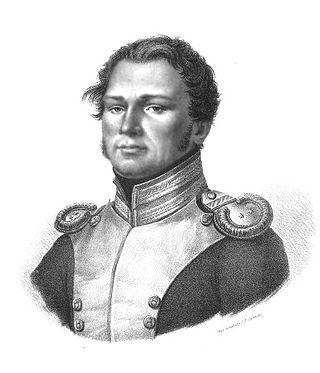 46
Piotr Wysocki, was a Polish captain and leader of the Polish conspiracy against Russian Tsar Nicolas I. He was a nobleman (szlachcic) who bore the Odrowąż coat of arms. On 29 November 1830, he raised...
46
Piotr Wysocki, was a Polish captain and leader of the Polish conspiracy against Russian Tsar Nicolas I. He was a nobleman (szlachcic) who bore the Odrowąż coat of arms. On 29 November 1830, he raised...
Bronisław Czech
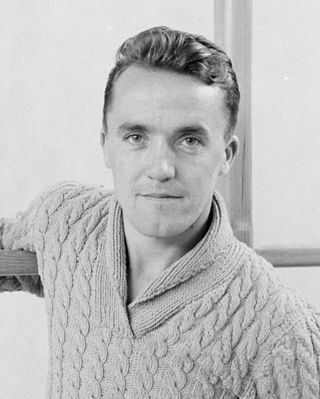 46
Bronisław "Bronek" Czech was a Polish sportsman and artist. A gifted skier, he won championships of Poland 24 times in various skiing disciplines, including Alpine skiing, Nordic skiing and ski...
46
Bronisław "Bronek" Czech was a Polish sportsman and artist. A gifted skier, he won championships of Poland 24 times in various skiing disciplines, including Alpine skiing, Nordic skiing and ski...
Michał Kleofas Ogiński
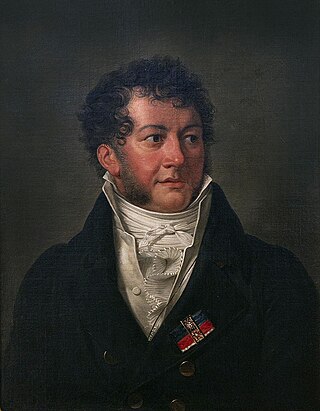 45
Michał Kleofas Ogiński was a Polish diplomat and politician, Grand Treasurer of Lithuania, and a senator of Tsar Alexander I. He was also a composer of late Classical and early Romantic music.
45
Michał Kleofas Ogiński was a Polish diplomat and politician, Grand Treasurer of Lithuania, and a senator of Tsar Alexander I. He was also a composer of late Classical and early Romantic music.
Stanisław Ignacy Witkiewicz
 44
Stanisław Ignacy Witkiewicz, commonly known as Witkacy, was a Polish writer, painter, philosopher, theorist, playwright, novelist, and photographer active before World War I and during the interwar...
44
Stanisław Ignacy Witkiewicz, commonly known as Witkacy, was a Polish writer, painter, philosopher, theorist, playwright, novelist, and photographer active before World War I and during the interwar...
Stefan Starzyński
 44
Stefan Bronisław Starzyński was a Polish statesman, economist, military officer and Mayor of Warsaw before and during the Siege of 1939.
44
Stefan Bronisław Starzyński was a Polish statesman, economist, military officer and Mayor of Warsaw before and during the Siege of 1939.
Stanisław Małachowski
 44
Count Stanisław Małachowski, of the Nałęcz coat-of-arms was a Polish statesman, the first Prime Minister of Poland, a member of the Polish government's Permanent Council (1776–1780), Marshal of the...
44
Count Stanisław Małachowski, of the Nałęcz coat-of-arms was a Polish statesman, the first Prime Minister of Poland, a member of the Polish government's Permanent Council (1776–1780), Marshal of the...
Andrzej Frycz Modrzewski
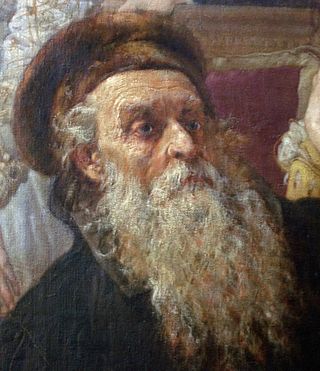 43
Andrzej Frycz Modrzewski was a Polish Renaissance scholar, humanist and theologian, called "the father of Polish democracy". His book De Republica emendanda was widely read and praised across most of...
43
Andrzej Frycz Modrzewski was a Polish Renaissance scholar, humanist and theologian, called "the father of Polish democracy". His book De Republica emendanda was widely read and praised across most of...
Ignacy Prądzyński
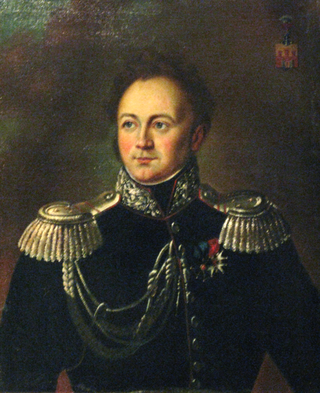 42
Ignacy Prądzyński was a Polish military commander, general of the Polish Army and an engineer. A veteran of the Napoleonic Wars, he was one of the most successful Polish commanders of the November...
42
Ignacy Prądzyński was a Polish military commander, general of the Polish Army and an engineer. A veteran of the Napoleonic Wars, he was one of the most successful Polish commanders of the November...
Józef Chłopicki
 42
Józef Grzegorz Chłopicki was a Polish general who was involved in fighting in Europe at the time of Napoleon and later.
42
Józef Grzegorz Chłopicki was a Polish general who was involved in fighting in Europe at the time of Napoleon and later.
Karol Marcinkowski
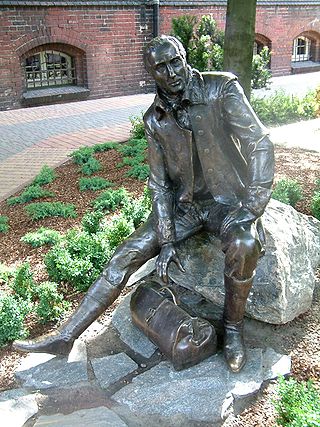 42
Karol Marcinkowski was a Polish physician, social activist in the Greater Poland region, supporter of the basic education programmes, organizer of the Scientific Help Society and the Poznań Bazar -...
42
Karol Marcinkowski was a Polish physician, social activist in the Greater Poland region, supporter of the basic education programmes, organizer of the Scientific Help Society and the Poznań Bazar -...
Hieronim Derdowski
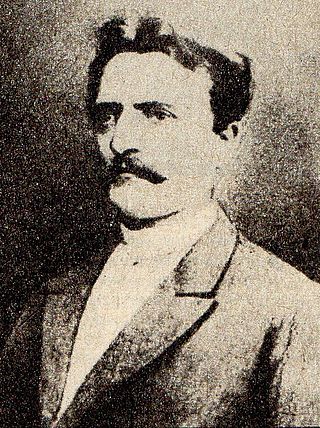 42
Hieronim Derdowski, Kashubian-Polish intellectual and activist, was born to Kashubian parents in the Pomeranian village of Wiele. By the time Derdowski emigrated to the United States in 1885, he had...
42
Hieronim Derdowski, Kashubian-Polish intellectual and activist, was born to Kashubian parents in the Pomeranian village of Wiele. By the time Derdowski emigrated to the United States in 1885, he had...
Alexander Pushkin
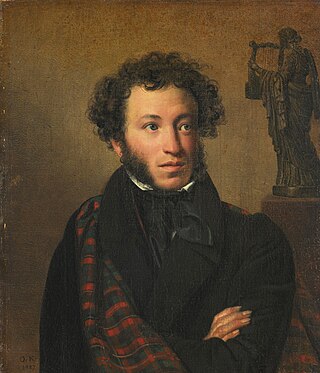 40
Alexander Sergeyevich Pushkin was a Russian poet, playwright, and novelist of the Romantic era. He is considered by many to be the greatest Russian poet, as well as the founder of modern Russian...
40
Alexander Sergeyevich Pushkin was a Russian poet, playwright, and novelist of the Romantic era. He is considered by many to be the greatest Russian poet, as well as the founder of modern Russian...
Jan Zamoyski
 39
Jan Sariusz Zamoyski was a Polish nobleman, magnate, statesman and the 1st ordynat of Zamość. He served as the Royal Secretary from 1565, Deputy Chancellor from 1576, Grand Chancellor of the Crown...
39
Jan Sariusz Zamoyski was a Polish nobleman, magnate, statesman and the 1st ordynat of Zamość. He served as the Royal Secretary from 1565, Deputy Chancellor from 1576, Grand Chancellor of the Crown...
Konstanty Damrot
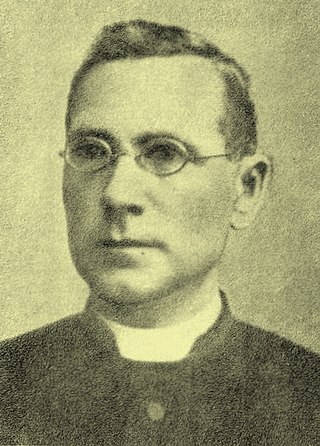 39
Konstanty Damrot ps. Czesław Lubiński – duchowny katolicki, poeta, pisarz i działacz górnośląski.
39
Konstanty Damrot ps. Czesław Lubiński – duchowny katolicki, poeta, pisarz i działacz górnośląski.
Adolf Dygasiński
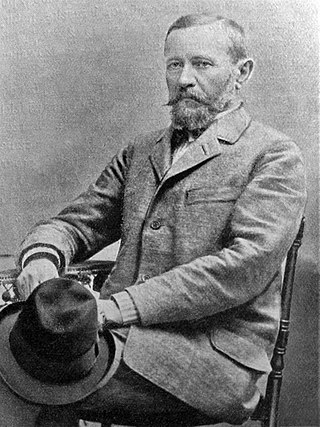 39
Adolf Dygasiński was a Polish novelist, publicist and educator. In Polish literature, he was one of the leading representatives of Naturalism.
39
Adolf Dygasiński was a Polish novelist, publicist and educator. In Polish literature, he was one of the leading representatives of Naturalism.
Jan Twardowski
 39
Jan Jakub Twardowski was a Polish poet and Catholic priest. He was a chief Polish representative of contemporary religious lyrics. He wrote short, simple poems, humorous, which often included...
39
Jan Jakub Twardowski was a Polish poet and Catholic priest. He was a chief Polish representative of contemporary religious lyrics. He wrote short, simple poems, humorous, which often included...
Hubertus
 38
Hubertus or Hubert was a Christian saint who became the first bishop of Liège in 708 A.D. He is the patron saint of hunters, mathematicians, opticians and metalworkers. Known as the "Apostle of the...
38
Hubertus or Hubert was a Christian saint who became the first bishop of Liège in 708 A.D. He is the patron saint of hunters, mathematicians, opticians and metalworkers. Known as the "Apostle of the...
Marie Casimire Sobieska
 38
Marie Casimire Louise de La Grange d'Arquien, known also by the diminutive form "Marysieńka", was a French noblewoman who became the queen consort of Poland and grand duchess consort of Lithuania...
38
Marie Casimire Louise de La Grange d'Arquien, known also by the diminutive form "Marysieńka", was a French noblewoman who became the queen consort of Poland and grand duchess consort of Lithuania...
Saint Roch
 38
Roch, also called Rock in English, was a Majorcan Catholic confessor whose death is commemorated on 16 August and 9 September in Italy; he was especially invoked against the plague. He has the...
38
Roch, also called Rock in English, was a Majorcan Catholic confessor whose death is commemorated on 16 August and 9 September in Italy; he was especially invoked against the plague. He has the...
Berek Joselewicz
 37
Berek Joselewicz was a Polish Jewish colonel of the Polish Army during the Kościuszko Uprising. Joselewicz commanded the first Jewish military formation in modern history excluding Prince Potemkin's...
37
Berek Joselewicz was a Polish Jewish colonel of the Polish Army during the Kościuszko Uprising. Joselewicz commanded the first Jewish military formation in modern history excluding Prince Potemkin's...
Ignacy Mościcki
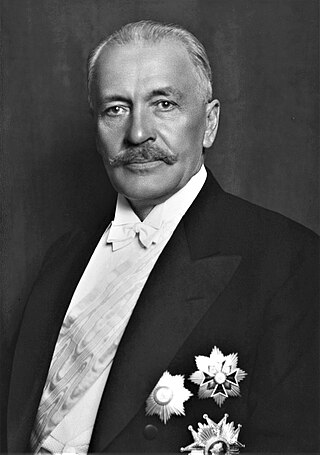 37
Ignacy Mościcki was a Polish chemist and politician who was the country's president from 1926 to 1939. He was the longest serving president in Polish history. Mościcki was the President of Poland...
37
Ignacy Mościcki was a Polish chemist and politician who was the country's president from 1926 to 1939. He was the longest serving president in Polish history. Mościcki was the President of Poland...
Tadeusz Kutrzeba
 37
Tadeusz Kutrzeba was a general of the army during the Second Polish Republic. He served as a major general in the Polish Army in overall command of Army Poznań during the 1939 German Invasion of...
37
Tadeusz Kutrzeba was a general of the army during the Second Polish Republic. He served as a major general in the Polish Army in overall command of Army Poznań during the 1939 German Invasion of...
Władysław Grabski
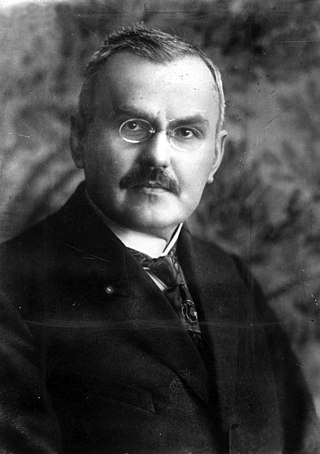 37
Władysław Dominik Grabski was a Polish National Democratic politician, economist and historian. He was the main author of the currency reform in the Second Polish Republic and served as Prime...
37
Władysław Dominik Grabski was a Polish National Democratic politician, economist and historian. He was the main author of the currency reform in the Second Polish Republic and served as Prime...
Yuri Gagarin
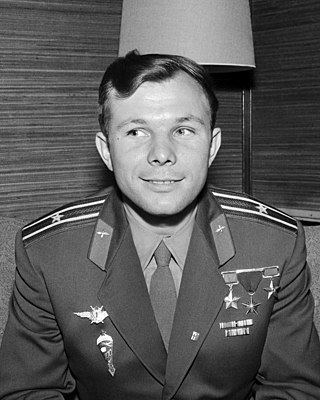 37
Yuri Alekseyevich Gagarin was a Soviet pilot and cosmonaut who, aboard the first successful crewed spaceflight, became the first human to journey into outer space. Travelling on Vostok 1, Gagarin...
37
Yuri Alekseyevich Gagarin was a Soviet pilot and cosmonaut who, aboard the first successful crewed spaceflight, became the first human to journey into outer space. Travelling on Vostok 1, Gagarin...
Tadeusz Bór-Komorowski
 37
Generał Tadeusz Komorowski, better known by the name Bór-Komorowski was a Polish military leader. He was appointed commander in chief a day before the capitulation of the Warsaw Uprising and...
37
Generał Tadeusz Komorowski, better known by the name Bór-Komorowski was a Polish military leader. He was appointed commander in chief a day before the capitulation of the Warsaw Uprising and...
Maria Rodziewiczówna
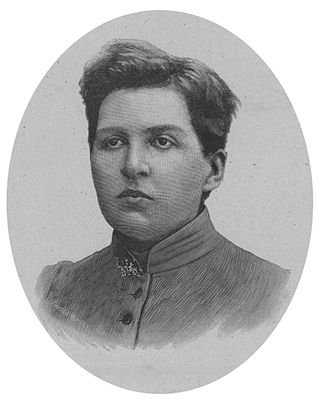 36
Maria Rodziewiczówna was a Polish writer, among the most famous of the interwar years. Her works often addressed patriotism, rural life, and praised the countryside and peasantry. Rodziewiczówna is...
36
Maria Rodziewiczówna was a Polish writer, among the most famous of the interwar years. Her works often addressed patriotism, rural life, and praised the countryside and peasantry. Rodziewiczówna is...
Henryk Siemiradzki
 36
Henryk Hektor Siemiradzki was a Polish painter. He spent most of his active creative life in Rome. Best remembered for his monumental academic art. He was particularly known for his depictions of...
36
Henryk Hektor Siemiradzki was a Polish painter. He spent most of his active creative life in Rome. Best remembered for his monumental academic art. He was particularly known for his depictions of...
Witold Gombrowicz
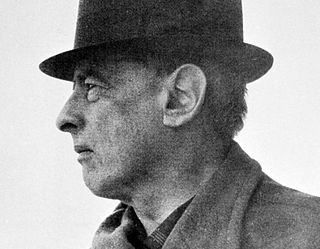 36
Witold Marian Gombrowicz was a Polish writer and playwright. His works are characterised by deep psychological analysis, a certain sense of paradox and absurd, anti-nationalist flavor. In 1937, he...
36
Witold Marian Gombrowicz was a Polish writer and playwright. His works are characterised by deep psychological analysis, a certain sense of paradox and absurd, anti-nationalist flavor. In 1937, he...
Jan Kiepura
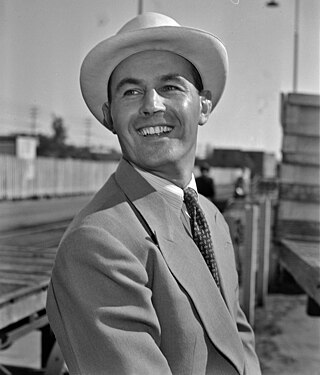 35
Jan Wiktor Kiepura was a Polish singer and actor.
35
Jan Wiktor Kiepura was a Polish singer and actor.
Aleksander Gierymski
 35
Ignacy Aleksander Gierymski was a Polish painter of the late 19th century, the younger brother of Maksymilian Gierymski. He was a representative of Realism as well as an important precursor of...
35
Ignacy Aleksander Gierymski was a Polish painter of the late 19th century, the younger brother of Maksymilian Gierymski. He was a representative of Realism as well as an important precursor of...
Florian Ceynowa
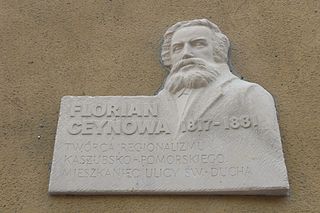 35
Florian Stanisław Ceynowa was a doctor, political activist, writer, and linguist. He undertook efforts to identify Kashubian language, culture and traditions. He and Alexander Hilferding were not the...
35
Florian Stanisław Ceynowa was a doctor, political activist, writer, and linguist. He undertook efforts to identify Kashubian language, culture and traditions. He and Alexander Hilferding were not the...
Santa Claus
 34
Santa Claus is a legendary figure originating in Western Christian culture who is said to bring gifts during the late evening and overnight hours on Christmas Eve. He is said to accomplish this with...
34
Santa Claus is a legendary figure originating in Western Christian culture who is said to bring gifts during the late evening and overnight hours on Christmas Eve. He is said to accomplish this with...
Piotr Wawrzyniak
 34
Piotr Wawrzyniak was a Polish priest, economic and educational activist, patron of the Union of the Earnings and Economic Societies.
34
Piotr Wawrzyniak was a Polish priest, economic and educational activist, patron of the Union of the Earnings and Economic Societies.
Anthony of Padua
 34
Anthony of Padua, OFM or Anthony of Lisbon was a Portuguese Catholic priest and friar of the Franciscan Order.
34
Anthony of Padua, OFM or Anthony of Lisbon was a Portuguese Catholic priest and friar of the Franciscan Order.
Stefania Sempołowska
 34
Stefania Sempołowska was a Polish educator, activist and writer.
34
Stefania Sempołowska was a Polish educator, activist and writer.
Piotr Michałowski
 34
Piotr Michałowski was a Polish painter of the Romantic period, especially known for his many portraits, and oil studies of horses. Broadly educated, he was also a social activist, legal advocate,...
34
Piotr Michałowski was a Polish painter of the Romantic period, especially known for his many portraits, and oil studies of horses. Broadly educated, he was also a social activist, legal advocate,...
Napoleon
 34
Napoleon Bonaparte, later known by his regnal name Napoleon I, was a French emperor and military commander who rose to prominence during the French Revolution and led successful campaigns during the...
34
Napoleon Bonaparte, later known by his regnal name Napoleon I, was a French emperor and military commander who rose to prominence during the French Revolution and led successful campaigns during the...
Stanisław Dubois
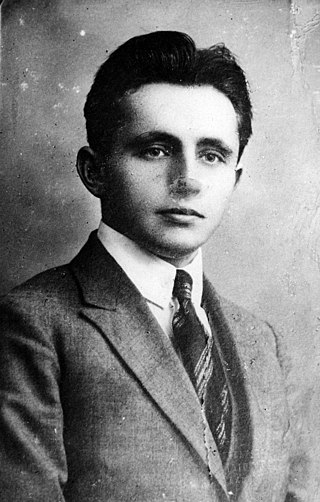 33
Stanisław Józef Dubois was a Polish journalist and political activist in the Second Polish Republic, member of the left-wing Polish Socialist Party as well as the Youth Organisation of the Workers'...
33
Stanisław Józef Dubois was a Polish journalist and political activist in the Second Polish Republic, member of the left-wing Polish Socialist Party as well as the Youth Organisation of the Workers'...
Jakub Jasiński
 33
Jakub Krzysztof Jasiński of Rawicz Clan was a Polish general, and poet of Enlightenment. He participated in the War in Defence of the Constitution in 1792, was an enemy of the Targowica Confederation...
33
Jakub Krzysztof Jasiński of Rawicz Clan was a Polish general, and poet of Enlightenment. He participated in the War in Defence of the Constitution in 1792, was an enemy of the Targowica Confederation...
Jacob
 33
Jacob, later given the name Israel, is regarded as a patriarch of the Israelites and is an important figure in Abrahamic religions, such as Judaism, Samaritanism, Christianity, and Islam. Jacob first...
33
Jacob, later given the name Israel, is regarded as a patriarch of the Israelites and is an important figure in Abrahamic religions, such as Judaism, Samaritanism, Christianity, and Islam. Jacob first...
Tytus Chałubiński
 32
Tytus Aureliusz Chałubiński was a Polish physician, naturalist, and co-founder of the Polish Tatra Society. His collections of natural history specimens are now held in the Tatra Mountains Museum in...
32
Tytus Aureliusz Chałubiński was a Polish physician, naturalist, and co-founder of the Polish Tatra Society. His collections of natural history specimens are now held in the Tatra Mountains Museum in...
Sigismund II Augustus
 32
Sigismund II Augustus was King of Poland and Grand Duke of Lithuania, the son of Sigismund I the Old, whom Sigismund II succeeded in 1548. He was the first ruler of the Polish–Lithuanian Commonwealth...
32
Sigismund II Augustus was King of Poland and Grand Duke of Lithuania, the son of Sigismund I the Old, whom Sigismund II succeeded in 1548. He was the first ruler of the Polish–Lithuanian Commonwealth...
Ludwik Mierosławski
 32
Ludwik Adam Mierosławski was a Polish general, writer, poet, historian and political activist. Mierosławski took part in the November Uprising of the 1830s, and after its failure he emigrated to...
32
Ludwik Adam Mierosławski was a Polish general, writer, poet, historian and political activist. Mierosławski took part in the November Uprising of the 1830s, and after its failure he emigrated to...
Norbert Barlicki
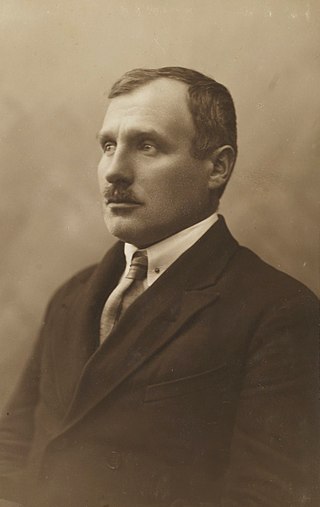 32
Norbert Barlicki was a Polish publicist, lawyer and politician of the Polish Socialist Party (PPS).
32
Norbert Barlicki was a Polish publicist, lawyer and politician of the Polish Socialist Party (PPS).
Paweł Stalmach
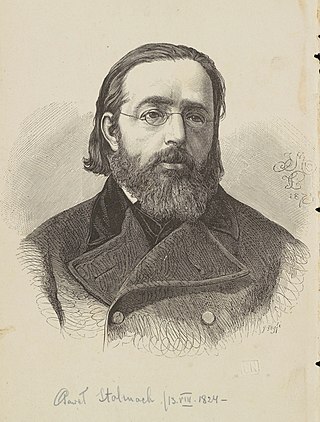 32
Paweł Stalmach − polski dziennikarz, publicysta, redaktor i wydawca gazet, działacz społeczny i narodowy działający na Śląsku Cieszyńskim.
32
Paweł Stalmach − polski dziennikarz, publicysta, redaktor i wydawca gazet, działacz społeczny i narodowy działający na Śląsku Cieszyńskim.
Czesław Niemen
 32
Czesław Niemen, often credited as just Niemen, was one of the most important and original Polish singer-songwriters and rock balladeers of the 20th century, singing mainly in Polish.
32
Czesław Niemen, often credited as just Niemen, was one of the most important and original Polish singer-songwriters and rock balladeers of the 20th century, singing mainly in Polish.
Henryk Jordan
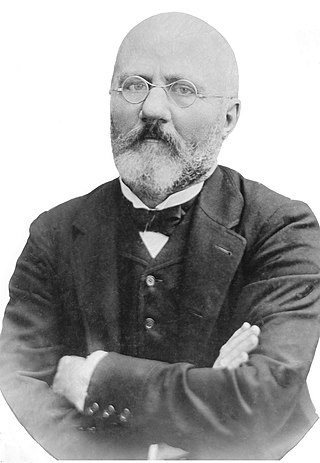 32
Henryk Jordan was a Polish philanthropist, physician and pioneer of physical education. A professor of obstetrics from 1895 at Kraków's Jagiellonian University, Jordan became best known for...
32
Henryk Jordan was a Polish philanthropist, physician and pioneer of physical education. A professor of obstetrics from 1895 at Kraków's Jagiellonian University, Jordan became best known for...
Władysław III of Poland
 32
Władysław III of Poland, also known as Ladislaus of Varna, was King of Poland and Supreme Duke of the Grand Duchy of Lithuania from 1434 as well as King of Hungary and Croatia from 1440 until his...
32
Władysław III of Poland, also known as Ladislaus of Varna, was King of Poland and Supreme Duke of the Grand Duchy of Lithuania from 1434 as well as King of Hungary and Croatia from 1440 until his...
Władysław Syrokomla
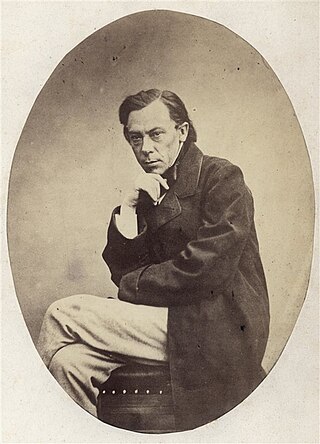 31
Ludwik Władysław Franciszek Kondratowicz, better known as Władysław Syrokomla, was a Polish romantic poet, writer and translator working in Vilnius and Vilna Governorate, then Russian Empire, whose...
31
Ludwik Władysław Franciszek Kondratowicz, better known as Władysław Syrokomla, was a Polish romantic poet, writer and translator working in Vilnius and Vilna Governorate, then Russian Empire, whose...
Martin of Tours
 31
Martin of Tours, also known as Martin the Merciful, was the third bishop of Tours. He has become one of the most familiar and recognizable Christian saints in France, heralded as the patron saint of...
31
Martin of Tours, also known as Martin the Merciful, was the third bishop of Tours. He has become one of the most familiar and recognizable Christian saints in France, heralded as the patron saint of...
Józef Dwernicki
 31
Józef Dwernicki was a General of Cavalry in the Polish Army, and a participant in the November Uprising (1830–1831).
31
Józef Dwernicki was a General of Cavalry in the Polish Army, and a participant in the November Uprising (1830–1831).
Witold Lutosławski
 31
Witold Roman Lutosławski was a Polish composer and conductor. Among the major composers of 20th-century classical music, he is "generally regarded as the most significant Polish composer since...
31
Witold Roman Lutosławski was a Polish composer and conductor. Among the major composers of 20th-century classical music, he is "generally regarded as the most significant Polish composer since...
Anna Jagiellon
 31
Anna Jagiellon was Queen of Poland and Grand Duchess of Lithuania from 1575 to 1587.
31
Anna Jagiellon was Queen of Poland and Grand Duchess of Lithuania from 1575 to 1587.
Henry II the Pious
 30
Henry II the Pious was Duke of Silesia and High Duke of Poland as well as Duke of South-Greater Poland from 1238 until his death. Between 1238 and 1239 he also served as regent of Sandomierz and...
30
Henry II the Pious was Duke of Silesia and High Duke of Poland as well as Duke of South-Greater Poland from 1238 until his death. Between 1238 and 1239 he also served as regent of Sandomierz and...
Antoni Abraham
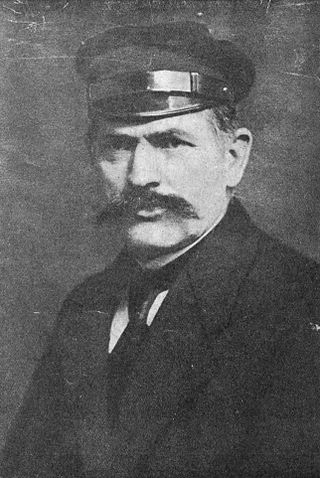 30
Antoni Abraham was a Polish promoter of Pomeranian culture, Kashubian activist and popular writer.
30
Antoni Abraham was a Polish promoter of Pomeranian culture, Kashubian activist and popular writer.
Stanisław August Poniatowski
 30
Stanisław II August, known also by his regnal Latin name Stanislaus II Augustus, and as Stanisław August Poniatowski, was King of Poland and Grand Duke of Lithuania from 1764 to 1795, and the last...
30
Stanisław II August, known also by his regnal Latin name Stanislaus II Augustus, and as Stanisław August Poniatowski, was King of Poland and Grand Duke of Lithuania from 1764 to 1795, and the last...
Karol Olszewski
 29
Karol Stanisław Olszewski was a Polish chemist, mathematician and physicist. Together with Zygmunt Wróblewski, he was the first scientist in the world to liquify oxygen and nitrogen in 1883.
29
Karol Stanisław Olszewski was a Polish chemist, mathematician and physicist. Together with Zygmunt Wróblewski, he was the first scientist in the world to liquify oxygen and nitrogen in 1883.
Teofil Lenartowicz
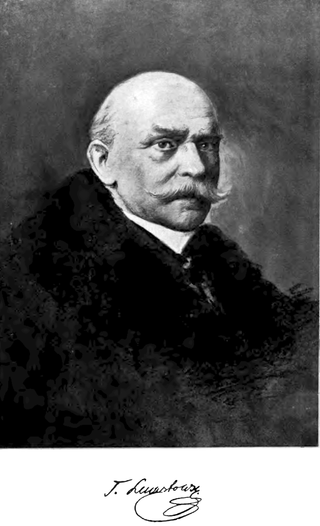 29
Teofil Aleksander Lenartowicz was a Polish ethnographer, sculptor, poet and Romantic conspirator. Linked to Bohemians among Warsaw intellectuals, Lenartowicz was associated with Oskar Kolberg and...
29
Teofil Aleksander Lenartowicz was a Polish ethnographer, sculptor, poet and Romantic conspirator. Linked to Bohemians among Warsaw intellectuals, Lenartowicz was associated with Oskar Kolberg and...
Edward Dembowski
 29
Edward Dembowski was a Polish philosopher, literary critic, journalist, and leftist independence activist.
29
Edward Dembowski was a Polish philosopher, literary critic, journalist, and leftist independence activist.
Tadeusz Makowski
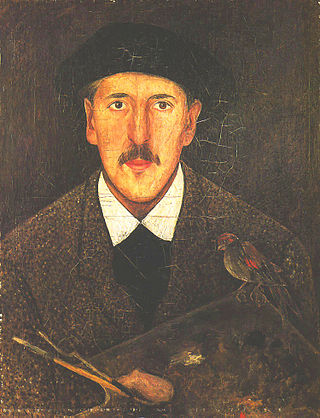 29
Tadeusz Makowski was a Polish painter who worked in France and was associated with the School of Paris.
29
Tadeusz Makowski was a Polish painter who worked in France and was associated with the School of Paris.
Faustina Kowalska
 29
Maria Faustyna Kowalska, OLM, also known as Maria Faustyna Kowalska of the Blessed Sacrament, was a Polish Catholic religious sister and mystic. Faustyna, popularly spelled "Faustina", had...
29
Maria Faustyna Kowalska, OLM, also known as Maria Faustyna Kowalska of the Blessed Sacrament, was a Polish Catholic religious sister and mystic. Faustyna, popularly spelled "Faustina", had...
Henry the Bearded
 28
Henry the Bearded was a Polish duke from the Piast dynasty.
28
Henry the Bearded was a Polish duke from the Piast dynasty.
Stanisław Brzóska
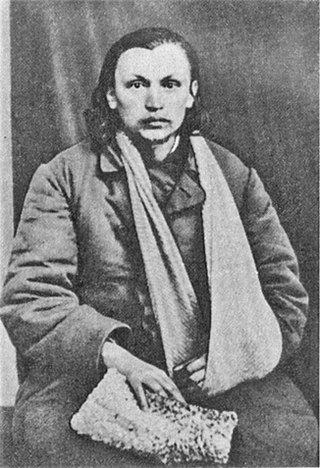 28
Stanisław Brzóska was a Polish priest, general, one of leaders of the Polish insurgency and the last partisan of the January Uprising. He commanded the Polish detachment in South Podlasie and...
28
Stanisław Brzóska was a Polish priest, general, one of leaders of the Polish insurgency and the last partisan of the January Uprising. He commanded the Polish detachment in South Podlasie and...
Józef Elsner
 27
Józef Antoni Franciszek Elsner was a Polish composer, music teacher, and music theoretician, active mainly in Warsaw. He was one of the first composers in Poland to weave elements of folk music into...
27
Józef Antoni Franciszek Elsner was a Polish composer, music teacher, and music theoretician, active mainly in Warsaw. He was one of the first composers in Poland to weave elements of folk music into...
Franciszek Żwirko
 27
Franciszek Żwirko [english pronunciation like: frantsishek zhvirko] was a prominent Polish sport and military aviator. Along with Stanisław Wigura, he won the international air contest Challenge 1932.
27
Franciszek Żwirko [english pronunciation like: frantsishek zhvirko] was a prominent Polish sport and military aviator. Along with Stanisław Wigura, he won the international air contest Challenge 1932.
Mieczysław Niedziałkowski
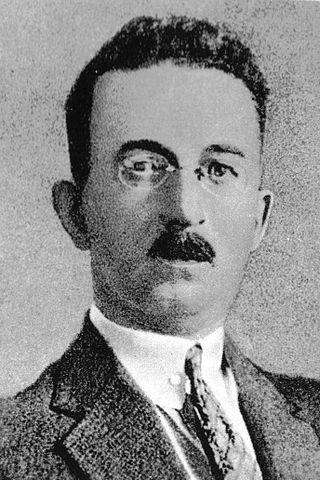 27
Mieczysław Niedziałkowski was a Polish politician and writer. He was an activist in the Polish Socialist Party, editor in chief of Robotnik, and one of the primary activists and cofounders of the...
27
Mieczysław Niedziałkowski was a Polish politician and writer. He was an activist in the Polish Socialist Party, editor in chief of Robotnik, and one of the primary activists and cofounders of the...
Vytautas
 27
Vytautas, also known as Vytautas the Great from the late 14th century onwards, was a ruler of the Grand Duchy of Lithuania. He was also the prince of Grodno (1370–1382), prince of Lutsk (1387–1389),...
27
Vytautas, also known as Vytautas the Great from the late 14th century onwards, was a ruler of the Grand Duchy of Lithuania. He was also the prince of Grodno (1370–1382), prince of Lutsk (1387–1389),...
Saint Peter
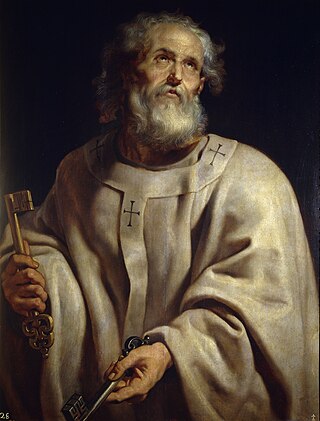 27
Saint Peter, also known as Peter the Apostle, Simon Peter, Simeon, Simon, or Cephas, was one of the Twelve Apostles of Jesus Christ and one of the first leaders of the early Christian Church. He...
27
Saint Peter, also known as Peter the Apostle, Simon Peter, Simeon, Simon, or Cephas, was one of the Twelve Apostles of Jesus Christ and one of the first leaders of the early Christian Church. He...
Władysław IV Vasa
 27
Władysław IV Vasa or Ladislaus IV of Poland was King of Poland, Grand Duke of Lithuania and claimant of the thrones of Sweden and Russia. Born into the House of Vasa as a prince of Poland and of...
27
Władysław IV Vasa or Ladislaus IV of Poland was King of Poland, Grand Duke of Lithuania and claimant of the thrones of Sweden and Russia. Born into the House of Vasa as a prince of Poland and of...
Stanisław Dąbek
 27
Stanisław Dąbek was a Polish infantry colonel in the Polish Armed Forces, he was commander of the Marine Brigade of National Defense and acting commander of the Land Defense of the Coast during the...
27
Stanisław Dąbek was a Polish infantry colonel in the Polish Armed Forces, he was commander of the Marine Brigade of National Defense and acting commander of the Land Defense of the Coast during the...
Stanisław Przybyszewski
 27
Stanisław Przybyszewski was a Polish novelist, dramatist, and poet of the decadent naturalistic school. His drama is associated with the Symbolist movement. He wrote both in Polish and in German.
27
Stanisław Przybyszewski was a Polish novelist, dramatist, and poet of the decadent naturalistic school. His drama is associated with the Symbolist movement. He wrote both in Polish and in German.
Franklin D. Roosevelt
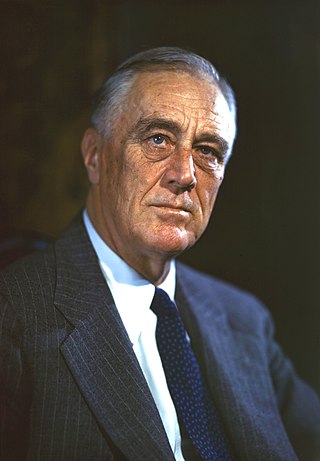 26
Franklin Delano Roosevelt, commonly known by his initials FDR, was an American statesman and politician who served as the 32nd president of the United States from 1933 until his death in 1945. He was...
26
Franklin Delano Roosevelt, commonly known by his initials FDR, was an American statesman and politician who served as the 32nd president of the United States from 1933 until his death in 1945. He was...
Saint Lawrence
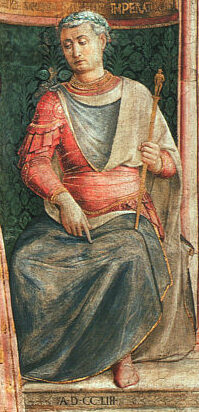 26
Saint Lawrence or Laurence was one of the seven deacons of the city of Rome under Pope Sixtus II who were martyred in the persecution of the Christians that the Roman Emperor Valerian ordered in 258.
26
Saint Lawrence or Laurence was one of the seven deacons of the city of Rome under Pope Sixtus II who were martyred in the persecution of the Christians that the Roman Emperor Valerian ordered in 258.
Mary, mother of Jesus
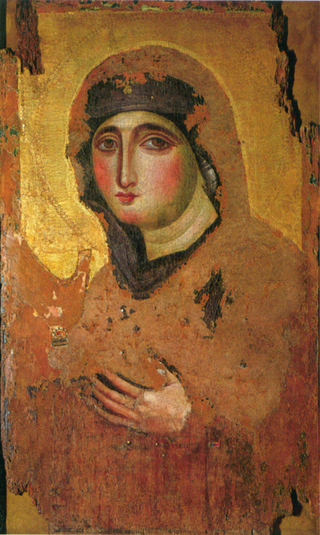 26
Mary was a first-century Jewish woman of Nazareth, the wife of Joseph and the mother of Jesus. She is a central figure of Christianity, venerated under various titles such as virgin or queen, many of...
26
Mary was a first-century Jewish woman of Nazareth, the wife of Joseph and the mother of Jesus. She is a central figure of Christianity, venerated under various titles such as virgin or queen, many of...
Hans Christian Andersen
 26
Hans Christian Andersen was a Danish author. Although a prolific writer of plays, travelogues, novels, and poems, he is best remembered for his literary fairy tales.
26
Hans Christian Andersen was a Danish author. Although a prolific writer of plays, travelogues, novels, and poems, he is best remembered for his literary fairy tales.
Pola Gojawiczyńska
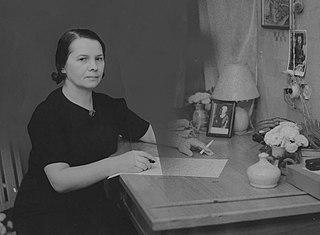 26
Pola Gojawiczyńska, real name Apolonia Gojawiczyńska, née Koźniewska was a Polish writer.
26
Pola Gojawiczyńska, real name Apolonia Gojawiczyńska, née Koźniewska was a Polish writer.
Lucjan Rydel
 26
Lucjan Rydel, also known as Lucjan Antoni Feliks Rydel, was a Polish playwright and poet from the Young Poland movement.
26
Lucjan Rydel, also known as Lucjan Antoni Feliks Rydel, was a Polish playwright and poet from the Young Poland movement.
Józef Zajączek
 26
Prince Józef Zajączek was a Polish general and politician.
26
Prince Józef Zajączek was a Polish general and politician.
Bronisław Malinowski
 26
Bronisław Kasper Malinowski was a Polish-British anthropologist and ethnologist whose writings on ethnography, social theory, and field research have exerted a lasting influence on the discipline of...
26
Bronisław Kasper Malinowski was a Polish-British anthropologist and ethnologist whose writings on ethnography, social theory, and field research have exerted a lasting influence on the discipline of...
Pan Tadeusz
 26
Pan Tadeusz is an epic poem by the Polish poet, writer, translator and philosopher Adam Mickiewicz. The book, written in Polish alexandrines, was first published by Aleksander Jełowicki on 28 June...
26
Pan Tadeusz is an epic poem by the Polish poet, writer, translator and philosopher Adam Mickiewicz. The book, written in Polish alexandrines, was first published by Aleksander Jełowicki on 28 June...
Julian Przyboś
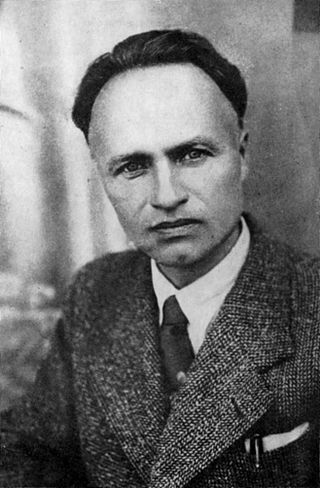 26
Julian Przyboś was a Polish poet, essayist and translator, one of the most important poets of the Kraków Avant-Garde.
26
Julian Przyboś was a Polish poet, essayist and translator, one of the most important poets of the Kraków Avant-Garde.
Kinga of Poland
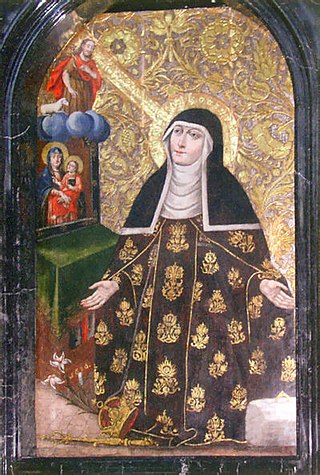 26
Kinga of Poland or Kinga of Hungary, also Saint Kinga is a saint in the Catholic Church and patroness of Poland and Lithuania.
26
Kinga of Poland or Kinga of Hungary, also Saint Kinga is a saint in the Catholic Church and patroness of Poland and Lithuania.
Casimir I the Restorer
 26
Casimir I the Restorer, a member of the Piast dynasty, was the duke of Poland from 1040 until his death. Casimir was the son of Mieszko II Lambert and Richeza of Lotharingia. He is known as the...
26
Casimir I the Restorer, a member of the Piast dynasty, was the duke of Poland from 1040 until his death. Casimir was the son of Mieszko II Lambert and Richeza of Lotharingia. He is known as the...
Aleksander Majkowski
 25
Aleksander Majkowski was a Polish-Kashubian writer, poet, journalist, editor, activist, and physician. He was the most important figure in the Kashubian movement before World War II. He was the...
25
Aleksander Majkowski was a Polish-Kashubian writer, poet, journalist, editor, activist, and physician. He was the most important figure in the Kashubian movement before World War II. He was the...
Ludomir Różycki
Jerzy Kukuczka
 25
Józef Jerzy Kukuczka was a Polish mountaineer. He was born in Katowice, his family was ethnically Silesian Goral. On 18 September 1987, he became the second man to climb all fourteen...
25
Józef Jerzy Kukuczka was a Polish mountaineer. He was born in Katowice, his family was ethnically Silesian Goral. On 18 September 1987, he became the second man to climb all fourteen...
Catherine of Alexandria
 25
Catherine of Alexandria, also spelled Katherine is, according to tradition, a Christian saint and virgin, who was martyred in the early fourth century at the hands of the emperor Maxentius. According...
25
Catherine of Alexandria, also spelled Katherine is, according to tradition, a Christian saint and virgin, who was martyred in the early fourth century at the hands of the emperor Maxentius. According...
Jędrzej Śniadecki
 25
Jędrzej Śniadecki was a Polish writer, physician, chemist, biologist and philosopher. His achievements include being the first person who linked rickets to lack of sunlight. He also created modern...
25
Jędrzej Śniadecki was a Polish writer, physician, chemist, biologist and philosopher. His achievements include being the first person who linked rickets to lack of sunlight. He also created modern...
Antoni Grabowski
 25
Antoni Grabowski was a Polish chemical engineer, and an activist of the early Esperanto movement. His translations had an influential impact on the development of Esperanto into a language of...
25
Antoni Grabowski was a Polish chemical engineer, and an activist of the early Esperanto movement. His translations had an influential impact on the development of Esperanto into a language of...
Arka Bożek
 24
Arka Bożek, właśc. Arkadiusz Bożek – polski działacz na Śląsku Opolskim, członek Rady Narodowej RP (1939–1945), wicewojewoda śląski (1945–1950), poseł do Krajowej Rady Narodowej (1946–1947) i Sejmu...
24
Arka Bożek, właśc. Arkadiusz Bożek – polski działacz na Śląsku Opolskim, członek Rady Narodowej RP (1939–1945), wicewojewoda śląski (1945–1950), poseł do Krajowej Rady Narodowej (1946–1947) i Sejmu...
Tadeusz Zawadzki
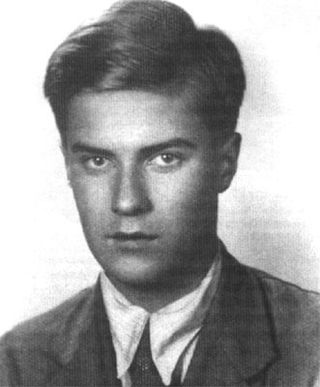 24
Tadeusz Leon Józef Zawadzki, alias "Kajman", "Kotwicki", "Lech Pomarańczowy", "Tadeusz", or "Zośka", was a Polish scout instructor, scoutmaster, Home Army second lieutenant, commander of assault...
24
Tadeusz Leon Józef Zawadzki, alias "Kajman", "Kotwicki", "Lech Pomarańczowy", "Tadeusz", or "Zośka", was a Polish scout instructor, scoutmaster, Home Army second lieutenant, commander of assault...
Maurycy Mochnacki
 24
Maurycy Mochnacki was a Polish literary, theatre and music critic, publicist, journalist, pianist, historian and independence activist. One of the main theorists of Polish Romanticism. He joined the...
24
Maurycy Mochnacki was a Polish literary, theatre and music critic, publicist, journalist, pianist, historian and independence activist. One of the main theorists of Polish Romanticism. He joined the...
August Emil Fieldorf
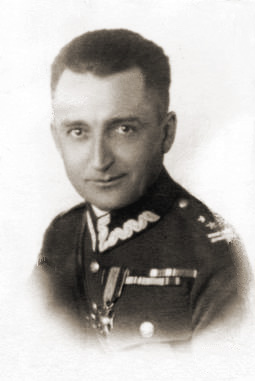 24
August Emil Fieldorf was a Polish brigadier general who served as deputy commander-in-chief of the Home Army after the suppression of the Warsaw Uprising.
24
August Emil Fieldorf was a Polish brigadier general who served as deputy commander-in-chief of the Home Army after the suppression of the Warsaw Uprising.
Helena Marusarzówna
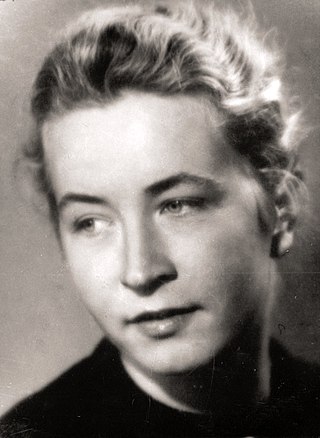 24
Helena Marusarzówna – polska mistrzyni sportów narciarskich, kurierka tatrzańska, żołnierz Związku Walki Zbrojnej (ZWZ).
24
Helena Marusarzówna – polska mistrzyni sportów narciarskich, kurierka tatrzańska, żołnierz Związku Walki Zbrojnej (ZWZ).
Kornel Ujejski
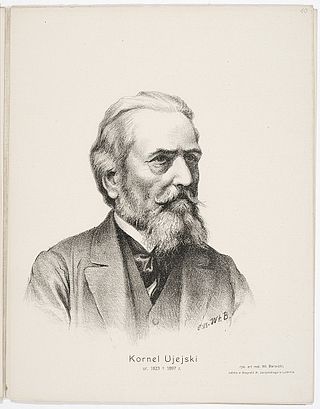 24
Kornel Ujejski, also known as Cornelius Ujejski, was a Polish poet, patriot and political writer of the Austrian Empire and Austria-Hungary.
24
Kornel Ujejski, also known as Cornelius Ujejski, was a Polish poet, patriot and political writer of the Austrian Empire and Austria-Hungary.
Francis of Assisi
 24
Giovanni di Pietro di Bernardone, known as Francis of Assisi, was an Italian mystic, poet and Catholic friar who founded the religious order of the Franciscans. He was inspired to lead a Christian...
24
Giovanni di Pietro di Bernardone, known as Francis of Assisi, was an Italian mystic, poet and Catholic friar who founded the religious order of the Franciscans. He was inspired to lead a Christian...
Hassling-Ketling of Elgin
 23
Ketling is a fictional character in Henryk Sienkiewicz's novel Fire in the Steppe, the third volume of his award-winning The Trilogy. A Scotsman, Ketling moved to Poland where he became a Colonel of...
23
Ketling is a fictional character in Henryk Sienkiewicz's novel Fire in the Steppe, the third volume of his award-winning The Trilogy. A Scotsman, Ketling moved to Poland where he became a Colonel of...
Alfred Szklarski
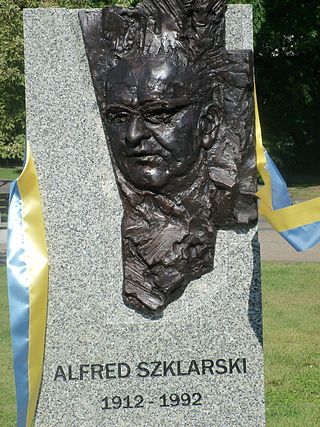 23
Alfred Szklarski was a Polish author of youth literature. He also published his books under the pseudonyms Alfred Bronowski, Fred Garland and Alfred Murawski.
23
Alfred Szklarski was a Polish author of youth literature. He also published his books under the pseudonyms Alfred Bronowski, Fred Garland and Alfred Murawski.
Maksymilian Gierymski
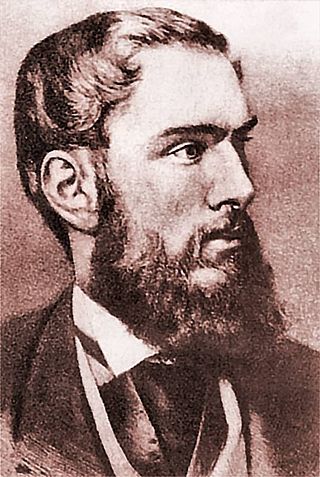 23
Maksymilian Dionizy Gierymski was a Polish painter, specializing mainly in watercolours. He was the older brother of painter Aleksander Gierymski.
23
Maksymilian Dionizy Gierymski was a Polish painter, specializing mainly in watercolours. He was the older brother of painter Aleksander Gierymski.
Wincenty Kadłubek
 23
Wincenty Kadłubek was a Polish Catholic prelate and professed Cistercian who served as the Bishop of Kraków from 1208 until his resignation in 1218. His episcopal mission was to reform the diocesan...
23
Wincenty Kadłubek was a Polish Catholic prelate and professed Cistercian who served as the Bishop of Kraków from 1208 until his resignation in 1218. His episcopal mission was to reform the diocesan...
Janina Porazińska
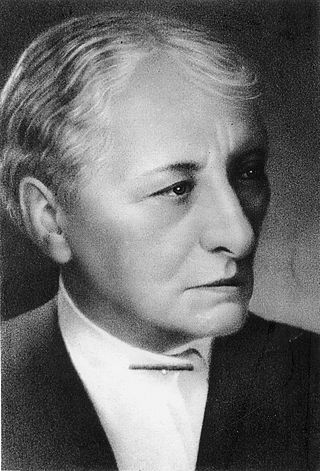 23
Janina Porazińska – polska prozaiczka, redaktorka, tłumaczka literatury skandynawskiej i literatury szwedzkojęzycznej.
23
Janina Porazińska – polska prozaiczka, redaktorka, tłumaczka literatury skandynawskiej i literatury szwedzkojęzycznej.
Tadeusz Sygietyński
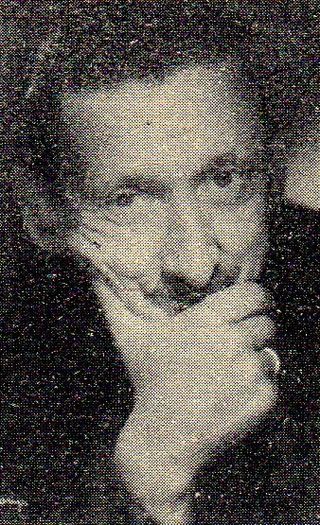 23
Tadeusz Sygietyński – polski kompozytor i dyrygent, pedagog muzyczny, założyciel Państwowego Zespołu Ludowego Pieśni i Tańca „Mazowsze” (1948).
23
Tadeusz Sygietyński – polski kompozytor i dyrygent, pedagog muzyczny, założyciel Państwowego Zespołu Ludowego Pieśni i Tańca „Mazowsze” (1948).
Karol Libelt
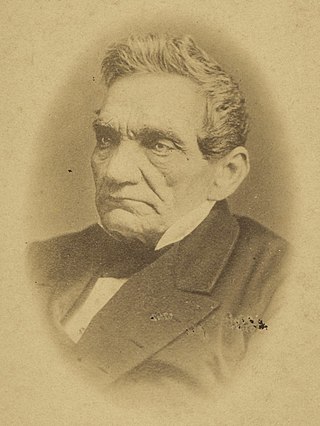 22
Karol Libelt was a Polish philosopher, writer, political and social activist, social worker and liberal, nationalist politician, and president of the Poznań Society of Friends of Learning.
22
Karol Libelt was a Polish philosopher, writer, political and social activist, social worker and liberal, nationalist politician, and president of the Poznań Society of Friends of Learning.
Józef Mirecki
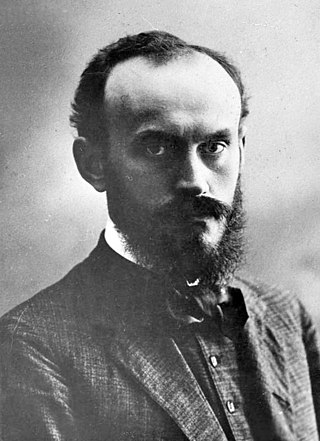 22
Józef Anastazy Mirecki, pseudonim „Montwiłł”, „Grzegorz”, „Bronisław”, „Sawicki” – polski socjalista, jeden z przywódców Organizacji Bojowej Polskiej Partii Socjalistycznej i członek jej Wydziału...
22
Józef Anastazy Mirecki, pseudonim „Montwiłł”, „Grzegorz”, „Bronisław”, „Sawicki” – polski socjalista, jeden z przywódców Organizacji Bojowej Polskiej Partii Socjalistycznej i członek jej Wydziału...
Wojciech Kętrzyński
 22
Wojciech Kętrzyński, was a Polish historian and the director of the Ossolineum Library in Lemberg, then the capital of Galicia, Austrian Empire. He focused on Polish history at a time when Poland was...
22
Wojciech Kętrzyński, was a Polish historian and the director of the Ossolineum Library in Lemberg, then the capital of Galicia, Austrian Empire. He focused on Polish history at a time when Poland was...
Romuald Mielczarski
 22
Romuald Mielczarski (ps. Jan Wierzba) – działacz spółdzielczy i niepodległościowy. Współtwórca Towarzystwa Kooperatystów, prezes Związku Spółdzielni Spożywców RP.
22
Romuald Mielczarski (ps. Jan Wierzba) – działacz spółdzielczy i niepodległościowy. Współtwórca Towarzystwa Kooperatystów, prezes Związku Spółdzielni Spożywców RP.
Janusz Groszkowski
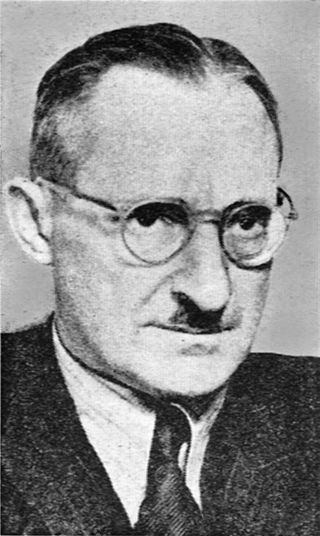 22
Janusz Groszkowski – polski naukowiec zajmujący się elektroniką i radiotechniką, kandydat do nagrody Nobla, inżynier, prezes Polskiej Akademii Nauk, polityk, przewodniczący Ogólnopolskiego Komitetu...
22
Janusz Groszkowski – polski naukowiec zajmujący się elektroniką i radiotechniką, kandydat do nagrody Nobla, inżynier, prezes Polskiej Akademii Nauk, polityk, przewodniczący Ogólnopolskiego Komitetu...
Zygmunt Sierakowski
 21
Zygmunt Erazm Gaspar Józef Sierakowski was a Polish leader of the January Uprising in lands of the former Grand Duchy of Lithuania in the Polish–Lithuanian Commonwealth.
21
Zygmunt Erazm Gaspar Józef Sierakowski was a Polish leader of the January Uprising in lands of the former Grand Duchy of Lithuania in the Polish–Lithuanian Commonwealth.
Stanisław Skarżyński
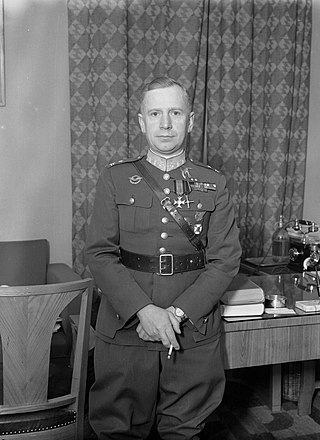 21
Stanisław Jakub Skarżyński was a lieutenant colonel in the Polish Air Force and aviator famous for his transatlantic solo flight in 1933.
21
Stanisław Jakub Skarżyński was a lieutenant colonel in the Polish Air Force and aviator famous for his transatlantic solo flight in 1933.
Pyotr Ilyich Tchaikovsky
 21
Pyotr Ilyich Tchaikovsky was a Russian composer of the Romantic period. He was the first Russian composer whose music would make a lasting impression internationally. Tchaikovsky wrote some of the...
21
Pyotr Ilyich Tchaikovsky was a Russian composer of the Romantic period. He was the first Russian composer whose music would make a lasting impression internationally. Tchaikovsky wrote some of the...
Kazimierz Sosnkowski
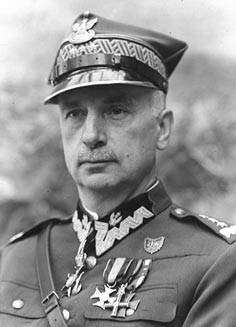 21
General Kazimierz Sosnkowski was a Polish independence fighter, general, diplomat, and architect.
21
General Kazimierz Sosnkowski was a Polish independence fighter, general, diplomat, and architect.
Zygmunt Noskowski
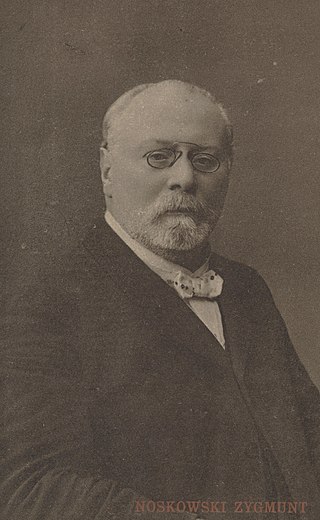 21
Zygmunt Noskowski was a Polish composer, conductor, and teacher.
21
Zygmunt Noskowski was a Polish composer, conductor, and teacher.
Grażyna Bacewicz
 21
Grażyna Bacewicz Biernacka was a Polish composer and violinist of Lithuanian origin. She is the second Polish female composer to have achieved national and international recognition, the first being...
21
Grażyna Bacewicz Biernacka was a Polish composer and violinist of Lithuanian origin. She is the second Polish female composer to have achieved national and international recognition, the first being...
Władysław Raginis
 21
Władysław Raginis was a Polish military commander during the Invasion of Poland in 1939 of a small force holding the Polish fortified defense positions against a vastly larger German force during the...
21
Władysław Raginis was a Polish military commander during the Invasion of Poland in 1939 of a small force holding the Polish fortified defense positions against a vastly larger German force during the...
Grzegorz Piramowicz
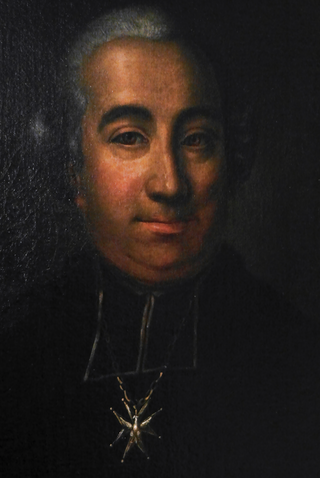 20
Grzegorz Piramowicz was a Polish Roman Catholic priest, educator, writer, and philosopher of Armenian origin. He was a member of the Commission of National Education and Society for Elementary Books,...
20
Grzegorz Piramowicz was a Polish Roman Catholic priest, educator, writer, and philosopher of Armenian origin. He was a member of the Commission of National Education and Society for Elementary Books,...
Eugeniusz Romer
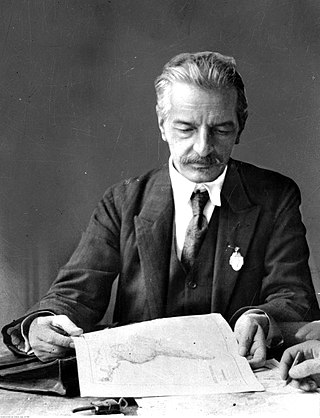 20
Eugeniusz Mikołaj Romer was a distinguished Polish geographer, cartographer and geopolitician, whose maps and atlases are still highly valued by experts.
20
Eugeniusz Mikołaj Romer was a distinguished Polish geographer, cartographer and geopolitician, whose maps and atlases are still highly valued by experts.
Tadeusz Borowski
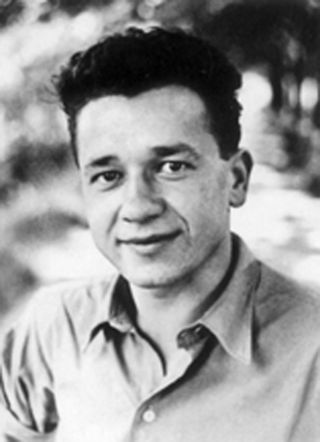 20
Tadeusz Borowski was a Polish writer and journalist. His wartime poetry and stories dealing with his experiences as a prisoner at Auschwitz are recognized as classics of Polish literature.
20
Tadeusz Borowski was a Polish writer and journalist. His wartime poetry and stories dealing with his experiences as a prisoner at Auschwitz are recognized as classics of Polish literature.
Marek Hłasko
 20
Marek Hłasko was a Polish author and screenwriter.
20
Marek Hłasko was a Polish author and screenwriter.
Konstantin Tsiolkovsky
 20
Konstantin Eduardovich Tsiolkovsky was a Russian and Soviet rocket scientist who pioneered astronautics. Along with Hermann Oberth and Robert H. Goddard, he is one of the pioneers of space flight...
20
Konstantin Eduardovich Tsiolkovsky was a Russian and Soviet rocket scientist who pioneered astronautics. Along with Hermann Oberth and Robert H. Goddard, he is one of the pioneers of space flight...
Stefan Banach
 19
Stefan Banach was a Polish mathematician who is generally considered one of the 20th century's most important and influential mathematicians. He was the founder of modern functional analysis, and an...
19
Stefan Banach was a Polish mathematician who is generally considered one of the 20th century's most important and influential mathematicians. He was the founder of modern functional analysis, and an...
Joseph Sulkowski
 19
Joseph Sulkowski was a Polish captain in the French Revolutionary Army and friend and aide de camp to Napoleon Bonaparte. He also became friends with Muiron, Vivant Denon, Lazare Carnot, Augereau,...
19
Joseph Sulkowski was a Polish captain in the French Revolutionary Army and friend and aide de camp to Napoleon Bonaparte. He also became friends with Muiron, Vivant Denon, Lazare Carnot, Augereau,...
Tomasz Zan
 19
Tomasz Zan, was a notable Polish and Belarusian poet and activist. Zan played a significant role in the cultural and literary movements of his time, advocating for the preservation and promotion of...
19
Tomasz Zan, was a notable Polish and Belarusian poet and activist. Zan played a significant role in the cultural and literary movements of his time, advocating for the preservation and promotion of...
Bolesław Domański
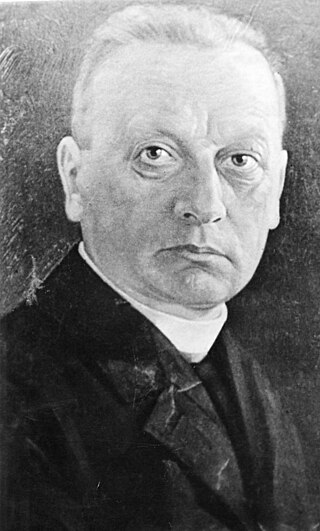 19
Bolesław Domański was a famous Polish Catholic priest, chief of the Union of Poles in Germany. In the years 1903–1939 he was a parson of Zakrzewo parish. Domański was a fighter for the rights of the...
19
Bolesław Domański was a famous Polish Catholic priest, chief of the Union of Poles in Germany. In the years 1903–1939 he was a parson of Zakrzewo parish. Domański was a fighter for the rights of the...
Dezydery Chłapowski
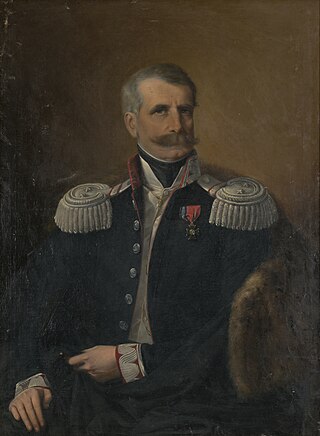 19
Baron Dezydery Adam Chłapowski of the Dryja coat of arms was a Polish general, businessman and political activist.
19
Baron Dezydery Adam Chłapowski of the Dryja coat of arms was a Polish general, businessman and political activist.
Tadeusz Czacki
 19
Tadeusz Czacki was a Polish historian, pedagogue and numismatist. Czacki played an important part in the Enlightenment in Poland.
19
Tadeusz Czacki was a Polish historian, pedagogue and numismatist. Czacki played an important part in the Enlightenment in Poland.
Gallus Anonymus
 19
Gallus Anonymus, also known by his Polonized variant Gall Anonim, is the name traditionally given to the anonymous author of Gesta principum Polonorum, composed in Latin between 1112 and 1118.
Gallus...
19
Gallus Anonymus, also known by his Polonized variant Gall Anonim, is the name traditionally given to the anonymous author of Gesta principum Polonorum, composed in Latin between 1112 and 1118.
Gallus...
Stefan Kisielewski
 19
Stefan Kisielewski, nicknames Kisiel, Julia Hołyńska, Teodor Klon, Tomasz Staliński, was a Polish writer, publicist, composer and politician, and one of the members of Znak, one of the founders of...
19
Stefan Kisielewski, nicknames Kisiel, Julia Hołyńska, Teodor Klon, Tomasz Staliński, was a Polish writer, publicist, composer and politician, and one of the members of Znak, one of the founders of...
Norbert Bonczyk
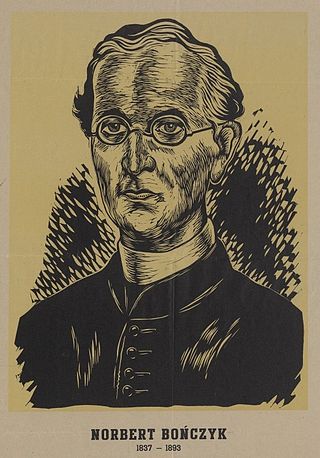 19
Norbert Bonczyk – ksiądz katolicki, poeta, autor artykułów do „Zwiastuna Górnośląskiego”, działacz narodowy na rzecz polskości Górnego Śląska, tłumacz liryki niemieckiej. Zwany „Śląskim Homerem”....
19
Norbert Bonczyk – ksiądz katolicki, poeta, autor artykułów do „Zwiastuna Górnośląskiego”, działacz narodowy na rzecz polskości Górnego Śląska, tłumacz liryki niemieckiej. Zwany „Śląskim Homerem”....
Przemyslaus I Noszak, Duke of Cieszyn
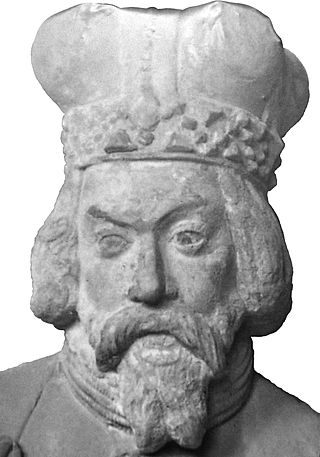 19
Przemysław I Noszak, was a Duke of Cieszyn-Bytom-Siewierz from 1358, from 1384 ruler over half of both Głogów and Ścinawa and after 1401 ruler over Toszek.
19
Przemysław I Noszak, was a Duke of Cieszyn-Bytom-Siewierz from 1358, from 1384 ruler over half of both Głogów and Ścinawa and after 1401 ruler over Toszek.
Jan Dekert
 19
Jan Dekert or Jan Dekiert was a Polish merchant of German descent and political activist. Starting in the 1760s, he rose to become one of the most prominent merchants in the Polish capital of Warsaw....
19
Jan Dekert or Jan Dekiert was a Polish merchant of German descent and political activist. Starting in the 1760s, he rose to become one of the most prominent merchants in the Polish capital of Warsaw....
Leszek II the Black
 19
Leszek II the Black, was a Polish prince of the House of Piast, Duke of Sieradz since 1261, Duke of Łęczyca since 1267, Duke of Inowrocław in the years 1273-1278, Duke of Sandomierz and High Duke of...
19
Leszek II the Black, was a Polish prince of the House of Piast, Duke of Sieradz since 1261, Duke of Łęczyca since 1267, Duke of Inowrocław in the years 1273-1278, Duke of Sandomierz and High Duke of...
Hansel and Gretel
 19
"Hansel and Gretel" is a German fairy tale collected by the Brothers Grimm and published in 1812 as part of Grimms' Fairy Tales. It is also known as Little Step Brother and Little Step Sister.
19
"Hansel and Gretel" is a German fairy tale collected by the Brothers Grimm and published in 1812 as part of Grimms' Fairy Tales. It is also known as Little Step Brother and Little Step Sister.
Karol Wojtyła (senior)
 19
Karol Wojtyła was a Polish military officer who was a non-commissioned officer of the Austro-Hungarian Army and a lieutenant of the Polish Armed Forces' administration. He was the father and namesake...
19
Karol Wojtyła was a Polish military officer who was a non-commissioned officer of the Austro-Hungarian Army and a lieutenant of the Polish Armed Forces' administration. He was the father and namesake...
Aleksandra Billewiczówna
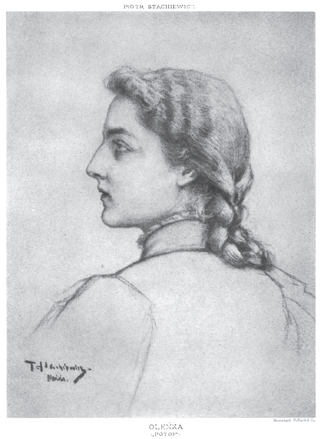 19
Aleksandra Billewicz is a fictional character created by Henryk Sienkiewicz, appearing in the novel The Deluge as the main female protagonist. She is a wise Lithuanian noblewoman, by the will of her...
19
Aleksandra Billewicz is a fictional character created by Henryk Sienkiewicz, appearing in the novel The Deluge as the main female protagonist. She is a wise Lithuanian noblewoman, by the will of her...
Stanislaus of Szczepanów
 18
Stanislaus of Szczepanów was a Polish Catholic prelate who served as Bishop of Kraków and was martyred by the Polish King Bolesław II the Bold. Stanislaus is venerated in the Catholic Church as...
18
Stanislaus of Szczepanów was a Polish Catholic prelate who served as Bishop of Kraków and was martyred by the Polish King Bolesław II the Bold. Stanislaus is venerated in the Catholic Church as...
Antoni Madaliński
 18
Antoni Madaliński (1739–1805) was a Polish Lieutenant General and commander of the 1st Greater Polish National Cavalry Brigade during the Kościuszko Uprising.
18
Antoni Madaliński (1739–1805) was a Polish Lieutenant General and commander of the 1st Greater Polish National Cavalry Brigade during the Kościuszko Uprising.
Mark the Evangelist
 18
Mark the Evangelist also known as John Mark or Saint Mark, is the person who is traditionally ascribed to be the author of the Gospel of Mark. Modern Bible scholars have concluded that the Gospel of...
18
Mark the Evangelist also known as John Mark or Saint Mark, is the person who is traditionally ascribed to be the author of the Gospel of Mark. Modern Bible scholars have concluded that the Gospel of...
Franciszek Stefczyk
 18
Franciszek Kazimierz Stefczyk – nauczyciel, ekonomista, działacz społeczny, spółdzielczy i ruchu ludowego. Inicjator zakładania spółdzielczych kas oszczędnościowo-pożyczkowych, znanych później jako...
18
Franciszek Kazimierz Stefczyk – nauczyciel, ekonomista, działacz społeczny, spółdzielczy i ruchu ludowego. Inicjator zakładania spółdzielczych kas oszczędnościowo-pożyczkowych, znanych później jako...
Ignacy Domeyko
 18
Ignacy Domeyko or Domejko, pseudonym: Żegota was a Polish geologist, mineralogist, educator, and founder of the University of Santiago, in Chile. Domeyko spent most of his life, and died, in his...
18
Ignacy Domeyko or Domejko, pseudonym: Żegota was a Polish geologist, mineralogist, educator, and founder of the University of Santiago, in Chile. Domeyko spent most of his life, and died, in his...
Elizabeth (biblical figure)
 18
Elizabeth was the mother of John the Baptist, the wife of Zechariah, and maternal aunt of Mary, mother of Jesus, according to the Gospel of Luke and in Islamic tradition. She was past normal...
18
Elizabeth was the mother of John the Baptist, the wife of Zechariah, and maternal aunt of Mary, mother of Jesus, according to the Gospel of Luke and in Islamic tradition. She was past normal...
Olga Boznańska
 18
Olga Boznańska was a Polish painter of the turn of the 20th century. She was a notable painter in Poland and Europe, and was stylistically associated with the French impressionism, though she...
18
Olga Boznańska was a Polish painter of the turn of the 20th century. She was a notable painter in Poland and Europe, and was stylistically associated with the French impressionism, though she...
Michael (archangel)
 18
Michael, also called Saint Michael the Archangel, Archangel Michael and Saint Michael the Taxiarch is an archangel in Judaism, Christianity, Islam, and the Baha'i faith. The earliest surviving...
18
Michael, also called Saint Michael the Archangel, Archangel Michael and Saint Michael the Taxiarch is an archangel in Judaism, Christianity, Islam, and the Baha'i faith. The earliest surviving...
John Scolvus
 17
John Scolvus or John of Kolno may have been a navigator of the late 15th century. According to some sources he was among a group of early Europeans to reach the shores of the Americas prior to...
17
John Scolvus or John of Kolno may have been a navigator of the late 15th century. According to some sources he was among a group of early Europeans to reach the shores of the Americas prior to...
Bogislaw X, Duke of Pomerania
 17
Bogislaw X of Pomerania, the Great, was Duke of Pomerania from 1474 until his death in 1523.
17
Bogislaw X of Pomerania, the Great, was Duke of Pomerania from 1474 until his death in 1523.
Stanisław Leszczyński
 17
Stanisław I Leszczyński, also Anglicized and Latinized as Stanislaus I, was twice King of Poland and Grand Duke of Lithuania, and at various times Prince of Deux-Ponts, Duke of Bar and Duke of...
17
Stanisław I Leszczyński, also Anglicized and Latinized as Stanislaus I, was twice King of Poland and Grand Duke of Lithuania, and at various times Prince of Deux-Ponts, Duke of Bar and Duke of...
Hipolit Cegielski
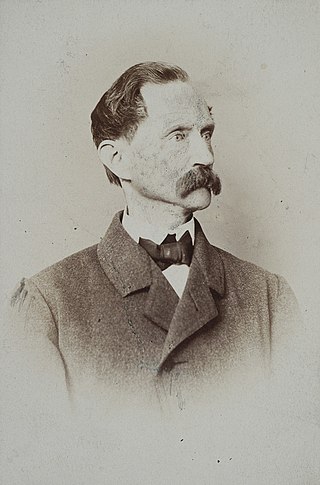 17
Hipolit Cegielski was a Polish businessman and social and cultural activist. He founded H. Cegielski – Poznań in 1846.
17
Hipolit Cegielski was a Polish businessman and social and cultural activist. He founded H. Cegielski – Poznań in 1846.
Franciszek Karpiński
 17
Franciszek Karpiński was the leading sentimental Polish poet of the Age of Enlightenment. He is particularly remembered for his religious works later rendered as hymns and carols. He is also...
17
Franciszek Karpiński was the leading sentimental Polish poet of the Age of Enlightenment. He is particularly remembered for his religious works later rendered as hymns and carols. He is also...
Władysław Szafer
 17
Prof Władysław Szafer PAS HFRSE was a Polish botanist, palaeobotanist, quaternary geologist and professor of botany at the Jagiellonian University in Kraków. He was a world pioneer in nature...
17
Prof Władysław Szafer PAS HFRSE was a Polish botanist, palaeobotanist, quaternary geologist and professor of botany at the Jagiellonian University in Kraków. He was a world pioneer in nature...
Aleksander Orłowski
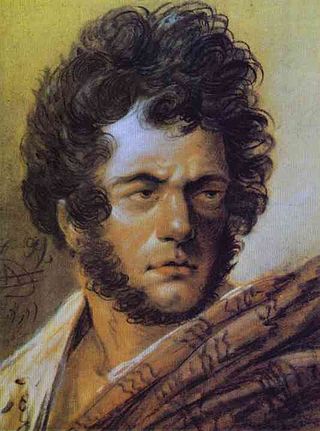 17
Aleksander Orłowski was a Polish painter and sketch artist, and a pioneer of lithography in the Russian Empire.
17
Aleksander Orłowski was a Polish painter and sketch artist, and a pioneer of lithography in the Russian Empire.
Woodrow Wilson
 17
Thomas Woodrow Wilson was an American politician and academic who served as the 28th president of the United States from 1913 to 1921. A member of the Democratic Party, Wilson served as the president...
17
Thomas Woodrow Wilson was an American politician and academic who served as the 28th president of the United States from 1913 to 1921. A member of the Democratic Party, Wilson served as the president...
Jerzy Bajan
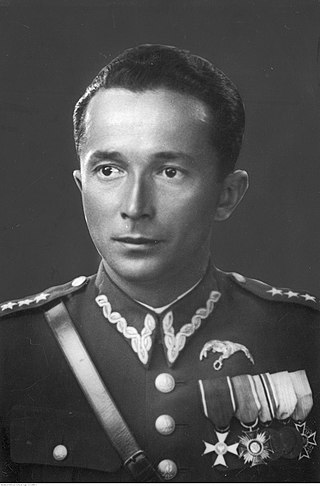 17
Jerzy Bajan was a prominent Polish sports and military aviator, winner of the Challenge 1934 contest.
17
Jerzy Bajan was a prominent Polish sports and military aviator, winner of the Challenge 1934 contest.
Stanisław Kunicki
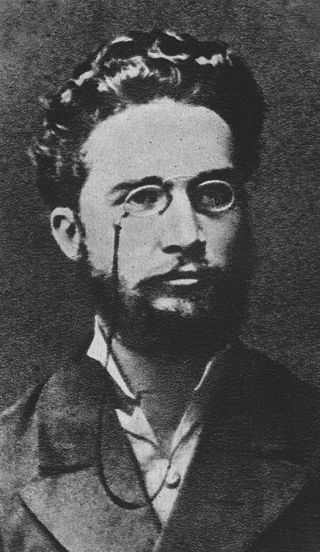 17
Stanisław Kunicki was a Polish revolutionary.
17
Stanisław Kunicki was a Polish revolutionary.
Juliusz Osterwa
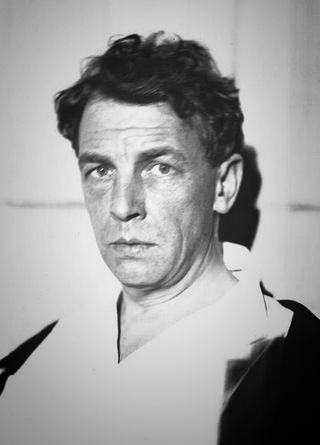 17
Juliusz Osterwa, born Julian Andrzej Maluszek, was a renowned Polish actor, theatre director and art theoretician active in the interwar period. He was the founder of Theatre Reduta, the first...
17
Juliusz Osterwa, born Julian Andrzej Maluszek, was a renowned Polish actor, theatre director and art theoretician active in the interwar period. He was the founder of Theatre Reduta, the first...
Stanisław Taczak
 17
Stanisław Taczak was a Polish general. Until 8 January 1919, he was temporary commander-in-chief of the Great Poland Uprising (1918-1919).
17
Stanisław Taczak was a Polish general. Until 8 January 1919, he was temporary commander-in-chief of the Great Poland Uprising (1918-1919).
Przemysł II
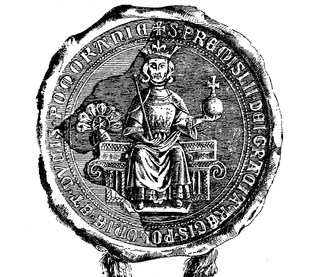 17
Przemysł II was the Duke of Poznań from 1257–1279, of Greater Poland from 1279 to 1296, of Kraków from 1290 to 1291, and Gdańsk Pomerania (Pomerelia) from 1294 to 1296, and then King of Poland from...
17
Przemysł II was the Duke of Poznań from 1257–1279, of Greater Poland from 1279 to 1296, of Kraków from 1290 to 1291, and Gdańsk Pomerania (Pomerelia) from 1294 to 1296, and then King of Poland from...
Juliusz Konstanty Ordon
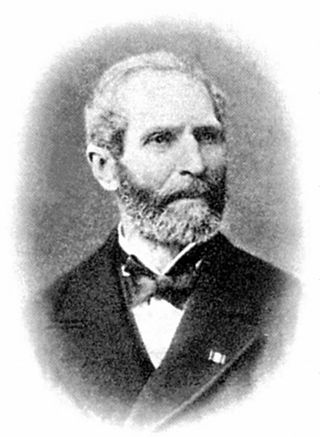 17
Konstanty Juliusz Ordon was a participant in the Polish November Uprising in 1830–1831.
17
Konstanty Juliusz Ordon was a participant in the Polish November Uprising in 1830–1831.
Hyacinth of Poland
 17
Hyacinth was a Polish Dominican priest and missionary who worked to reform the women's monasteries in his native Poland. Educated in Paris and Bologna, he was a Doctor of Sacred Studies.
17
Hyacinth was a Polish Dominican priest and missionary who worked to reform the women's monasteries in his native Poland. Educated in Paris and Bologna, he was a Doctor of Sacred Studies.
Józef Rymer
 17
Józef Rymer (1882–1922) was a Polish and Silesian activist and politician.
17
Józef Rymer (1882–1922) was a Polish and Silesian activist and politician.
Zygmunt Florenty Wróblewski
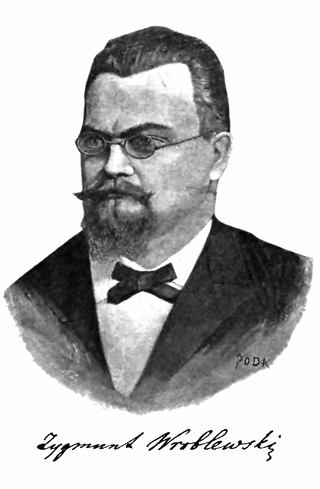 16
Zygmunt Florenty Wróblewski was a Polish physicist and chemist. Together with Karol Olszewski, he was the first scientist in the world to liquify nitrogen in 1883.
16
Zygmunt Florenty Wróblewski was a Polish physicist and chemist. Together with Karol Olszewski, he was the first scientist in the world to liquify nitrogen in 1883.
Mieczysława Ćwiklińska
 16
Mieczysława Ćwiklińska-Steinsberg was a Polish film actress, stage actor, and singer. She was often nicknamed Lińska or Amiette.
16
Mieczysława Ćwiklińska-Steinsberg was a Polish film actress, stage actor, and singer. She was often nicknamed Lińska or Amiette.
Stanislaus Kostka
 16
Stanisław Kostka S.J. was a Polish novice of the Society of Jesus. He is venerated in the Catholic Church as Saint Stanislaus Kostka.
16
Stanisław Kostka S.J. was a Polish novice of the Society of Jesus. He is venerated in the Catholic Church as Saint Stanislaus Kostka.
Seweryn Goszczyński
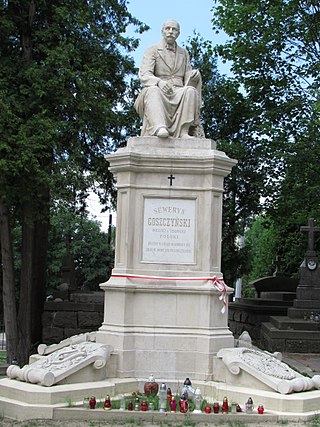 16
Seweryn Goszczyński was a Polish Romantic prose writer and poet.
16
Seweryn Goszczyński was a Polish Romantic prose writer and poet.
Emil Zegadłowicz
 16
Emil Zegadłowicz was a Polish poet, prose writer, novelist, playwright, translator, expert of art; co-originator of Polish expressionism, member of expressionists' group Zdrój, co-founder of group...
16
Emil Zegadłowicz was a Polish poet, prose writer, novelist, playwright, translator, expert of art; co-originator of Polish expressionism, member of expressionists' group Zdrój, co-founder of group...
Aniela Krzywoń
 16
Aniela Krzywoń was a private in the "Emilia Plater" Independent Women's Battalion of the Polish People's Army during the Second World War and became the only woman in history who was not a citizen of...
16
Aniela Krzywoń was a private in the "Emilia Plater" Independent Women's Battalion of the Polish People's Army during the Second World War and became the only woman in history who was not a citizen of...
Cyprian Godebski (poet)
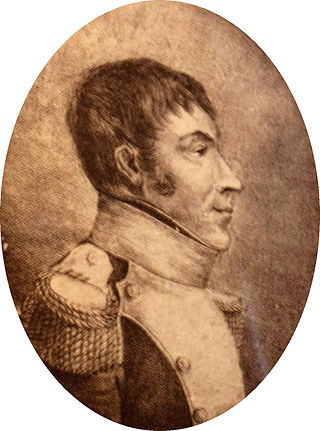 16
Cyprian Godebski was a Polish poet, novelist and father of writer Franciszek Ksawery. He was an outstanding poet of the so-called "Legions Poetry".
16
Cyprian Godebski was a Polish poet, novelist and father of writer Franciszek Ksawery. He was an outstanding poet of the so-called "Legions Poetry".
Joseph Conrad
 16
Joseph Conrad was a Polish-British novelist and story writer. He is regarded as one of the greatest writers in the English language; though he did not speak English fluently until his twenties, he...
16
Joseph Conrad was a Polish-British novelist and story writer. He is regarded as one of the greatest writers in the English language; though he did not speak English fluently until his twenties, he...
Jan Nowak-Jeziorański
 16
Jan Nowak-Jeziorański was a Polish journalist, writer, politician, social worker and patriot. He served during the Second World War as one of the most notable resistance fighters of the Home Army. He...
16
Jan Nowak-Jeziorański was a Polish journalist, writer, politician, social worker and patriot. He served during the Second World War as one of the most notable resistance fighters of the Home Army. He...
Jan Karski
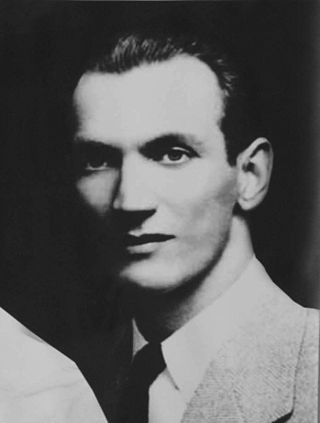 16
Jan Karski was a Polish soldier, resistance-fighter, and diplomat during World War II. He is known for having acted as a courier in 1940–1943 to the Polish government-in-exile and to Poland's Western...
16
Jan Karski was a Polish soldier, resistance-fighter, and diplomat during World War II. He is known for having acted as a courier in 1940–1943 to the Polish government-in-exile and to Poland's Western...
Tadeusz Gajcy
 16
Tadeusz Stefan Gajcy alias Karol Topornicki”, „Roman Oścień”, „Topór”, „Orczyk“ , was a Polish poet, playwright, editor-in-chief of the Sztuka i Naród periodical, member of the Confederation of the...
16
Tadeusz Stefan Gajcy alias Karol Topornicki”, „Roman Oścień”, „Topór”, „Orczyk“ , was a Polish poet, playwright, editor-in-chief of the Sztuka i Naród periodical, member of the Confederation of the...
Saint Christopher
 16
Saint Christopher is venerated by several Christian denominations as a martyr killed in the reign of the 3rd-century Roman emperor Decius, or alternatively under the emperor Maximinus Daia. There...
16
Saint Christopher is venerated by several Christian denominations as a martyr killed in the reign of the 3rd-century Roman emperor Decius, or alternatively under the emperor Maximinus Daia. There...
Aleksander Zelwerowicz
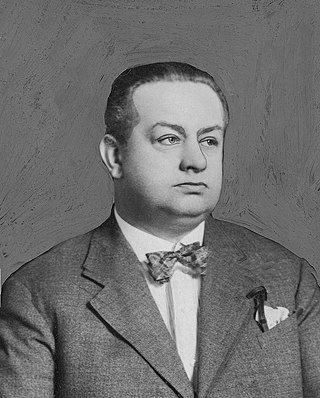 16
Aleksander Zelwerowicz was a Polish actor, director, theatre president and a teacher. He received the Order of Polonia Restituta and is one of the Polish Righteous among the Nations.
16
Aleksander Zelwerowicz was a Polish actor, director, theatre president and a teacher. He received the Order of Polonia Restituta and is one of the Polish Righteous among the Nations.
Stanisław Wojciechowski
 16
Stanisław Wojciechowski was a Polish politician and scholar who served as President of Poland between 1922 and 1926, during the Second Polish Republic.
16
Stanisław Wojciechowski was a Polish politician and scholar who served as President of Poland between 1922 and 1926, during the Second Polish Republic.
Little Red Riding Hood
 16
Little Red Riding Hood is a European fairy tale about a young girl and a sly wolf. Its origins can be traced back to several pre-17th-century European folk tales. The two best known versions were...
16
Little Red Riding Hood is a European fairy tale about a young girl and a sly wolf. Its origins can be traced back to several pre-17th-century European folk tales. The two best known versions were...
Leszek the White
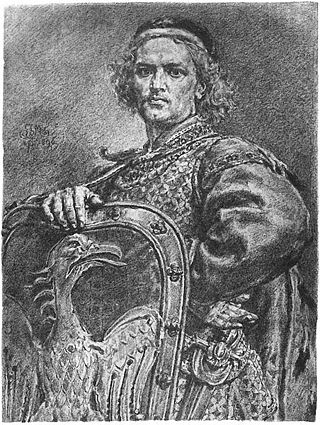 16
Leszek the White was Prince of Sandomierz and High Duke of Poland in the years 1194–1198, 1199, 1206–1210, and 1211–1227. During the early stages of his reign, his uncle Duke Mieszko III the Old and...
16
Leszek the White was Prince of Sandomierz and High Duke of Poland in the years 1194–1198, 1199, 1206–1210, and 1211–1227. During the early stages of his reign, his uncle Duke Mieszko III the Old and...
Cinderella
 16
"Cinderella", or "The Little Glass Slipper", is a folk tale with thousands of variants that are told throughout the world. The protagonist is a young girl living in forsaken circumstances that are...
16
"Cinderella", or "The Little Glass Slipper", is a folk tale with thousands of variants that are told throughout the world. The protagonist is a young girl living in forsaken circumstances that are...
The Little Prince
Wojciech Kilar
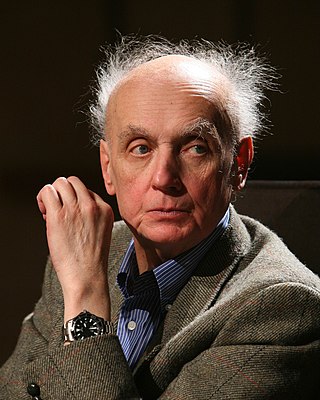 16
Wojciech Kilar was a Polish classical and film music composer. One of his greatest successes came with his score to Francis Ford Coppola's Bram Stoker's Dracula in 1992, which received the ASCAP...
16
Wojciech Kilar was a Polish classical and film music composer. One of his greatest successes came with his score to Francis Ford Coppola's Bram Stoker's Dracula in 1992, which received the ASCAP...
Władysław I Herman
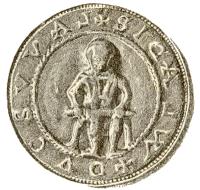 16
Władysław I Herman was the duke of Poland from 1079 until his death.
16
Władysław I Herman was the duke of Poland from 1079 until his death.
Agnieszka Osiecka
 16
Agnieszka Osiecka was a Polish poet, writer, author of theatre and television screenplays, film director and journalist. She was a prominent Polish songwriter, having authored the lyrics to more than...
16
Agnieszka Osiecka was a Polish poet, writer, author of theatre and television screenplays, film director and journalist. She was a prominent Polish songwriter, having authored the lyrics to more than...
Kazimierz Górski
 16
Kazimierz Klaudiusz Górski was a coach of Poland national football team and honorary president of the Polish Football Association. He was also a football player, capped once for Poland.
16
Kazimierz Klaudiusz Górski was a coach of Poland national football team and honorary president of the Polish Football Association. He was also a football player, capped once for Poland.
Artur Zawisza (kapitan)
Kazimierz Brodziński
 15
Kazimierz Brodziński was an important Polish Romantic poet.
15
Kazimierz Brodziński was an important Polish Romantic poet.
Jan Chryzostom Pasek
 15
Jan Chryzostom Pasek of Gosławice (c.1636–1701) was a Polish nobleman and writer during the times of the Polish–Lithuanian Commonwealth. He is best remembered for his memoirs (Pamiętniki), which are...
15
Jan Chryzostom Pasek of Gosławice (c.1636–1701) was a Polish nobleman and writer during the times of the Polish–Lithuanian Commonwealth. He is best remembered for his memoirs (Pamiętniki), which are...
Henryk Rodakowski
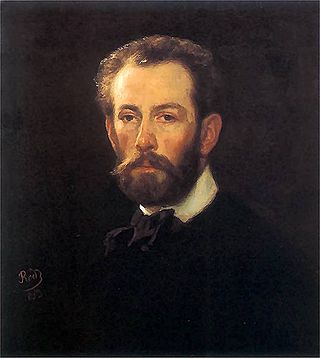 15
Henryk Hipolit Rodakowski was a Polish painter.
15
Henryk Hipolit Rodakowski was a Polish painter.
Kazimierz Wierzyński
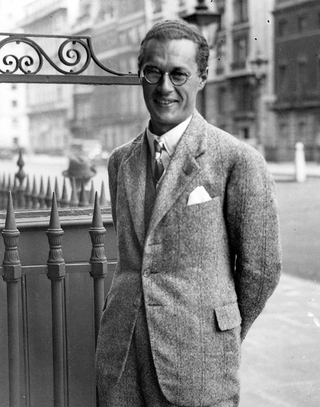 15
Kazimierz Wierzyński was a Polish poet and journalist; an elected member of the prestigious Polish Academy of Literature in the Second Polish Republic.
15
Kazimierz Wierzyński was a Polish poet and journalist; an elected member of the prestigious Polish Academy of Literature in the Second Polish Republic.
Michał Bałucki
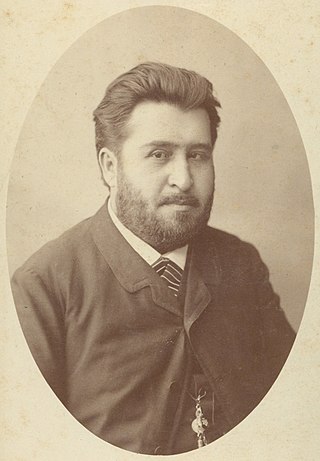 15
Michał Bałucki, pseudonym Elpidon, was a Polish playwright and poet.
15
Michał Bałucki, pseudonym Elpidon, was a Polish playwright and poet.
Maurice Benyovszky
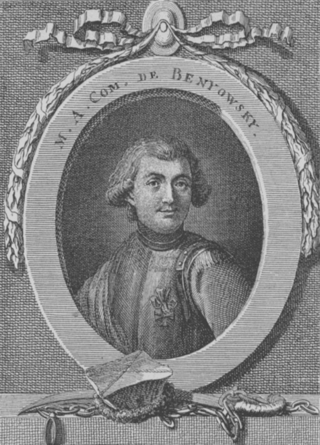 15
Count Maurice Benyovszky de Benyó et Urbanó was a renowned military officer, adventurer, and writer from the Kingdom of Hungary, who described himself as both a Hungarian and a Pole. He is considered...
15
Count Maurice Benyovszky de Benyó et Urbanó was a renowned military officer, adventurer, and writer from the Kingdom of Hungary, who described himself as both a Hungarian and a Pole. He is considered...
Józef Pankiewicz
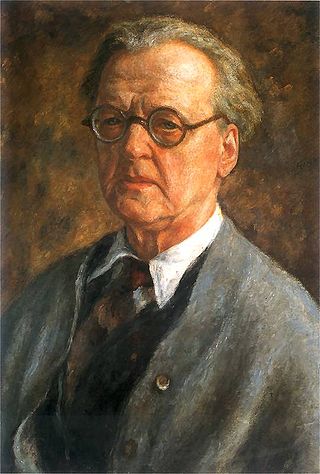 15
Józef Pankiewicz was a Polish impressionist painter, graphic artist and teacher who spent much of his career in France.
15
Józef Pankiewicz was a Polish impressionist painter, graphic artist and teacher who spent much of his career in France.
Wanda Rutkiewicz
 15
Wanda Rutkiewicz was a Polish mountaineer and computer engineer. She was the first woman to reach the summit of K2 and the third woman to summit Mount Everest.
15
Wanda Rutkiewicz was a Polish mountaineer and computer engineer. She was the first woman to reach the summit of K2 and the third woman to summit Mount Everest.
Paweł Strzelecki
 15
Sir Paweł Edmund Strzelecki, also known as Paul Edmund de Strzelecki and Sir Paul Strzelecki, was a Polish explorer, geologist, humanitarian, environmentalist, nobleman, scientist, businessman and...
15
Sir Paweł Edmund Strzelecki, also known as Paul Edmund de Strzelecki and Sir Paul Strzelecki, was a Polish explorer, geologist, humanitarian, environmentalist, nobleman, scientist, businessman and...
Jacek Kaczmarski
 15
Jacek Marcin Kaczmarski was a Polish singer, songwriter, poet and author.
15
Jacek Marcin Kaczmarski was a Polish singer, songwriter, poet and author.
Mary Magdalene
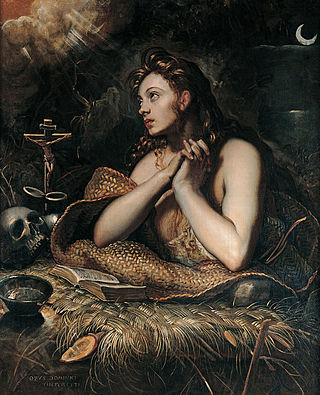 15
Mary Magdalene was a woman who, according to the four canonical gospels, traveled with Jesus as one of his followers and was a witness to his crucifixion and resurrection. She is mentioned by name...
15
Mary Magdalene was a woman who, according to the four canonical gospels, traveled with Jesus as one of his followers and was a witness to his crucifixion and resurrection. She is mentioned by name...
Stanisław Skalski
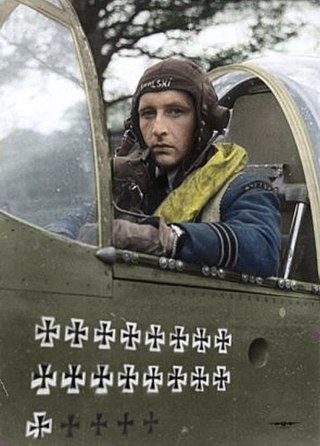 15
Stanisław Skalski, was a Polish aviator and fighter ace who served with the Polish Air Force and British Royal Air Force during the Second World War. Skalski was the top Polish fighter ace of the war...
15
Stanisław Skalski, was a Polish aviator and fighter ace who served with the Polish Air Force and British Royal Air Force during the Second World War. Skalski was the top Polish fighter ace of the war...
Marek Grechuta
 15
Marek Michał Grechuta was a Polish singer, songwriter, composer, and lyricist.
15
Marek Michał Grechuta was a Polish singer, songwriter, composer, and lyricist.
Stanisław Jachowicz
 15
Stanisław Jachowicz was a Polish educator, poet and children books author. He is regarded as the founding father of children's literature in Poland.
15
Stanisław Jachowicz was a Polish educator, poet and children books author. He is regarded as the founding father of children's literature in Poland.
Aleksander Kamiński
 15
Aleksander Kamiński, assumed name: Aleksander Kędzierski. Also known under aliases such as Dąbrowski, J. Dąbrowski, Fabrykant, Faktor, Juliusz Górecki, Hubert, Kamyk, Kaźmierczak, Bambaju was an...
15
Aleksander Kamiński, assumed name: Aleksander Kędzierski. Also known under aliases such as Dąbrowski, J. Dąbrowski, Fabrykant, Faktor, Juliusz Górecki, Hubert, Kamyk, Kaźmierczak, Bambaju was an...
August Cieszkowski
 14
Count August Dołęga Cieszkowski was a Polish philosopher, economist and social and political activist. His Hegelian philosophy influenced the young Karl Marx and action theorists.
14
Count August Dołęga Cieszkowski was a Polish philosopher, economist and social and political activist. His Hegelian philosophy influenced the young Karl Marx and action theorists.
Feliks Stamm
 14
Feliks “Papa” Stamm was a prominent Polish boxing coach. He is widely regarded as the father of Polish boxing, and the creator of the so-called Polish school of boxing. To commemorate him, since 1977...
14
Feliks “Papa” Stamm was a prominent Polish boxing coach. He is widely regarded as the father of Polish boxing, and the creator of the so-called Polish school of boxing. To commemorate him, since 1977...
Antoni Słonimski
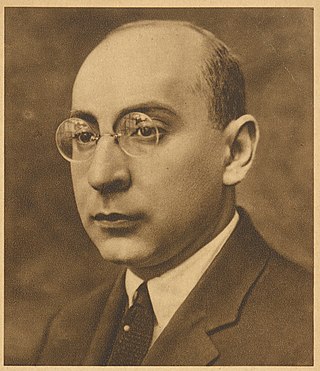 14
Antoni Słonimski was a Polish poet, artist, journalist, playwright and prose writer, president of the Union of Polish Writers in 1956–1959 during the Polish October, known for his devotion to social...
14
Antoni Słonimski was a Polish poet, artist, journalist, playwright and prose writer, president of the Union of Polish Writers in 1956–1959 during the Polish October, known for his devotion to social...
Dionizy Czachowski
 14
Dionizy Feliks Czachowski was a Polish general and commander of the Sandomierz Voivodeship during the January Uprising in Congress Poland.
14
Dionizy Feliks Czachowski was a Polish general and commander of the Sandomierz Voivodeship during the January Uprising in Congress Poland.
Tadeusz Kotarbiński
 14
Tadeusz Marian Kotarbiński was a Polish philosopher, logician and ethicist.
14
Tadeusz Marian Kotarbiński was a Polish philosopher, logician and ethicist.
Adam Naruszewicz
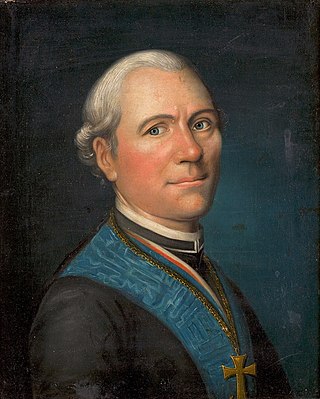 14
Adam Stanisław Naruszewicz was a Polish-Lithuanian nobleman, poet, historian, dramatist, translator, publicist, Jesuit and Roman Catholic bishop.
14
Adam Stanisław Naruszewicz was a Polish-Lithuanian nobleman, poet, historian, dramatist, translator, publicist, Jesuit and Roman Catholic bishop.
Roman Abraham
 13
Roman Józef Abraham was a Polish cavalry general, commander of the Wielkopolska Cavalry Brigade during the German and Soviet Invasion of Poland in September 1939, and Battle of Bzura commander of...
13
Roman Józef Abraham was a Polish cavalry general, commander of the Wielkopolska Cavalry Brigade during the German and Soviet Invasion of Poland in September 1939, and Battle of Bzura commander of...
Danuta Siedzikówna
 13
Danuta Helena Siedzikówna was a Polish medical orderly in the 4th Squadron of the 5th Wilno Brigade of the Home Army. In 1946 she served with the Brigade's 1st Squadron in Poland's Pomerania region....
13
Danuta Helena Siedzikówna was a Polish medical orderly in the 4th Squadron of the 5th Wilno Brigade of the Home Army. In 1946 she served with the Brigade's 1st Squadron in Poland's Pomerania region....
Józef Kustroń
 13
Józef Rudolf Kustroń was a brigadier general of the Polish Army in the Second Polish Republic, commandant of the 21st Mountain Infantry Division. He was the first Polish general to die during the...
13
Józef Rudolf Kustroń was a brigadier general of the Polish Army in the Second Polish Republic, commandant of the 21st Mountain Infantry Division. He was the first Polish general to die during the...
Anna Walentynowicz
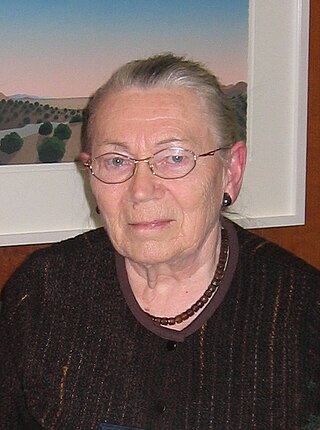 13
Anna Walentynowicz was a Polish free trade union activist and co-founder of Solidarity, the first non-communist trade union in the Eastern Bloc. Her firing from her job at the Lenin Shipyard in...
13
Anna Walentynowicz was a Polish free trade union activist and co-founder of Solidarity, the first non-communist trade union in the Eastern Bloc. Her firing from her job at the Lenin Shipyard in...
Christopher Columbus
 13
Christopher Columbus was an Italian explorer and navigator from the Republic of Genoa who completed four Spanish-based voyages across the Atlantic Ocean sponsored by the Catholic Monarchs, opening...
13
Christopher Columbus was an Italian explorer and navigator from the Republic of Genoa who completed four Spanish-based voyages across the Atlantic Ocean sponsored by the Catholic Monarchs, opening...
Stanisław Sosabowski
 13
Stanisław Franciszek Sosabowski was a Polish general in World War II. He fought in the Polish Campaign of 1939 and at the Battle of Arnhem (Netherlands), as a part of Operation Market Garden, in 1944...
13
Stanisław Franciszek Sosabowski was a Polish general in World War II. He fought in the Polish Campaign of 1939 and at the Battle of Arnhem (Netherlands), as a part of Operation Market Garden, in 1944...
Aleksander Kostka Napierski
 13
Aleksander Leon Kostka-Napierski (1620–1651), Polish captain during the Thirty Years' War in Swedish service, participant of battle in Germany and organizer of the Kostka-Napierski Uprising....
13
Aleksander Leon Kostka-Napierski (1620–1651), Polish captain during the Thirty Years' War in Swedish service, participant of battle in Germany and organizer of the Kostka-Napierski Uprising....
Edmund Bojanowski
 13
Edmund Bojanowski was a Polish Roman Catholic and the founder of four separate religious congregations. He studied art and literature during his education in Breslau and Berlin before distinguishing...
13
Edmund Bojanowski was a Polish Roman Catholic and the founder of four separate religious congregations. He studied art and literature during his education in Breslau and Berlin before distinguishing...
Vladimir Mayakovsky
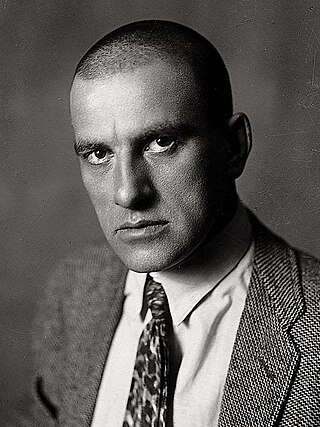 13
Vladimir Vladimirovich Mayakovsky was a Russian and Soviet poet, playwright, artist, and actor.
13
Vladimir Vladimirovich Mayakovsky was a Russian and Soviet poet, playwright, artist, and actor.
Jan Ostroróg
 13
Jan Ostroróg (1436–1501) was a Polish political writer, voivode of Poznan and adviser to the Polish kings Casimir IV Jagiellon and John I Albert.
13
Jan Ostroróg (1436–1501) was a Polish political writer, voivode of Poznan and adviser to the Polish kings Casimir IV Jagiellon and John I Albert.
Czesław Tański
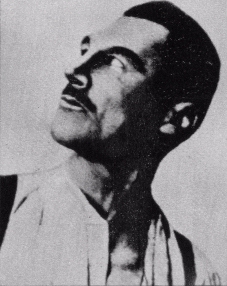 13
Czesław Aleksy Tański – polski artysta malarz, wynalazca, konstruktor lotniczy, pionier szybownictwa i popularyzator lotnictwa w Polsce. Nazywany jest ojcem polskiego lotnictwa.
13
Czesław Aleksy Tański – polski artysta malarz, wynalazca, konstruktor lotniczy, pionier szybownictwa i popularyzator lotnictwa w Polsce. Nazywany jest ojcem polskiego lotnictwa.
Mariusz Zaruski
Józef Mehoffer
 13
Józef Mehoffer was a Polish painter and decorative artist, one of the leading artists of the Young Poland movement and one of the most revered Polish artists of his time.
13
Józef Mehoffer was a Polish painter and decorative artist, one of the leading artists of the Young Poland movement and one of the most revered Polish artists of his time.
Bernard Sychta
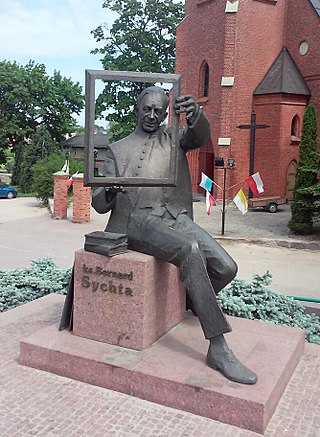 13
Bernard Sychta – ksiądz katolicki, działacz kaszubski, etnograf, językoznawca, dramatopisarz, autor 7-tomowego Słownika gwar kaszubskich na tle kultury ludowej.
13
Bernard Sychta – ksiądz katolicki, działacz kaszubski, etnograf, językoznawca, dramatopisarz, autor 7-tomowego Słownika gwar kaszubskich na tle kultury ludowej.
Pyotr Bardovsky
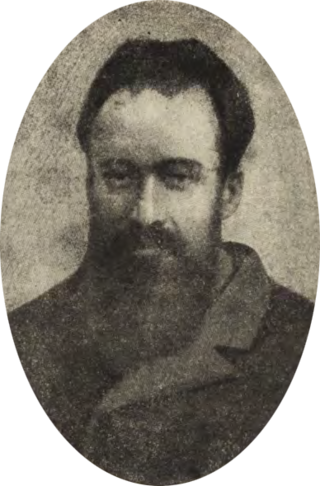 13
Pyotr Vasilevich Bardovsky was a Russian lawyer and a supporter of independence for Poland. He was executed for his connection to Polish revolutionaries.
13
Pyotr Vasilevich Bardovsky was a Russian lawyer and a supporter of independence for Poland. He was executed for his connection to Polish revolutionaries.
Stanisław Stojałowski
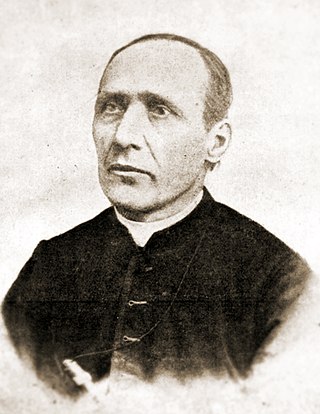 13
Stanisław Stojałowski, herbu Sternberg – polski duchowny katolicki, prałat, polityk, poseł na sejm galicyjski i do parlamentu austriackiego, zwolennik panslawizmu i agraryzmu, wydawca pism ludowych:...
13
Stanisław Stojałowski, herbu Sternberg – polski duchowny katolicki, prałat, polityk, poseł na sejm galicyjski i do parlamentu austriackiego, zwolennik panslawizmu i agraryzmu, wydawca pism ludowych:...
Alfons Zgrzebniok
 13
Alfons Alfred Zgrzebniok was a Polish teacher, activist, and politician from Silesia. He was one of the cofounders of the Silesian Insurgent Association in the early 1920s and also helped organize...
13
Alfons Alfred Zgrzebniok was a Polish teacher, activist, and politician from Silesia. He was one of the cofounders of the Silesian Insurgent Association in the early 1920s and also helped organize...
Józef Wieczorek (polityk)
 13
Józef Wieczorek, pseud. Ryszard – działacz komunistyczny, powstaniec, poseł na Sejm Śląski II kadencji (1930), współzałożyciel PPR.
13
Józef Wieczorek, pseud. Ryszard – działacz komunistyczny, powstaniec, poseł na Sejm Śląski II kadencji (1930), współzałożyciel PPR.
Halina Poświatowska
 13
Halina Poświatowska was a Polish poet and writer.
13
Halina Poświatowska was a Polish poet and writer.
Arkady Fiedler
 13
Arkady Fiedler was a Polish writer, journalist and adventurer.
13
Arkady Fiedler was a Polish writer, journalist and adventurer.
Saint Valentine
 13
Saint Valentine was a 3rd-century Roman saint, commemorated in Western Christianity on February 14 and in Eastern Orthodoxy on July 6. From the High Middle Ages, his feast day has been associated...
13
Saint Valentine was a 3rd-century Roman saint, commemorated in Western Christianity on February 14 and in Eastern Orthodoxy on July 6. From the High Middle Ages, his feast day has been associated...
Maria Pawlikowska-Jasnorzewska
 13
Maria Pawlikowska-Jasnorzewska, née Kossak, was a Polish poet. She was known as the "Polish Sappho" and "queen of lyrical poetry" during Poland's interwar period. She was also a dramatist.
13
Maria Pawlikowska-Jasnorzewska, née Kossak, was a Polish poet. She was known as the "Polish Sappho" and "queen of lyrical poetry" during Poland's interwar period. She was also a dramatist.
Jerzy Szaniawski
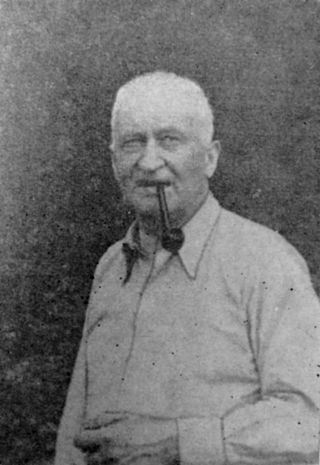 13
Jerzy Szaniawski was a Polish writer, playwright, and essayist; an elected member of the prestigious Polish Academy of Literature in the interwar period. He is best remembered for his series of short...
13
Jerzy Szaniawski was a Polish writer, playwright, and essayist; an elected member of the prestigious Polish Academy of Literature in the interwar period. He is best remembered for his series of short...
Sigismund III Vasa
 13
Sigismund III Vasa was King of Poland and Grand Duke of Lithuania from 1587 to 1632 and, as Sigismund, King of Sweden and Grand Duke of Finland from 1592 to 1599. He was the first Polish sovereign...
13
Sigismund III Vasa was King of Poland and Grand Duke of Lithuania from 1587 to 1632 and, as Sigismund, King of Sweden and Grand Duke of Finland from 1592 to 1599. He was the first Polish sovereign...
Zygmunt Padlewski
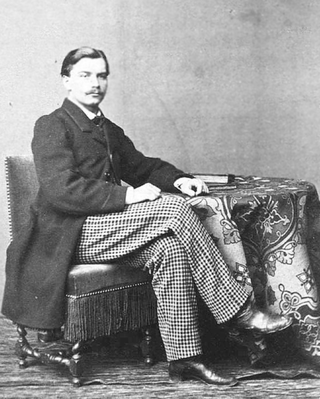 12
Zygmunt Padlewski (1836–1863) was a Polish insurgent who participated in the January Uprising. He was one of the leaders of the "Red" faction among the insurrectionists as a member of the Central...
12
Zygmunt Padlewski (1836–1863) was a Polish insurgent who participated in the January Uprising. He was one of the leaders of the "Red" faction among the insurrectionists as a member of the Central...
Paweł Jasienica
 12
Paweł Jasienica was the pen name of Leon Lech Beynar, a Polish historian, journalist, essayist and soldier.
12
Paweł Jasienica was the pen name of Leon Lech Beynar, a Polish historian, journalist, essayist and soldier.
Maksymilian Jackowski
 12
Maksymilian Jackowski was a Polish activist, secretary-general of the Central Economic Society, patron of the agricultural circles.
12
Maksymilian Jackowski was a Polish activist, secretary-general of the Central Economic Society, patron of the agricultural circles.
Charles Darwin
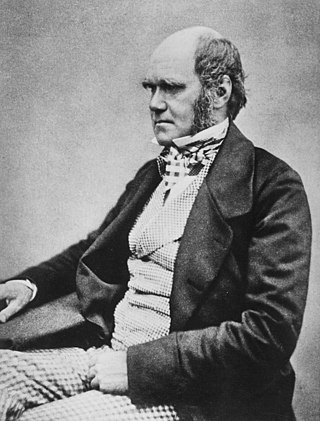 12
Charles Robert Darwin was an English naturalist, geologist and biologist, widely known for his contributions to evolutionary biology. His proposition that all species of life have descended from a...
12
Charles Robert Darwin was an English naturalist, geologist and biologist, widely known for his contributions to evolutionary biology. His proposition that all species of life have descended from a...
Matthias the Apostle
 12
Matthias was, according to the Acts of the Apostles, chosen by God through the apostles to replace Judas Iscariot following the latter's betrayal of Jesus and his subsequent death. His calling as an...
12
Matthias was, according to the Acts of the Apostles, chosen by God through the apostles to replace Judas Iscariot following the latter's betrayal of Jesus and his subsequent death. His calling as an...
Johann Sebastian Bach
 12
Johann Sebastian Bach was a German composer and musician of the late Baroque period. He is known for his prolific authorship of music across a variety of instruments and forms, including; orchestral...
12
Johann Sebastian Bach was a German composer and musician of the late Baroque period. He is known for his prolific authorship of music across a variety of instruments and forms, including; orchestral...
Jan Lechoń
 12
Leszek Józef Serafinowicz was a Polish poet, literary and theater critic, diplomat, and co-founder of the Skamander literary movement and the Polish Institute of Arts and Sciences of America.
12
Leszek Józef Serafinowicz was a Polish poet, literary and theater critic, diplomat, and co-founder of the Skamander literary movement and the Polish Institute of Arts and Sciences of America.
Grzegorz Fitelberg
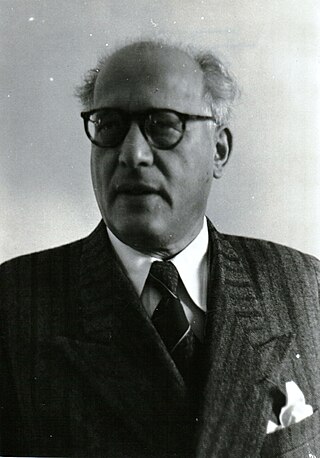 12
Grzegorz Fitelberg was a Polish conductor, violinist and composer. He was a member of the Young Poland group, together with artists such as Karol Szymanowski, Ludomir Różycki and Mieczysław Karłowicz.
12
Grzegorz Fitelberg was a Polish conductor, violinist and composer. He was a member of the Young Poland group, together with artists such as Karol Szymanowski, Ludomir Różycki and Mieczysław Karłowicz.
Andrew Bobola
 12
Andrew Bobola, SJ was a Polish missionary and martyr of the Society of Jesus, known as the Apostle of Lithuania and the "hunter of souls". He was beaten and tortured to death during the Khmelnytsky...
12
Andrew Bobola, SJ was a Polish missionary and martyr of the Society of Jesus, known as the Apostle of Lithuania and the "hunter of souls". He was beaten and tortured to death during the Khmelnytsky...
Saint Casimir
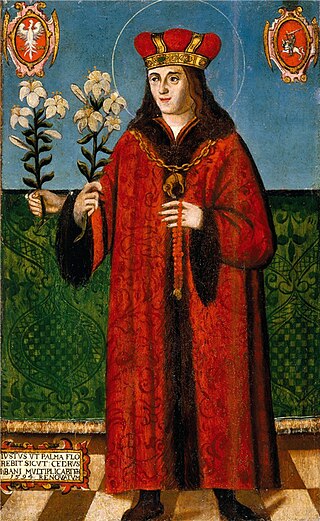 12
Casimir Jagiellon was a prince of the Kingdom of Poland and of the Grand Duchy of Lithuania. The second son of King Casimir IV Jagiellon, he was tutored by Johannes Longinus, a Polish chronicler and...
12
Casimir Jagiellon was a prince of the Kingdom of Poland and of the Grand Duchy of Lithuania. The second son of King Casimir IV Jagiellon, he was tutored by Johannes Longinus, a Polish chronicler and...
Piast the Wheelwright
Maria Kownacka
 12
Maria Kownacka (1894–1982) was a Polish writer, translator and editor, specializing in children's literature. She was a long-time writer of Płomyk. Her best-known work is the series of books about...
12
Maria Kownacka (1894–1982) was a Polish writer, translator and editor, specializing in children's literature. She was a long-time writer of Płomyk. Her best-known work is the series of books about...
Kazimierz Deyna
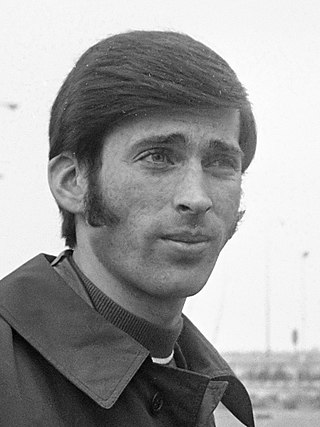 12
Kazimierz Deyna was a Polish professional footballer who played as an attacking midfielder in the playmaker role and was one of the most highly regarded players of his generation, due to his...
12
Kazimierz Deyna was a Polish professional footballer who played as an attacking midfielder in the playmaker role and was one of the most highly regarded players of his generation, due to his...
Jan Tarnowski
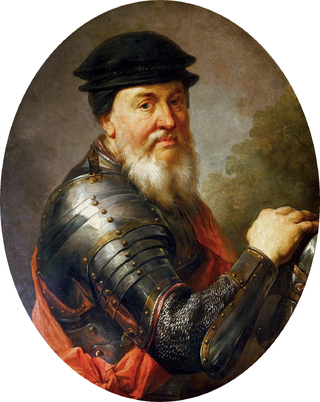 12
Jan Amor Tarnowski was a Polish nobleman, knight, military commander, military theoretician, and statesman of the Crown of the Kingdom of Poland. He was Grand Crown Hetman from 1527, and was the...
12
Jan Amor Tarnowski was a Polish nobleman, knight, military commander, military theoretician, and statesman of the Crown of the Kingdom of Poland. He was Grand Crown Hetman from 1527, and was the...
Witold Małcużyński
 12
Witold Małcużyński was a distinguished Polish pianist who specialized in the works of Frédéric Chopin.
12
Witold Małcużyński was a distinguished Polish pianist who specialized in the works of Frédéric Chopin.
Mestwin II, Duke of Pomerania
 12
Mestwin II was a Duke of Pomerelia, member of the Samborides dynasty. He ruled Pomerelia as a sole ruler from 1273 to 1294.
12
Mestwin II was a Duke of Pomerelia, member of the Samborides dynasty. He ruled Pomerelia as a sole ruler from 1273 to 1294.
John the Baptist
 12
John the Baptist was a Jewish preacher active in the area of the Jordan River in the early 1st century AD. He is also known as Saint John the Forerunner in Eastern Orthodoxy, John the Immerser in...
12
John the Baptist was a Jewish preacher active in the area of the Jordan River in the early 1st century AD. He is also known as Saint John the Forerunner in Eastern Orthodoxy, John the Immerser in...
Galileo Galilei
 12
Galileo di Vincenzo Bonaiuti de' Galilei, commonly referred to as Galileo Galilei or simply Galileo, was an Italian astronomer, physicist and engineer, sometimes described as a polymath. He was born...
12
Galileo di Vincenzo Bonaiuti de' Galilei, commonly referred to as Galileo Galilei or simply Galileo, was an Italian astronomer, physicist and engineer, sometimes described as a polymath. He was born...
Stanisław Ligoń
 12
Stanisław Ligoń, ps. Karlik z Kocyndra – polski pisarz, malarz, ilustrator, działacz kulturalny i narodowy, reżyser, aktor.
12
Stanisław Ligoń, ps. Karlik z Kocyndra – polski pisarz, malarz, ilustrator, działacz kulturalny i narodowy, reżyser, aktor.
Włodzimierz Puchalski
 12
Włodzimierz Puchalski was a Polish photographer and film director. He was a pioneer of wildlife film-making in Poland and became famous for publishing his album "Bezkrwawe łowy" in 1954.
12
Włodzimierz Puchalski was a Polish photographer and film director. He was a pioneer of wildlife film-making in Poland and became famous for publishing his album "Bezkrwawe łowy" in 1954.
Kazimiera Iłłakowiczówna
 12
Kazimiera Iłłakowiczówna was a Polish poet, prose writer, playwright and translator. She was one of the most acclaimed and celebrated poets during Poland's interwar period.
12
Kazimiera Iłłakowiczówna was a Polish poet, prose writer, playwright and translator. She was one of the most acclaimed and celebrated poets during Poland's interwar period.
Edward Stachura
 12
Edward Stachura was a Polish poet, writer and translator. He rose to prominence in the 1960s, receiving prizes for both poetry and prose. His literary output includes four volumes of poetry, three...
12
Edward Stachura was a Polish poet, writer and translator. He rose to prominence in the 1960s, receiving prizes for both poetry and prose. His literary output includes four volumes of poetry, three...
Aleksander Świętochowski
 11
Aleksander Świętochowski was a Polish writer, educator, and philosopher of the Positivist period that followed the January 1863 Uprising.
11
Aleksander Świętochowski was a Polish writer, educator, and philosopher of the Positivist period that followed the January 1863 Uprising.
Stanisław Noakowski
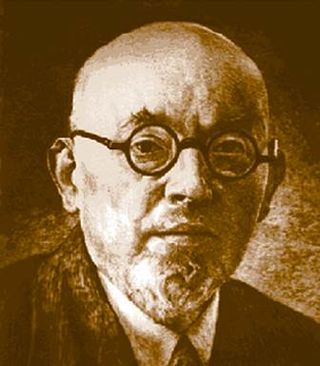 11
Stanisław Noakowski was a Polish architect, watercolorist and art historian. His work was part of the painting event in the art competition at the 1928 Summer Olympics.
11
Stanisław Noakowski was a Polish architect, watercolorist and art historian. His work was part of the painting event in the art competition at the 1928 Summer Olympics.
Ryszard Kaczorowski
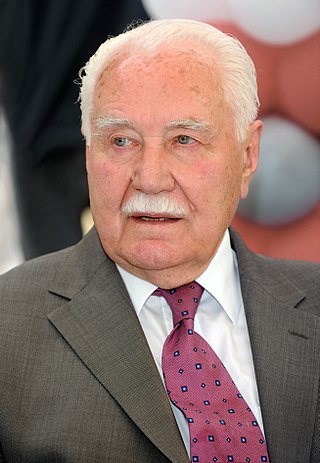 11
Ryszard Kaczorowski, GCMG was a Polish statesman. From 1989 to 1990, he served as the last President of Poland-in-exile. He succeeded Kazimierz Sabbat, and resigned his post following Poland's...
11
Ryszard Kaczorowski, GCMG was a Polish statesman. From 1989 to 1990, he served as the last President of Poland-in-exile. He succeeded Kazimierz Sabbat, and resigned his post following Poland's...
Emilia Sczaniecka
 11
Emilia Sczaniecka herbu Ossoria – polska działaczka społeczna i narodowościowa, zasłużyła się m.in. pomocą niesioną rannym w czasie powstania listopadowego (1830–1831) w Królestwie Polskim.
11
Emilia Sczaniecka herbu Ossoria – polska działaczka społeczna i narodowościowa, zasłużyła się m.in. pomocą niesioną rannym w czasie powstania listopadowego (1830–1831) w Królestwie Polskim.
Ferdinand Foch
 11
Ferdinand Foch was a French general, Marshal of France and member of the Académie Française. He distinguished himself as Supreme Allied Commander on the Western Front during the First World War in...
11
Ferdinand Foch was a French general, Marshal of France and member of the Académie Française. He distinguished himself as Supreme Allied Commander on the Western Front during the First World War in...
Jakub Wejher
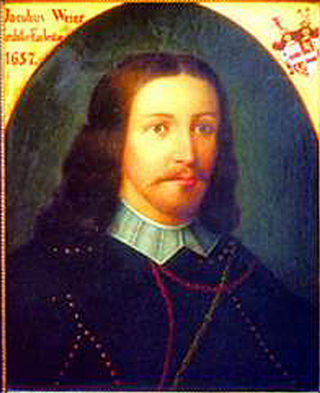 11
Jakub Wejher, was a member of the Polish line of the Weyher family, a Count of the Holy Roman Empire and member of the Polish–Lithuanian Commonwealth szlachta (nobility). His coat of arms was Wejher....
11
Jakub Wejher, was a member of the Polish line of the Weyher family, a Count of the Holy Roman Empire and member of the Polish–Lithuanian Commonwealth szlachta (nobility). His coat of arms was Wejher....
Jan Stanisławski (painter)
 11
Jan Grzegorz Stanisławski was a Polish modernist painter, art educator, and founder and member of various innovative art groups and literary societies. In 1906 he became a full professor at the...
11
Jan Grzegorz Stanisławski was a Polish modernist painter, art educator, and founder and member of various innovative art groups and literary societies. In 1906 he became a full professor at the...
Ludwik Idzikowski
 11
Ludwik Idzikowski was a Polish military aviator. He died during a transatlantic flight trial.
11
Ludwik Idzikowski was a Polish military aviator. He died during a transatlantic flight trial.
Konrad Wallenrod
 11
Konrad Wallenrod is an 1828 narrative poem, in Polish, by Adam Mickiewicz, set in the 14th-century Grand Duchy of Lithuania.
11
Konrad Wallenrod is an 1828 narrative poem, in Polish, by Adam Mickiewicz, set in the 14th-century Grand Duchy of Lithuania.
Henryk Arctowski
 11
Henryk Arctowski, born Henryk Artzt, was a Polish scientist and explorer.
11
Henryk Arctowski, born Henryk Artzt, was a Polish scientist and explorer.
Józef Czechowicz
 11
Józef Czechowicz was an avant-garde Polish poet. Known as a nostalgic, catastrophic author, he was also the leader of the literary avant-garde and bohemians in Lublin. For this visionary poet, verse...
11
Józef Czechowicz was an avant-garde Polish poet. Known as a nostalgic, catastrophic author, he was also the leader of the literary avant-garde and bohemians in Lublin. For this visionary poet, verse...
Wojciech Gerson
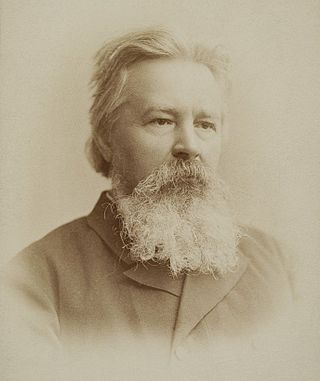 11
Wojciech Gerson was a leading Polish painter of the mid-19th century, and one of the foremost representatives of the Polish school of Realism during the foreign Partitions of Poland. He served as...
11
Wojciech Gerson was a leading Polish painter of the mid-19th century, and one of the foremost representatives of the Polish school of Realism during the foreign Partitions of Poland. He served as...
Józef Brandt
 11
Józef Brandt was a Polish painter, a representative of the Munich School, best known for his paintings of battles.
11
Józef Brandt was a Polish painter, a representative of the Munich School, best known for his paintings of battles.
Zygmunt Gloger
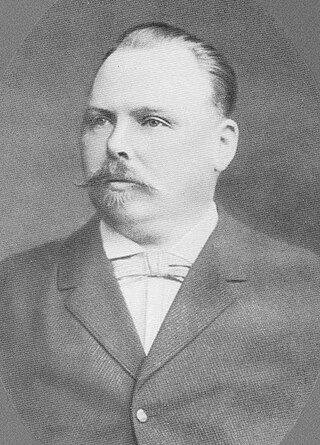 11
Zygmunt Gloger was a Polish historian, archaeologist, geographer and ethnographer, bearer of the Wilczekosy coat of arms. Gloger founded the precursor of modern and widely popular Polish Tourist and...
11
Zygmunt Gloger was a Polish historian, archaeologist, geographer and ethnographer, bearer of the Wilczekosy coat of arms. Gloger founded the precursor of modern and widely popular Polish Tourist and...
Zofia Kossak-Szczucka
 11
Zofia Kossak-Szczucka was a Polish writer and World War II resistance fighter. She co-founded two wartime Polish organizations: Front for the Rebirth of Poland and Żegota, set up to assist Polish...
11
Zofia Kossak-Szczucka was a Polish writer and World War II resistance fighter. She co-founded two wartime Polish organizations: Front for the Rebirth of Poland and Żegota, set up to assist Polish...
John I Albert
 11
John I Albert was King of Poland from 1492 to his death and Duke of Głogów from 1491 to 1498. He was the fourth Polish sovereign from the Jagiellonian dynasty and the son of Casimir IV and Elizabeth...
11
John I Albert was King of Poland from 1492 to his death and Duke of Głogów from 1491 to 1498. He was the fourth Polish sovereign from the Jagiellonian dynasty and the son of Casimir IV and Elizabeth...
Józef Szafranek
 11
Józef Szafranek, właśc. Joseph Schaffranek – śląski ksiądz katolicki, działacz społeczny, polityczny, tłumacz, autor i wydawca. W latach 1840–1874 proboszcz parafii Wniebowzięcia Najświętszej Maryi...
11
Józef Szafranek, właśc. Joseph Schaffranek – śląski ksiądz katolicki, działacz społeczny, polityczny, tłumacz, autor i wydawca. W latach 1840–1874 proboszcz parafii Wniebowzięcia Najświętszej Maryi...
Andrzej Mielęcki
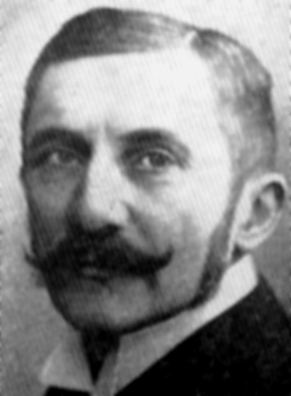 11
Andrzej Mielęcki herbu Ciołek – polski działacz społeczny i polityczny na Górnym Śląsku, lekarz.
11
Andrzej Mielęcki herbu Ciołek – polski działacz społeczny i polityczny na Górnym Śląsku, lekarz.
John Cantius
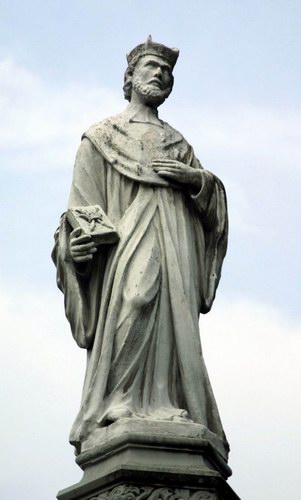 11
John Cantius was a Polish Catholic priest, scholastic philosopher, physicist and theologian.
11
John Cantius was a Polish Catholic priest, scholastic philosopher, physicist and theologian.
Louis Pasteur
 11
Louis Pasteur was a French chemist, pharmacist, and microbiologist renowned for his discoveries of the principles of vaccination, microbial fermentation, and pasteurization, the last of which was...
11
Louis Pasteur was a French chemist, pharmacist, and microbiologist renowned for his discoveries of the principles of vaccination, microbial fermentation, and pasteurization, the last of which was...
Jan Cybis
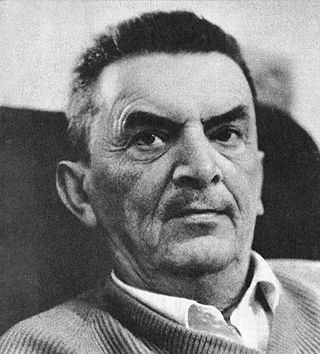 11
Jan Cybis was a prominent Polish painter and art teacher.
11
Jan Cybis was a prominent Polish painter and art teacher.
Gustaw Orlicz-Dreszer
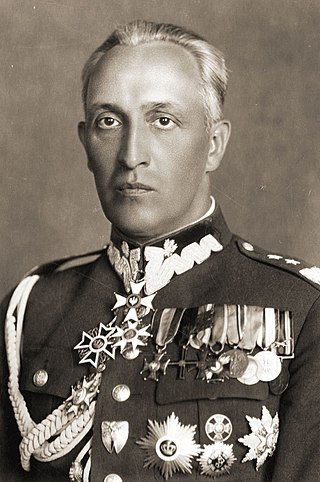 11
Gustaw Konstanty Orlicz-Dreszer was a Polish general, and a political and social activist.
11
Gustaw Konstanty Orlicz-Dreszer was a Polish general, and a political and social activist.
Tadeusz Rozwadowski
 11
Count Tadeusz Jordan-Rozwadowski was a Polish military commander, diplomat, and politician, a general of the Austro-Hungarian Army and then the Polish Army.
11
Count Tadeusz Jordan-Rozwadowski was a Polish military commander, diplomat, and politician, a general of the Austro-Hungarian Army and then the Polish Army.
Bartholomew the Apostle
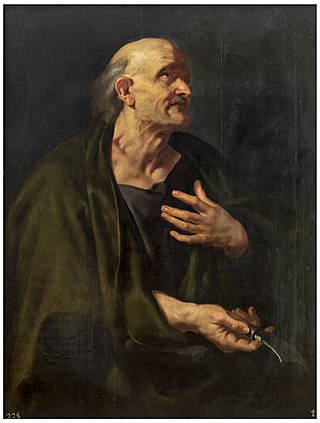 11
Bartholomew was one of the twelve apostles of Jesus according to the New Testament. Most scholars today identify Bartholomew as Nathanael or Nathaniel, who appears in the Gospel of John.
11
Bartholomew was one of the twelve apostles of Jesus according to the New Testament. Most scholars today identify Bartholomew as Nathanael or Nathaniel, who appears in the Gospel of John.
Andrew the Apostle
 11
Andrew the Apostle, also called Saint Andrew, was an apostle of Jesus. According to the New Testament, he was a fisherman and one of the Twelve Apostles chosen by Jesus. The title First-Called stems...
11
Andrew the Apostle, also called Saint Andrew, was an apostle of Jesus. According to the New Testament, he was a fisherman and one of the Twelve Apostles chosen by Jesus. The title First-Called stems...
Peter and Wendy
 11
Peter Pan; or, the Boy Who Wouldn't Grow Up, often known simply as Peter Pan, is a work by J. M. Barrie, in the form of a 1904 play and a 1911 novel titled Peter and Wendy, often extended in Peter...
11
Peter Pan; or, the Boy Who Wouldn't Grow Up, often known simply as Peter Pan, is a work by J. M. Barrie, in the form of a 1904 play and a 1911 novel titled Peter and Wendy, often extended in Peter...
Wolfgang Amadeus Mozart
 11
Wolfgang Amadeus Mozart was a prolific and influential composer of the Classical period. Despite his short life, his rapid pace of composition resulted in more than 800 works representing virtually...
11
Wolfgang Amadeus Mozart was a prolific and influential composer of the Classical period. Despite his short life, his rapid pace of composition resulted in more than 800 works representing virtually...
Benedykt Dybowski
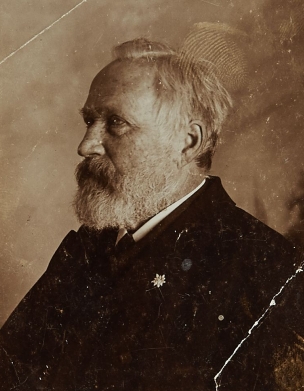 11
Benedykt Tadeusz Dybowski was a Polish naturalist and physician.
11
Benedykt Tadeusz Dybowski was a Polish naturalist and physician.
Sigismund I the Old
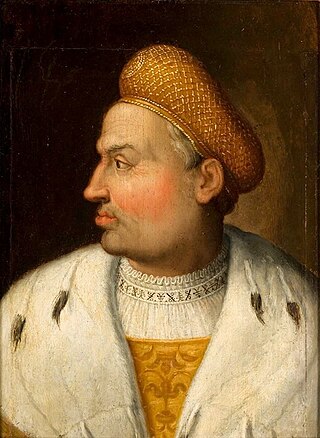 11
Sigismund I the Old was King of Poland and Grand Duke of Lithuania from 1506 until his death in 1548. Sigismund I was a member of the Jagiellonian dynasty, the son of Casimir IV and younger brother...
11
Sigismund I the Old was King of Poland and Grand Duke of Lithuania from 1506 until his death in 1548. Sigismund I was a member of the Jagiellonian dynasty, the son of Casimir IV and younger brother...
Tadeusz Ślusarski
 11
Tadeusz Ślusarski was a Polish Olympic gold medalist in pole vault at the 1976 Olympics, as well as a silver medalist at the 1980 Olympics.
11
Tadeusz Ślusarski was a Polish Olympic gold medalist in pole vault at the 1976 Olympics, as well as a silver medalist at the 1980 Olympics.
Józef Tischner
 11
Józef Stanisław Tischner was a Polish priest and philosopher. The first chaplain of the trade union, "Solidarity".
11
Józef Stanisław Tischner was a Polish priest and philosopher. The first chaplain of the trade union, "Solidarity".
Edmund Taczanowski
 11
Edmund Taczanowski was a Polish general, insurrectionist, member of the Taczanowski magnate dynasty, and Lord of the estate of Choryń in the province of Poznań.
11
Edmund Taczanowski was a Polish general, insurrectionist, member of the Taczanowski magnate dynasty, and Lord of the estate of Choryń in the province of Poznań.
Krzysztof Komeda
 11
Krzysztof Trzciński, known professionally as Krzysztof Komeda, was a Polish film music composer and jazz pianist. Perhaps best known for his work in film scores, Komeda wrote the scores for Roman...
11
Krzysztof Trzciński, known professionally as Krzysztof Komeda, was a Polish film music composer and jazz pianist. Perhaps best known for his work in film scores, Komeda wrote the scores for Roman...
Stanisław Gabriel Worcell
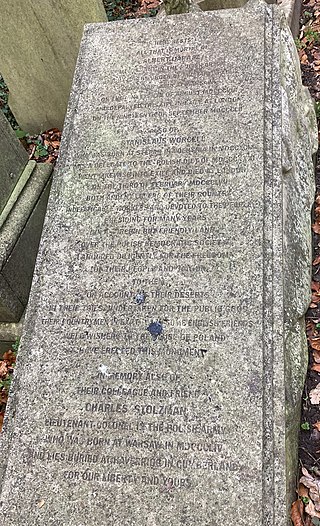 10
Stanisław Gabriel Worcell was a socialist Polish revolutionary.
10
Stanisław Gabriel Worcell was a socialist Polish revolutionary.
Jan Pietrusiński
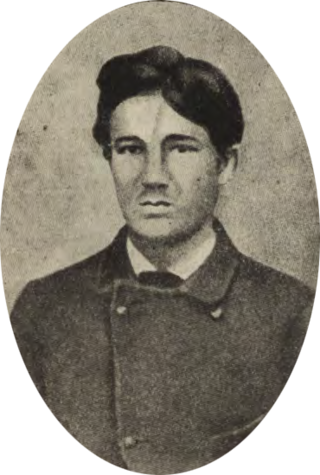 10
Jan Pietrusiński – tkacz, działacz ruchu robotniczego.
10
Jan Pietrusiński – tkacz, działacz ruchu robotniczego.
Tomasz Nocznicki
 10
Tomasz Nocznicki, ps. Paweł spod Grójca, Tomasz Wiejski – polski działacz ruchu ludowego i niepodległościowego, publicysta, współzałożyciel „Zarania”, poseł na Sejm i senator. Minister bez teki w...
10
Tomasz Nocznicki, ps. Paweł spod Grójca, Tomasz Wiejski – polski działacz ruchu ludowego i niepodległościowego, publicysta, współzałożyciel „Zarania”, poseł na Sejm i senator. Minister bez teki w...
Leopold Lis-Kula
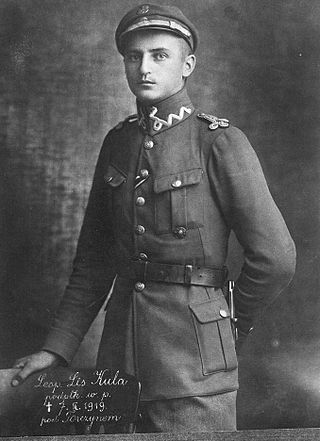 10
Leopold Lis-Kula was a Colonel of Infantry of the Polish Army, and recipient of the Virtuti Militari. Lis Kula was born on November 11, 1896, in the village of Kosina near Łańcut, and died on March...
10
Leopold Lis-Kula was a Colonel of Infantry of the Polish Army, and recipient of the Virtuti Militari. Lis Kula was born on November 11, 1896, in the village of Kosina near Łańcut, and died on March...
Ludwik Rydygier
 10
Ludwik Antoni Rydygier was a Polish surgeon, professor of medicine, rector of the University of Lwów and Brigadier General of the Polish Army. He was one of the most distinguished Polish and...
10
Ludwik Antoni Rydygier was a Polish surgeon, professor of medicine, rector of the University of Lwów and Brigadier General of the Polish Army. He was one of the most distinguished Polish and...
Jan Parandowski
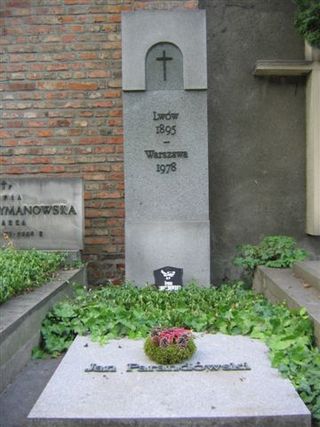 10
Jan Parandowski was a Polish writer, essayist, and translator. Best known for his works relating to classical antiquity, he was also the president of the Polish PEN Club between 1933 and 1978, with a...
10
Jan Parandowski was a Polish writer, essayist, and translator. Best known for his works relating to classical antiquity, he was also the president of the Polish PEN Club between 1933 and 1978, with a...
Robert Koch
 10
Heinrich Hermann Robert Koch was a German physician and microbiologist. As the discoverer of the specific causative agents of deadly infectious diseases including tuberculosis, cholera and anthrax,...
10
Heinrich Hermann Robert Koch was a German physician and microbiologist. As the discoverer of the specific causative agents of deadly infectious diseases including tuberculosis, cholera and anthrax,...
Stefan Drzewiecki
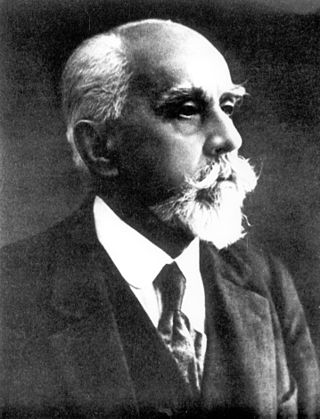 10
Stefan Drzewiecki was a Polish scientist, journalist, engineer, constructor and inventor, known for designing and constructing the world's first electric-powered submarine. He worked mainly in France...
10
Stefan Drzewiecki was a Polish scientist, journalist, engineer, constructor and inventor, known for designing and constructing the world's first electric-powered submarine. He worked mainly in France...
Karol Kniaziewicz
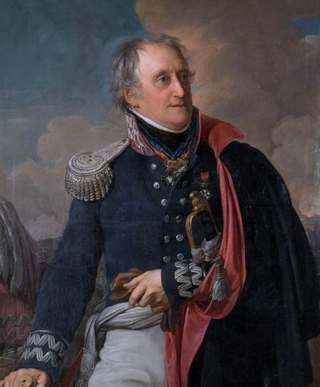 10
Baron Karol Otto Kniaziewicz was a Polish general and political activist.
10
Baron Karol Otto Kniaziewicz was a Polish general and political activist.
Fryderyk Skarbek
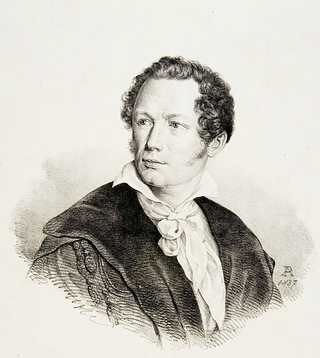 10
Fryderyk Florian Skarbek, a member of the Polish nobility, was an economist, novelist, historian, social activist, administrator, politician, and penologist who designed the Pawiak Prison of World...
10
Fryderyk Florian Skarbek, a member of the Polish nobility, was an economist, novelist, historian, social activist, administrator, politician, and penologist who designed the Pawiak Prison of World...
Ludwik Hirszfeld
 10
Ludwik Hirszfeld was a Polish microbiologist and serologist. He is considered a co-discoverer of the inheritance of ABO blood types.
10
Ludwik Hirszfeld was a Polish microbiologist and serologist. He is considered a co-discoverer of the inheritance of ABO blood types.
Maria Zientara-Malewska
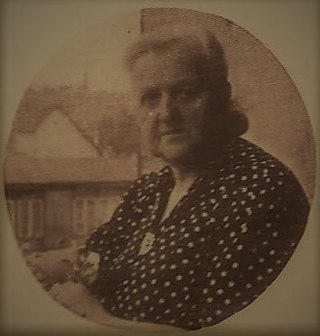 10
Maria Zientara-Malewska – poetka, nauczycielka i działaczka warmińska. Budownicza Polski Ludowej.
10
Maria Zientara-Malewska – poetka, nauczycielka i działaczka warmińska. Budownicza Polski Ludowej.
Józef Rostek
 10
Józef Rostek – polski lekarz w Raciborzu, znany działacz społeczny Górnego Śląska, założyciel kilku stowarzyszeń polskich.
10
Józef Rostek – polski lekarz w Raciborzu, znany działacz społeczny Górnego Śląska, założyciel kilku stowarzyszeń polskich.
Jan Zygmunt Skrzynecki
 10
Jan Zygmunt Skrzynecki was a Polish general, and commander-in-chief of the November Uprising (1830–1831).
10
Jan Zygmunt Skrzynecki was a Polish general, and commander-in-chief of the November Uprising (1830–1831).
Edward Rydz-Śmigły
 10
Marshal Edward Rydz-Śmigły, also called Edward Śmigły-Rydz, was a Polish politician, statesman, Marshal of Poland and Commander-in-Chief of Poland's armed forces, as well as a painter and poet.
10
Marshal Edward Rydz-Śmigły, also called Edward Śmigły-Rydz, was a Polish politician, statesman, Marshal of Poland and Commander-in-Chief of Poland's armed forces, as well as a painter and poet.
Irena Sendler
 10
Irena Stanisława Sendler (née Krzyżanowska), also referred to as Irena Sendlerowa in Poland, nom de guerre Jolanta, was a Polish humanitarian, social worker, and nurse who served in the Polish...
10
Irena Stanisława Sendler (née Krzyżanowska), also referred to as Irena Sendlerowa in Poland, nom de guerre Jolanta, was a Polish humanitarian, social worker, and nurse who served in the Polish...
Lucjan Żeligowski
 10
Lucjan Żeligowski was a Polish-Lithuanian general, politician, military commander and veteran of World War I, the Polish-Soviet War and World War II. He is mostly remembered for his role in...
10
Lucjan Żeligowski was a Polish-Lithuanian general, politician, military commander and veteran of World War I, the Polish-Soviet War and World War II. He is mostly remembered for his role in...
Halina Konopacka
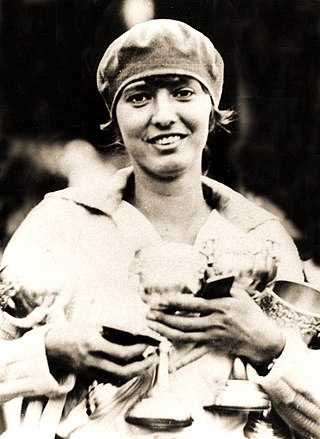 10
Halina Konopacka was a Polish athlete. She won the discus throw event at the 1928 Summer Olympics, defeating American silver medal winner Lillian Copeland, breaking her own world record, and...
10
Halina Konopacka was a Polish athlete. She won the discus throw event at the 1928 Summer Olympics, defeating American silver medal winner Lillian Copeland, breaking her own world record, and...
Władysław Komar
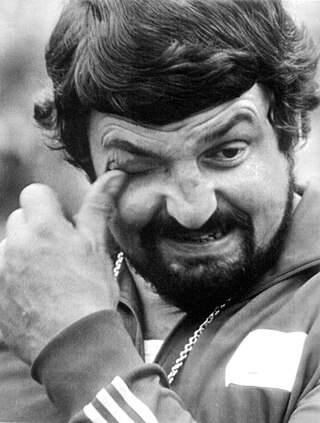 10
Władysław Stefan Komar was a Polish shot putter, actor and cabaretist. Competing in three Summer Olympics between 1964 and 1972, he won the gold medal at the Munich Games in 1972 with a throw of...
10
Władysław Stefan Komar was a Polish shot putter, actor and cabaretist. Competing in three Summer Olympics between 1964 and 1972, he won the gold medal at the Munich Games in 1972 with a throw of...
Władysław Podkowiński
 10
Władysław Podkowiński was a Polish master painter and illustrator associated with the Young Poland movement during the Partition period.
10
Władysław Podkowiński was a Polish master painter and illustrator associated with the Young Poland movement during the Partition period.
Henryk Dembiński
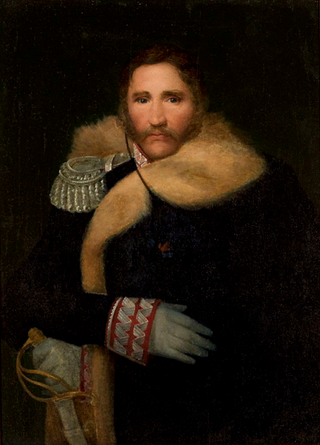 10
Henryk Dembiński was a Polish engineer, traveler and general.
10
Henryk Dembiński was a Polish engineer, traveler and general.
Jan Kozietulski
 10
Baron Jan Leon Hipolit Kozietulski was a Polish noble, military commander and an officer of the armed forces of the Duchy of Warsaw during the Napoleonic Wars. He is best remembered as the heroic...
10
Baron Jan Leon Hipolit Kozietulski was a Polish noble, military commander and an officer of the armed forces of the Duchy of Warsaw during the Napoleonic Wars. He is best remembered as the heroic...
Mieczysław Jastrun
 10
Mieczysław Jastrun born Mojsze Agatstein was a Polish poet and essayist of Jewish origin. The main themes of his poetry are philosophy and morality. He translated French, Russian, and German poetry...
10
Mieczysław Jastrun born Mojsze Agatstein was a Polish poet and essayist of Jewish origin. The main themes of his poetry are philosophy and morality. He translated French, Russian, and German poetry...
Ignacy Solarz
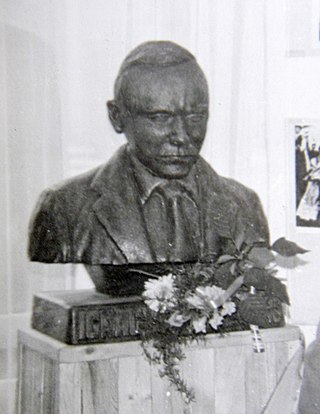 10
Ignacy Solarz, ps. Chrzestny – polski pedagog, działacz ruchu ludowego i spółdzielczego, założyciel Związku Młodzieży Wiejskiej RP i uniwersytetów ludowych.
10
Ignacy Solarz, ps. Chrzestny – polski pedagog, działacz ruchu ludowego i spółdzielczego, założyciel Związku Młodzieży Wiejskiej RP i uniwersytetów ludowych.
Hanka Ordonówna
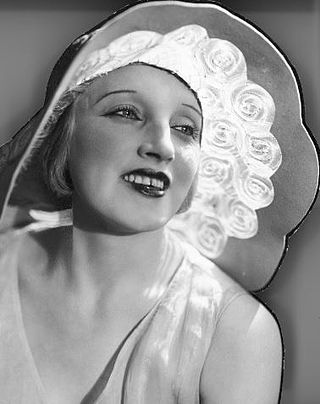 10
Hanka Ordonówna or Ordonka was a Polish singer, dancer and actress.
10
Hanka Ordonówna or Ordonka was a Polish singer, dancer and actress.
Henryk Górecki
 10
Henryk Mikołaj Górecki was a Polish composer of contemporary classical music. According to critic Alex Ross, no recent classical composer has had as much commercial success as Górecki. He became a...
10
Henryk Mikołaj Górecki was a Polish composer of contemporary classical music. According to critic Alex Ross, no recent classical composer has had as much commercial success as Górecki. He became a...
George Washington
 9
George Washington was an American Founding Father, military officer, and politician who served as the first president of the United States from 1789 to 1797. Appointed by the Second Continental...
9
George Washington was an American Founding Father, military officer, and politician who served as the first president of the United States from 1789 to 1797. Appointed by the Second Continental...
Ignacy Potocki
 9
Count Roman Ignacy Potocki, generally known as Ignacy Potocki, was a Polish nobleman, member of the influential magnate Potocki family, owner of Klementowice and Olesin, a politician, statesman,...
9
Count Roman Ignacy Potocki, generally known as Ignacy Potocki, was a Polish nobleman, member of the influential magnate Potocki family, owner of Klementowice and Olesin, a politician, statesman,...
Franciszek Ratajczak
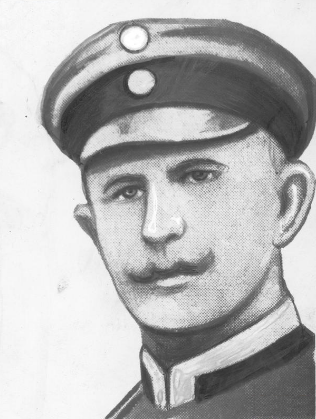 9
Franciszek Ratajczak – polski wojskowy i działacz niepodległościowy. Pierwszy powstaniec wielkopolski poległy w walce.
9
Franciszek Ratajczak – polski wojskowy i działacz niepodległościowy. Pierwszy powstaniec wielkopolski poległy w walce.
Paweł Włodkowic
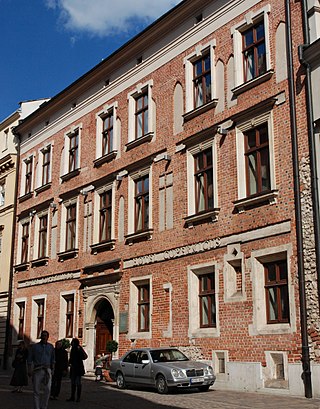 9
Paweł Włodkowic was a Polish scholar, jurist, statesman and rector of the Kraków Academy. He advocated a form of religious tolerance and defended Poland and native non-Christian tribes against the...
9
Paweł Włodkowic was a Polish scholar, jurist, statesman and rector of the Kraków Academy. He advocated a form of religious tolerance and defended Poland and native non-Christian tribes against the...
Zbyszko z Bogdańca
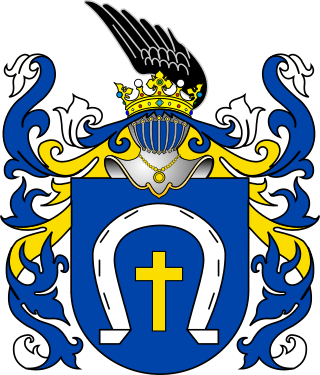 9
Zbyszko z Bogdańca – pierwszoplanowa postać literacka z powieści Krzyżacy Henryka Sienkiewicza.
9
Zbyszko z Bogdańca – pierwszoplanowa postać literacka z powieści Krzyżacy Henryka Sienkiewicza.
Klemens Janicki
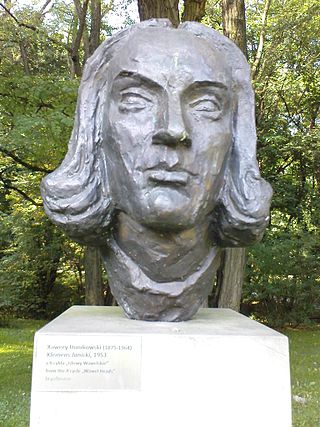 9
Klemens Janicki (1516–1543) was one of the most outstanding Latin poets of the 16th century.
9
Klemens Janicki (1516–1543) was one of the most outstanding Latin poets of the 16th century.
Tomasz Judym
 9
Tomasz Judym – fikcyjna postać literacka, główny bohater powieści Stefana Żeromskiego pt. „Ludzie bezdomni”.
9
Tomasz Judym – fikcyjna postać literacka, główny bohater powieści Stefana Żeromskiego pt. „Ludzie bezdomni”.
Adam Próchnik
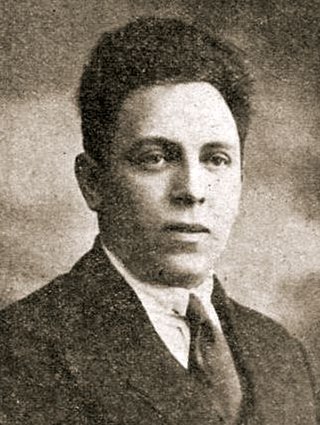 9
Adam Feliks Próchnik was a Polish socialist activist, politician and historian.
9
Adam Feliks Próchnik was a Polish socialist activist, politician and historian.
Krzysztof Celestyn Mrongovius
 9
Krzysztof Celestyn Mrongovius was a Protestant pastor, writer, philosopher, distinguished linguist, and translator. Mrongovius was a noted defender of the Polish language in Warmia and Mazury.
9
Krzysztof Celestyn Mrongovius was a Protestant pastor, writer, philosopher, distinguished linguist, and translator. Mrongovius was a noted defender of the Polish language in Warmia and Mazury.
Piotr Niedurny
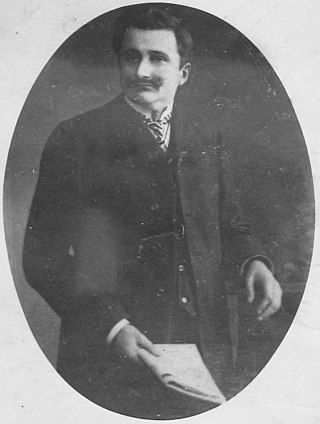 9
Piotr Niedurny – polski działacz niepodległościowy.
9
Piotr Niedurny – polski działacz niepodległościowy.
Leo Tolstoy
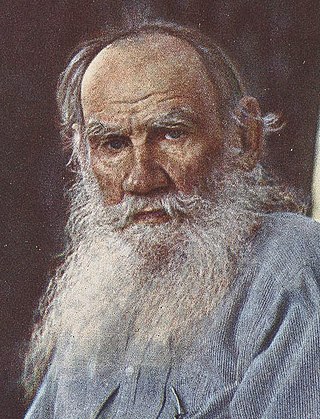 9
Count Lev Nikolayevich Tolstoy, usually referred to in English as Leo Tolstoy, was a Russian writer. He is regarded as one of the greatest and most influential authors of all time. He received...
9
Count Lev Nikolayevich Tolstoy, usually referred to in English as Leo Tolstoy, was a Russian writer. He is regarded as one of the greatest and most influential authors of all time. He received...
Marcin Kromer
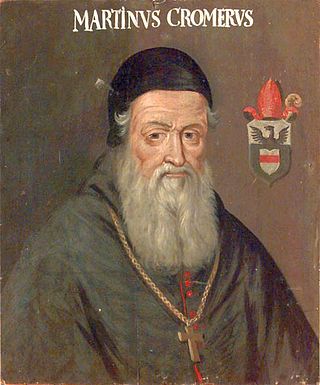 9
Marcin Kromer was Prince-Bishop of Warmia (Ermland), a Polish cartographer, diplomat and historian in the Kingdom of Poland and later in the Polish–Lithuanian Commonwealth. He was a personal...
9
Marcin Kromer was Prince-Bishop of Warmia (Ermland), a Polish cartographer, diplomat and historian in the Kingdom of Poland and later in the Polish–Lithuanian Commonwealth. He was a personal...
Ludwik Krzywicki
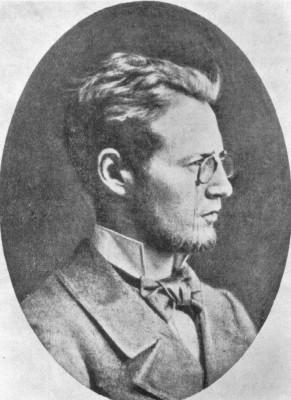 9
Ludwik Joachim Franciszek Krzywicki was a Polish Marxist anthropologist, economist, and sociologist.
9
Ludwik Joachim Franciszek Krzywicki was a Polish Marxist anthropologist, economist, and sociologist.
Mikołaj Bołtuć
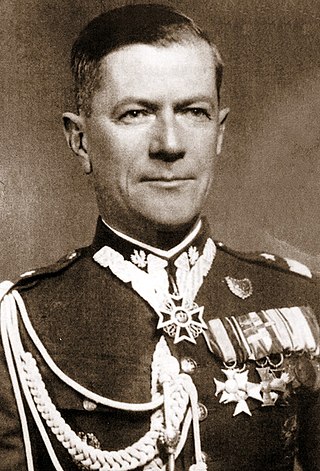 9
Mikołaj Bołtuć was a brigadier-general of the Polish Army, commander of the IV Polish infantry Division during World War II.
9
Mikołaj Bołtuć was a brigadier-general of the Polish Army, commander of the IV Polish infantry Division during World War II.
Władysław Skoczylas
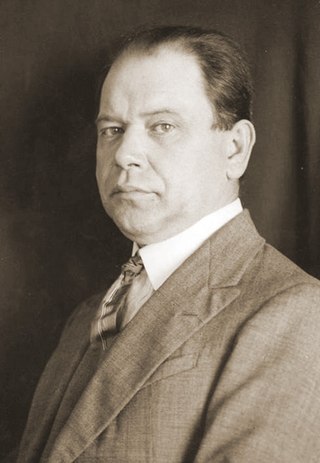 9
Władysław Skoczylas was a Polish watercolorist, woodcutter, sculptor and art teacher.
9
Władysław Skoczylas was a Polish watercolorist, woodcutter, sculptor and art teacher.
Karol Lipiński
 9
Karol Józef Lipiński was a Polish music composer and virtuoso violinist active during the partitions of Poland. The Karol Lipiński University of Music in Wrocław, Poland is named after him.
9
Karol Józef Lipiński was a Polish music composer and virtuoso violinist active during the partitions of Poland. The Karol Lipiński University of Music in Wrocław, Poland is named after him.
August Hlond
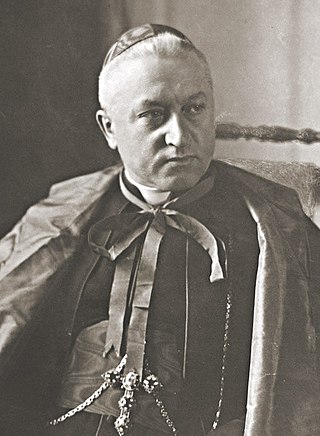 9
August Hlond, SDB was a Polish Salesian prelate who served as Archbishop of Poznań and Gniezno and as Primate of Poland. He was later appointed as Archbishop of Gniezno and Warsaw and was made a...
9
August Hlond, SDB was a Polish Salesian prelate who served as Archbishop of Poznań and Gniezno and as Primate of Poland. He was later appointed as Archbishop of Gniezno and Warsaw and was made a...
Alfred Nobel
 9
Alfred Bernhard Nobel was a Swedish chemist, inventor, engineer and businessman. He is known for inventing dynamite as well as having bequeathed his fortune to establish the Nobel Prize. He also made...
9
Alfred Bernhard Nobel was a Swedish chemist, inventor, engineer and businessman. He is known for inventing dynamite as well as having bequeathed his fortune to establish the Nobel Prize. He also made...
Maria Kuncewiczowa
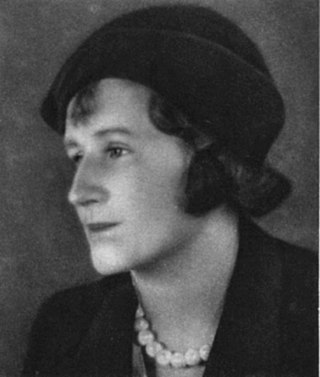 9
Maria Kuncewiczowa was a Polish writer and novelist. Kuncewiczowa's works span from short stories to novels to radio novels to literary diaries.
9
Maria Kuncewiczowa was a Polish writer and novelist. Kuncewiczowa's works span from short stories to novels to radio novels to literary diaries.
Krzysztof Arciszewski
 9
Krzysztof Arciszewski was a Polish nobleman, military officer, engineer, and ethnographer. Arciszewski also served as a general of artillery for the Netherlands and Poland.
9
Krzysztof Arciszewski was a Polish nobleman, military officer, engineer, and ethnographer. Arciszewski also served as a general of artillery for the Netherlands and Poland.
Michał Grażyński
 9
Michał Grażyński was a Polish military leader, social and political activist, doctor of philosophy and law, voivode of the Silesian Voivodeship, Scouting activist and president of Związek Harcerstwa...
9
Michał Grażyński was a Polish military leader, social and political activist, doctor of philosophy and law, voivode of the Silesian Voivodeship, Scouting activist and president of Związek Harcerstwa...
Tadeusz Banachiewicz
 9
Tadeusz Julian Banachiewicz was a Polish astronomer, mathematician and geodesist.
9
Tadeusz Julian Banachiewicz was a Polish astronomer, mathematician and geodesist.
Leon Kruczkowski
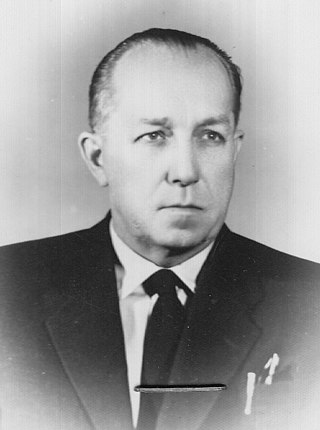 9
Leon Kruczkowski was a Polish writer, publicist and public figure. He wrote books and dramas and was prominent in Polish theatre of the post-World War II period. His best known work is the drama...
9
Leon Kruczkowski was a Polish writer, publicist and public figure. He wrote books and dramas and was prominent in Polish theatre of the post-World War II period. His best known work is the drama...
Ryszard Kukliński
 9
Ryszard Jerzy Kukliński was a Polish Army colonel and Cold War spy for NATO. He was posthumously promoted to brigadier general by Polish President Andrzej Duda.
9
Ryszard Jerzy Kukliński was a Polish Army colonel and Cold War spy for NATO. He was posthumously promoted to brigadier general by Polish President Andrzej Duda.
Jan Aleksander Karłowicz
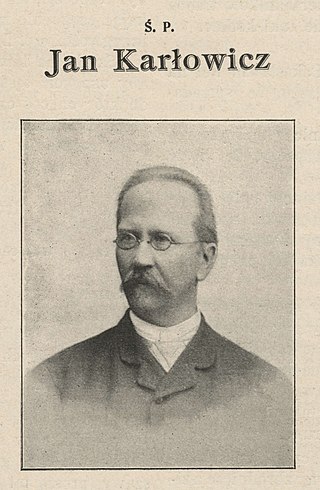 9
Jan Aleksander Ludwik Karłowicz herbu Ostoja – polski etnograf, muzykolog, językoznawca, folklorysta, członek Akademii Umiejętności, członek honorowy Towarzystwa Muzeum Narodowego Polskiego w...
9
Jan Aleksander Ludwik Karłowicz herbu Ostoja – polski etnograf, muzykolog, językoznawca, folklorysta, członek Akademii Umiejętności, członek honorowy Towarzystwa Muzeum Narodowego Polskiego w...
Andrzej Wajda
 9
Andrzej Witold Wajda was a Polish film and theatre director. Recipient of an Honorary Oscar, the Palme d'Or, as well as Honorary Golden Lion and Honorary Golden Bear Awards, he was a prominent member...
9
Andrzej Witold Wajda was a Polish film and theatre director. Recipient of an Honorary Oscar, the Palme d'Or, as well as Honorary Golden Lion and Honorary Golden Bear Awards, he was a prominent member...
Wacław Sieroszewski
 9
Wacław Kajetan Sieroszewski was a Polish writer, Polish Socialist Party activist, and soldier in the World War I-era Polish Legions. For activities subversive of the Russian Empire, he had spent many...
9
Wacław Kajetan Sieroszewski was a Polish writer, Polish Socialist Party activist, and soldier in the World War I-era Polish Legions. For activities subversive of the Russian Empire, he had spent many...
Tadeusz Jasiński
 9
Tadeusz Jasiński - was one of the young defenders of Grodno in September 1939, after the Soviet invasion of Poland. He was one of the civilians captured and used by the Soviets as "human shields"...
9
Tadeusz Jasiński - was one of the young defenders of Grodno in September 1939, after the Soviet invasion of Poland. He was one of the civilians captured and used by the Soviets as "human shields"...
Aleksander Zawadzki
 9
Aleksander Zawadzki, alias Kazik, Wacek, Bronek, One was a Polish communist politician, divisional general of the Polish Army, and the Chairman of the State Council of the Polish People's Republic...
9
Aleksander Zawadzki, alias Kazik, Wacek, Bronek, One was a Polish communist politician, divisional general of the Polish Army, and the Chairman of the State Council of the Polish People's Republic...
Franciszek Myśliwiec
 9
Franciszek Myśliwiec – polski działacz narodowy na Śląsku Opolskim, prezes Dzielnicy Śląskiej Związku Polaków w Niemczech.
9
Franciszek Myśliwiec – polski działacz narodowy na Śląsku Opolskim, prezes Dzielnicy Śląskiej Związku Polaków w Niemczech.
Jurand ze Spychowa
 9
Jurand ze Spychowa – fikcyjna postać z powieści Krzyżacy Henryka Sienkiewicza (1887–1900); polski rycerz, który po śmierci swej żony stał się pogromcą odpowiedzialnych za jej zgon Krzyżaków; ojciec...
9
Jurand ze Spychowa – fikcyjna postać z powieści Krzyżacy Henryka Sienkiewicza (1887–1900); polski rycerz, który po śmierci swej żony stał się pogromcą odpowiedzialnych za jej zgon Krzyżaków; ojciec...
Barbara Radziwiłł
 9
Barbara Radziwiłł was Queen of Poland and Grand Duchess of Lithuania as consort of Sigismund II Augustus, the last male monarch of the Jagiellon dynasty. Barbara, a great beauty and already widowed,...
9
Barbara Radziwiłł was Queen of Poland and Grand Duchess of Lithuania as consort of Sigismund II Augustus, the last male monarch of the Jagiellon dynasty. Barbara, a great beauty and already widowed,...
Stanisław Orzechowski
 9
Stanisław Orzechowski, also known among others as Stanisław Orżechowski Roxolan, Stanislaus Orichovius Polonus, Stanislaus Orichovius Ruthenus, Stanislaus Okszyc Orzechowski Roxolanus, Stanislas...
9
Stanisław Orzechowski, also known among others as Stanisław Orżechowski Roxolan, Stanislaus Orichovius Polonus, Stanislaus Orichovius Ruthenus, Stanislaus Okszyc Orzechowski Roxolanus, Stanislas...
Joseph Freiherr von Eichendorff
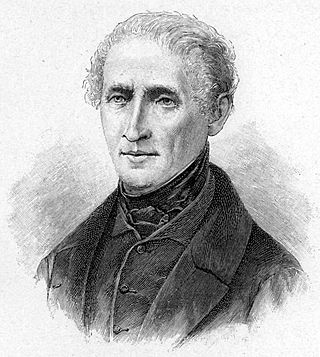 9
Joseph Freiherr von Eichendorff was a German poet, novelist, playwright, literary critic, translator, and anthologist. Eichendorff was one of the major writers and critics of Romanticism. Ever since...
9
Joseph Freiherr von Eichendorff was a German poet, novelist, playwright, literary critic, translator, and anthologist. Eichendorff was one of the major writers and critics of Romanticism. Ever since...
Bolek and Lolek
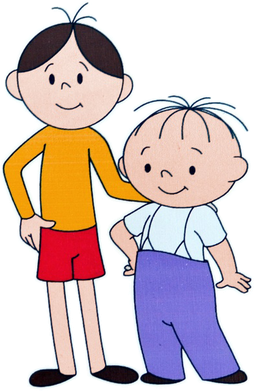 9
Bolek and Lolek, are two Polish cartoon characters from the children's animated comedy television series by the same name. The series was created, written and directed by Władysław Nehrebecki and...
9
Bolek and Lolek, are two Polish cartoon characters from the children's animated comedy television series by the same name. The series was created, written and directed by Władysław Nehrebecki and...
Ewaryst Estkowski
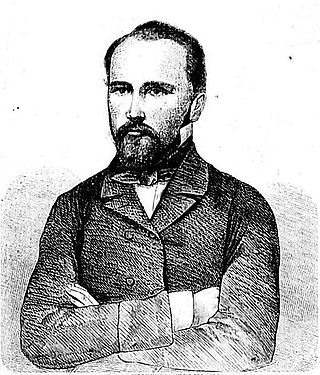 9
Ewaryst Estkowski was a Polish teacher, education activist, and editor of Szkoła Polska magazine. Ewaryst Estkowski died 1856 in Germany Bad Soden am Taunus near Frankfurt Main.
9
Ewaryst Estkowski was a Polish teacher, education activist, and editor of Szkoła Polska magazine. Ewaryst Estkowski died 1856 in Germany Bad Soden am Taunus near Frankfurt Main.
Jan Wiktor (pisarz)
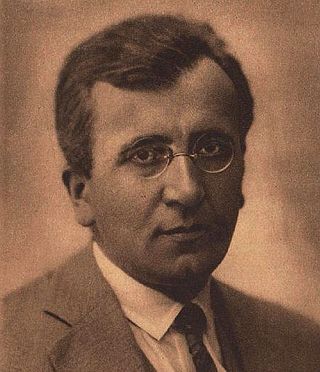 9
Jan Wiktor – polski pisarz, publicysta, dziennikarz, działacz ludowy, poseł na Sejm PRL I kadencji.
9
Jan Wiktor – polski pisarz, publicysta, dziennikarz, działacz ludowy, poseł na Sejm PRL I kadencji.
Bronisław Markiewicz
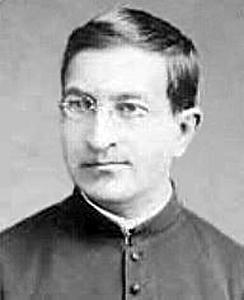 9
Bronisław Markiewicz, SDB was a Polish Roman Catholic priest and a professed member of the Salesians of Don Bosco. Markiewicz established the Congregation of Saint Michael the Archangel that devoted...
9
Bronisław Markiewicz, SDB was a Polish Roman Catholic priest and a professed member of the Salesians of Don Bosco. Markiewicz established the Congregation of Saint Michael the Archangel that devoted...
Saint Rosalia
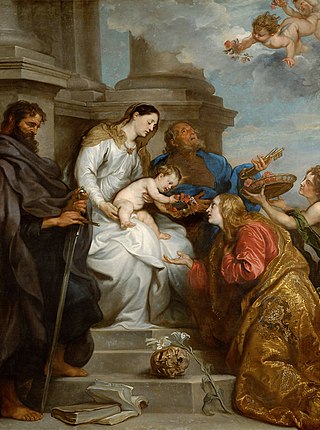 9
Rosalia, nicknamed la Santuzza, is the patron saint of Palermo in Italy, Camargo in Chihuahua, and three towns in Venezuela: El Hatillo, Zuata, and El Playón. She is especially important...
9
Rosalia, nicknamed la Santuzza, is the patron saint of Palermo in Italy, Camargo in Chihuahua, and three towns in Venezuela: El Hatillo, Zuata, and El Playón. She is especially important...
Janusz Meissner
 8
Janusz Meissner was a Polish writer and journalist, and a pilot of Polish Air Force.
8
Janusz Meissner was a Polish writer and journalist, and a pilot of Polish Air Force.
Mother Teresa
 8
Mary Teresa Bojaxhiu MC, better known as Mother Teresa, was an Albanian-Indian Catholic nun and the founder of the Missionaries of Charity. Born in Skopje, then part of the Ottoman Empire, at the age...
8
Mary Teresa Bojaxhiu MC, better known as Mother Teresa, was an Albanian-Indian Catholic nun and the founder of the Missionaries of Charity. Born in Skopje, then part of the Ottoman Empire, at the age...
Tadeusz Szeligowski
 8
Tadeusz Szeligowski was a Polish composer, educator, lawyer and music organizer. His works include the operas The Rise of the Scholars, Krakatuk and Theodor Gentlemen, the ballets The Peacock and the...
8
Tadeusz Szeligowski was a Polish composer, educator, lawyer and music organizer. His works include the operas The Rise of the Scholars, Krakatuk and Theodor Gentlemen, the ballets The Peacock and the...
Szymon Szymonowic
 8
Szymon Szymonowic was a Polish Renaissance poet. He was known as "the Polish Pindar."
8
Szymon Szymonowic was a Polish Renaissance poet. He was known as "the Polish Pindar."
Ryszard Wincenty Berwiński
 8
Ryszard Wincenty Berwiński was a noted Polish poet, translator, folklorist, and nationalist.
8
Ryszard Wincenty Berwiński was a noted Polish poet, translator, folklorist, and nationalist.
Mieczysław Orłowicz
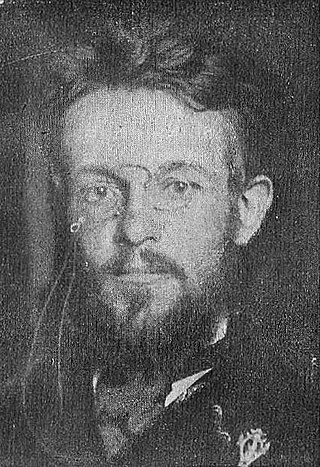 8
Mieczysław Emil Orłowicz – polski doktor prawa, urzędnik ministerialny II Rzeczypospolitej i Polski Ludowej, z zamiłowania krajoznawca i popularyzator turystyki. Autor licznych przewodników...
8
Mieczysław Emil Orłowicz – polski doktor prawa, urzędnik ministerialny II Rzeczypospolitej i Polski Ludowej, z zamiłowania krajoznawca i popularyzator turystyki. Autor licznych przewodników...
Mieczysław Romanowski
 8
Mieczysław Romanowski (1833–1863) was a Polish Romantic poet.
8
Mieczysław Romanowski (1833–1863) was a Polish Romantic poet.
Wacław Potocki
 8
Wacław Potocki was a Polish nobleman (szlachcic), moralist, poet, and writer. He was the podczaszy of Kraków from 1678 to 1685. He is remembered as one of the most important Polish baroque artists....
8
Wacław Potocki was a Polish nobleman (szlachcic), moralist, poet, and writer. He was the podczaszy of Kraków from 1678 to 1685. He is remembered as one of the most important Polish baroque artists....
Marian Smoluchowski
 8
Marian Smoluchowski was a Polish physicist who worked in the territories of the Austro-Hungarian Empire. He was a pioneer of statistical physics and made significant contributions to the theory of...
8
Marian Smoluchowski was a Polish physicist who worked in the territories of the Austro-Hungarian Empire. He was a pioneer of statistical physics and made significant contributions to the theory of...
Narcyza Żmichowska
 8
Narcyza Żmichowska pronounced [narˈt͡sɨza ʐmʲiˈxɔfska], also known under her popular pen name Gabryella, was a Polish novelist and poet. She is considered a precursor of feminism in Poland.
8
Narcyza Żmichowska pronounced [narˈt͡sɨza ʐmʲiˈxɔfska], also known under her popular pen name Gabryella, was a Polish novelist and poet. She is considered a precursor of feminism in Poland.
Marcin Borelowski
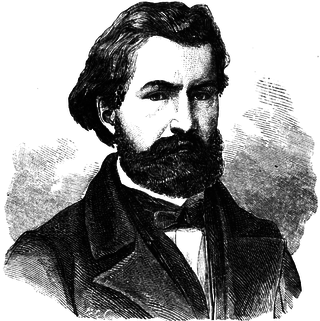 8
Marcin Maciej Borelowski, ps. „Lelewel” – polski rzemieślnik, działacz społeczny i patriotyczny, pułkownik w powstaniu styczniowym, komisarz wojenny województwa podlaskiego w maju i czerwcu 1863 roku.
8
Marcin Maciej Borelowski, ps. „Lelewel” – polski rzemieślnik, działacz społeczny i patriotyczny, pułkownik w powstaniu styczniowym, komisarz wojenny województwa podlaskiego w maju i czerwcu 1863 roku.
Anton Chekhov
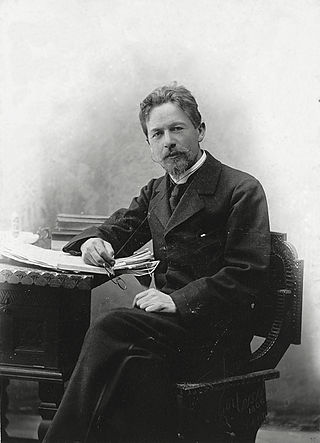 8
Anton Pavlovich Chekhov was a Russian playwright and physician. His career as a playwright produced four classics, and his best short stories are held in high esteem by writers and critics. Along...
8
Anton Pavlovich Chekhov was a Russian playwright and physician. His career as a playwright produced four classics, and his best short stories are held in high esteem by writers and critics. Along...
Walenty Roździeński
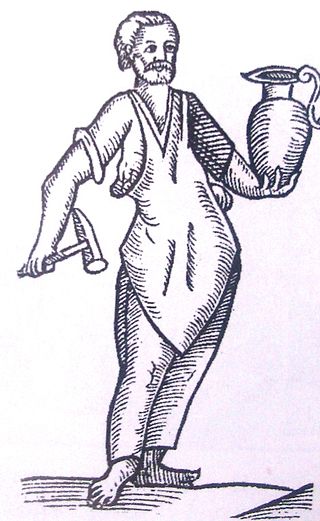 8
Walenty Roździeński − polski hutnik, właściciel kuźni, zarządca hut, poeta i literat epoki baroku. Autor poematu Officina ferraria.
8
Walenty Roździeński − polski hutnik, właściciel kuźni, zarządca hut, poeta i literat epoki baroku. Autor poematu Officina ferraria.
Stanisław Grochowiak
 8
Stanisław Antoni Grochowiak, pen-name "Kain" was a Polish poet and dramatist. His is often classified as a representative of turpism, because of his interest in the physical, ugly and brutal, but he...
8
Stanisław Antoni Grochowiak, pen-name "Kain" was a Polish poet and dramatist. His is often classified as a representative of turpism, because of his interest in the physical, ugly and brutal, but he...
Zyndram of Maszkowice
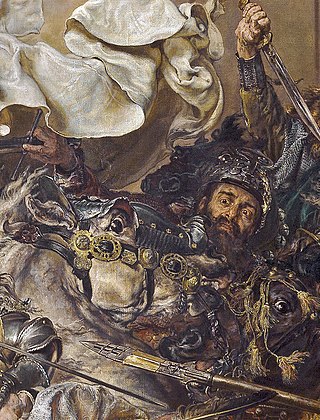 8
Zyndram z Maszkowic was a Polish 14th and 15th century knight. His coat of arms was Słońce.
8
Zyndram z Maszkowic was a Polish 14th and 15th century knight. His coat of arms was Słońce.
Józef Wajda
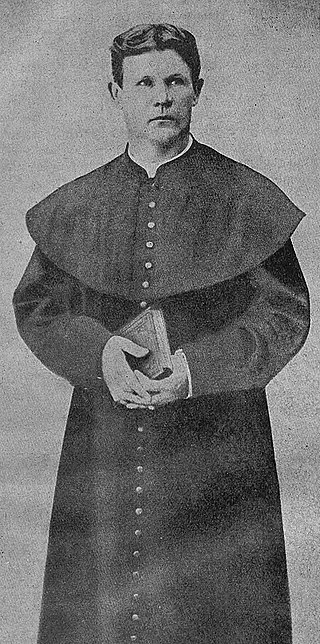 8
Józef Wajda, polski duchowny rzymskokatolicki, działacz społeczny i narodowy na Górnym Śląsku, poseł do parlamentu Rzeszy (1908–1912) oraz do pruskiego Landtagu (1922–1923).
8
Józef Wajda, polski duchowny rzymskokatolicki, działacz społeczny i narodowy na Górnym Śląsku, poseł do parlamentu Rzeszy (1908–1912) oraz do pruskiego Landtagu (1922–1923).
Casimir II the Just
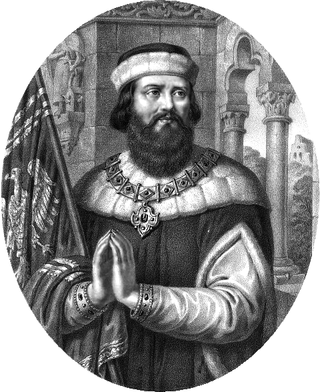 8
Casimir II the Just was a Lesser Polish Duke of Wiślica from 1166 to 1173, and of Sandomierz after 1173. He became ruler over the Polish Seniorate Province at Kraków and thereby High Duke of Poland...
8
Casimir II the Just was a Lesser Polish Duke of Wiślica from 1166 to 1173, and of Sandomierz after 1173. He became ruler over the Polish Seniorate Province at Kraków and thereby High Duke of Poland...
Stefan Szolc-Rogoziński
 8
Stefan Szolc-Rogoziński was a Polish explorer of Africa. He was planning to create a Polish colony in Cameroon.
8
Stefan Szolc-Rogoziński was a Polish explorer of Africa. He was planning to create a Polish colony in Cameroon.
Francesco Nullo
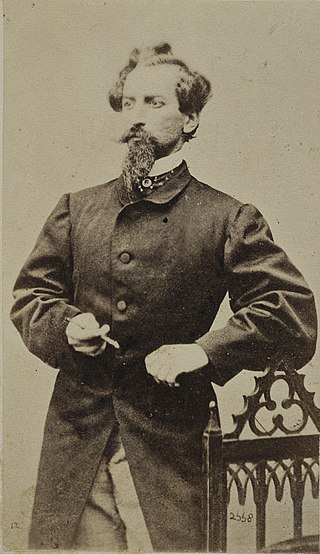 8
Francesco Nullo was an Italian patriot, military officer and merchant, and a close friend and confidant of Giuseppe Garibaldi. He supported independence movements in Italy and Poland. He was a...
8
Francesco Nullo was an Italian patriot, military officer and merchant, and a close friend and confidant of Giuseppe Garibaldi. He supported independence movements in Italy and Poland. He was a...
Pope Urban I
 8
Pope Urban I, also known as Saint Urban (175?–230), was the bishop of Rome from 222 to 23 May 230. He was born in Rome and succeeded Callixtus I, who had been martyred. It was believed for centuries...
8
Pope Urban I, also known as Saint Urban (175?–230), was the bishop of Rome from 222 to 23 May 230. He was born in Rome and succeeded Callixtus I, who had been martyred. It was believed for centuries...
Michał Tokarzewski-Karaszewicz
 8
General Michał Tadeusz Tokarzewski-Karaszewicz, Coat of arms of Trąby pseudonym Doktor, Stolarski, Torwid was a Polish general, founder of the resistance movement "Polish Victory Service".
8
General Michał Tadeusz Tokarzewski-Karaszewicz, Coat of arms of Trąby pseudonym Doktor, Stolarski, Torwid was a Polish general, founder of the resistance movement "Polish Victory Service".
Władysław Żeleński (composer)
 8
Władysław Marcjan Mikołaj Żeleński was a Polish composer, pianist and organist.
8
Władysław Marcjan Mikołaj Żeleński was a Polish composer, pianist and organist.
Kazimierz Pużak
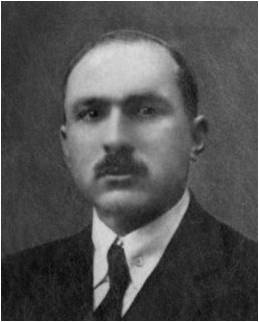 8
Kazimierz Pużak (1883–1950) was a Polish socialist politician of the interwar period. Active in the Polish Socialist Party, he was one of the leaders of the Polish Secret State and Polish resistance,...
8
Kazimierz Pużak (1883–1950) was a Polish socialist politician of the interwar period. Active in the Polish Socialist Party, he was one of the leaders of the Polish Secret State and Polish resistance,...
Gustaw Daniłowski
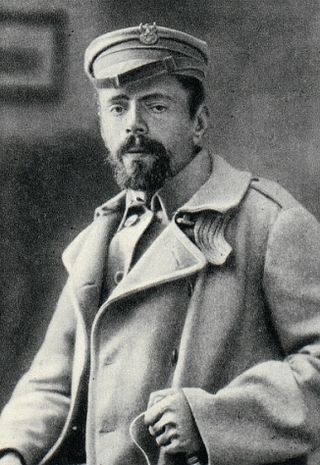 8
Gustaw Daniłowski, właśc. August Daniłowski, ps. Władysław Orwid – polski pisarz, publicysta, działacz socjalistyczny i niepodległościowy.
8
Gustaw Daniłowski, właśc. August Daniłowski, ps. Władysław Orwid – polski pisarz, publicysta, działacz socjalistyczny i niepodległościowy.
Stanisław Koniecpolski
 8
Stanisław Koniecpolski was a Polish military commander, regarded as one of the most talented and capable in the history of the Polish–Lithuanian Commonwealth. He was also a magnate, a royal official...
8
Stanisław Koniecpolski was a Polish military commander, regarded as one of the most talented and capable in the history of the Polish–Lithuanian Commonwealth. He was also a magnate, a royal official...
Padre Pio
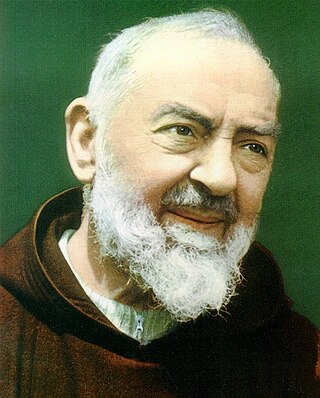 8
Pio of Pietrelcina, widely known as Padre Pio, was an Italian Capuchin friar, priest, stigmatist, and mystic. He is venerated as a saint in the Catholic Church, celebrated on 23 September.
8
Pio of Pietrelcina, widely known as Padre Pio, was an Italian Capuchin friar, priest, stigmatist, and mystic. He is venerated as a saint in the Catholic Church, celebrated on 23 September.
Lech Bądkowski
 8
Lech Bądkowski was a Polish writer, journalist, publicist and Kashubian-Pomeranian activist, a promoter of regional history and culture, co-founder and leader of the Kashubian-Pomeranian Association,...
8
Lech Bądkowski was a Polish writer, journalist, publicist and Kashubian-Pomeranian activist, a promoter of regional history and culture, co-founder and leader of the Kashubian-Pomeranian Association,...
Kazimierz Kruczkowski
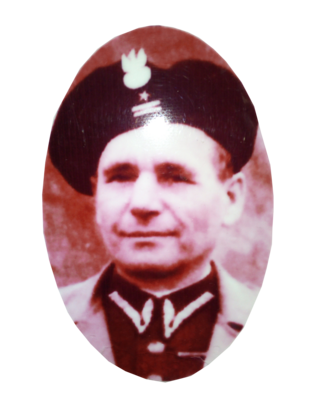 8
Kazimierz Kruczkowski – major piechoty Wojska Polskiego, w kampanii wrześniowej dowódca II batalionu 94 pułku piechoty rezerwowego oraz dowódca III batalionu 164 pułku piechoty rezerwowego.
8
Kazimierz Kruczkowski – major piechoty Wojska Polskiego, w kampanii wrześniowej dowódca II batalionu 94 pułku piechoty rezerwowego oraz dowódca III batalionu 164 pułku piechoty rezerwowego.
Jan Karnowski
 8
Jan Karnowski was a Kashubian judge, poet and ideologist of the Young Kashubians movement. He contributed to the development of this movement.
8
Jan Karnowski was a Kashubian judge, poet and ideologist of the Young Kashubians movement. He contributed to the development of this movement.
Johannes Kepler
 8
Johannes Kepler was a German astronomer, mathematician, astrologer, natural philosopher and writer on music. He is a key figure in the 17th-century Scientific Revolution, best known for his laws of...
8
Johannes Kepler was a German astronomer, mathematician, astrologer, natural philosopher and writer on music. He is a key figure in the 17th-century Scientific Revolution, best known for his laws of...
Augustyn Necel
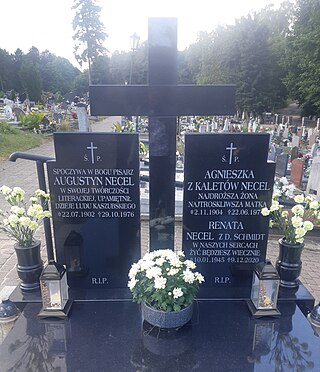 8
Augustyn Necel właśc. Netzel – pisarz, najwybitniejszy i najpłodniejszy kaszubski autor powieści historycznych, z zawodu rybak, laureat Medalu Stolema, „kaszubski Sienkiewicz”, zwany też „kronikarzem...
8
Augustyn Necel właśc. Netzel – pisarz, najwybitniejszy i najpłodniejszy kaszubski autor powieści historycznych, z zawodu rybak, laureat Medalu Stolema, „kaszubski Sienkiewicz”, zwany też „kronikarzem...
Tadeusz Różewicz
Tadeusz Kantor
 8
Tadeusz Kantor was a Polish painter, assemblage and Happenings artist, set designer and theatre director. Kantor is renowned for his revolutionary theatrical performances in Poland and abroad....
8
Tadeusz Kantor was a Polish painter, assemblage and Happenings artist, set designer and theatre director. Kantor is renowned for his revolutionary theatrical performances in Poland and abroad....
Irena Kosmowska
 8
Irena Kosmowska was a Polish educator and politician. She was one of the first group of women elected to the Legislative Sejm in 1919, serving in parliament until 1930.
8
Irena Kosmowska was a Polish educator and politician. She was one of the first group of women elected to the Legislative Sejm in 1919, serving in parliament until 1930.
Edward Bernard Raczyński
 8
Count Edward Bernard Raczyński was a Polish diplomat, writer, politician, President of Poland-in-exile.
8
Count Edward Bernard Raczyński was a Polish diplomat, writer, politician, President of Poland-in-exile.
Roch Kowalski
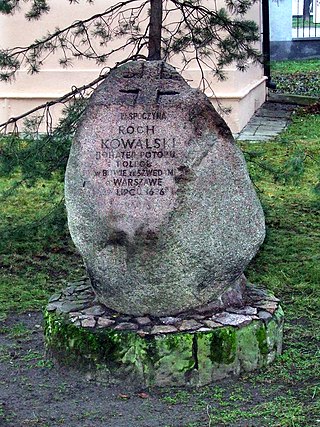 8
Roch Kowalski herbu Korab – postać literacka, bohater powieści Potop Henryka Sienkiewicza, oficer dragonów pana Mieleszki.
8
Roch Kowalski herbu Korab – postać literacka, bohater powieści Potop Henryka Sienkiewicza, oficer dragonów pana Mieleszki.
Ewa Szelburg-Zarembina
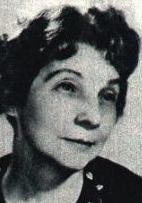 8
Ewa Szelburg-Zarembina was a Polish novelist, poet and screenplay writer.
8
Ewa Szelburg-Zarembina was a Polish novelist, poet and screenplay writer.
Florian Marciniak
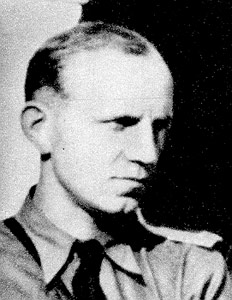 8
Florian Marciniak was a Polish scoutmaster (harcmistrz), and the first Naczelnik of the paramilitary scouting resistance organization, the Szare Szeregi, during the Second World War.
8
Florian Marciniak was a Polish scoutmaster (harcmistrz), and the first Naczelnik of the paramilitary scouting resistance organization, the Szare Szeregi, during the Second World War.
Klementyna Hoffmanowa
 8
Klementyna Hoffmanowa, born Klementyna Tańska was a Polish novelist, playwright, editor, translator, teacher and activist. She was the first woman in Poland to support herself from writing and...
8
Klementyna Hoffmanowa, born Klementyna Tańska was a Polish novelist, playwright, editor, translator, teacher and activist. She was the first woman in Poland to support herself from writing and...
Kajetan Koźmian
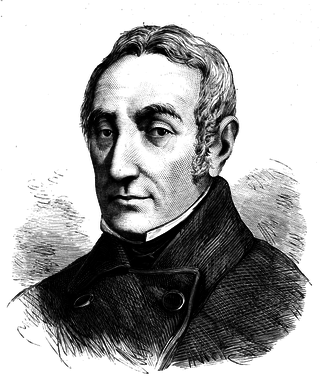 8
Kajetan Koźmian herbu Nałęcz, krypt.: X. – polski prawnik i poeta, reprezentant klasycyzmu, krytyk literacki i teatralny, mason, publicysta, pamiętnikarz, tłumacz; referendarz Rady Stanu Księstwa...
8
Kajetan Koźmian herbu Nałęcz, krypt.: X. – polski prawnik i poeta, reprezentant klasycyzmu, krytyk literacki i teatralny, mason, publicysta, pamiętnikarz, tłumacz; referendarz Rady Stanu Księstwa...
Edmund Biernacki
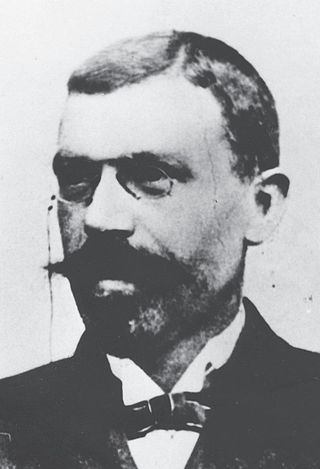 8
Edmund Faustyn Biernacki was a Polish physician.
8
Edmund Faustyn Biernacki was a Polish physician.
Witold Doroszewski
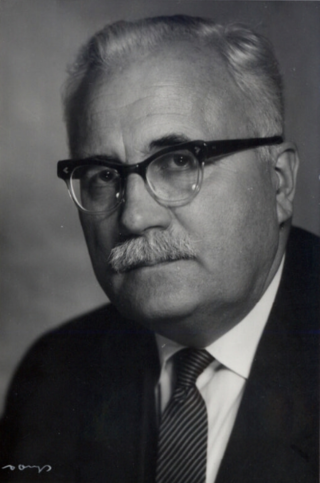 8
Witold Doroszewski (1899–1976) was a Polish lexicographer and linguist.
8
Witold Doroszewski (1899–1976) was a Polish lexicographer and linguist.
Jan Bażyński
 8
Hans von Baysen or Jan Bażyński was a Prussian knight and statesman, leader of the Prussian Confederation and the first Polish governor of Royal Prussia.
8
Hans von Baysen or Jan Bażyński was a Prussian knight and statesman, leader of the Prussian Confederation and the first Polish governor of Royal Prussia.
Sławomir Mrożek
 8
Sławomir Mrożek was a Polish dramatist, writer and cartoonist.
8
Sławomir Mrożek was a Polish dramatist, writer and cartoonist.
Józef Chociszewski
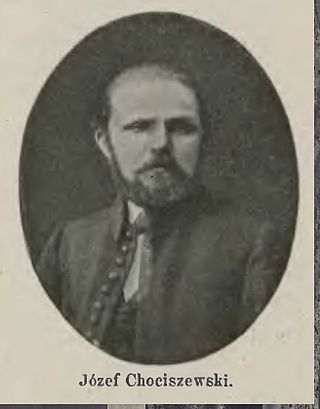 7
Józef Chociszewski – polski redaktor, wydawca, pisarz ludowy, działacz narodowy.
7
Józef Chociszewski – polski redaktor, wydawca, pisarz ludowy, działacz narodowy.
Robert Schuman
 7
Jean-Baptiste Nicolas Robert Schuman was a Luxembourg-born French statesman. Schuman was a Christian democratic political thinker and activist. Twice Prime Minister of France, a reformist Minister of...
7
Jean-Baptiste Nicolas Robert Schuman was a Luxembourg-born French statesman. Schuman was a Christian democratic political thinker and activist. Twice Prime Minister of France, a reformist Minister of...
Hubert Wagner
 7
Hubert Aleksander Wagner was a Polish volleyball player and coach. He was a member of the Poland national team from 1963 to 1971, a participant in the Mexico 1968 Olympics, and a bronze medallist at...
7
Hubert Aleksander Wagner was a Polish volleyball player and coach. He was a member of the Poland national team from 1963 to 1971, a participant in the Mexico 1968 Olympics, and a bronze medallist at...
Emilia Gierczak
 7
Emilia Gierczak was a Polish soldier of the Polish Armed Forces in the East during the Second World War. After being killed in combat, several streets and organisations were subsequently named after...
7
Emilia Gierczak was a Polish soldier of the Polish Armed Forces in the East during the Second World War. After being killed in combat, several streets and organisations were subsequently named after...
Our Lady of Fátima
 7
Our Lady of Fátima is a Catholic title of Mary, mother of Jesus, based on the Marian apparitions reported in 1917 by three shepherd children at the Cova da Iria in Fátima, Portugal. The three...
7
Our Lady of Fátima is a Catholic title of Mary, mother of Jesus, based on the Marian apparitions reported in 1917 by three shepherd children at the Cova da Iria in Fátima, Portugal. The three...
Andrzej Małkowski
 7
Andrzej Juliusz Małkowski was a Polish Scoutmaster (harcmistrz) activist of youth and independence organisations. He and his wife, Olga, are widely regarded as the founders of Scouting in Poland. To...
7
Andrzej Juliusz Małkowski was a Polish Scoutmaster (harcmistrz) activist of youth and independence organisations. He and his wife, Olga, are widely regarded as the founders of Scouting in Poland. To...
Kamila Skolimowska
 7
Kamila Skolimowska was a Polish hammer thrower. She is best known for her gold medal in the Sydney 2000 Summer Olympics, which made her the youngest Olympic hammer champion, as well as for her two...
7
Kamila Skolimowska was a Polish hammer thrower. She is best known for her gold medal in the Sydney 2000 Summer Olympics, which made her the youngest Olympic hammer champion, as well as for her two...
Władysław Bandurski
 7
Władysław Bandurski – polski duchowny rzymskokatolicki, doktor, biskup pomocniczy archidiecezji lwowskiej i archidiecezji wileńskiej, honorowy kapelan Legionów Polskich, naczelny kapelan Wojska Litwy...
7
Władysław Bandurski – polski duchowny rzymskokatolicki, doktor, biskup pomocniczy archidiecezji lwowskiej i archidiecezji wileńskiej, honorowy kapelan Legionów Polskich, naczelny kapelan Wojska Litwy...
Józef Mackiewicz
 7
Józef Mackiewicz was a Polish writer, novelist and political commentator; best known for his documentary novels Nie trzeba głośno mówić, and Droga donikąd. He staunchly opposed communism, referring...
7
Józef Mackiewicz was a Polish writer, novelist and political commentator; best known for his documentary novels Nie trzeba głośno mówić, and Droga donikąd. He staunchly opposed communism, referring...
Sebastian Klonowic
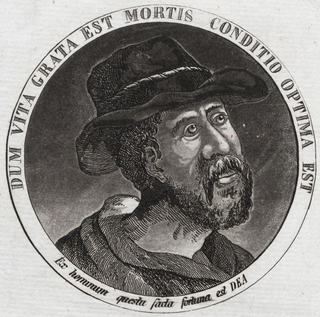 7
Sebastian Fabian Klonowic was a Polish poet, composer and mayor of Lublin.
7
Sebastian Fabian Klonowic was a Polish poet, composer and mayor of Lublin.
Adam Prazmowski
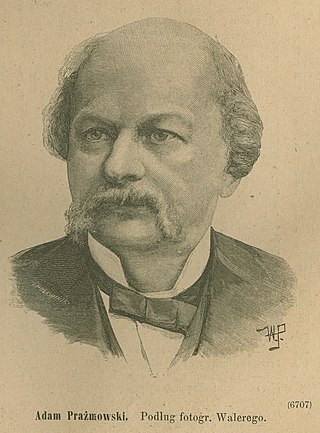 7
Adam Józef Ignacy Prażmowski (1821–1885) was a Polish astronomer and astrophysicist of the 19th century. He worked in 1839 to 1850 at the Warsaw Observatory. Among his many discoveries, he discovered...
7
Adam Józef Ignacy Prażmowski (1821–1885) was a Polish astronomer and astrophysicist of the 19th century. He worked in 1839 to 1850 at the Warsaw Observatory. Among his many discoveries, he discovered...
Szymon Konarski
 7
Szymon Konarski (1808–1839) was a 19th-century Polish-Lithuanian radical democratic politician and revolutionary, one of the leaders of the November Uprising of 1831. As a politician, he supported...
7
Szymon Konarski (1808–1839) was a 19th-century Polish-Lithuanian radical democratic politician and revolutionary, one of the leaders of the November Uprising of 1831. As a politician, he supported...
Adam Chętnik
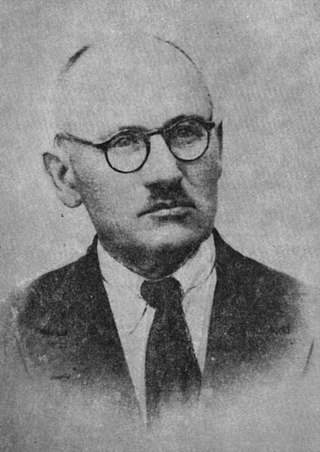 7
Adam Chętnik was a Polish ethnographer who studied the Kurpie. He is the author of several books on the Kurpie residing in Puszcza Zielona. In 1927 he founded Skansen Kurpiowski in Nowogród, an...
7
Adam Chętnik was a Polish ethnographer who studied the Kurpie. He is the author of several books on the Kurpie residing in Puszcza Zielona. In 1927 he founded Skansen Kurpiowski in Nowogród, an...
Bolesław Krupiński
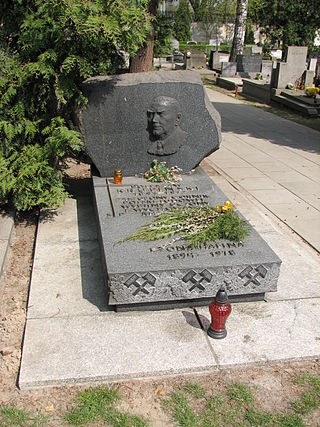 7
Bolesław Krupiński – specjalista w dziedzinie górnictwa, profesor Akademii Górniczo-Hutniczej i Politechniki Śląskiej. Członek korespondent Polskiej Akademii Nauk od 1961 r., członek Polskiego...
7
Bolesław Krupiński – specjalista w dziedzinie górnictwa, profesor Akademii Górniczo-Hutniczej i Politechniki Śląskiej. Członek korespondent Polskiej Akademii Nauk od 1961 r., członek Polskiego...
Teodor Axentowicz
 7
Teodor Axentowicz was a Polish-Armenian painter and university professor. A renowned artist of his times, he was also the rector of the Academy of Fine Arts in Kraków. As an artist, Axentowicz was...
7
Teodor Axentowicz was a Polish-Armenian painter and university professor. A renowned artist of his times, he was also the rector of the Academy of Fine Arts in Kraków. As an artist, Axentowicz was...
Stanisław Pigoń
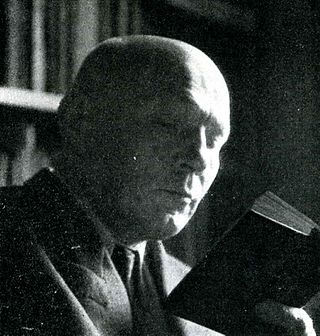 7
Stanisław Pigoń – historyk literatury polskiej, edytor, wychowawca i pedagog, w latach 1926–1928 rektor Uniwersytetu Stefana Batorego w Wilnie.
7
Stanisław Pigoń – historyk literatury polskiej, edytor, wychowawca i pedagog, w latach 1926–1928 rektor Uniwersytetu Stefana Batorego w Wilnie.
Paweł Maria Sapieha
 7
Paweł Maria Sapieha – oficer Wojska Polskiego II RP, podpułkownik Armii Stanów Zjednoczonych, pracownik kontrwywiadu.
7
Paweł Maria Sapieha – oficer Wojska Polskiego II RP, podpułkownik Armii Stanów Zjednoczonych, pracownik kontrwywiadu.
Emanuel Konstanty Imiela
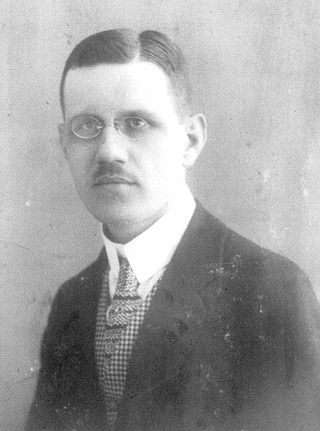 7
Emanuel Konstanty Imiela, ps. „Karol Dym” – górnośląski pisarz, urzędnik państwowy, działacz oświatowy i plebiscytowy.
7
Emanuel Konstanty Imiela, ps. „Karol Dym” – górnośląski pisarz, urzędnik państwowy, działacz oświatowy i plebiscytowy.
Stefan Żółkiewski
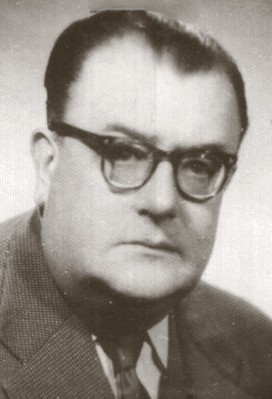 7
Stefan Jakub Żółkiewski was a Polish theoretist, historian of literature and literary critic. He was born and died in Warsaw. He was a co-founder of the Polish Workers' Party, editor-in-chief of...
7
Stefan Jakub Żółkiewski was a Polish theoretist, historian of literature and literary critic. He was born and died in Warsaw. He was a co-founder of the Polish Workers' Party, editor-in-chief of...
Sabała
 7
Sabała or Sablik was a Goral amateur musician, storyteller and folk singer active in or around the Tatra Mountains. A friend to many renowned Polish artists of the late 19th century, he is featured...
7
Sabała or Sablik was a Goral amateur musician, storyteller and folk singer active in or around the Tatra Mountains. A friend to many renowned Polish artists of the late 19th century, he is featured...
Mordechai Anielewicz
 7
Mordechai Anielewicz was the leader of the Jewish Combat Organization during the Warsaw Ghetto Uprising; the largest Jewish resistance movement during the Second World War. Anielewicz inspired...
7
Mordechai Anielewicz was the leader of the Jewish Combat Organization during the Warsaw Ghetto Uprising; the largest Jewish resistance movement during the Second World War. Anielewicz inspired...
Łukasz Ciepliński
 7
Łukasz Ciepliński [Polish pronunciation: [ˈwukaʂ t͡ɕɛˈpliɲskʲi]] was a Polish soldier who fought in the Polish anti-Nazi and anti-communist resistance movements. He used various aliases: Pług,...
7
Łukasz Ciepliński [Polish pronunciation: [ˈwukaʂ t͡ɕɛˈpliɲskʲi]] was a Polish soldier who fought in the Polish anti-Nazi and anti-communist resistance movements. He used various aliases: Pług,...
Franciszek Fenikowski
 7
Franciszek Jan Fenikowski – polski poeta, prozaik, reportażysta, autor popularnych powieści historycznych, legend i baśni regionalnych.
7
Franciszek Jan Fenikowski – polski poeta, prozaik, reportażysta, autor popularnych powieści historycznych, legend i baśni regionalnych.
Hedwig of Silesia
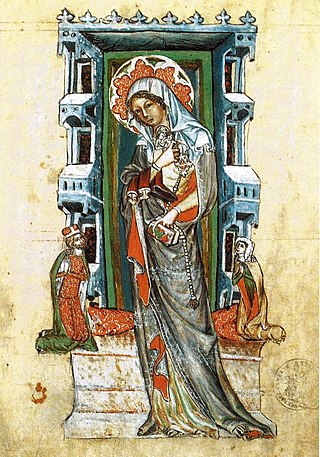 7
Hedwig of Silesia, also Hedwig of Andechs, a member of the Bavarian comital House of Andechs, was Duchess of Silesia from 1201 and of Greater Poland from 1231 as well as High Duchess consort of...
7
Hedwig of Silesia, also Hedwig of Andechs, a member of the Bavarian comital House of Andechs, was Duchess of Silesia from 1201 and of Greater Poland from 1231 as well as High Duchess consort of...
Ferdinand Magellan
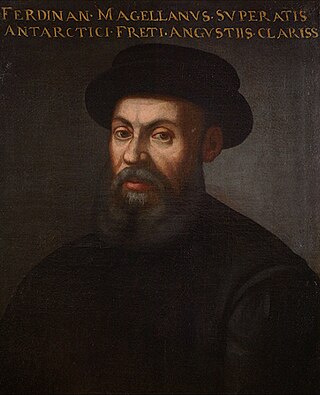 7
Ferdinand Magellan was a Portuguese explorer best known for having planned and led the 1519 Spanish expedition to the East Indies across the Pacific Ocean to open a maritime trade route, during which...
7
Ferdinand Magellan was a Portuguese explorer best known for having planned and led the 1519 Spanish expedition to the East Indies across the Pacific Ocean to open a maritime trade route, during which...
Franciszek Zabłocki
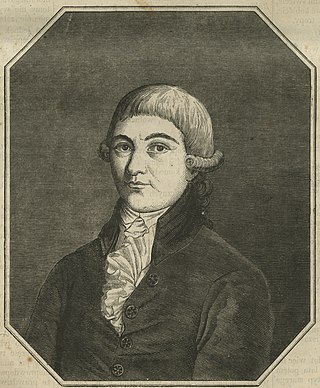 7
Franciszek Ksawery Mikołaj Zabłocki, is considered the most distinguished Polish comic dramatist and satirist of the Enlightenment period. He descends from an old aristocratic family of Poland with...
7
Franciszek Ksawery Mikołaj Zabłocki, is considered the most distinguished Polish comic dramatist and satirist of the Enlightenment period. He descends from an old aristocratic family of Poland with...
Józef Londzin
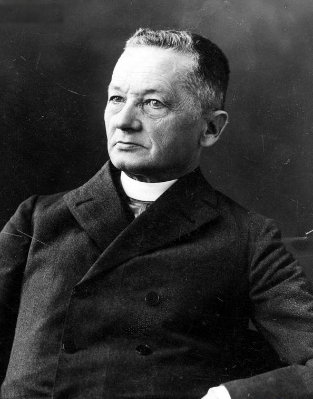 7
Józef Londzin − polski ksiądz katolicki, działacz społeczny i polityczny, historyk, burmistrz Cieszyna.
7
Józef Londzin − polski ksiądz katolicki, działacz społeczny i polityczny, historyk, burmistrz Cieszyna.
Gustaw Herling-Grudziński
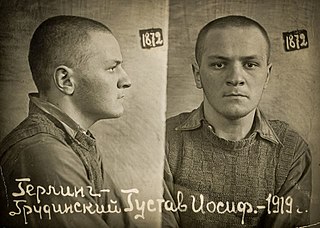 7
Gustaw Herling-Grudziński was a Polish writer, journalist, essayist, World War II underground fighter, and political dissident abroad during the communist system in Poland. He is best known for...
7
Gustaw Herling-Grudziński was a Polish writer, journalist, essayist, World War II underground fighter, and political dissident abroad during the communist system in Poland. He is best known for...
Elżbieta Drużbacka
Gustaw Gizewiusz
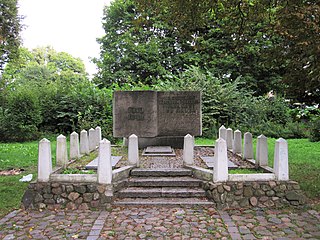 7
Gustaw Herman Marcin Gizewiusz, or Gustav Gisevius was a Polish political figure, folklorist, and translator. He was married to a Mazur Polish woman, who encouraged him to become a political figure....
7
Gustaw Herman Marcin Gizewiusz, or Gustav Gisevius was a Polish political figure, folklorist, and translator. He was married to a Mazur Polish woman, who encouraged him to become a political figure....
Good Shepherd
 6
The Good Shepherd is an image used in the pericope of John 10:1–21, in which Jesus Christ is depicted as the Good Shepherd who lays down his life for his sheep. Similar imagery is used in Psalm 23...
6
The Good Shepherd is an image used in the pericope of John 10:1–21, in which Jesus Christ is depicted as the Good Shepherd who lays down his life for his sheep. Similar imagery is used in Psalm 23...
Mieczysław Smorawiński
 6
Brigadier General Mieczysław Makary Smorawiński (1893–1940), was a Polish military commander and officer of the Polish Army. He was one of the Polish generals identified by forensic scientists of the...
6
Brigadier General Mieczysław Makary Smorawiński (1893–1940), was a Polish military commander and officer of the Polish Army. He was one of the Polish generals identified by forensic scientists of the...
Jeremi Wiśniowiecki
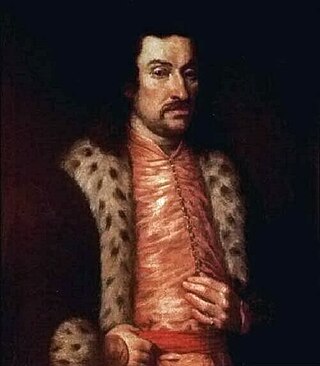 6
Prince Jeremi Michał Korybut Wiśniowiecki, nicknamed Hammer on the Cossacks, was a notable member of the aristocracy of the Polish–Lithuanian Commonwealth, Prince of Vyshnivets, Lubny and Khorol in...
6
Prince Jeremi Michał Korybut Wiśniowiecki, nicknamed Hammer on the Cossacks, was a notable member of the aristocracy of the Polish–Lithuanian Commonwealth, Prince of Vyshnivets, Lubny and Khorol in...
Marian Rejewski
 6
Marian Adam Rejewski was a Polish mathematician and cryptologist who in late 1932 reconstructed the sight-unseen German military Enigma cipher machine, aided by limited documents obtained by French...
6
Marian Adam Rejewski was a Polish mathematician and cryptologist who in late 1932 reconstructed the sight-unseen German military Enigma cipher machine, aided by limited documents obtained by French...
Jerzy Ziętek
 6
Jerzy Jan Antoni Ziętek was a Polish politician and general. A Silesian Insurrectionist in his youth, during the Second World War he joined the Polish armed forces in the USSR and later became an...
6
Jerzy Jan Antoni Ziętek was a Polish politician and general. A Silesian Insurrectionist in his youth, during the Second World War he joined the Polish armed forces in the USSR and later became an...
Bronisław Trentowski
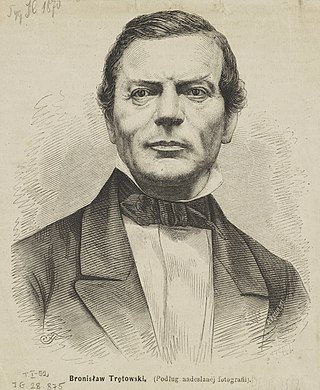 6
Bronisław Ferdynand Trentowski was a Polish "Messianist" philosopher, pedagogist, journalist and Freemason, and the chief representative of the Polish Messianist "national philosophy."
6
Bronisław Ferdynand Trentowski was a Polish "Messianist" philosopher, pedagogist, journalist and Freemason, and the chief representative of the Polish Messianist "national philosophy."
Julian Ejsmond
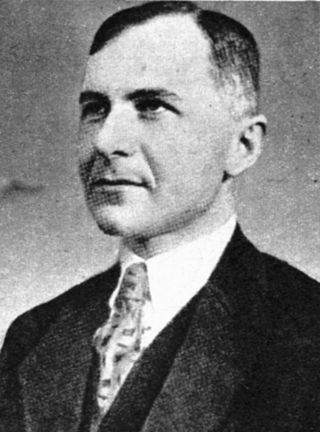 6
Julian Ejsmond – polski poeta, bajkopisarz, tłumacz literatury, porucznik piechoty Wojska Polskiego, odznaczony Krzyżem Walecznych.
6
Julian Ejsmond – polski poeta, bajkopisarz, tłumacz literatury, porucznik piechoty Wojska Polskiego, odznaczony Krzyżem Walecznych.
Sophie of Pomerania, Duchess of Pomerania
 6
Sophia of Pomerania-Stolp, was a Duchess of Pomerania by birth, and married to Eric II, Duke of Pomerania.
6
Sophia of Pomerania-Stolp, was a Duchess of Pomerania by birth, and married to Eric II, Duke of Pomerania.
Karol Koziołek
 6
Karol Koziołek – polski ksiądz katolicki i działacz narodowy na Śląsku Opolskim, prezes I Dzielnicy ZPwN, poseł do Sejmiku Opolskiego (1928–1932).
6
Karol Koziołek – polski ksiądz katolicki i działacz narodowy na Śląsku Opolskim, prezes I Dzielnicy ZPwN, poseł do Sejmiku Opolskiego (1928–1932).
Stanisław Kujot
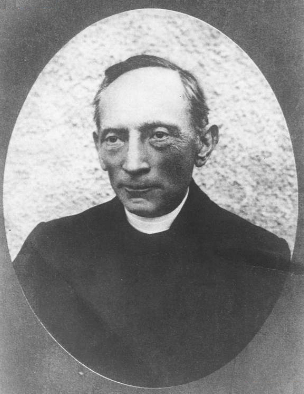 6
Stanisław Kujot – polski duchowny katolicki, historyk, członek Towarzystwa Historycznego we Lwowie.
6
Stanisław Kujot – polski duchowny katolicki, historyk, członek Towarzystwa Historycznego we Lwowie.
Maria Grzegorzewska
 6
Maria Grzegorzewska was a Polish educator who brought the special education movement to Poland. Born to a family from the Żmudź region, she was strongly influenced by her parents' beliefs in...
6
Maria Grzegorzewska was a Polish educator who brought the special education movement to Poland. Born to a family from the Żmudź region, she was strongly influenced by her parents' beliefs in...
Lech Kaczyński
 6
Lech Aleksander Kaczyński was a Polish politician who served as the city mayor of Warsaw from 2002 until 2005, and as President of Poland from 2005 until his death in 2010. Before his tenure as...
6
Lech Aleksander Kaczyński was a Polish politician who served as the city mayor of Warsaw from 2002 until 2005, and as President of Poland from 2005 until his death in 2010. Before his tenure as...
Wincenty Styczyński
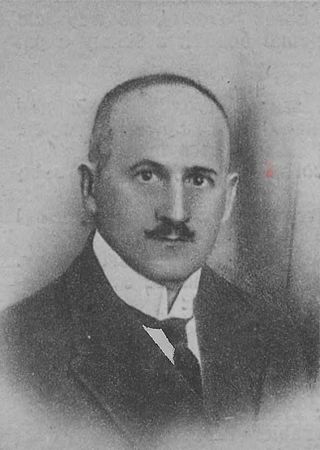 6
Wincenty Styczyński – polski działacz narodowy, lekarz, w latach 1919–1922 radny miejski, przewodniczący frakcji polskiej w Gliwicach.
6
Wincenty Styczyński – polski działacz narodowy, lekarz, w latach 1919–1922 radny miejski, przewodniczący frakcji polskiej w Gliwicach.
Ludwik Nabielak
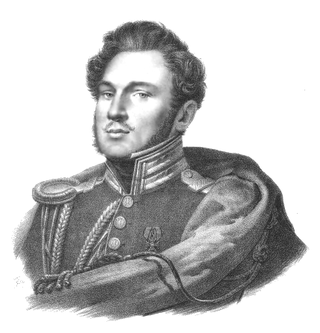 6
Ludwik Nabielak – działacz polityczny, poeta, krytyk literacki, historyk, inżynier górnictwa.
6
Ludwik Nabielak – działacz polityczny, poeta, krytyk literacki, historyk, inżynier górnictwa.
Karol Adamiecki
 6
Karol Adamiecki was a Polish engineer, management researcher, economist, and professor.
6
Karol Adamiecki was a Polish engineer, management researcher, economist, and professor.
Franciszek Hynek
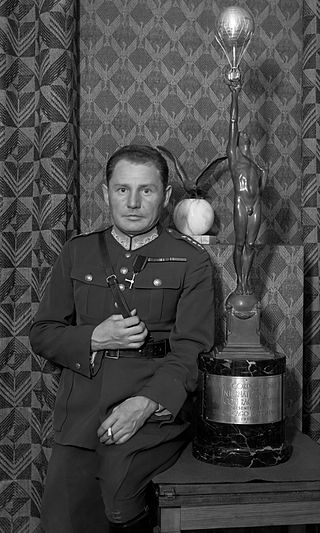 6
Franciszek Hynek – major pilot balonowy Wojska Polskiego, dwukrotny zdobywca Pucharu Gordona Bennetta.
6
Franciszek Hynek – major pilot balonowy Wojska Polskiego, dwukrotny zdobywca Pucharu Gordona Bennetta.
Karol Brzostowski
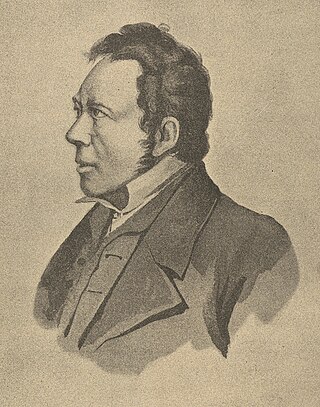 6
Hrabia Karol Brzostowski – reformator społeczny, właściciel ziemski, twórca Rzeczypospolitej Sztabińskiej, producent maszyn rolniczych oraz konstruktor mechanicznej dojarki pedałowej i...
6
Hrabia Karol Brzostowski – reformator społeczny, właściciel ziemski, twórca Rzeczypospolitej Sztabińskiej, producent maszyn rolniczych oraz konstruktor mechanicznej dojarki pedałowej i...
Rafał Krajewski
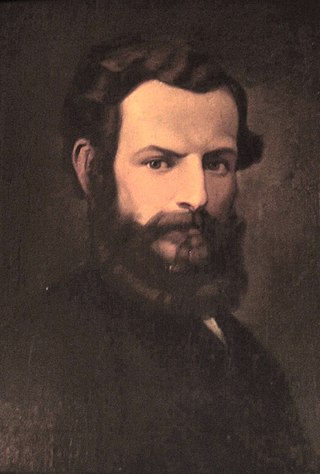 6
Rafał Krajewski herbu Jasieńczyk, ps. Wujaszek, August, Helena – dyrektor Wydziału Spraw Wewnętrznych w Rządzie Narodowym w czasie powstania styczniowego.
6
Rafał Krajewski herbu Jasieńczyk, ps. Wujaszek, August, Helena – dyrektor Wydziału Spraw Wewnętrznych w Rządzie Narodowym w czasie powstania styczniowego.
Daniel Chodowiecki
 6
Daniel Niklaus Chodowiecki was a German painter and printmaker of Huguenot and Polish ancestry, who is most famous as an etcher. He spent most of his life in Berlin, and became the director of the...
6
Daniel Niklaus Chodowiecki was a German painter and printmaker of Huguenot and Polish ancestry, who is most famous as an etcher. He spent most of his life in Berlin, and became the director of the...
Józef Maria Hoene-Wroński
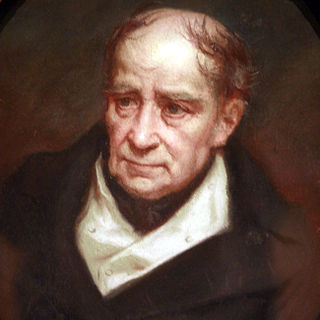 6
Józef Maria Hoene-Wroński was a Polish messianist philosopher, mathematician, physicist, inventor, lawyer, occultist and economist. He was born as Hoëné to a municipal architect in 1776 but changed...
6
Józef Maria Hoene-Wroński was a Polish messianist philosopher, mathematician, physicist, inventor, lawyer, occultist and economist. He was born as Hoëné to a municipal architect in 1776 but changed...
Władysław Bełza
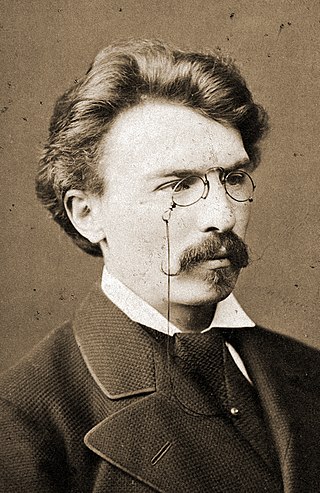 6
Wladyslaw Belza was a Polish poet. He was born in Warsaw.
6
Wladyslaw Belza was a Polish poet. He was born in Warsaw.
Johannes Dantiscus
 6
Johannes Dantiscus, was prince-bishop of Warmia and Bishop of Chełmno (Culm). In recognition of his diplomatic services for Polish kings, the bishop and poet is also known as the "Father of Polish...
6
Johannes Dantiscus, was prince-bishop of Warmia and Bishop of Chełmno (Culm). In recognition of his diplomatic services for Polish kings, the bishop and poet is also known as the "Father of Polish...
Benedict of Nursia
 6
Benedict of Nursia, often known as Saint Benedict, was an Italian Christian monk, writer, and theologian. He is venerated in the Catholic Church, the Eastern Orthodox Church, the Oriental Orthodox...
6
Benedict of Nursia, often known as Saint Benedict, was an Italian Christian monk, writer, and theologian. He is venerated in the Catholic Church, the Eastern Orthodox Church, the Oriental Orthodox...
John of Dukla
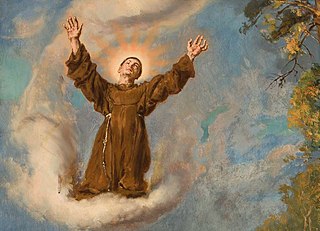 6
John of Dukla is a saint in the Roman Catholic Church. He is one of the patron saints of Poland and Lithuania.
6
John of Dukla is a saint in the Roman Catholic Church. He is one of the patron saints of Poland and Lithuania.
Paweł Pośpiech
 6
Paweł Pośpiech was a Polish priest, activist and journalist.
6
Paweł Pośpiech was a Polish priest, activist and journalist.
Antoni Amilkar Kosiński
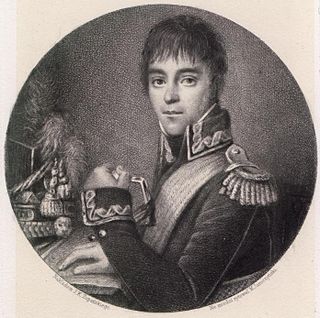 6
Antoni Amilkar Kosiński herbu Rawicz – generał polski, uczestnik insurekcji kościuszkowskiej i wojen napoleońskich, współtwórca Legionów Polskich we Włoszech.
6
Antoni Amilkar Kosiński herbu Rawicz – generał polski, uczestnik insurekcji kościuszkowskiej i wojen napoleońskich, współtwórca Legionów Polskich we Włoszech.
Jacek Kuroń
 6
Jacek Jan Kuroń was one of the democratic leaders of opposition in the People's Republic of Poland. He was widely known as the "godfather of the Polish opposition," not unlike Václav Havel in...
6
Jacek Jan Kuroń was one of the democratic leaders of opposition in the People's Republic of Poland. He was widely known as the "godfather of the Polish opposition," not unlike Václav Havel in...
Władysław Szpilman
 6
Władysław Szpilman was a Polish-Jewish pianist, classical composer and Holocaust survivor. Szpilman is widely known as the central figure in the 2002 Roman Polanski film The Pianist, which was based...
6
Władysław Szpilman was a Polish-Jewish pianist, classical composer and Holocaust survivor. Szpilman is widely known as the central figure in the 2002 Roman Polanski film The Pianist, which was based...
Eugeniusz Lokajski
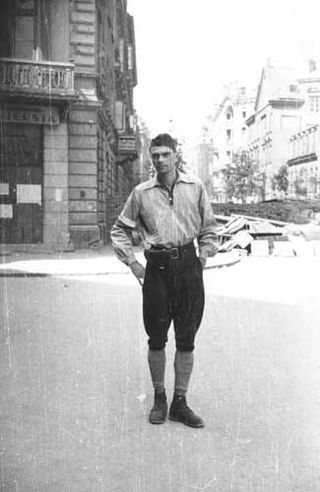 6
Eugeniusz Zenon Lokajski was a Polish athlete, gymnast and photographer. He is notable as the Champion of Poland in javelin throw and the creator of more than 1000 photos documenting the Warsaw...
6
Eugeniusz Zenon Lokajski was a Polish athlete, gymnast and photographer. He is notable as the Champion of Poland in javelin throw and the creator of more than 1000 photos documenting the Warsaw...
Witold Budryk
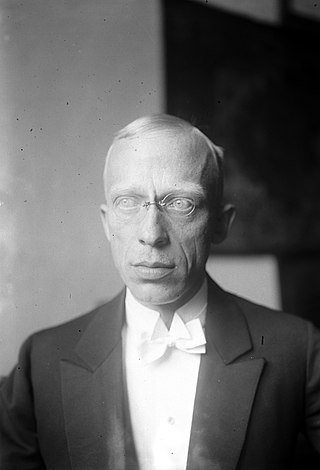 6
Prof. Witold Budryk – polski inżynier górnictwa, naukowiec, profesor zwyczajny Akademii Górniczej, późniejszej Akademii Górniczo-Hutniczej w Krakowie, dziekan Wydziału Górniczego Akademii...
6
Prof. Witold Budryk – polski inżynier górnictwa, naukowiec, profesor zwyczajny Akademii Górniczej, późniejszej Akademii Górniczo-Hutniczej w Krakowie, dziekan Wydziału Górniczego Akademii...
Jan Marcin Szancer
 6
Jan Marcin Szancer was a Polish illustrator, scenographer and professor at the Academy of Fine Arts in Warsaw.
6
Jan Marcin Szancer was a Polish illustrator, scenographer and professor at the Academy of Fine Arts in Warsaw.
Zofia Stryjeńska
 6
Zofia Stryjeńska was a Polish painter, graphic designer, illustrator, stage designer, a representative of art deco. Along with Olga Boznańska and Tamara de Lempicka, she was one of the best-known...
6
Zofia Stryjeńska was a Polish painter, graphic designer, illustrator, stage designer, a representative of art deco. Along with Olga Boznańska and Tamara de Lempicka, she was one of the best-known...
Władysław Biegański
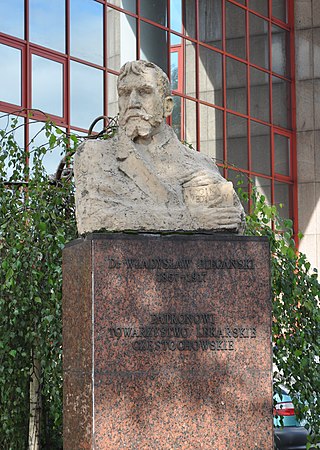 6
Władysław Biegański was a Polish medical doctor, philosopher and social activist. He dealt with almost all fields, especially infectious diseases, disease diagnostics and logic in medicine.
6
Władysław Biegański was a Polish medical doctor, philosopher and social activist. He dealt with almost all fields, especially infectious diseases, disease diagnostics and logic in medicine.
Franciszek Blachnicki
 6
Franciszek Blachnicki was a Polish Roman Catholic priest and the founder of the Light-Life movement – also known as the Oasis Movement – and the Secular Institute of the Immaculate Mother of the...
6
Franciszek Blachnicki was a Polish Roman Catholic priest and the founder of the Light-Life movement – also known as the Oasis Movement – and the Secular Institute of the Immaculate Mother of the...
Józef Cygan
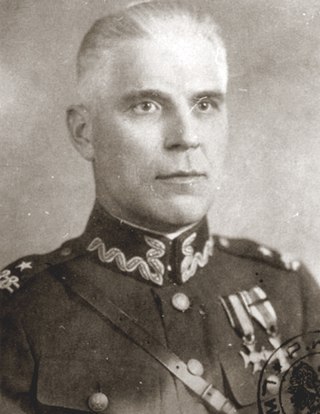 6
Józef Cygan – major piechoty Wojska Polskiego, kawaler Orderu Virtuti Militari doktor praw, sędzia, prokurator.
6
Józef Cygan – major piechoty Wojska Polskiego, kawaler Orderu Virtuti Militari doktor praw, sędzia, prokurator.
August Bebel
 6
Ferdinand August Bebel was a German socialist politician, writer, and orator. He is best remembered as one of the founders of the Social Democratic Workers' Party of Germany (SDAP) in 1869, which in...
6
Ferdinand August Bebel was a German socialist politician, writer, and orator. He is best remembered as one of the founders of the Social Democratic Workers' Party of Germany (SDAP) in 1869, which in...
Zenon Zając
 6
Zenon Zając - ślusarz, pracownik Kopalni Węgla Kamiennego Wujek, ofiara pacyfikacji kopalni w grudniu 1981 roku.
6
Zenon Zając - ślusarz, pracownik Kopalni Węgla Kamiennego Wujek, ofiara pacyfikacji kopalni w grudniu 1981 roku.
Ludwik Osiński
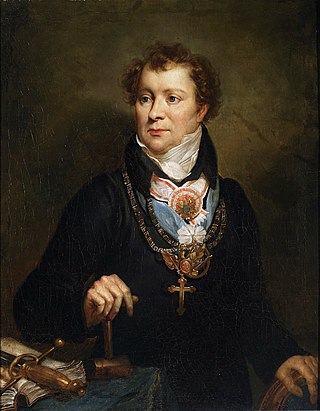 6
Ludwik Osiński was a Polish literary critic, historian, literary theorist, translator, poet, playwright and speaker, who also served as a minister in the government of Congress Poland.
6
Ludwik Osiński was a Polish literary critic, historian, literary theorist, translator, poet, playwright and speaker, who also served as a minister in the government of Congress Poland.
Raphael Kalinowski
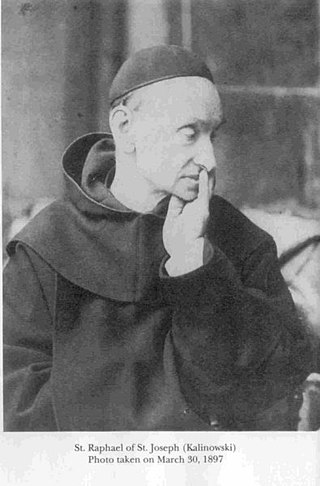 6
Raphael of St. Joseph Kalinowski, OCD, religious name: Raphael of Saint Joseph, was a Polish Discalced Carmelite friar. He was a teacher, engineer, prisoner of war, royal tutor, and priest, who...
6
Raphael of St. Joseph Kalinowski, OCD, religious name: Raphael of Saint Joseph, was a Polish Discalced Carmelite friar. He was a teacher, engineer, prisoner of war, royal tutor, and priest, who...
Albertus Magnus
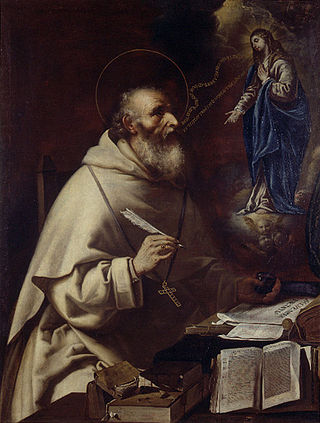 6
Albertus Magnus, also known as Saint Albert the Great, Albert of Swabia
or Albert of Cologne, was a German Dominican friar, philosopher, scientist, and bishop, considered one of the greatest medieval...
6
Albertus Magnus, also known as Saint Albert the Great, Albert of Swabia
or Albert of Cologne, was a German Dominican friar, philosopher, scientist, and bishop, considered one of the greatest medieval...
Jan Stapiński
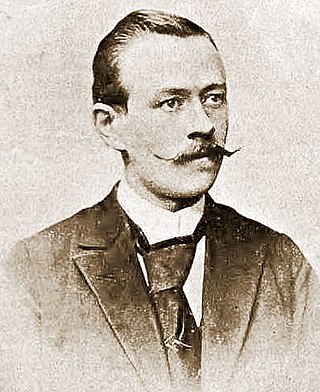 6
Jan Stapiński – polski polityk, jeden z twórców i przywódców polskiego ruchu ludowego, publicysta, poseł do parlamentu austriackiego i na Sejm II RP.
6
Jan Stapiński – polski polityk, jeden z twórców i przywódców polskiego ruchu ludowego, publicysta, poseł do parlamentu austriackiego i na Sejm II RP.
Leon Schiller
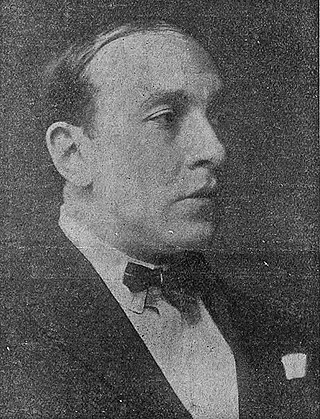 6
Leon Schiller or Leon Schiller de Schildenfeld was a Polish theatre and film director, as well as critic and theatre theoretician. He also wrote theatre and radio screenplays and composed music. He...
6
Leon Schiller or Leon Schiller de Schildenfeld was a Polish theatre and film director, as well as critic and theatre theoretician. He also wrote theatre and radio screenplays and composed music. He...
Józef Sebastian Pelczar
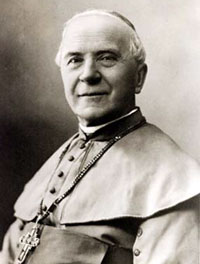 6
Józef Sebastian Pelczar was a Polish Roman Catholic bishop and was also the co-founder of the Sister Servants of the Most Sacred Heart of Jesus which he had established in 1894 with Ludwika Szczęsna....
6
Józef Sebastian Pelczar was a Polish Roman Catholic bishop and was also the co-founder of the Sister Servants of the Most Sacred Heart of Jesus which he had established in 1894 with Ludwika Szczęsna....
Charles Dickens
 6
Charles John Huffam Dickens was an English novelist and social critic who created some of the world's best-known fictional characters, and is regarded by many as the greatest novelist of the...
6
Charles John Huffam Dickens was an English novelist and social critic who created some of the world's best-known fictional characters, and is regarded by many as the greatest novelist of the...
John Bosco
 6
John Melchior Bosco, SDB, popularly known as Don Bosco, was an Italian Catholic priest, educator and writer of the 19th century. While working in Turin, where the population suffered many of the ill...
6
John Melchior Bosco, SDB, popularly known as Don Bosco, was an Italian Catholic priest, educator and writer of the 19th century. While working in Turin, where the population suffered many of the ill...
Franciszek Bohomolec
 6
Franciszek Bohomolec, S.J., Bogoria Coat of Arms, writing pseudonymously as: Daniel Bobinson, Dzisiejkiewicz, F. B., F. B. S. J., Galantecki, J. U. P. Z., Jeden Zakonnik S. J., Jeden Zakonnik...
6
Franciszek Bohomolec, S.J., Bogoria Coat of Arms, writing pseudonymously as: Daniel Bobinson, Dzisiejkiewicz, F. B., F. B. S. J., Galantecki, J. U. P. Z., Jeden Zakonnik S. J., Jeden Zakonnik...
Saint Cecilia
 6
Saint Cecilia, also spelled Cecelia, was a Roman virgin martyr and is venerated in Catholic, Orthodox, Anglican, and some Lutheran churches, such as the Church of Sweden. She became the patroness of...
6
Saint Cecilia, also spelled Cecelia, was a Roman virgin martyr and is venerated in Catholic, Orthodox, Anglican, and some Lutheran churches, such as the Church of Sweden. She became the patroness of...
Zbigniew Wodecki
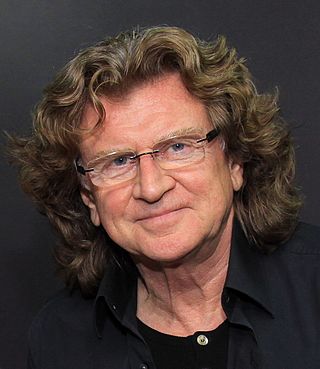 6
Zbigniew Stanisław Wodecki was a Polish singer, musician, composer, actor and TV presenter.
6
Zbigniew Stanisław Wodecki was a Polish singer, musician, composer, actor and TV presenter.
Jan Paweł Woronicz
 5
Jan Paweł Woronicz herbu Pawęża, pseud. i krypt.: I. W.; J. W.; Jeden z Synów Ojczyzny – polski duchowny rzymskokatolicki, kaznodzieja, jezuita do 1772, poeta, mówca, dziekan warszawskiej kapituły...
5
Jan Paweł Woronicz herbu Pawęża, pseud. i krypt.: I. W.; J. W.; Jeden z Synów Ojczyzny – polski duchowny rzymskokatolicki, kaznodzieja, jezuita do 1772, poeta, mówca, dziekan warszawskiej kapituły...
Wojciech Oczko
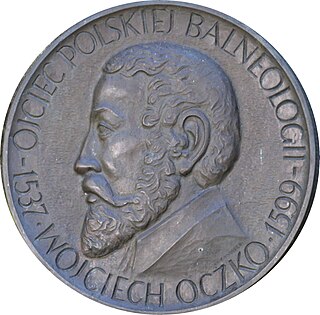 5
Wojciech Oczko – philosopher, doctor, Royal Secretary to King Sigismund II Augustus, and court physician to kings Sigismund II Augustus, Stephen Báthory, and Sigismund III Vasa. One of the founders...
5
Wojciech Oczko – philosopher, doctor, Royal Secretary to King Sigismund II Augustus, and court physician to kings Sigismund II Augustus, Stephen Báthory, and Sigismund III Vasa. One of the founders...
Konrad Prószyński
 5
Konrad Prószyński, pen name Kazimierz Promyk, was a Polish writer and editor from the Russian Empire. He was the author of primers (textbooks), editor-in-chief of Gazeta Świąteczna ; the founder of...
5
Konrad Prószyński, pen name Kazimierz Promyk, was a Polish writer and editor from the Russian Empire. He was the author of primers (textbooks), editor-in-chief of Gazeta Świąteczna ; the founder of...
Saint Sebastian
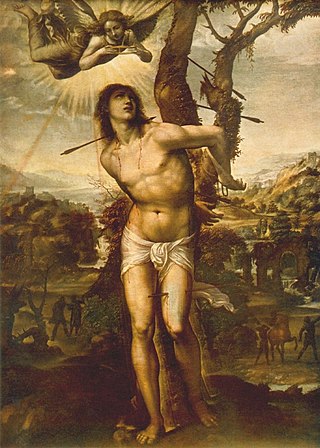 5
Sebastian was an early Christian saint and martyr. According to traditional belief, he was killed during the Diocletianic Persecution of Christians. He was initially tied to a post or tree and shot...
5
Sebastian was an early Christian saint and martyr. According to traditional belief, he was killed during the Diocletianic Persecution of Christians. He was initially tied to a post or tree and shot...
Józef Bohdan Zaleski
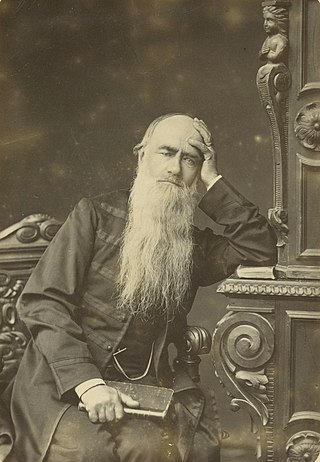 5
Józef Bohdan Zaleski was a Polish Romantic poet. A friend of Adam Mickiewicz, Zaleski founded the "Ukrainian poetic school."
5
Józef Bohdan Zaleski was a Polish Romantic poet. A friend of Adam Mickiewicz, Zaleski founded the "Ukrainian poetic school."
Zenon Klemensiewicz
 5
Zenon Klemensiewicz was a Polish linguist, specialist in the Polish language, professor of the Jagiellonian University. He fought in World War I and World War II, and took part in the underground...
5
Zenon Klemensiewicz was a Polish linguist, specialist in the Polish language, professor of the Jagiellonian University. He fought in World War I and World War II, and took part in the underground...
Józef Kostrzewski
 5
Józef Kostrzewski was a Polish archaeologist.
5
Józef Kostrzewski was a Polish archaeologist.
Stanisław Brzozowski (philosopher)
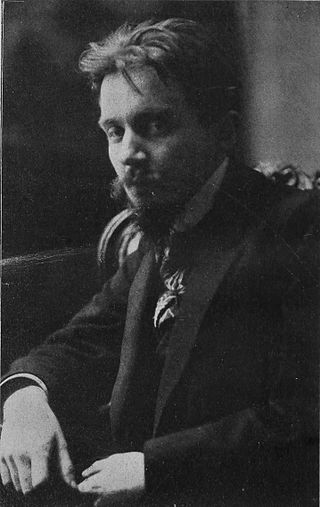 5
Stanisław Leopold Brzozowski was a Polish philosopher, writer, publicist, literary and theatre critic. Considered to be an important Polish philosopher, Brzozowski is known for his concept of the...
5
Stanisław Leopold Brzozowski was a Polish philosopher, writer, publicist, literary and theatre critic. Considered to be an important Polish philosopher, Brzozowski is known for his concept of the...
Tadeusz Mazowiecki
 5
Tadeusz Mazowiecki was a Polish author, journalist, philanthropist and politician, formerly one of the leaders of the Solidarity movement, and the first non-communist Polish prime minister since...
5
Tadeusz Mazowiecki was a Polish author, journalist, philanthropist and politician, formerly one of the leaders of the Solidarity movement, and the first non-communist Polish prime minister since...
Ludwik Czyżewski
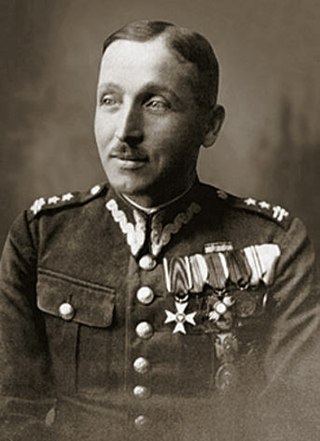 5
Ludwik Czyżewski was a Polish General during the Invasion of Poland during World War II. He commanded the 2nd Legions' Infantry Regiment during the Battle of Borowa Góra but was defeated in the...
5
Ludwik Czyżewski was a Polish General during the Invasion of Poland during World War II. He commanded the 2nd Legions' Infantry Regiment during the Battle of Borowa Góra but was defeated in the...
Józef Unrug
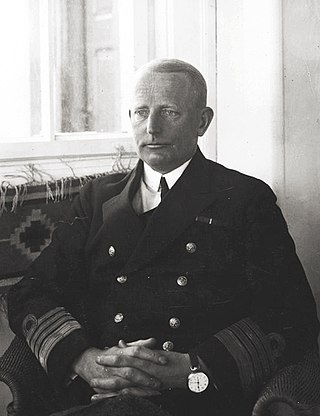 5
Józef Unrug was a Polish admiral who helped establish Poland's navy after World War I. During the opening stages of World War II, he served as the Polish Navy's commander-in-chief. As a German POW,...
5
Józef Unrug was a Polish admiral who helped establish Poland's navy after World War I. During the opening stages of World War II, he served as the Polish Navy's commander-in-chief. As a German POW,...
Nikolai Gogol
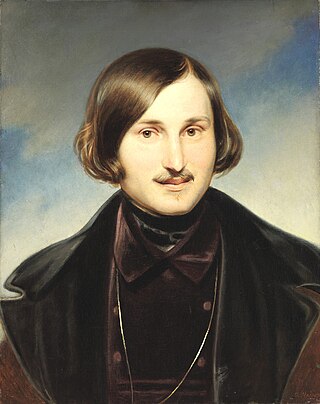 5
Nikolai Vasilyevich Gogol was a Russian novelist, short story writer, and playwright of Ukrainian origin.
5
Nikolai Vasilyevich Gogol was a Russian novelist, short story writer, and playwright of Ukrainian origin.
Stanisław Szczepanowski
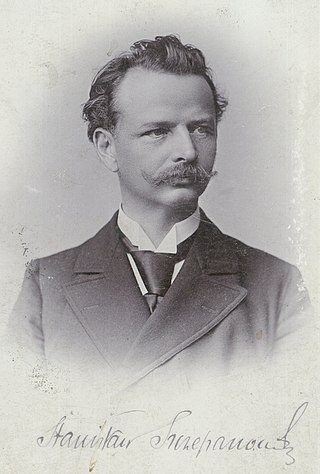 5
Stanisław Szczepanowski (1846–1900) was a Polish economist, engineer, businessman, and politician.
Deputy to parliaments of Austria and Galicia.
5
Stanisław Szczepanowski (1846–1900) was a Polish economist, engineer, businessman, and politician.
Deputy to parliaments of Austria and Galicia.
Wacław Berent
 5
Wacław Berent was a Polish novelist, essayist and literary translator from the Art Nouveau period, publishing under the pen names S.A.M. and Wł. Rawicz. He studied Natural Science in Kraków and...
5
Wacław Berent was a Polish novelist, essayist and literary translator from the Art Nouveau period, publishing under the pen names S.A.M. and Wł. Rawicz. He studied Natural Science in Kraków and...
Aleksander Kotsis
 5
Aleksander Kotsis was a Polish painter. He created landscapes, portraits, and genre scenes in a combination Romantic and Realistic style. Most of his paintings are small. He was born and died in...
5
Aleksander Kotsis was a Polish painter. He created landscapes, portraits, and genre scenes in a combination Romantic and Realistic style. Most of his paintings are small. He was born and died in...
Wacław Gąsiorowski
 5
Wacław Gąsiorowski, ps. Wiesław Sclavus, Jan Mieroszewicz – polski powieściopisarz, dziennikarz, publicysta, a także scenarzysta, działacz polonijny i niepodległościowy. W 1900 wydawca i redaktor...
5
Wacław Gąsiorowski, ps. Wiesław Sclavus, Jan Mieroszewicz – polski powieściopisarz, dziennikarz, publicysta, a także scenarzysta, działacz polonijny i niepodległościowy. W 1900 wydawca i redaktor...
Seweryn Udziela (etnograf)
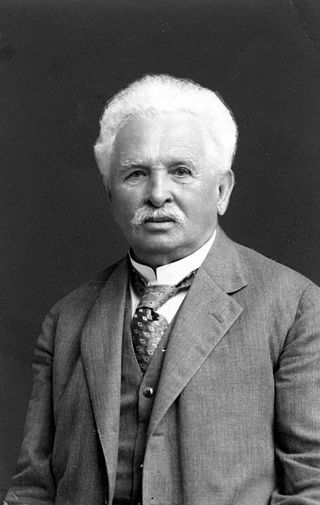 5
Seweryn Udziela – etnograf, badacz i popularyzator folkloru i kultury ludowej Małopolski.
5
Seweryn Udziela – etnograf, badacz i popularyzator folkloru i kultury ludowej Małopolski.
Walery Sławek
 5
Walery Jan Sławek was a Polish politician, freemason, military officer and activist, who in the early 1930s served three times as Prime Minister of Poland. He was one of the closest aides of Polish...
5
Walery Jan Sławek was a Polish politician, freemason, military officer and activist, who in the early 1930s served three times as Prime Minister of Poland. He was one of the closest aides of Polish...
Stanislav Piętak
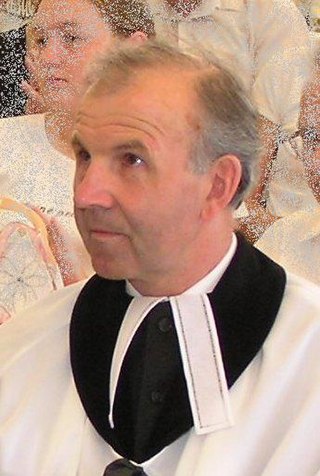 5
Stanislav Piętak is a Czech theologian and pedagogue.
5
Stanislav Piętak is a Czech theologian and pedagogue.
Bolesław Kominek
 5
Bolesław Kominek was a Polish cardinal of the Roman Catholic Church. He served as Archbishop of Wrocław from 1972 until his death, and was elevated to the cardinalate in 1973.
5
Bolesław Kominek was a Polish cardinal of the Roman Catholic Church. He served as Archbishop of Wrocław from 1972 until his death, and was elevated to the cardinalate in 1973.
Łukasz Górnicki
 5
Łukasz Górnicki, was a Polish Renaissance, poet, humanist, political commentator as well as secretary and chancellor of king Sigismund Augustus of Poland. His family used Ogończyk coat of arms.
5
Łukasz Górnicki, was a Polish Renaissance, poet, humanist, political commentator as well as secretary and chancellor of king Sigismund Augustus of Poland. His family used Ogończyk coat of arms.
Henry Probus
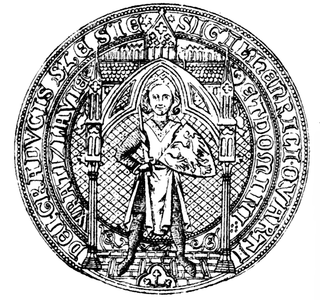 5
Henry Probus was a member of the Silesian branch of the royal Polish Piast dynasty. He was Duke of Silesia at Wrocław from 1266 as well as the ruler of the Seniorate Province of Kraków and High Duke...
5
Henry Probus was a member of the Silesian branch of the royal Polish Piast dynasty. He was Duke of Silesia at Wrocław from 1266 as well as the ruler of the Seniorate Province of Kraków and High Duke...
Karol Szajnocha
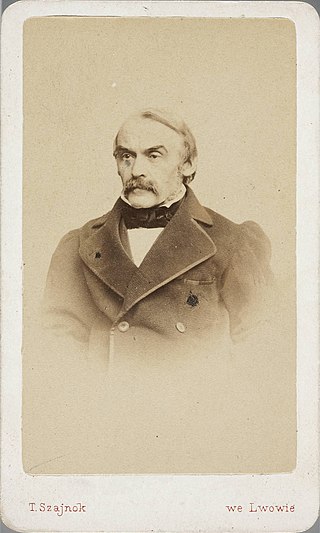 5
Karol Szajnocha (1818–1868) was a Polish writer, historian, and independence activist. Self-taught, he would nonetheless become a notable Polish historian of the partitions period.
5
Karol Szajnocha (1818–1868) was a Polish writer, historian, and independence activist. Self-taught, he would nonetheless become a notable Polish historian of the partitions period.
Stanisław Chudoba
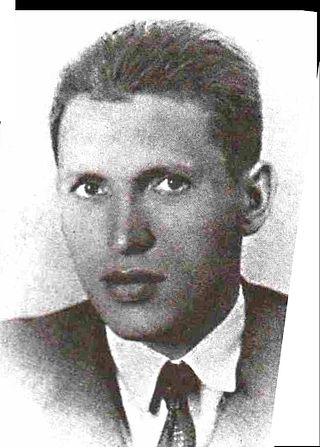 5
Stanisław Chudoba ps. Stefan – działacz socjalistyczny. Lider organizacji Polscy Socjaliści a następnie Robotniczej Partii Polskich Socjalistów w okresie okupacji niemieckiej. Schwytany w wyniku...
5
Stanisław Chudoba ps. Stefan – działacz socjalistyczny. Lider organizacji Polscy Socjaliści a następnie Robotniczej Partii Polskich Socjalistów w okresie okupacji niemieckiej. Schwytany w wyniku...
Mieczysław Boruta-Spiechowicz
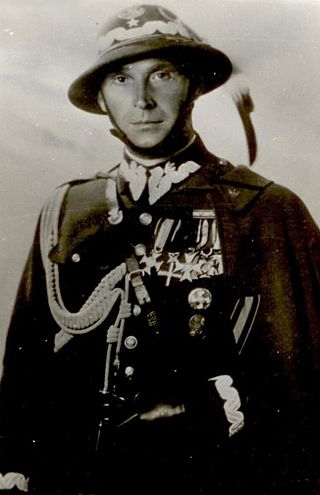 5
Mieczysław Ludwik Boruta-Spiechowicz was a Polish military officer, a general of the Polish Army and a notable member of the post-war anti-communist opposition in Poland.
5
Mieczysław Ludwik Boruta-Spiechowicz was a Polish military officer, a general of the Polish Army and a notable member of the post-war anti-communist opposition in Poland.
Leonard of Noblac
 5
Leonard of Noblac, is a Frankish saint closely associated with the town and abbey of Saint-Léonard-de-Noblat, in Haute-Vienne, in the Limousin region of France. He was converted to Christianity along...
5
Leonard of Noblac, is a Frankish saint closely associated with the town and abbey of Saint-Léonard-de-Noblat, in Haute-Vienne, in the Limousin region of France. He was converted to Christianity along...
Jan Nikodem Jaroń
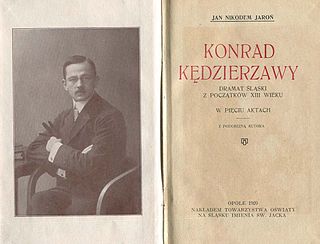 5
Jan Nikodem Jaroń, pseudonim Nikodem Arios – poeta i dramatopisarz, walczył w III powstaniu śląskim.
5
Jan Nikodem Jaroń, pseudonim Nikodem Arios – poeta i dramatopisarz, walczył w III powstaniu śląskim.
Jan Krzysztof Kluk
 5
Jan Krzysztof Kluk was a Polish naturalist agronomist and entomologist.
5
Jan Krzysztof Kluk was a Polish naturalist agronomist and entomologist.
Jan Maklakiewicz
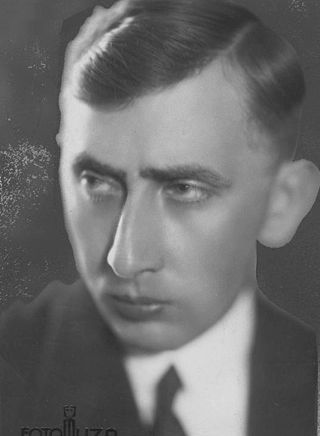 5
Jan Adam Maklakiewicz was a Polish composer, conductor, critic, and music educator. His most known compositions belong to the choral music.
5
Jan Adam Maklakiewicz was a Polish composer, conductor, critic, and music educator. His most known compositions belong to the choral music.
Rafał Urban
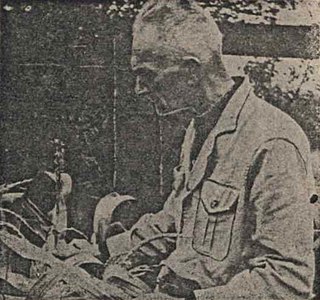 5
Rafał Urban – polski pisarz, gawędziarz śląski, autor dramatu Termin Nyski, czyli sterylizacja naiwnego baranka nieludzka komedia autochtoniczna z epoki Trzeciego Rajchu w 5 aktach biurokratycznych …...
5
Rafał Urban – polski pisarz, gawędziarz śląski, autor dramatu Termin Nyski, czyli sterylizacja naiwnego baranka nieludzka komedia autochtoniczna z epoki Trzeciego Rajchu w 5 aktach biurokratycznych …...
Johannes Gutenberg
 5
Johannes Gensfleisch zur Laden zum Gutenberg was a German inventor and craftsman who introduced letterpress printing to Europe with his movable-type printing press. Though movable type was already in...
5
Johannes Gensfleisch zur Laden zum Gutenberg was a German inventor and craftsman who introduced letterpress printing to Europe with his movable-type printing press. Though movable type was already in...
Wilhelm Pluta
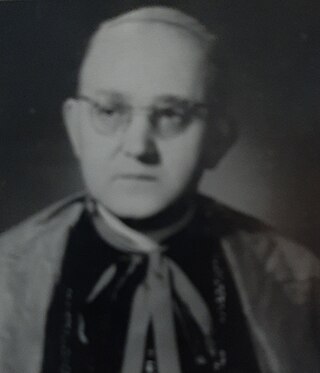 5
Wilhelm Pluta – polski duchowny rzymskokatolicki, administrator apostolski w Gorzowie Wielkopolskim w latach 1958–1972, biskup diecezjalny gorzowski w latach 1972–1986, sługa Boży Kościoła...
5
Wilhelm Pluta – polski duchowny rzymskokatolicki, administrator apostolski w Gorzowie Wielkopolskim w latach 1958–1972, biskup diecezjalny gorzowski w latach 1972–1986, sługa Boży Kościoła...
Zenon Przesmycki
 5
Zenon Przesmycki, was a Polish poet, translator and an art critic of the literary period of Młoda Polska, who studied law in Italy, France and England; in years of 1887 and 1888, he served as the...
5
Zenon Przesmycki, was a Polish poet, translator and an art critic of the literary period of Młoda Polska, who studied law in Italy, France and England; in years of 1887 and 1888, he served as the...
John of Nepomuk
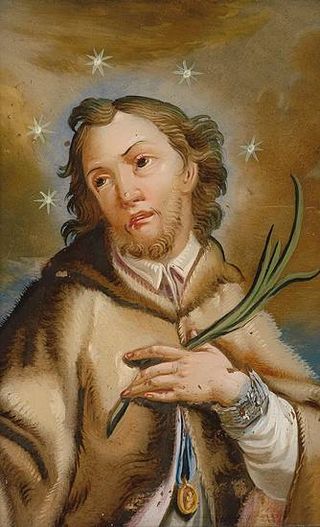 5
John of Nepomuk
was a saint of Bohemia who was drowned in the Vltava river at the behest of King Wenceslaus IV of Bohemia. Later accounts state that he was the confessor of the queen of Bohemia and...
5
John of Nepomuk
was a saint of Bohemia who was drowned in the Vltava river at the behest of King Wenceslaus IV of Bohemia. Later accounts state that he was the confessor of the queen of Bohemia and...
Karol Namysłowski
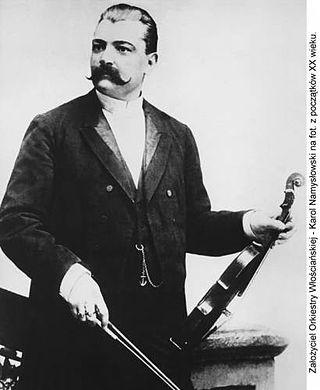 5
Karol Namysłowski – kompozytor, dyrygent, skrzypek, twórca Orkiestry Włościańskiej w Zamościu.
5
Karol Namysłowski – kompozytor, dyrygent, skrzypek, twórca Orkiestry Włościańskiej w Zamościu.
Stanisław Wokulski
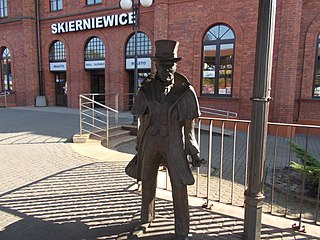 5
Stanisław Wokulski – postać literacka, protagonista powieści Lalka Bolesława Prusa; postać Wokulskiego stała się w polskiej kulturze masowej symbolem przedsiębiorczości.
5
Stanisław Wokulski – postać literacka, protagonista powieści Lalka Bolesława Prusa; postać Wokulskiego stała się w polskiej kulturze masowej symbolem przedsiębiorczości.
Władysław Tatarkiewicz
 5
Władysław Tatarkiewicz was a Polish philosopher, historian of philosophy, historian of art, esthetician, and ethicist.
5
Władysław Tatarkiewicz was a Polish philosopher, historian of philosophy, historian of art, esthetician, and ethicist.
Miron Białoszewski
 5
Miron Białoszewski was a Polish poet, novelist, playwright and actor.
5
Miron Białoszewski was a Polish poet, novelist, playwright and actor.
Stanisław Marusarz
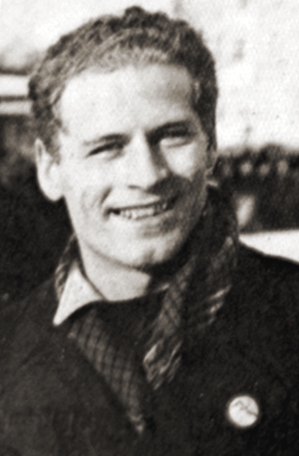 5
Stanisław Marusarz ; 18 June 1913 – 29 October 1993) was a Polish Nordic skiing competitor in the 1930s.
5
Stanisław Marusarz ; 18 June 1913 – 29 October 1993) was a Polish Nordic skiing competitor in the 1930s.
Albert Einstein
 5
Albert Einstein was a German-born theoretical physicist who is widely held to be one of the greatest and most influential scientists of all time. Best known for developing the theory of relativity,...
5
Albert Einstein was a German-born theoretical physicist who is widely held to be one of the greatest and most influential scientists of all time. Best known for developing the theory of relativity,...
Thomas Edison
 5
Thomas Alva Edison was an American inventor and businessman. He developed many devices in fields such as electric power generation, mass communication, sound recording, and motion pictures. These...
5
Thomas Alva Edison was an American inventor and businessman. He developed many devices in fields such as electric power generation, mass communication, sound recording, and motion pictures. These...
Bruno Schulz
 5
Bruno Schulz was a Polish Jewish writer, fine artist, literary critic and art teacher. He is regarded as one of the great Polish-language prose stylists of the 20th century. In 1938, he was awarded...
5
Bruno Schulz was a Polish Jewish writer, fine artist, literary critic and art teacher. He is regarded as one of the great Polish-language prose stylists of the 20th century. In 1938, he was awarded...
Wacław Nałkowski
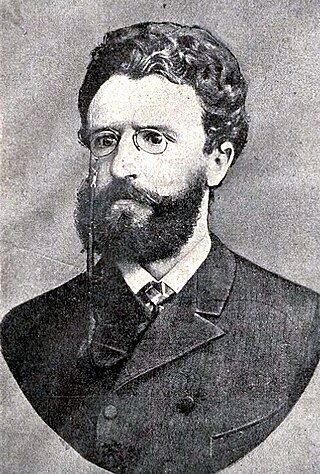 5
Wacław Piotr Nałkowski, ps. „Przewłocki”, „Nerwowy” – polski geograf, pedagog, publicysta i działacz społeczny. Twórca teorii nieokreśloności terytorium Polski. Ojciec Zofii Nałkowskiej i Hanny...
5
Wacław Piotr Nałkowski, ps. „Przewłocki”, „Nerwowy” – polski geograf, pedagog, publicysta i działacz społeczny. Twórca teorii nieokreśloności terytorium Polski. Ojciec Zofii Nałkowskiej i Hanny...
Jan Trepczyk
 5
Jan Trepczyk was a Kashubian poet, songwriter, ideologist, lexicographer, and teacher. He was a member of the Regional Kashub Association of Kartuzy, of the "Zrzeszeńcy" ("associationists"), and of...
5
Jan Trepczyk was a Kashubian poet, songwriter, ideologist, lexicographer, and teacher. He was a member of the Regional Kashub Association of Kartuzy, of the "Zrzeszeńcy" ("associationists"), and of...
Piotr Dunin
 5
Piotr Dunin was a Polish leader. Starost of Malbork 1478–1484, castellan of Sieradz from 1478, voivode of Brześć Kujawski Voivodeship from 1481.
5
Piotr Dunin was a Polish leader. Starost of Malbork 1478–1484, castellan of Sieradz from 1478, voivode of Brześć Kujawski Voivodeship from 1481.
Dobrosława of Pomerania
 5
Dobrosława of Pomerania was a princess from Griffin dynasty. She was Countess of Gützkow and Schlawe. She was most likely the daughter of Bogusław I, duke of Pomerania, and his wife, Walpurga.
5
Dobrosława of Pomerania was a princess from Griffin dynasty. She was Countess of Gützkow and Schlawe. She was most likely the daughter of Bogusław I, duke of Pomerania, and his wife, Walpurga.
Mikołaj Gomółka
 5
Mikołaj Gomółka was a Polish Renaissance composer and a member of the royal court of Sigismund II Augustus. At the court, he served as a singer, flutist, and trumpeter.
5
Mikołaj Gomółka was a Polish Renaissance composer and a member of the royal court of Sigismund II Augustus. At the court, he served as a singer, flutist, and trumpeter.
Władysław Hańcza
 5
Władysław Hańcza was a Polish actor and theatre director.
5
Władysław Hańcza was a Polish actor and theatre director.
Władysław Planetorz
 5
Władysław Planetorz – działacz Związku Harcerstwa Polskiego w Niemczech, podharcmistrz.
5
Władysław Planetorz – działacz Związku Harcerstwa Polskiego w Niemczech, podharcmistrz.
Bolesław Orliński
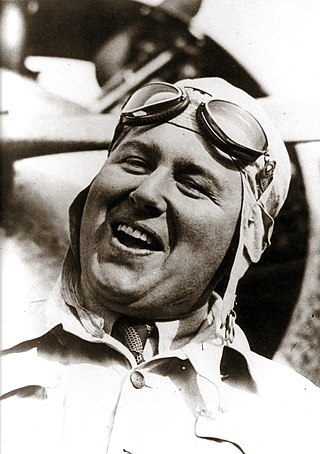 5
Bolesław Orliński was a Polish aviator, military, sports and test pilot.
5
Bolesław Orliński was a Polish aviator, military, sports and test pilot.
Kazimierz Jeżewski
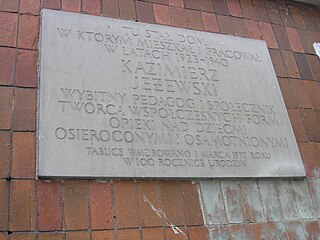 5
Kazimierz Antoni Jeżewski – polski pedagog i działacz oświatowy, twórca i ideolog Gniazd Sierocych i Wiosek Kościuszkowskich.
5
Kazimierz Antoni Jeżewski – polski pedagog i działacz oświatowy, twórca i ideolog Gniazd Sierocych i Wiosek Kościuszkowskich.
Jan Drzeżdżon
 5
Jan Drzeżdżon – polski pisarz i poeta regionalny, krytyk, badacz, redaktor i wydawca kaszubski, tworzący również w języku polskim. Uważany za jednego z czołowych pisarzy w literaturze kaszubskiej.
5
Jan Drzeżdżon – polski pisarz i poeta regionalny, krytyk, badacz, redaktor i wydawca kaszubski, tworzący również w języku polskim. Uważany za jednego z czołowych pisarzy w literaturze kaszubskiej.
Tomasz Rogala
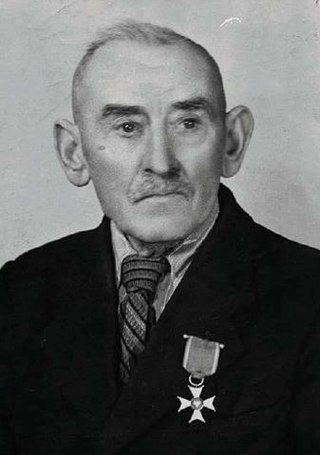 5
Tomasz Rogala – rzemieślnik (szewc), kaszubski działacz ludowy, społecznik, członek delegacji polskiej na konferencję w Wersalu (1919), lokalny polityk, zasłużony obywatel Kościerzyny, podobnie jak...
5
Tomasz Rogala – rzemieślnik (szewc), kaszubski działacz ludowy, społecznik, członek delegacji polskiej na konferencję w Wersalu (1919), lokalny polityk, zasłużony obywatel Kościerzyny, podobnie jak...
Jan Nagórski
 5
Alfons Jan Nagórski (1888–1976), also known as Ivan Iosifovich Nagurski, was a Polish engineer and pioneer of aviation, the first person to fly an airplane in the Arctic and the first aviator to...
5
Alfons Jan Nagórski (1888–1976), also known as Ivan Iosifovich Nagurski, was a Polish engineer and pioneer of aviation, the first person to fly an airplane in the Arctic and the first aviator to...
Karolina Kózka
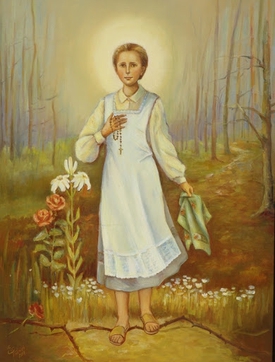 5
Karolina Kózka was a sixteen-year old Polish victim of a sex attack and murder. Prior to that she was known locally for her strong faith and her eagerness to catechize her neighbours and children....
5
Karolina Kózka was a sixteen-year old Polish victim of a sex attack and murder. Prior to that she was known locally for her strong faith and her eagerness to catechize her neighbours and children....
Edward Szymański (poeta)
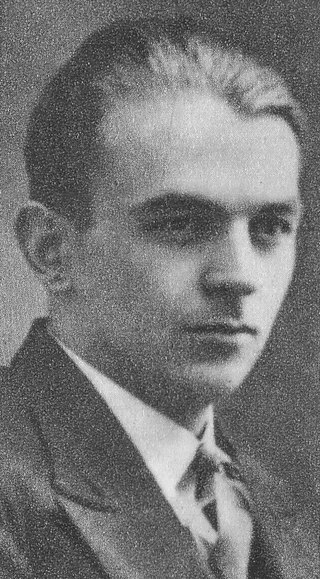 5
Edward Szymański – lewicowy poeta i dziennikarz związany z warszawską Wolą, satyryk, działacz PPS.
5
Edward Szymański – lewicowy poeta i dziennikarz związany z warszawską Wolą, satyryk, działacz PPS.
Klemens Bachleda
 5
Klemens "Klimek" Bachleda was a pioneering Polish mountain guide and mountain rescuer in Austria-Hungary. He died during an unsuccessful mountain rescue attempt in the High Tatras.
5
Klemens "Klimek" Bachleda was a pioneering Polish mountain guide and mountain rescuer in Austria-Hungary. He died during an unsuccessful mountain rescue attempt in the High Tatras.
King Matt the First
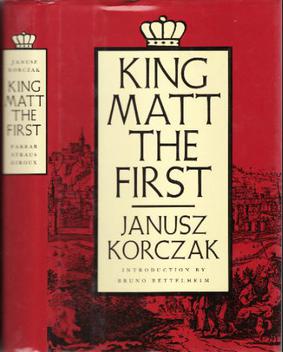 5
King Matt the First is a children's novel published in 1923 by Polish author, pediatrician, and child pedagogue Janusz Korczak. In addition to telling the story of a young king's adventures, it...
5
King Matt the First is a children's novel published in 1923 by Polish author, pediatrician, and child pedagogue Janusz Korczak. In addition to telling the story of a young king's adventures, it...
Cyryl Ratajski
 5
Cyryl Ratajski was a Polish politician and lawyer.
5
Cyryl Ratajski was a Polish politician and lawyer.
Jerzy Giedroyc
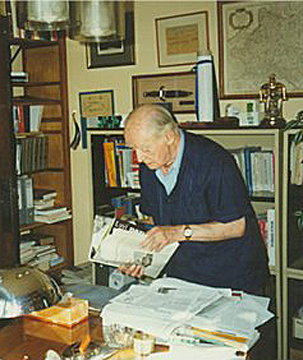 5
Jerzy Władysław Giedroyc was a Polish writer, lawyer, publicist and political activist. For many years, he worked as editor of the highly influential Paris-based periodical, Kultura.
5
Jerzy Władysław Giedroyc was a Polish writer, lawyer, publicist and political activist. For many years, he worked as editor of the highly influential Paris-based periodical, Kultura.
Bolesław V the Chaste
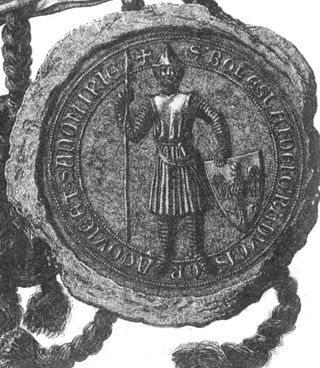 5
Bolesław V the Chaste was Duke of Sandomierz in Lesser Poland from 1232 and High Duke of Poland from 1243 until his death, as the last male representative of the Lesser Polish branch of Piasts.
5
Bolesław V the Chaste was Duke of Sandomierz in Lesser Poland from 1232 and High Duke of Poland from 1243 until his death, as the last male representative of the Lesser Polish branch of Piasts.
Jerzy Lanc
 5
Jerzy Lanc – polski nauczyciel.
5
Jerzy Lanc – polski nauczyciel.
Józef Czapski
 5
Józef Czapski was a Polish artist, author, and critic, as well as an officer of the Polish Army. As a painter, he is notable for his membership in the Kapist movement, which was heavily influenced by...
5
Józef Czapski was a Polish artist, author, and critic, as well as an officer of the Polish Army. As a painter, he is notable for his membership in the Kapist movement, which was heavily influenced by...
Witold Urbanowicz
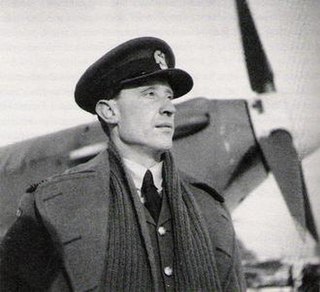 5
Witold Urbanowicz was a Polish fighter ace of the Second World War. According to the official record, Witold Urbanowicz was the second highest-scoring Polish fighter ace, with 17 confirmed wartime...
5
Witold Urbanowicz was a Polish fighter ace of the Second World War. According to the official record, Witold Urbanowicz was the second highest-scoring Polish fighter ace, with 17 confirmed wartime...
Gottlieb Daimler
 5
Gottlieb Wilhelm Daimler was a German engineer, industrial designer and industrialist born in Schorndorf, in what is now Germany. He was a pioneer of internal-combustion engines and automobile...
5
Gottlieb Wilhelm Daimler was a German engineer, industrial designer and industrialist born in Schorndorf, in what is now Germany. He was a pioneer of internal-combustion engines and automobile...
Jan Szczepanik
 5
Jan Szczepanik was a Polish inventor, with several hundred patents and over 50 discoveries to his name, many of which are still applied today, especially in the motion picture industry, as well as in...
5
Jan Szczepanik was a Polish inventor, with several hundred patents and over 50 discoveries to his name, many of which are still applied today, especially in the motion picture industry, as well as in...
Zbigniew Cybulski
 5
Zbigniew Hubert Cybulski was a Polish film and theatre actor, one of the best-known and most popular personalities of the post-World War II history of Poland.
5
Zbigniew Hubert Cybulski was a Polish film and theatre actor, one of the best-known and most popular personalities of the post-World War II history of Poland.
Tadeusz Nalepa
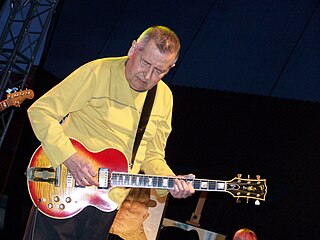 5
Tadeusz Nalepa was a Polish composer, guitar player, vocalist, and lyricist.
5
Tadeusz Nalepa was a Polish composer, guitar player, vocalist, and lyricist.
Stanisław Hadyna
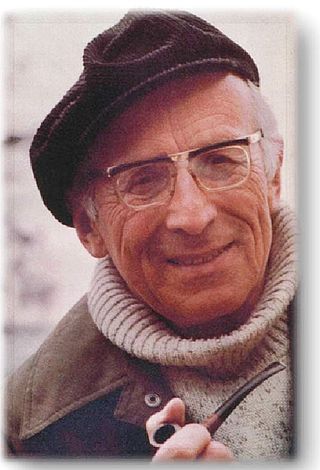 5
Stanisław Hadyna – polski kompozytor, dyrygent, muzykolog i pisarz. Założyciel i wieloletni kierownik artystyczny Zespołu Pieśni i Tańca „Śląsk”.
5
Stanisław Hadyna – polski kompozytor, dyrygent, muzykolog i pisarz. Założyciel i wieloletni kierownik artystyczny Zespołu Pieśni i Tańca „Śląsk”.
Aleksander Brückner
 4
Aleksander Brückner was a Polish scholar of Slavic languages and literature (Slavistics), philologist, lexicographer, and historian of literature. He is among the most notable Slavicists of the late...
4
Aleksander Brückner was a Polish scholar of Slavic languages and literature (Slavistics), philologist, lexicographer, and historian of literature. He is among the most notable Slavicists of the late...
Karl Marx
 4
Karl Marx was a German-born philosopher, economist, political theorist, historian, sociologist, journalist, and revolutionary socialist. His best-known works are the 1848 pamphlet The Communist...
4
Karl Marx was a German-born philosopher, economist, political theorist, historian, sociologist, journalist, and revolutionary socialist. His best-known works are the 1848 pamphlet The Communist...
Stanisław Czernik
 4
Stanisław Czernik – polski powieściopisarz, folklorysta i poeta, przedstawiciel kierunku zw. autentyzmem, postulującego wiązanie w sztuce prawdy artystycznej i życiowej.
4
Stanisław Czernik – polski powieściopisarz, folklorysta i poeta, przedstawiciel kierunku zw. autentyzmem, postulującego wiązanie w sztuce prawdy artystycznej i życiowej.
National Armed Forces
 4
National Armed Forces was a Polish right-wing underground military organization of the National Democracy operating from 1942. During World War II, NSZ troops fought against Nazi Germany and...
4
National Armed Forces was a Polish right-wing underground military organization of the National Democracy operating from 1942. During World War II, NSZ troops fought against Nazi Germany and...
Józef Szujski
 4
Józef Szujski was a Polish politician, historian, poet and professor of the Jagiellonian University.
4
Józef Szujski was a Polish politician, historian, poet and professor of the Jagiellonian University.
Cyril and Methodius
 4
Cyril and Methodius (815–885) were brothers, Byzantine Christian theologians and missionaries. For their work evangelizing the Slavs, they are known as the "Apostles to the Slavs".
4
Cyril and Methodius (815–885) were brothers, Byzantine Christian theologians and missionaries. For their work evangelizing the Slavs, they are known as the "Apostles to the Slavs".
Konstanty Matyjewicz-Maciejewicz
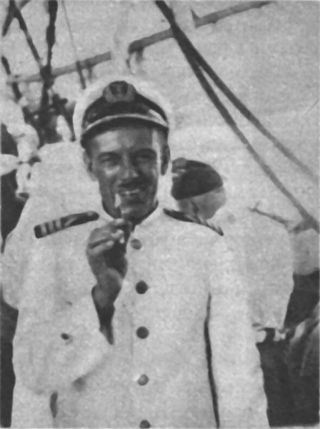 4
Konstanty Matyjewicz-Maciejewicz, „Kapitan Kapitanów”, „Macaj” – kapitan żeglugi wielkiej, ostatni komendant „Lwowa” i pierwszy komendant „Daru Pomorza”. Wykładowca w szkołach morskich w Tczewie,...
4
Konstanty Matyjewicz-Maciejewicz, „Kapitan Kapitanów”, „Macaj” – kapitan żeglugi wielkiej, ostatni komendant „Lwowa” i pierwszy komendant „Daru Pomorza”. Wykładowca w szkołach morskich w Tczewie,...
Wilhelm Röntgen
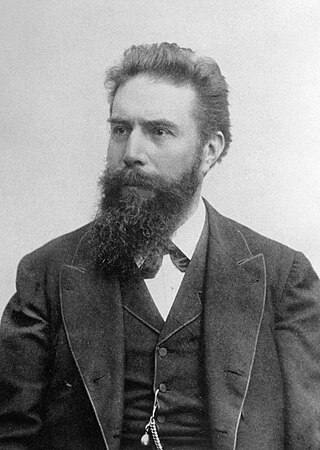 4
Wilhelm Conrad Röntgen was a German mechanical engineer and physicist, who, on 8 November 1895, produced and detected electromagnetic radiation in a wavelength range known as X-rays or Röntgen rays,...
4
Wilhelm Conrad Röntgen was a German mechanical engineer and physicist, who, on 8 November 1895, produced and detected electromagnetic radiation in a wavelength range known as X-rays or Röntgen rays,...
Marian Rapacki (trener)
 4
Marian Tadeusz Rapacki – polski trener kajakarstwa, działacz sportowy, twórca i wieloletni kierownik Olsztyńskiego Muzeum Sportu, honorowy obywatel Olsztyna.
4
Marian Tadeusz Rapacki – polski trener kajakarstwa, działacz sportowy, twórca i wieloletni kierownik Olsztyńskiego Muzeum Sportu, honorowy obywatel Olsztyna.
Marian Falski
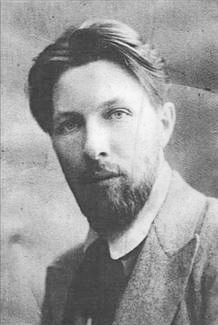 4
Marian Falski, ps. Rafał Praski, Janka Swajak – polski pedagog i działacz oświatowy, specjalista w dziedzinie ustroju i organizacji szkolnictwa, autor najpopularniejszego polskiego elementarza –...
4
Marian Falski, ps. Rafał Praski, Janka Swajak – polski pedagog i działacz oświatowy, specjalista w dziedzinie ustroju i organizacji szkolnictwa, autor najpopularniejszego polskiego elementarza –...
Józef Mianowski
 4
Józef Mianowski (1804–1879) was a Polish medical researcher and practitioner, academic, social and political activist, and rector of the "Main School" incarnation (1862–69) of Warsaw University.
4
Józef Mianowski (1804–1879) was a Polish medical researcher and practitioner, academic, social and political activist, and rector of the "Main School" incarnation (1862–69) of Warsaw University.
Alfred Sokołowski
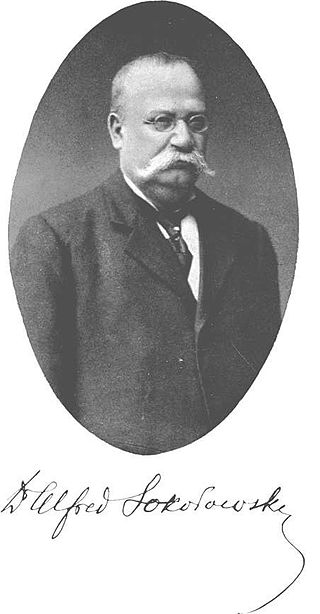 4
Alfred Marcin Sokołowski was a Polish pulmonologist and professor of the University of Warsaw. He specialised in the field of Phthisiatry and he was one of the pioneers of modern treatment to...
4
Alfred Marcin Sokołowski was a Polish pulmonologist and professor of the University of Warsaw. He specialised in the field of Phthisiatry and he was one of the pioneers of modern treatment to...
Stanisław Lentz
 4
Stanisław Lentz was a Polish painter, portraitist, illustrator, and a professor at the Academy of Fine Arts in Warsaw from 1909.
4
Stanisław Lentz was a Polish painter, portraitist, illustrator, and a professor at the Academy of Fine Arts in Warsaw from 1909.
Walery Goetel
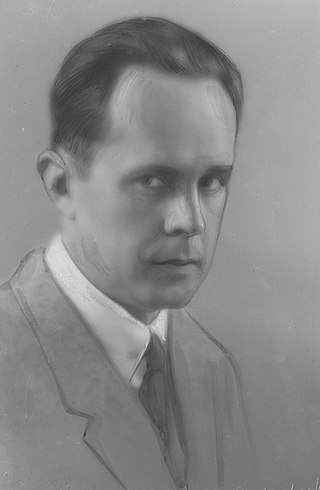 4
Walery Goetel – polski geolog, ekolog i paleontolog, profesor, działacz społeczny.
4
Walery Goetel – polski geolog, ekolog i paleontolog, profesor, działacz społeczny.
Bolesław Romanowski
 4
Bolesław Romanowski was a submarine commander of the Polish Navy during World War II.
4
Bolesław Romanowski was a submarine commander of the Polish Navy during World War II.
Albert Brudzewski
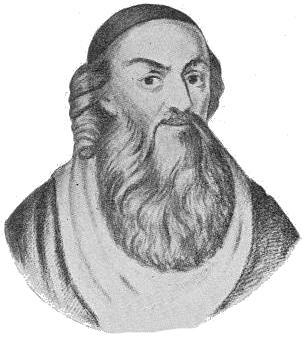 4
Albert Brudzewski, also Albert Blar (of Brudzewo), Albert of Brudzewo or Wojciech Brudzewski (in Latin, Albertus de Brudzewo; c.1445–c.1497) was a Polish astronomer, mathematician, philosopher and...
4
Albert Brudzewski, also Albert Blar (of Brudzewo), Albert of Brudzewo or Wojciech Brudzewski (in Latin, Albertus de Brudzewo; c.1445–c.1497) was a Polish astronomer, mathematician, philosopher and...
Taras Shevchenko
 4
Taras Hryhorovych Shevchenko was a Ukrainian poet, writer, artist, public and political figure, folklorist and ethnographer. He was a fellow of the Imperial Academy of Arts and a member of the...
4
Taras Hryhorovych Shevchenko was a Ukrainian poet, writer, artist, public and political figure, folklorist and ethnographer. He was a fellow of the Imperial Academy of Arts and a member of the...
John Amos Comenius
 4
John Amos Comenius was a Moravian philosopher, pedagogue and theologian who is considered the father of modern education. He served as the last bishop of the Unity of the Brethren before becoming a...
4
John Amos Comenius was a Moravian philosopher, pedagogue and theologian who is considered the father of modern education. He served as the last bishop of the Unity of the Brethren before becoming a...
Julian Filipowicz
 4
Julian Filipowicz was a major general of the Polish Armed Forces and a commander of the Home Army in the Kraków-Silesia Area. He was also a commander of the Service for Poland's Victory in the Kraków...
4
Julian Filipowicz was a major general of the Polish Armed Forces and a commander of the Home Army in the Kraków-Silesia Area. He was also a commander of the Service for Poland's Victory in the Kraków...
Edward Abramowski
 4
Edward Józef Abramowski was a Polish philosopher, libertarian socialist, anarchist, psychologist, ethician, and supporter of cooperatives. Abramowski is also one of the best known activists of...
4
Edward Józef Abramowski was a Polish philosopher, libertarian socialist, anarchist, psychologist, ethician, and supporter of cooperatives. Abramowski is also one of the best known activists of...
Ignacy Chrzanowski
 4
Ignacy Chrzanowski was a Polish historian of literature, professor of the Jagiellonian University, arrested by the Nazis as part of the Sonderaktion Krakau and killed in the Sachsenhausen...
4
Ignacy Chrzanowski was a Polish historian of literature, professor of the Jagiellonian University, arrested by the Nazis as part of the Sonderaktion Krakau and killed in the Sachsenhausen...
Emil Szramek
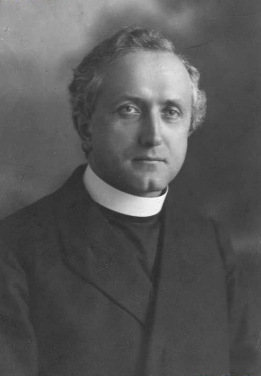 4
Emil Szramek was a Polish and Roman Catholic priest. He graduated from the University of Wrocław. He died in a Nazi concentration camp at Dachau. He is one of the 108 Martyrs of World War II who were...
4
Emil Szramek was a Polish and Roman Catholic priest. He graduated from the University of Wrocław. He died in a Nazi concentration camp at Dachau. He is one of the 108 Martyrs of World War II who were...
Richard Wagner
 4
Wilhelm Richard Wagner was a German composer, theatre director, polemicist, and conductor who is chiefly known for his operas. Unlike most opera composers, Wagner wrote both the libretto and the...
4
Wilhelm Richard Wagner was a German composer, theatre director, polemicist, and conductor who is chiefly known for his operas. Unlike most opera composers, Wagner wrote both the libretto and the...
Edmund Osmańczyk
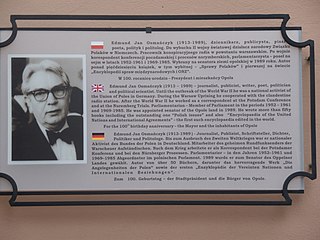 4
Edmund Jan Osmańczyk, was a Polish writer, author of Encyclopedia of the United Nations and International Agreements.
4
Edmund Jan Osmańczyk, was a Polish writer, author of Encyclopedia of the United Nations and International Agreements.
Émile Zola
 4
Émile Édouard Charles Antoine Zola was a French novelist, journalist, playwright, the best-known practitioner of the literary school of naturalism, and an important contributor to the development of...
4
Émile Édouard Charles Antoine Zola was a French novelist, journalist, playwright, the best-known practitioner of the literary school of naturalism, and an important contributor to the development of...
Rudolf Weigl
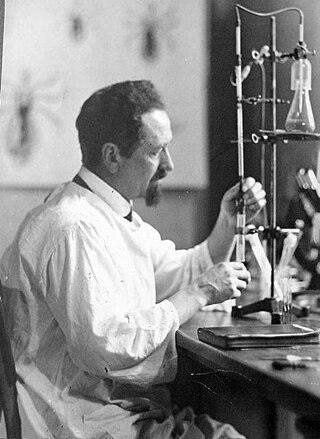 4
Rudolf Stefan Jan Weigl was a Polish biologist, physician and inventor, known for creating the first effective vaccine against epidemic typhus. He was nominated for the Nobel Prize in Medicine each...
4
Rudolf Stefan Jan Weigl was a Polish biologist, physician and inventor, known for creating the first effective vaccine against epidemic typhus. He was nominated for the Nobel Prize in Medicine each...
Bolesław Biegas
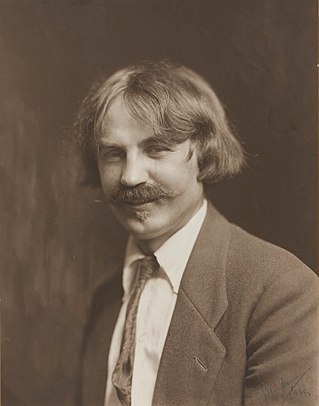 4
Bolesław Biegas (1877–1954) was a Polish, surrealist and Symbolist painter and sculptor.
4
Bolesław Biegas (1877–1954) was a Polish, surrealist and Symbolist painter and sculptor.
Lucjan Siemieński
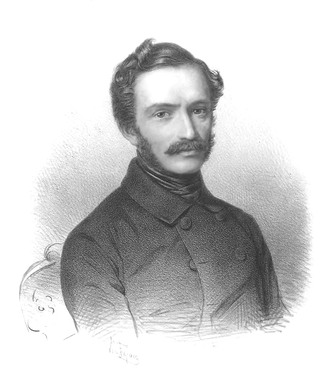 4
Lucjan Hipolit Siemieński was a Polish Romantic poet, prose writer, translator and literary critic.
4
Lucjan Hipolit Siemieński was a Polish Romantic poet, prose writer, translator and literary critic.
Augustyn Świder
 4
Augustyn Świder, pseud. A. Ś., Kuba z Jagód, Robotnik, Sfinks − polski hutnik, poeta, publicysta, powstaniec oraz działacz społeczny.
4
Augustyn Świder, pseud. A. Ś., Kuba z Jagód, Robotnik, Sfinks − polski hutnik, poeta, publicysta, powstaniec oraz działacz społeczny.
Antoni Kocjan
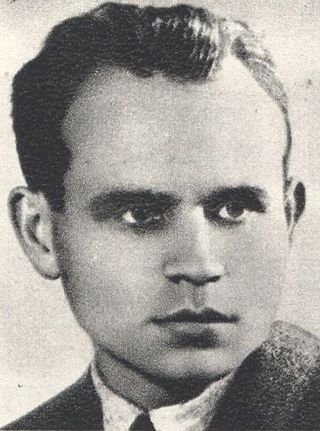 4
Antoni Kocjan was a renowned Polish glider constructor and a contributor to the intelligence services of the Polish Home Army during World War II.
4
Antoni Kocjan was a renowned Polish glider constructor and a contributor to the intelligence services of the Polish Home Army during World War II.
Tadeusz Reger
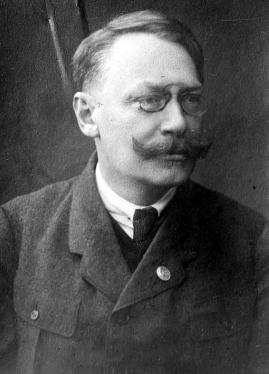 4
Tadeusz Reger – polski działacz socjalistyczny na Śląsku Cieszyńskim, poseł do austriackiej Rady Państwa i na sejm II RP (1919–1935), prezes Rady Narodowej Księstwa Cieszyńskiego.
4
Tadeusz Reger – polski działacz socjalistyczny na Śląsku Cieszyńskim, poseł do austriackiej Rady Państwa i na sejm II RP (1919–1935), prezes Rady Narodowej Księstwa Cieszyńskiego.
Jan Samsonowicz (geolog)
 4
Jan Samsonowicz – polski geolog i paleontolog, profesor uniwersytetów we Lwowie i Warszawie, wieloletni kierownik Katedry Geologii Historycznej Uniwersytetu Warszawskiego, członek rzeczywisty...
4
Jan Samsonowicz – polski geolog i paleontolog, profesor uniwersytetów we Lwowie i Warszawie, wieloletni kierownik Katedry Geologii Historycznej Uniwersytetu Warszawskiego, członek rzeczywisty...
Andrzej Galica
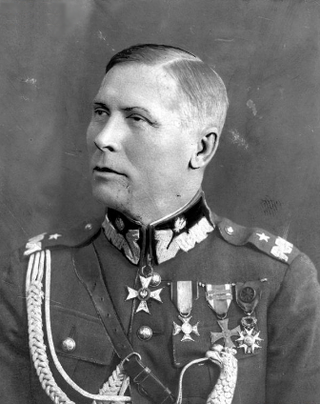 4
Andrzej Galica – generał brygady Wojska Polskiego, działacz niepodległościowy, kawaler Orderu Virtuti Militari, twórca formacji strzelców podhalańskich, inżynier, polityk, poseł na Sejm RP, członek...
4
Andrzej Galica – generał brygady Wojska Polskiego, działacz niepodległościowy, kawaler Orderu Virtuti Militari, twórca formacji strzelców podhalańskich, inżynier, polityk, poseł na Sejm RP, członek...
Jan Piwnik
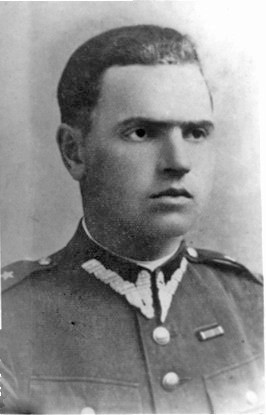 4
Jan Piwnik was a Polish World War II soldier, a cichociemny and a notable leader of the Home Army in the Świętokrzyskie Mountains. He used the nickname Ponury and Donat.
4
Jan Piwnik was a Polish World War II soldier, a cichociemny and a notable leader of the Home Army in the Świętokrzyskie Mountains. He used the nickname Ponury and Donat.
Wincenty Rapacki
 4
Wincenty Rapacki was a Polish actor and theatre director.
4
Wincenty Rapacki was a Polish actor and theatre director.
Adam Jerzy Czartoryski
 4
Adam Jerzy Czartoryski, in English known as Adam George Czartoryski, was a Polish nobleman, statesman, diplomat and author.
4
Adam Jerzy Czartoryski, in English known as Adam George Czartoryski, was a Polish nobleman, statesman, diplomat and author.
Stanisław Bareja
 4
Stanisław Sylwester Bareja was a Polish filmmaker. Some of his films have reached cult status in Poland.
4
Stanisław Sylwester Bareja was a Polish filmmaker. Some of his films have reached cult status in Poland.
Karl Liebknecht
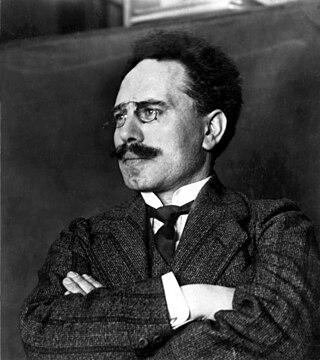 4
Karl Paul August Friedrich Liebknecht was a German socialist and anti-militarist. A member of the Social Democratic Party of Germany (SPD) beginning in 1900, he was one of its deputies in the...
4
Karl Paul August Friedrich Liebknecht was a German socialist and anti-militarist. A member of the Social Democratic Party of Germany (SPD) beginning in 1900, he was one of its deputies in the...
Stefan Bobrowski
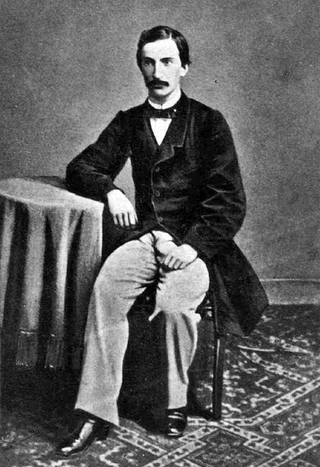 4
Stefan Bobrowski was a Polish politician and activist for Polish independence. He participated in the January 1863 Uprising as one of the leaders of its "Red" faction and as a member of that...
4
Stefan Bobrowski was a Polish politician and activist for Polish independence. He participated in the January 1863 Uprising as one of the leaders of its "Red" faction and as a member of that...
Marcin Bielski
 4
Marcin Bielski was a Polish soldier, historian, chronicler, renaissance satirical poet, writer and translator. His son, Joachim Bielski, royal secretary to king Sigismund III Vasa, was also a...
4
Marcin Bielski was a Polish soldier, historian, chronicler, renaissance satirical poet, writer and translator. His son, Joachim Bielski, royal secretary to king Sigismund III Vasa, was also a...
Wacław Sierpiński
 4
Wacław Franciszek Sierpiński was a Polish mathematician. He was known for contributions to set theory, number theory, theory of functions, and topology. He published over 700 papers and 50 books.
4
Wacław Franciszek Sierpiński was a Polish mathematician. He was known for contributions to set theory, number theory, theory of functions, and topology. He published over 700 papers and 50 books.
Stefan Bryła
 4
Stefan Władysław Bryła was a Polish construction engineer and welding pioneer. He designed and built the first welded road bridge in the world.
4
Stefan Władysław Bryła was a Polish construction engineer and welding pioneer. He designed and built the first welded road bridge in the world.
Stanisław Bodych
 4
Stanisław Bodych ps. Rawicz – dowódca kompanii w 7. pułku AK Garłuch.
4
Stanisław Bodych ps. Rawicz – dowódca kompanii w 7. pułku AK Garłuch.
Jan Baczewski
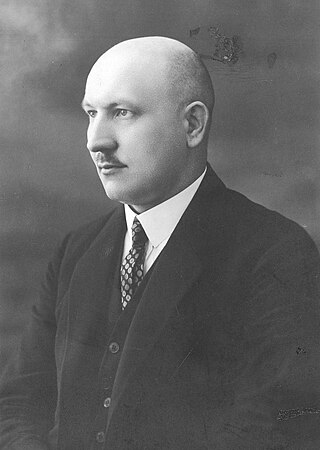 4
Jan Baczewski – polski działacz polityczny i oświatowy w Niemczech, w okresie Republiki Weimarskiej poseł do pruskiego Landtagu, poseł do polskiego Sejmu Ustawodawczego (1947–1952).
4
Jan Baczewski – polski działacz polityczny i oświatowy w Niemczech, w okresie Republiki Weimarskiej poseł do pruskiego Landtagu, poseł do polskiego Sejmu Ustawodawczego (1947–1952).
Roman Żuliński
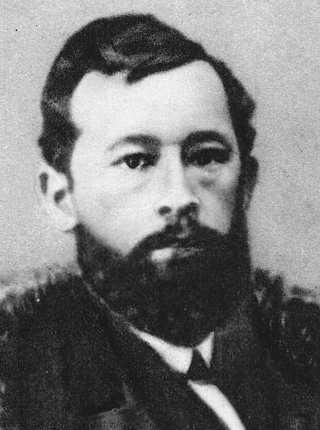 4
Roman Żuliński - a Polish mathematician and co-commander of the January Uprising.
4
Roman Żuliński - a Polish mathematician and co-commander of the January Uprising.
Prometheus
 4
In Greek mythology, Prometheus is one of the Titans and a god of fire. Prometheus is best known for defying the Olympian gods by stealing fire from them and giving it to humanity in the form of...
4
In Greek mythology, Prometheus is one of the Titans and a god of fire. Prometheus is best known for defying the Olympian gods by stealing fire from them and giving it to humanity in the form of...
Walery Przyborowski
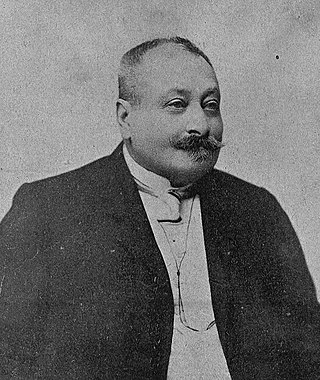 4
Walery Zygmunt Lucjan Przyborowski, ps. „Zygmunt Lucjan Sulima”, „Żelisław Krzywda" oraz "Wanda L." – polski historyk, pisarz, uczestnik powstania styczniowego (1863–1864).
4
Walery Zygmunt Lucjan Przyborowski, ps. „Zygmunt Lucjan Sulima”, „Żelisław Krzywda" oraz "Wanda L." – polski historyk, pisarz, uczestnik powstania styczniowego (1863–1864).
Wiktor Gomulicki
 4
Wiktor Teofil Gomulicki was a Polish poet, novelist and essayist. He was also a major advocate of Positivism.
4
Wiktor Teofil Gomulicki was a Polish poet, novelist and essayist. He was also a major advocate of Positivism.
Ivan Michurin (biologist)
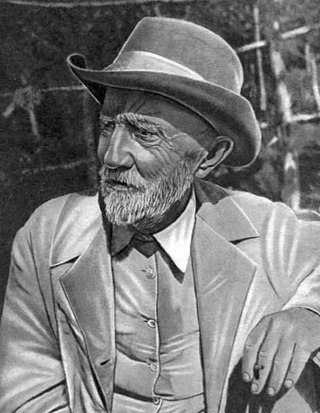 4
Ivan Vladimirovich Michurin was a Russian practitioner of selection to produce new types of crop plants, Honorable Member of the Soviet Academy of Sciences, and academician of the Lenin All-Union...
4
Ivan Vladimirovich Michurin was a Russian practitioner of selection to produce new types of crop plants, Honorable Member of the Soviet Academy of Sciences, and academician of the Lenin All-Union...
Casimir Funk
 4
Casimir Funk was a Polish biochemist generally credited with being among the first to formulate the concept of vitamins after publishing a landmark medical writing in 1912. He highlighted these...
4
Casimir Funk was a Polish biochemist generally credited with being among the first to formulate the concept of vitamins after publishing a landmark medical writing in 1912. He highlighted these...
Paweł Steller
 4
Paweł Steller – artysta plastyk, uczeń Władysława Skoczylasa.
4
Paweł Steller – artysta plastyk, uczeń Władysława Skoczylasa.
Walenty Fojkis
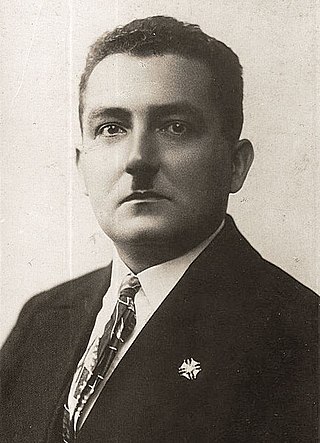 4
Włodzimierz Walenty Fojkis – polski działacz narodowy na Górnym Śląsku.
4
Włodzimierz Walenty Fojkis – polski działacz narodowy na Górnym Śląsku.
Jędrzej Moraczewski
 4
Jędrzej Edward Moraczewski was a Polish socialist politician who, loyal to Józef Piłsudski and viewed as acceptable by both left- and right-wing Polish political factions, served as the second Prime...
4
Jędrzej Edward Moraczewski was a Polish socialist politician who, loyal to Józef Piłsudski and viewed as acceptable by both left- and right-wing Polish political factions, served as the second Prime...
Dietrich Hrabak
 4
Dietrich "Dieter" Hrabak was a German Luftwaffe military aviator and wing commander during World War II. Following the war, he became a Generalmajor in the German Air Force of West Germany. As a...
4
Dietrich "Dieter" Hrabak was a German Luftwaffe military aviator and wing commander during World War II. Following the war, he became a Generalmajor in the German Air Force of West Germany. As a...
Józef Czempiel
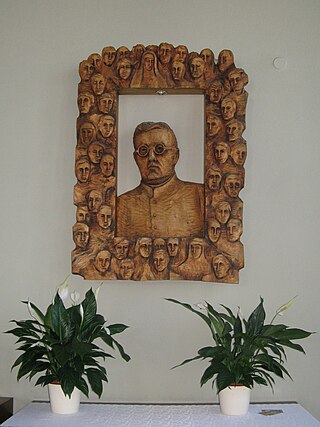 4
Józef Czempiel was a Polish Roman Catholic priest, activist. He was murdered in Dachau concentration camp.
4
Józef Czempiel was a Polish Roman Catholic priest, activist. He was murdered in Dachau concentration camp.
Marian Hemar
 4
Marian Hemar (1901–1972), born Marian Hescheles, was a Polish poet, journalist, playwright, comedy writer, and songwriter. Hemar himself stated that before the outbreak of World War II he had already...
4
Marian Hemar (1901–1972), born Marian Hescheles, was a Polish poet, journalist, playwright, comedy writer, and songwriter. Hemar himself stated that before the outbreak of World War II he had already...
Józef Sierakowski (dyplomata)
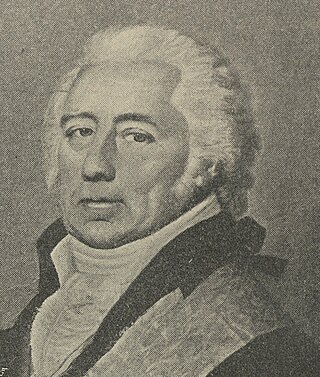 4
Józef Sierakowski – polski historyk i polityk, radca stanu, członek Komisji Najwyższej Egzaminacyjnej w Królestwie w 1829 roku.
4
Józef Sierakowski – polski historyk i polityk, radca stanu, członek Komisji Najwyższej Egzaminacyjnej w Królestwie w 1829 roku.
Władysław Bartoszewski
 4
Władysław Bartoszewski was a Polish politician, social activist, journalist, writer and historian. A former Auschwitz concentration camp prisoner, he was a World War II resistance fighter as part of...
4
Władysław Bartoszewski was a Polish politician, social activist, journalist, writer and historian. A former Auschwitz concentration camp prisoner, he was a World War II resistance fighter as part of...
Henryk Sławik
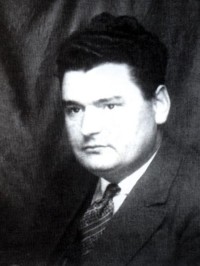 4
Henryk Sławik was a Polish politician in the interwar period, social worker, activist, and diplomat, who during World War II helped save over 30,000 Polish refugees, including 5,000 Polish Jews in...
4
Henryk Sławik was a Polish politician in the interwar period, social worker, activist, and diplomat, who during World War II helped save over 30,000 Polish refugees, including 5,000 Polish Jews in...
Jan Andrzej Morsztyn
 4
Jan Andrzej Morsztyn (1621–93) was a Polish poet, member of the landed nobility, and official in the Polish–Lithuanian Commonwealth. He was starosta of Zawichost, Tymbark and Kowal. He was also...
4
Jan Andrzej Morsztyn (1621–93) was a Polish poet, member of the landed nobility, and official in the Polish–Lithuanian Commonwealth. He was starosta of Zawichost, Tymbark and Kowal. He was also...
Henryk Baron
 4
Henryk Baron ps. „Smukły”, „Garbarz” – polski działacz socjalistyczny. Członek Organizacji Bojowej PPS. Uczestnik wielu akcji zbrojnych. Stracony na Cytadeli w 1907.
4
Henryk Baron ps. „Smukły”, „Garbarz” – polski działacz socjalistyczny. Członek Organizacji Bojowej PPS. Uczestnik wielu akcji zbrojnych. Stracony na Cytadeli w 1907.
Tadeusz Breza
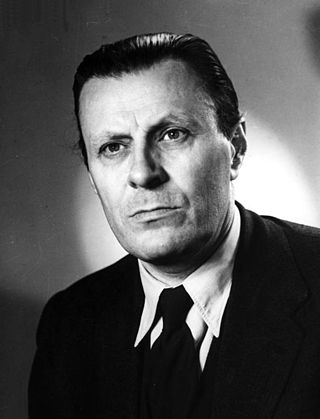 4
Tadeusz Breza – powieściopisarz i eseista, a także dyplomata w służbie II Rzeczypospolitej Polskiej oraz Polskiej Rzeczypospolitej Ludowej.
4
Tadeusz Breza – powieściopisarz i eseista, a także dyplomata w służbie II Rzeczypospolitej Polskiej oraz Polskiej Rzeczypospolitej Ludowej.
Ursula Ledóchowska
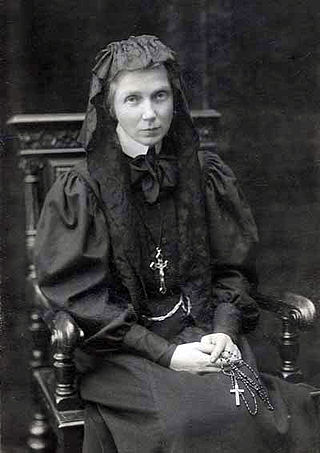 4
Julia Ledóchowska, USAHJ, religious name Maria Ursula of Jesus, was a religious sister and the foundress of the Ursulines of the Agonizing Heart of Jesus. Ledóchowska was a prolific supporter of...
4
Julia Ledóchowska, USAHJ, religious name Maria Ursula of Jesus, was a religious sister and the foundress of the Ursulines of the Agonizing Heart of Jesus. Ledóchowska was a prolific supporter of...
Julian Skokowski
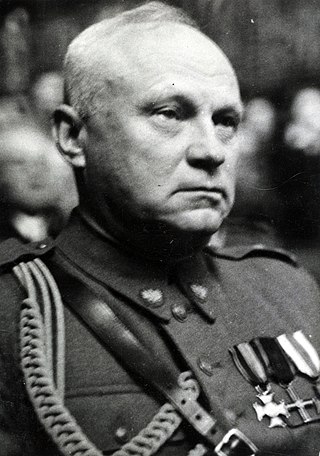 4
Julian Skokowski, ps. „Zaborski”, „Sulima” − generał brygady ludowego Wojska Polskiego. Komendant Polskiej Armii Ludowej podczas powstania warszawskiego. Więzień stalinowski.
4
Julian Skokowski, ps. „Zaborski”, „Sulima” − generał brygady ludowego Wojska Polskiego. Komendant Polskiej Armii Ludowej podczas powstania warszawskiego. Więzień stalinowski.
Mieczysław Słaby
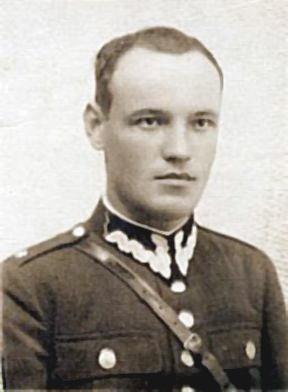 4
Mieczysław Mikołaj Słaby – was an officer and medic in the Polish Army during the Invasion of Poland, notably during the Battle of Westerplatte. He was posthumously awarded the Order of Virtuti...
4
Mieczysław Mikołaj Słaby – was an officer and medic in the Polish Army during the Invasion of Poland, notably during the Battle of Westerplatte. He was posthumously awarded the Order of Virtuti...
Józef Czyżewski (działacz narodowy)
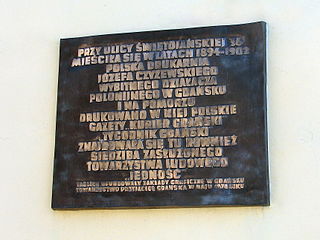 4
Józef Czyżewski – polski drukarz, działacz narodowy w Gdańsku.
4
Józef Czyżewski – polski drukarz, działacz narodowy w Gdańsku.
Gregory of Sanok
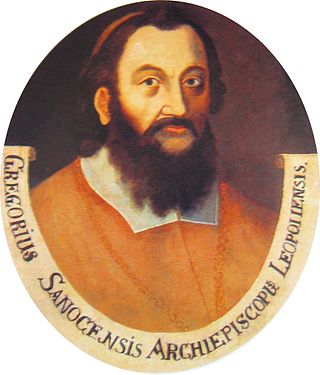 4
Gregory of Sanok was a Polish bishop, a professor at the Kraków Academy, metropolitan archbishop of Lwów, scholar, philosopher and a major figure of Polish humanism.
4
Gregory of Sanok was a Polish bishop, a professor at the Kraków Academy, metropolitan archbishop of Lwów, scholar, philosopher and a major figure of Polish humanism.
Stanisława Walasiewicz
 4
Stanisława Walasiewicz, also known as Stefania Walasiewicz, and Stella Walsh, was a Polish-American track and field athlete, who became a women's Olympic champion in the 100 metres. Born in Poland...
4
Stanisława Walasiewicz, also known as Stefania Walasiewicz, and Stella Walsh, was a Polish-American track and field athlete, who became a women's Olympic champion in the 100 metres. Born in Poland...
Józef Łukaszewicz (matematyk)
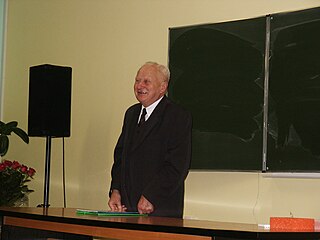 4
Józef Łukaszewicz – polski matematyk, żołnierz Armii Krajowej, profesor i rektor Uniwersytetu Wrocławskiego w latach 1981–1982, działacz katolicki.
4
Józef Łukaszewicz – polski matematyk, żołnierz Armii Krajowej, profesor i rektor Uniwersytetu Wrocławskiego w latach 1981–1982, działacz katolicki.
Leon Frankowski
 4
Leon Frankowski, komisarz Rządu Narodowego w województwie lubelskim do lutego 1863 roku, dowódca oddziału w powstaniu styczniowym.
4
Leon Frankowski, komisarz Rządu Narodowego w województwie lubelskim do lutego 1863 roku, dowódca oddziału w powstaniu styczniowym.
Jan Wantuła
 4
Jan Wantuła, ps. Jan Gojański – polski ślusarz hutniczy, sadownik, pisarz ludowy i bibliofil.
4
Jan Wantuła, ps. Jan Gojański – polski ślusarz hutniczy, sadownik, pisarz ludowy i bibliofil.
Stefan Skoczylas
 4
Stefan Skoczylas, ps. Piotr Giela, Piotr Konar – polski wydawca i redaktor prasy podziemnej, komendant podokręgu Siedlce Okręgu Lublin Batalionów Chłopskich, pośmiertnie awansowany do stopnia...
4
Stefan Skoczylas, ps. Piotr Giela, Piotr Konar – polski wydawca i redaktor prasy podziemnej, komendant podokręgu Siedlce Okręgu Lublin Batalionów Chłopskich, pośmiertnie awansowany do stopnia...
Alexander Jagiellon
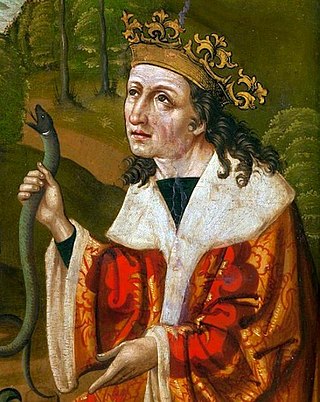 4
Alexander Jagiellon of the House of Jagiellon was Grand Duke of Lithuania from 1492 and King of Poland from 1501 until his death in 1506. He was the fourth son of Casimir IV Jagiellon. He was elected...
4
Alexander Jagiellon of the House of Jagiellon was Grand Duke of Lithuania from 1492 and King of Poland from 1501 until his death in 1506. He was the fourth son of Casimir IV Jagiellon. He was elected...
Ludwika Wawrzyńska
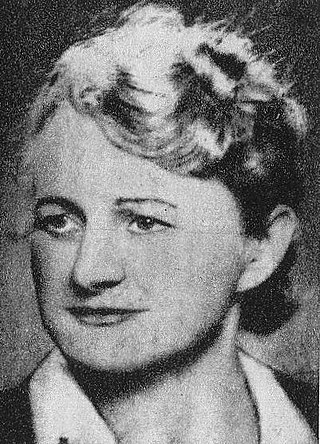 4
Ludwika Wawrzyńska was a Polish teacher who worked at an elementary school in Warsaw. On February 8, 1955 she rescued four children from a burning house where they had been locked by their parents as...
4
Ludwika Wawrzyńska was a Polish teacher who worked at an elementary school in Warsaw. On February 8, 1955 she rescued four children from a burning house where they had been locked by their parents as...
Władysław Zamoyski
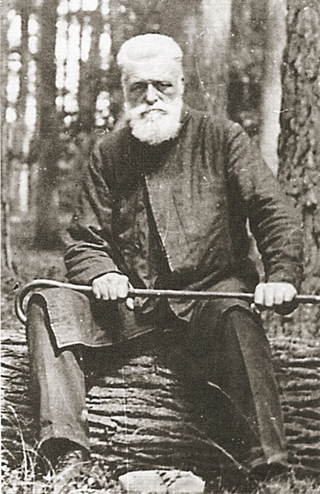 4
Count Władysław Zamoyski (1853–1924) was a French-born Polish nobleman (szlachcic), diplomat and heir of Kórnik, Głuchów, Janusz, Babin and Bargów. Having acquired estates on the Polish side of the...
4
Count Władysław Zamoyski (1853–1924) was a French-born Polish nobleman (szlachcic), diplomat and heir of Kórnik, Głuchów, Janusz, Babin and Bargów. Having acquired estates on the Polish side of the...
Ivan Krylov
 4
Ivan Andreyevich Krylov is Russia's best-known fabulist and probably the most epigrammatic of all Russian authors. Formerly a dramatist and journalist, he only discovered his true genre at the age of...
4
Ivan Andreyevich Krylov is Russia's best-known fabulist and probably the most epigrammatic of all Russian authors. Formerly a dramatist and journalist, he only discovered his true genre at the age of...
Józef Sarna
 4
Józef Sarna – podporucznik rezerwy piechoty Wojska Polskiego, dowódca obrony przeprawy przez Wisłę w pobliżu Tarnobrzega, w czasie kampanii wrześniowej 1939.
4
Józef Sarna – podporucznik rezerwy piechoty Wojska Polskiego, dowódca obrony przeprawy przez Wisłę w pobliżu Tarnobrzega, w czasie kampanii wrześniowej 1939.
Antoni Dobrowolski
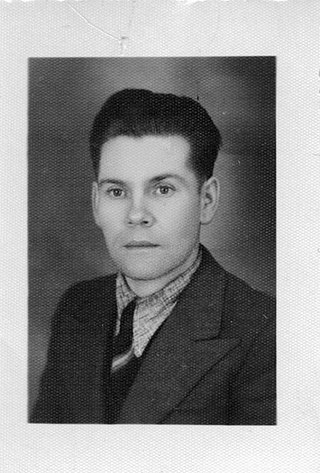 4
Antoni Dobrowolski was a Polish educator, teacher and Holocaust survivor. At the time of his death in 2012, Dobrowolski was the oldest known survivor of the Auschwitz concentration camp.
4
Antoni Dobrowolski was a Polish educator, teacher and Holocaust survivor. At the time of his death in 2012, Dobrowolski was the oldest known survivor of the Auschwitz concentration camp.
Teodora Gulgowska
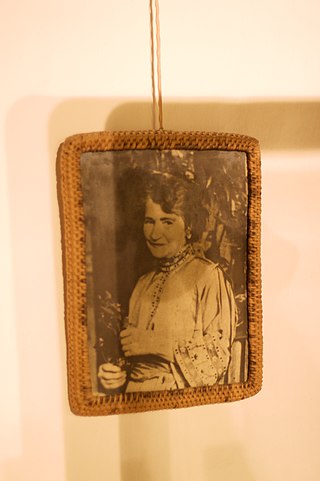 4
Teodora Gulgowska – malarka, aktywistka społeczna, animatorka kaszubskiej kultury i sztuki ludowej. Współzałożycielka pierwszego na terenie Polski skansenu – muzeum na świeżym powietrzu we Wdzydzach...
4
Teodora Gulgowska – malarka, aktywistka społeczna, animatorka kaszubskiej kultury i sztuki ludowej. Współzałożycielka pierwszego na terenie Polski skansenu – muzeum na świeżym powietrzu we Wdzydzach...
Marian Mokwa
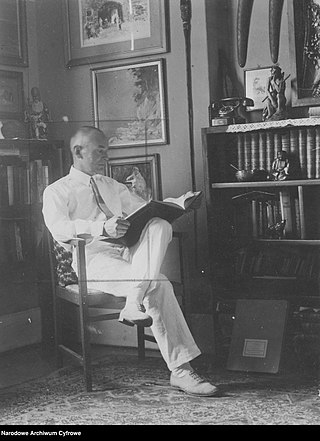 4
Marian Mokwa – polski malarz, podróżnik i działacz społeczny.
4
Marian Mokwa – polski malarz, podróżnik i działacz społeczny.
Józef Wysocki (general)
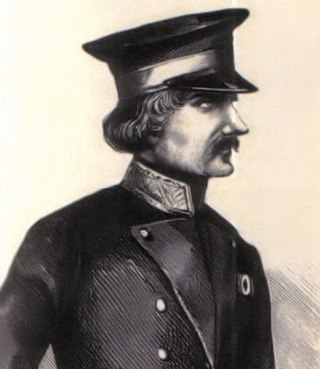 4
Józef Wysocki was a Polish general, soldier in the November Uprising of 1830, the Hungarian Revolution of 1848 and the January Uprising of 1863.
4
Józef Wysocki was a Polish general, soldier in the November Uprising of 1830, the Hungarian Revolution of 1848 and the January Uprising of 1863.
Dominic Savio
 4
Dominic Savio was an Italian student of John Bosco. He was studying to be a priest when he became ill and died at the age of 14, possibly from pleurisy. He was noted for his piety and devotion to the...
4
Dominic Savio was an Italian student of John Bosco. He was studying to be a priest when he became ill and died at the age of 14, possibly from pleurisy. He was noted for his piety and devotion to the...
Marcin Rożek
 4
Marcin Rożek was a Polish sculptor and painter and co-founder and professor at the School of Decorative Arts in Poznań. Rożek is most closely associated with the region of Greater Poland and the city...
4
Marcin Rożek was a Polish sculptor and painter and co-founder and professor at the School of Decorative Arts in Poznań. Rożek is most closely associated with the region of Greater Poland and the city...
Samuel C. Lind
 4
Samuel Colville Lind was a radiation chemist, referred to as "the father of modern radiation chemistry".
4
Samuel Colville Lind was a radiation chemist, referred to as "the father of modern radiation chemistry".
Zbigniew Burzyński
 4
Zbigniew Jan Władysław Antoni Burzyński, was a Polish balloonist and constructor of balloons, pioneer of Polish balloons, who twice won the Gordon Bennett Cup in ballooning, also beat the world...
4
Zbigniew Jan Władysław Antoni Burzyński, was a Polish balloonist and constructor of balloons, pioneer of Polish balloons, who twice won the Gordon Bennett Cup in ballooning, also beat the world...
Czesław Wycech
 4
Czesław Wycech (1899–1977) was a Polish activist, politician and historian. He was a member of the Polish peasant's parties: the Polish People's Party "Wyzwolenie", the People's Party, the Polish...
4
Czesław Wycech (1899–1977) was a Polish activist, politician and historian. He was a member of the Polish peasant's parties: the Polish People's Party "Wyzwolenie", the People's Party, the Polish...
Adam Rapacki
 4
Adam Rapacki was a leading Polish Communist politician and diplomat from 1947 to 1968. He started in the socialist movement but in 1948 joined the Central Committee of the new Polish United Workers'...
4
Adam Rapacki was a leading Polish Communist politician and diplomat from 1947 to 1968. He started in the socialist movement but in 1948 joined the Central Committee of the new Polish United Workers'...
Karol Adwentowicz
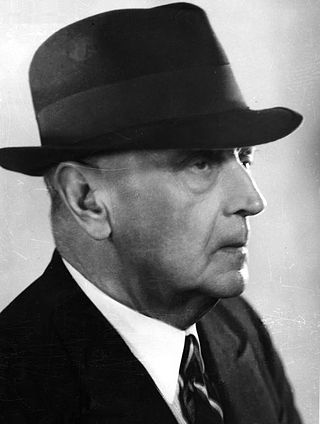 4
Karol Adwentowicz was a Polish actor and theater director. Adwentowicz fought in the Polish Legions in World War I, and upon the return of Poland's sovereignty, embarked on a hugely successful...
4
Karol Adwentowicz was a Polish actor and theater director. Adwentowicz fought in the Polish Legions in World War I, and upon the return of Poland's sovereignty, embarked on a hugely successful...
Rajmund Rembieliński
 4
Rajmund Rembieliński (1774–1841) was a Polish nobleman (szlachcic), political activist, and landowner.
4
Rajmund Rembieliński (1774–1841) was a Polish nobleman (szlachcic), political activist, and landowner.
Tytus Czyżewski
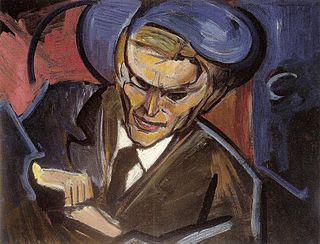 4
Tytus Czyżewski was a Polish painter, art theoretician, Futurist poet, playwright, member of the Polish Formists and a Colorist.
4
Tytus Czyżewski was a Polish painter, art theoretician, Futurist poet, playwright, member of the Polish Formists and a Colorist.
Nicholas von Renys
 4
Nicholas von Renys (1360–1411) was a secular member of the Teutonic Knights and a participant in the Polish–Lithuanian–Teutonic War (1409–1411). The Knights blamed him as a scapegoat for their defeat...
4
Nicholas von Renys (1360–1411) was a secular member of the Teutonic Knights and a participant in the Polish–Lithuanian–Teutonic War (1409–1411). The Knights blamed him as a scapegoat for their defeat...
Marian Żelazek
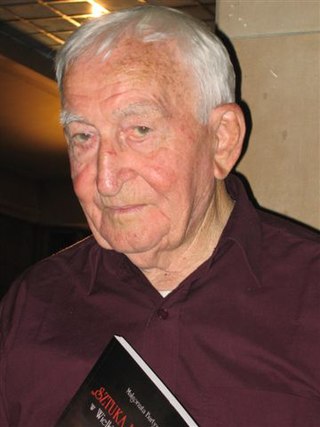 4
Marian Żelazek (1918–2006) was a Polish Roman Catholic priest of the Society of the Divine Word (SVD) who lived in India and served amongst the people of Orissa. He is remembered for his service and...
4
Marian Żelazek (1918–2006) was a Polish Roman Catholic priest of the Society of the Divine Word (SVD) who lived in India and served amongst the people of Orissa. He is remembered for his service and...
Julian Goslar
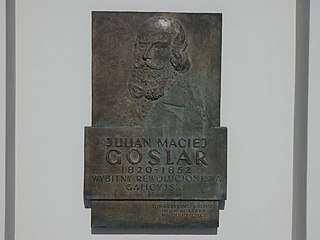 4
Julian Maciej Goslar – polski działacz rewolucyjny, uczestnik Wiosny Ludów, autor broszur politycznych i poezji więziennej. Uczestniczył w przygotowaniach do rewolucji 1846 w Rzeszowskiem i na...
4
Julian Maciej Goslar – polski działacz rewolucyjny, uczestnik Wiosny Ludów, autor broszur politycznych i poezji więziennej. Uczestniczył w przygotowaniach do rewolucji 1846 w Rzeszowskiem i na...
Bernard Wapowski
 4
Bernard Wapowski (1475-1535) was one of the earliest Polish cartographers and is credited for making the first detailed map of Poland in 1526. Wapowski is considered to be the "Father of Polish...
4
Bernard Wapowski (1475-1535) was one of the earliest Polish cartographers and is credited for making the first detailed map of Poland in 1526. Wapowski is considered to be the "Father of Polish...
Jadwiga Smosarska
 4
Jadwiga Smosarska was a Polish film actress. She appeared in more than 25 films between 1919 and 1937, as well as various stage productions.
4
Jadwiga Smosarska was a Polish film actress. She appeared in more than 25 films between 1919 and 1937, as well as various stage productions.
Józef Kapuściński
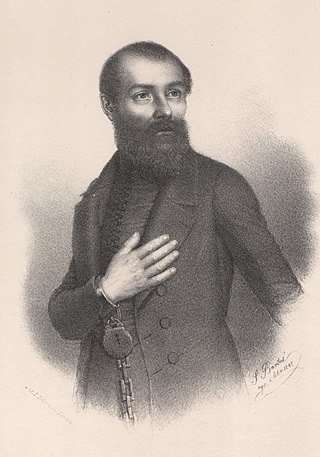 4
Józef Kapuściński – emisariusz Towarzystwa Demokratycznego Polskiego. Prowadził w okręgu Pilzno w Galicji przygotowania powstańcze, kierował m.in. atakiem na burmistrza Pilzna. Został ujęty, skazany...
4
Józef Kapuściński – emisariusz Towarzystwa Demokratycznego Polskiego. Prowadził w okręgu Pilzno w Galicji przygotowania powstańcze, kierował m.in. atakiem na burmistrza Pilzna. Został ujęty, skazany...
Andrzej Samulowski (poeta)
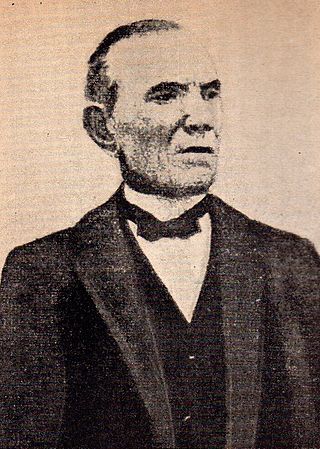 4
Andrzej Samulowski – warmiński poeta ludowy, działacz oświatowy i społeczny, nauczyciel, żył i pracował w Gietrzwałdzie, gdzie założył w 1878 r. pierwszą polską księgarnię na Warmii. Budynek ten...
4
Andrzej Samulowski – warmiński poeta ludowy, działacz oświatowy i społeczny, nauczyciel, żył i pracował w Gietrzwałdzie, gdzie założył w 1878 r. pierwszą polską księgarnię na Warmii. Budynek ten...
Ludwig van Beethoven
 4
Ludwig van Beethoven was a German composer and pianist. He is one of the most revered figures in the history of Western music; his works rank among the most performed of the classical music...
4
Ludwig van Beethoven was a German composer and pianist. He is one of the most revered figures in the history of Western music; his works rank among the most performed of the classical music...
Charles de Gaulle
 4
Charles André Joseph Marie de Gaulle was a French army officer and statesman who led the Free French Forces against Nazi Germany in World War II and chaired the Provisional Government of the French...
4
Charles André Joseph Marie de Gaulle was a French army officer and statesman who led the Free French Forces against Nazi Germany in World War II and chaired the Provisional Government of the French...
Kazimierz Bogdanowicz (powstaniec)
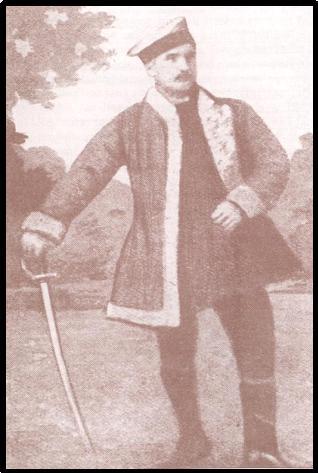 4
Kazimierz Józef Bogdanowicz herbu Łada – polski szlachcic, dowódca oddziału wojsk polskich w czasie powstania styczniowego.
4
Kazimierz Józef Bogdanowicz herbu Łada – polski szlachcic, dowódca oddziału wojsk polskich w czasie powstania styczniowego.
Jan Bytnar
 4
Jan Roman Bytnar, nom de guerre "Rudy" (Ginger) was a Polish scoutmaster, a member of Polish scouting anti-Nazi resistance, and a lieutenant in the Home Army during the Second World War.
4
Jan Roman Bytnar, nom de guerre "Rudy" (Ginger) was a Polish scoutmaster, a member of Polish scouting anti-Nazi resistance, and a lieutenant in the Home Army during the Second World War.
Karol Małłek
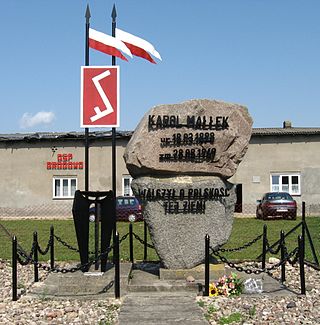 4
Karol Małłek – działacz mazurski, pisarz, folklorysta, publicysta i nauczyciel. Pochodził z rodziny polskiej.
4
Karol Małłek – działacz mazurski, pisarz, folklorysta, publicysta i nauczyciel. Pochodził z rodziny polskiej.
Saint Isidora
 4
Saint Isidora, or Saint Isidore, was a Christian nun and saint of the 4th century AD. She is considered among the earliest fools for Christ. While very little is known of Isidora's life, she is...
4
Saint Isidora, or Saint Isidore, was a Christian nun and saint of the 4th century AD. She is considered among the earliest fools for Christ. While very little is known of Isidora's life, she is...
Luke the Evangelist
 4
Luke the Evangelist is one of the Four Evangelists—the four traditionally ascribed authors of the canonical gospels. The Early Church Fathers ascribed to him authorship of both the Gospel of Luke and...
4
Luke the Evangelist is one of the Four Evangelists—the four traditionally ascribed authors of the canonical gospels. The Early Church Fathers ascribed to him authorship of both the Gospel of Luke and...
Mahatma Gandhi
 4
Mohandas Karamchand Gandhi was an Indian lawyer, anti-colonial nationalist and political ethicist who employed nonviolent resistance to lead the successful campaign for India's independence from...
4
Mohandas Karamchand Gandhi was an Indian lawyer, anti-colonial nationalist and political ethicist who employed nonviolent resistance to lead the successful campaign for India's independence from...
Joanna Chmielewska
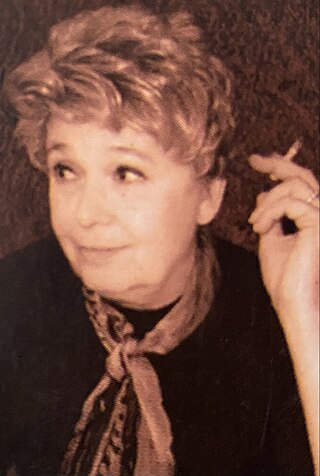 4
Joanna Chmielewska, was the pen name of Irena Kühn, a Polish novelist and screenwriter. Her work is often described as "ironic detective stories". Her novels, which have been translated into at least...
4
Joanna Chmielewska, was the pen name of Irena Kühn, a Polish novelist and screenwriter. Her work is often described as "ironic detective stories". Her novels, which have been translated into at least...
Mieczysław Fogg
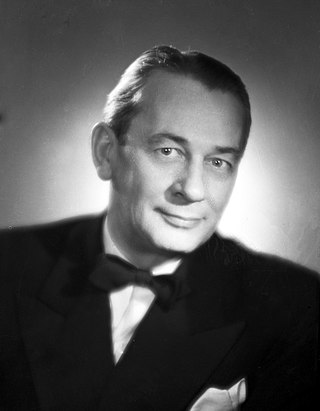 4
Mieczysław Fogg was a Polish singer and artist. His popularity started well before World War II and continued well into the 1980s. He had a characteristic way of staying very serious yet slightly...
4
Mieczysław Fogg was a Polish singer and artist. His popularity started well before World War II and continued well into the 1980s. He had a characteristic way of staying very serious yet slightly...
Mamert Stankiewicz
 4
Mamert Stankiewicz was a Polish naval officer of the merchant marine, the commander of Lwów, Polonia and finally captain of the Polish ocean liner Piłsudski, which was incorporated into the UK Royal...
4
Mamert Stankiewicz was a Polish naval officer of the merchant marine, the commander of Lwów, Polonia and finally captain of the Polish ocean liner Piłsudski, which was incorporated into the UK Royal...
Bogumił Kobiela
 4
Bogumił Kobiela was a Polish stage and film actor. He is best known for his performances as Drewnowski in Andrzej Wajda's 1958 drama film Ashes and Diamonds and as Jan Piszczyk in Andrzej Munk's...
4
Bogumił Kobiela was a Polish stage and film actor. He is best known for his performances as Drewnowski in Andrzej Wajda's 1958 drama film Ashes and Diamonds and as Jan Piszczyk in Andrzej Munk's...
Homer
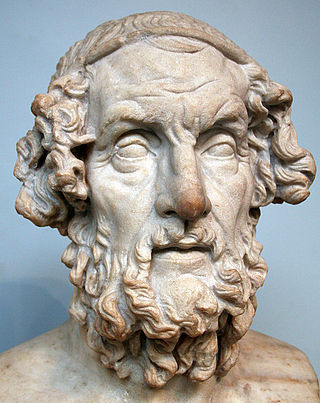 4
Homer was a Greek poet who is credited as the author of the Iliad and the Odyssey, two epic poems that are foundational works of ancient Greek literature. Homer is considered one of the most revered...
4
Homer was a Greek poet who is credited as the author of the Iliad and the Odyssey, two epic poems that are foundational works of ancient Greek literature. Homer is considered one of the most revered...
Andrzej Grubba
 4
Andrzej Stanisław Grubba was a Polish table tennis player.
4
Andrzej Stanisław Grubba was a Polish table tennis player.
Anna Dorota Chrzanowska
 4
Anna Dorota Chrzanowska née von Fresen, was a Polish heroine of the Polish–Ottoman War (1672–76), known for her acts during the Battle of Trembowla in 1675.
4
Anna Dorota Chrzanowska née von Fresen, was a Polish heroine of the Polish–Ottoman War (1672–76), known for her acts during the Battle of Trembowla in 1675.
Michał Marian Siedlecki
 4
Michał Marian Siedlecki was a Polish zoologist.
4
Michał Marian Siedlecki was a Polish zoologist.
Franciszek Morawski
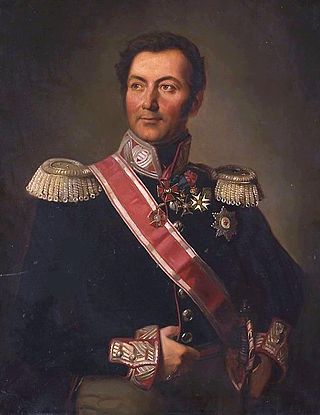 4
Franciszek Dzierżykraj Morawski was a divisional general in the Polish army, a minister of war during the November Uprising, poet, literary critic, translator, and playwright.
4
Franciszek Dzierżykraj Morawski was a divisional general in the Polish army, a minister of war during the November Uprising, poet, literary critic, translator, and playwright.
Maćko z Bogdańca
 4
Maćko z Bogdańca – fikcyjna postać z powieści Krzyżacy H. Sienkiewicza; rycerz, stryj i opiekun Zbyszka, marzący o odbudowie rodowej posiadłości w Bogdańcu.
4
Maćko z Bogdańca – fikcyjna postać z powieści Krzyżacy H. Sienkiewicza; rycerz, stryj i opiekun Zbyszka, marzący o odbudowie rodowej posiadłości w Bogdańcu.
Włodzimierz Perzyński
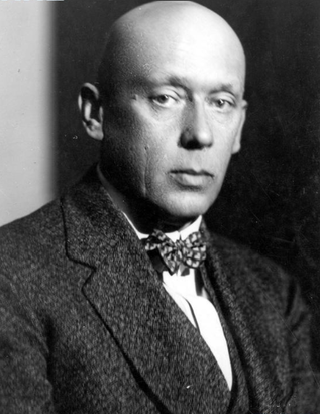 3
Włodzimierz Perzyński was a Polish writer and dramatist, who was a member of the Young Poland movement. His most famous plays include Lekkomyślna siostra (1907), Aszantka (1906), and Szczęście Frania...
3
Włodzimierz Perzyński was a Polish writer and dramatist, who was a member of the Young Poland movement. His most famous plays include Lekkomyślna siostra (1907), Aszantka (1906), and Szczęście Frania...
Stanisław Henryk Józef Więckowski
 3
Stanisław Henryk Józef Więckowski – pułkownik artylerii Wojska Polskiego.
3
Stanisław Henryk Józef Więckowski – pułkownik artylerii Wojska Polskiego.
Ludwik Michał Pac
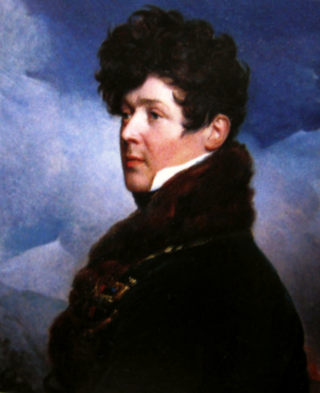 3
Count Ludwik Michał Pac was a France-born commander in the Grande Armée, the Army of the Duchy of Warsaw and the Uprising of 1831. Depending on the source, he is called Lithuanian or Polish. He was...
3
Count Ludwik Michał Pac was a France-born commander in the Grande Armée, the Army of the Duchy of Warsaw and the Uprising of 1831. Depending on the source, he is called Lithuanian or Polish. He was...
Roald Amundsen
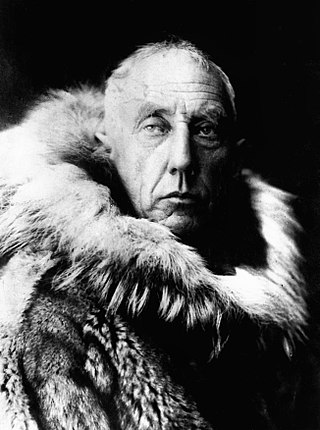 3
Roald Engelbregt Gravning Amundsen was a Norwegian explorer of polar regions. He was a key figure of the period known as the Heroic Age of Antarctic Exploration.
3
Roald Engelbregt Gravning Amundsen was a Norwegian explorer of polar regions. He was a key figure of the period known as the Heroic Age of Antarctic Exploration.
Icchok Malmed
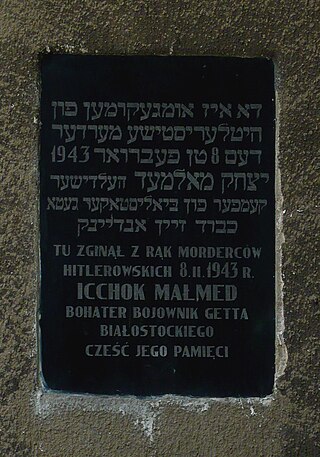 3
Icchok Malmed was a Polish Jew and fighter of the Białystok Ghetto during the German occupation of Poland in World War II.
3
Icchok Malmed was a Polish Jew and fighter of the Białystok Ghetto during the German occupation of Poland in World War II.
Rosa Luxemburg
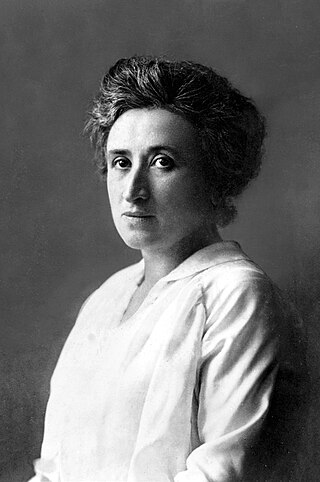 3
Rosa Luxemburg was a Polish and naturalised-German revolutionary socialist, orthodox Marxist, and anti-War activist during the First World War. She became a key figure of the revolutionary socialist...
3
Rosa Luxemburg was a Polish and naturalised-German revolutionary socialist, orthodox Marxist, and anti-War activist during the First World War. She became a key figure of the revolutionary socialist...
Tadeusz Romanowicz
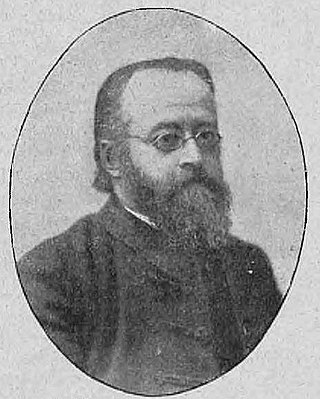 3
Tadeusz Romanowicz – polski literat, polityk demokratyczny, poseł na galicyjski Sejm Krajowy i do austriackiej Rady Państwa, członek stowarzyszeń konspiracyjnych w Galicji, powstaniec styczniowy,...
3
Tadeusz Romanowicz – polski literat, polityk demokratyczny, poseł na galicyjski Sejm Krajowy i do austriackiej Rady Państwa, członek stowarzyszeń konspiracyjnych w Galicji, powstaniec styczniowy,...
Ludomił Rayski
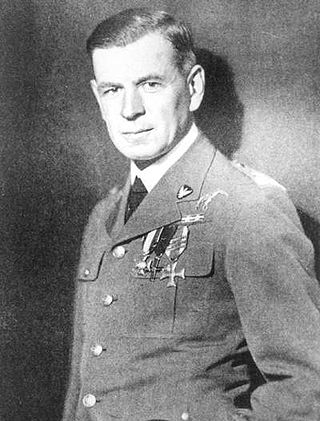 3
Ludomił Antoni Rayski was a Polish engineer, pilot, military officer and aviator. He served as the commander of the Polish Air Force between 1926 and 1939, being responsible for modernization of...
3
Ludomił Antoni Rayski was a Polish engineer, pilot, military officer and aviator. He served as the commander of the Polish Air Force between 1926 and 1939, being responsible for modernization of...
Zygmunt Moczyński
 3
Zygmunt Moczyński – pedagog muzyczny, kompozytor, dyrygent, przywódca pomorskiej organizacji konspiracyjnej Batalion Śmierci za Wolność w latach 1939–1940.
3
Zygmunt Moczyński – pedagog muzyczny, kompozytor, dyrygent, przywódca pomorskiej organizacji konspiracyjnej Batalion Śmierci za Wolność w latach 1939–1940.
Jan Konstanty Żupański
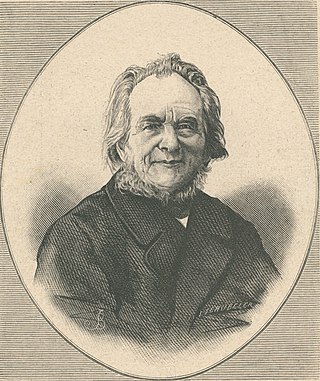 3
Jan Konstanty Żupański – polski księgarz i wydawca.
3
Jan Konstanty Żupański – polski księgarz i wydawca.
Józef Pukowiec
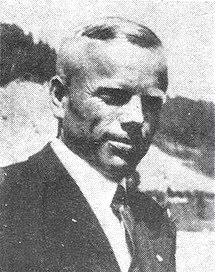 3
Józef Pukowiec codename: Chmura, Pukoc was a Polish teacher, scoutmaster, and Polish resistance activist during the Second World War.
3
Józef Pukowiec codename: Chmura, Pukoc was a Polish teacher, scoutmaster, and Polish resistance activist during the Second World War.
Władysław Nehring
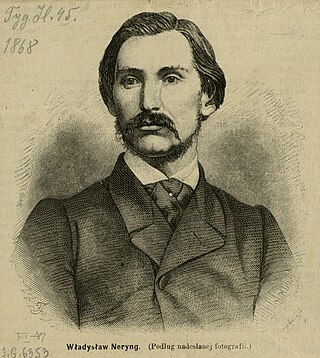 3
Władysław Nehring – polski językoznawca i historyk, badacz języka starosłowiańskiego, autor prac naukowych i popularnonaukowych z dziedziny historii Słowian i gramatyki języków słowiańskich.
3
Władysław Nehring – polski językoznawca i historyk, badacz języka starosłowiańskiego, autor prac naukowych i popularnonaukowych z dziedziny historii Słowian i gramatyki języków słowiańskich.
Józef Dietl
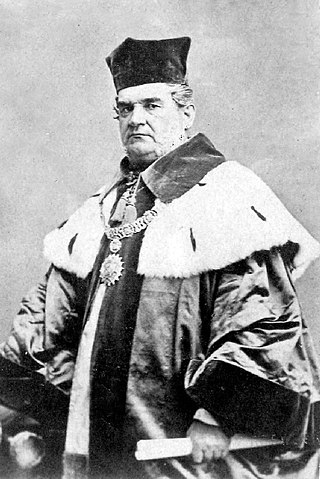 3
Józef Dietl was an Austro-Polish physician born to an Austrian father and Polish mother. He studied medicine in Lviv and Vienna. He was a pioneer in balneology, and a professor of Jagiellonian...
3
Józef Dietl was an Austro-Polish physician born to an Austrian father and Polish mother. He studied medicine in Lviv and Vienna. He was a pioneer in balneology, and a professor of Jagiellonian...
Franciszek Jan Smolka
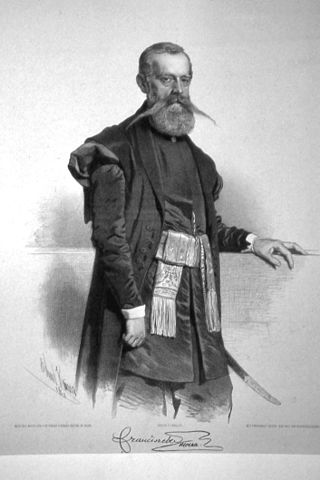 3
Franciszek Jan Smolka – polski prawnik, działacz tajnych organizacji niepodległościowych, polityk demokratyczny i liberalny, działacz społeczny, prezydent Sejmu Ustawodawczego w Kromieryżu i...
3
Franciszek Jan Smolka – polski prawnik, działacz tajnych organizacji niepodległościowych, polityk demokratyczny i liberalny, działacz społeczny, prezydent Sejmu Ustawodawczego w Kromieryżu i...
Władysław Umiński
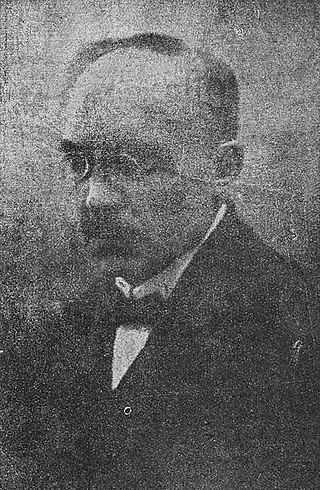 3
Władysław Jan Umiński – polski pisarz i eseista tworzący w nurcie powieści przygodowej oraz fantastyki naukowej, popularnie nazywany „polskim Juliuszem Verne’em”, przyrodnik. Jego twórczość zawierała...
3
Władysław Jan Umiński – polski pisarz i eseista tworzący w nurcie powieści przygodowej oraz fantastyki naukowej, popularnie nazywany „polskim Juliuszem Verne’em”, przyrodnik. Jego twórczość zawierała...
Edward Wittig
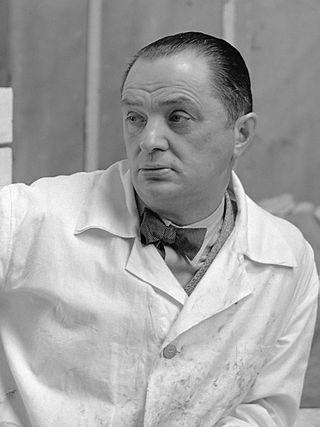 3
Edward Wittig was a Polish sculptor and university professor, notable for designing many monuments in Warsaw.
3
Edward Wittig was a Polish sculptor and university professor, notable for designing many monuments in Warsaw.
Leon Wetmański
 3
Leon Wetmański was a Polish Catholic auxiliary Bishop of the Płock diocese who was killed in Soldau concentration camp. He was beatified in 1999 as one of the 108 Blessed Polish Martyrs.
3
Leon Wetmański was a Polish Catholic auxiliary Bishop of the Płock diocese who was killed in Soldau concentration camp. He was beatified in 1999 as one of the 108 Blessed Polish Martyrs.
Zygmunt Działowski
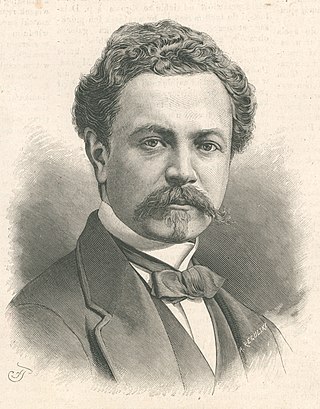 3
Zygmunt Działowski herbu Prawdzic albo Zygmunt Prawdzic – polski ziemianin, polityk, archeolog, pochodzący z Działowa, mieszkający w Mgowie; działający w Toruniu. Przedstawiciel znanej rodziny...
3
Zygmunt Działowski herbu Prawdzic albo Zygmunt Prawdzic – polski ziemianin, polityk, archeolog, pochodzący z Działowa, mieszkający w Mgowie; działający w Toruniu. Przedstawiciel znanej rodziny...
Clara Zetkin
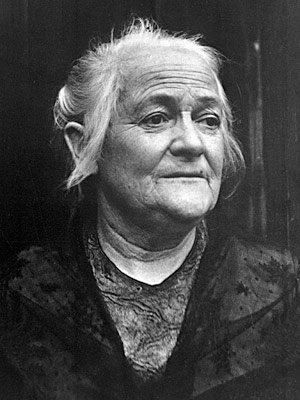 3
Clara Zetkin was a German Marxist theorist, communist activist, and advocate for women's rights.
3
Clara Zetkin was a German Marxist theorist, communist activist, and advocate for women's rights.
Stanisław Dygat
 3
Stanisław Dygat was a Polish writer. His most famous novel, "Jezioro Bodeńskie", was written during World War II and published in 1946. All of his works are partly autobiographical.
3
Stanisław Dygat was a Polish writer. His most famous novel, "Jezioro Bodeńskie", was written during World War II and published in 1946. All of his works are partly autobiographical.
Helena Boguszewska
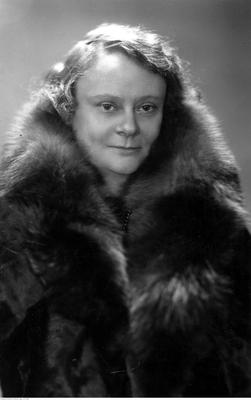 3
Helena Boguszewska, née Radlińska (1883–1978) was a Polish writer, columnist and a social activist.
3
Helena Boguszewska, née Radlińska (1883–1978) was a Polish writer, columnist and a social activist.
Zenon Kosidowski
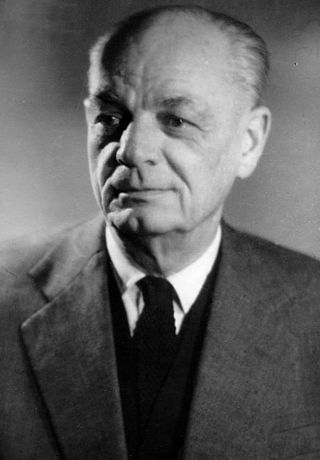 3
Zenon Alojzy Kosidowski – polski pisarz, eseista, poeta.
3
Zenon Alojzy Kosidowski – polski pisarz, eseista, poeta.
Leopold Tyrmand
 3
Leopold Tyrmand was a Polish novelist, writer, and editor. Tyrmand emigrated from Poland to the United States in 1966 and five years later married an American, Mary Ellen Fox. He served as editor of...
3
Leopold Tyrmand was a Polish novelist, writer, and editor. Tyrmand emigrated from Poland to the United States in 1966 and five years later married an American, Mary Ellen Fox. He served as editor of...
Władysław Anczyc
 3
Władysław Marceli Anczyc – polski współwłaściciel drukarni, filolog, muzykolog, pianista, geolog oraz taternik, działacz sportowy i kapitan Wojska Polskiego.
3
Władysław Marceli Anczyc – polski współwłaściciel drukarni, filolog, muzykolog, pianista, geolog oraz taternik, działacz sportowy i kapitan Wojska Polskiego.
Teodor Parnicki
 3
Teodor Parnicki (1908–1988) was a Polish writer, notable for his historical novels. He is especially renowned for works related to the early medieval Middle East, the late Roman and the Byzantine...
3
Teodor Parnicki (1908–1988) was a Polish writer, notable for his historical novels. He is especially renowned for works related to the early medieval Middle East, the late Roman and the Byzantine...
Honoré de Balzac
 3
Honoré de Balzac was a French novelist and playwright. The novel sequence La Comédie humaine, which presents a panorama of post-Napoleonic French life, is generally viewed as his magnum opus.
3
Honoré de Balzac was a French novelist and playwright. The novel sequence La Comédie humaine, which presents a panorama of post-Napoleonic French life, is generally viewed as his magnum opus.
Roman Zmorski
 3
Roman Zmorski, piszący również pod pseudonimami Roman Mazur oraz Roman Zamarski – polski poeta, tłumacz i folklorysta epoki romantyzmu, najwybitniejszy przedstawiciel tzw. Cyganerii Warszawskiej;...
3
Roman Zmorski, piszący również pod pseudonimami Roman Mazur oraz Roman Zamarski – polski poeta, tłumacz i folklorysta epoki romantyzmu, najwybitniejszy przedstawiciel tzw. Cyganerii Warszawskiej;...
Witold Wojtkiewicz
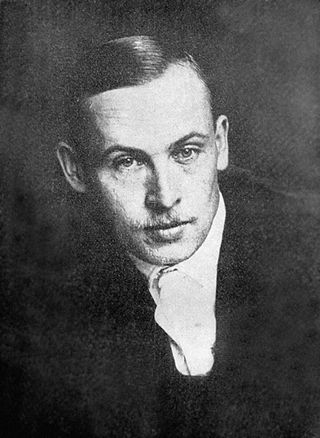 3
Witold Wojtkiewicz was a Polish painter, illustrator and printmaker. Although generally considered an Expressionist, some of his works are precursors of Surrealism.
3
Witold Wojtkiewicz was a Polish painter, illustrator and printmaker. Although generally considered an Expressionist, some of his works are precursors of Surrealism.
Leonardo da Vinci
 3
Leonardo di ser Piero da Vinci was an Italian polymath of the High Renaissance who was active as a painter, draughtsman, engineer, scientist, theorist, sculptor, and architect. While his fame...
3
Leonardo di ser Piero da Vinci was an Italian polymath of the High Renaissance who was active as a painter, draughtsman, engineer, scientist, theorist, sculptor, and architect. While his fame...
Tadeusz Miciński
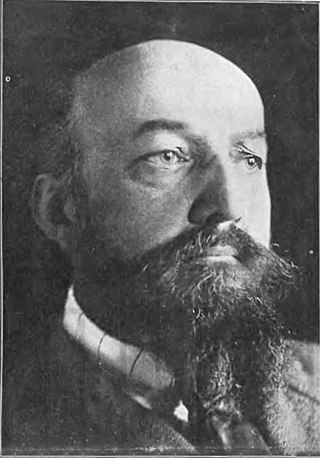 3
Tadeusz Miciński was an influential Polish poet, gnostic and playwright, and was a forerunner of Expressionism and Surrealism. He is one of the writers of the Young Poland period. His writings are...
3
Tadeusz Miciński was an influential Polish poet, gnostic and playwright, and was a forerunner of Expressionism and Surrealism. He is one of the writers of the Young Poland period. His writings are...
Franciszek Juszczak
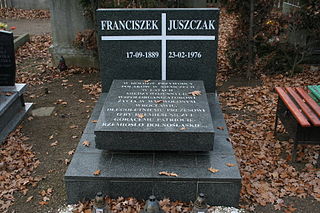 3
Franciszek Juszczak – działacz polonijny związany z Wrocławiem i Dolnym Śląskiem, w latach 1922–1939 kierownik wrocławskiego oddziału Związku Polaków w Niemczech.
3
Franciszek Juszczak – działacz polonijny związany z Wrocławiem i Dolnym Śląskiem, w latach 1922–1939 kierownik wrocławskiego oddziału Związku Polaków w Niemczech.
Jean-Pierre Norblin de La Gourdaine
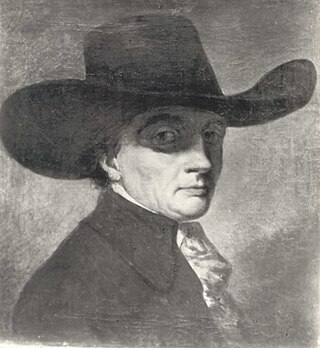 3
Jean-Pierre Norblin de La Gourdaine was a French painter, draughtsman, engraver and caricaturist. Born in France, from 1774 to 1796 he resided in Poland.
3
Jean-Pierre Norblin de La Gourdaine was a French painter, draughtsman, engraver and caricaturist. Born in France, from 1774 to 1796 he resided in Poland.
Czesław Klimas
 3
Czesław Klimas – ksiądz i działacz polski na Śląsku, poseł do sejmu pruskiego Republiki Weimarskiej.
3
Czesław Klimas – ksiądz i działacz polski na Śląsku, poseł do sejmu pruskiego Republiki Weimarskiej.
Ivan Pavlov
 3
Ivan Petrovich Pavlov was a Russian and Soviet experimental neurologist and physiologist known for his discovery of classical conditioning through his experiments with dogs.
3
Ivan Petrovich Pavlov was a Russian and Soviet experimental neurologist and physiologist known for his discovery of classical conditioning through his experiments with dogs.
Frédéric Joliot-Curie
 3
Jean Frédéric Joliot-Curie was a French physicist and husband of Irène Joliot-Curie, with whom he was jointly awarded the Nobel Prize in Chemistry in 1935 for their discovery of induced...
3
Jean Frédéric Joliot-Curie was a French physicist and husband of Irène Joliot-Curie, with whom he was jointly awarded the Nobel Prize in Chemistry in 1935 for their discovery of induced...
Mieczysław Halka-Ledóchowski
Kazimierz Bartel
 3
Kazimierz Władysław Bartel was a Polish mathematician, freemason, scholar, diplomat and politician who served as 15th, 17th and 19th Prime Minister of Poland three times between 1926 and 1930 and the...
3
Kazimierz Władysław Bartel was a Polish mathematician, freemason, scholar, diplomat and politician who served as 15th, 17th and 19th Prime Minister of Poland three times between 1926 and 1930 and the...
Artur Oppman
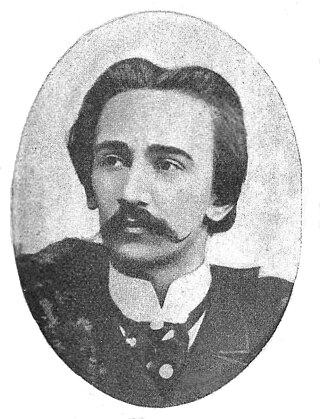 3
Artur Franciszek Oppman was a Young Poland poet who wrote under the pen name "Or-Ot".
3
Artur Franciszek Oppman was a Young Poland poet who wrote under the pen name "Or-Ot".
Maciej Miechowita
 3
Maciej Miechowita was a Polish renaissance scholar, professor of Jagiellonian University, historian, chronicler, geographer, medical doctor, alchemist, astrologer and canon in Kraków.
3
Maciej Miechowita was a Polish renaissance scholar, professor of Jagiellonian University, historian, chronicler, geographer, medical doctor, alchemist, astrologer and canon in Kraków.
Jan Styczyński (lekarz)
 3
Jan Roman Styczyński – lekarz, nauczyciel akademicki, dr hab. nauk medycznych, profesor zwyczajny Wydziału Lekarskiego i Katedry Pediatrii, Hematologii i Onkologii Collegium Medicum im. Ludwika...
3
Jan Roman Styczyński – lekarz, nauczyciel akademicki, dr hab. nauk medycznych, profesor zwyczajny Wydziału Lekarskiego i Katedry Pediatrii, Hematologii i Onkologii Collegium Medicum im. Ludwika...
Danuta Szaflarska
 3
Danuta Szaflarska was a Polish film and stage actress. In 2008 she was awarded the Złota Kaczka for the best Polish actress of the century. Szaflarska participated in the Warsaw Uprising as a...
3
Danuta Szaflarska was a Polish film and stage actress. In 2008 she was awarded the Złota Kaczka for the best Polish actress of the century. Szaflarska participated in the Warsaw Uprising as a...
Giuseppe Garibaldi
 3
Giuseppe Maria Garibaldi was an Italian general, patriot, revolutionary and republican. He contributed to Italian unification (Risorgimento) and the creation of the Kingdom of Italy. He is considered...
3
Giuseppe Maria Garibaldi was an Italian general, patriot, revolutionary and republican. He contributed to Italian unification (Risorgimento) and the creation of the Kingdom of Italy. He is considered...
Czesław Witoszyński
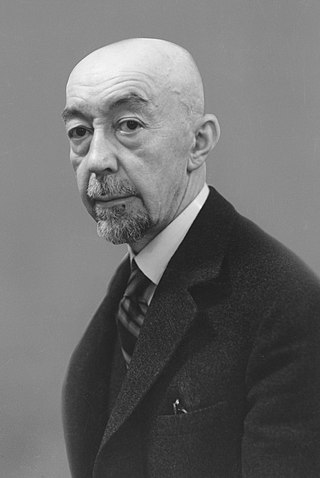 3
Czesław Maciej Witoszyński – polski inżynier mechanik, konstruktor maszyn, profesor aerodynamiki, nazywany ojcem polskiego lotnictwa.
3
Czesław Maciej Witoszyński – polski inżynier mechanik, konstruktor maszyn, profesor aerodynamiki, nazywany ojcem polskiego lotnictwa.
Tadeusz Pełczyński
 3
Tadeusz Walenty Pełczyński was a Polish Army major general, intelligence officer and chief of the General Staff's Section II.
3
Tadeusz Walenty Pełczyński was a Polish Army major general, intelligence officer and chief of the General Staff's Section II.
Jerzy Żuławski
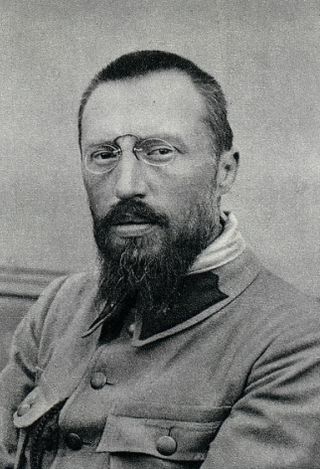 3
Jerzy Żuławski was a Polish literary figure, philosopher, translator, alpinist and patriot whose best-known work is the science-fiction epic, Trylogia Księżycowa, written between 1901 and 1911.
3
Jerzy Żuławski was a Polish literary figure, philosopher, translator, alpinist and patriot whose best-known work is the science-fiction epic, Trylogia Księżycowa, written between 1901 and 1911.
Jan Kowalczyk
 3
Jan Kowalczyk was a Polish show jumping competitor. He competed in the 1968, 1972 and 1980 Olympics and won an individual gold and a team silver medal in 1980.
3
Jan Kowalczyk was a Polish show jumping competitor. He competed in the 1968, 1972 and 1980 Olympics and won an individual gold and a team silver medal in 1980.
Mikhail Lermontov
 3
Mikhail Yuryevich Lermontov was a Russian Romantic writer, poet and painter, sometimes called "the poet of the Caucasus", the most important Russian poet after Alexander Pushkin's death in 1837 and...
3
Mikhail Yuryevich Lermontov was a Russian Romantic writer, poet and painter, sometimes called "the poet of the Caucasus", the most important Russian poet after Alexander Pushkin's death in 1837 and...
Konrad Guderski
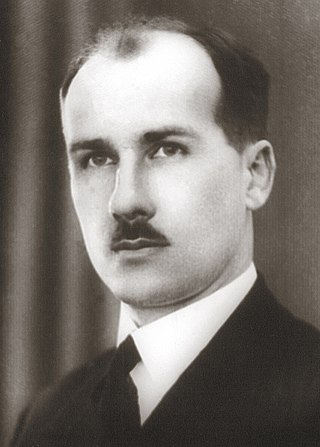 3
Konrad Guderski, ps. „Konrad” – polski inżynier wodny, dowódca obrony Poczty Polskiej w Wolnym Mieście Gdańsku, podporucznik rezerwy piechoty Wojska Polskiego.
3
Konrad Guderski, ps. „Konrad” – polski inżynier wodny, dowódca obrony Poczty Polskiej w Wolnym Mieście Gdańsku, podporucznik rezerwy piechoty Wojska Polskiego.
Bolesław Czerwieński
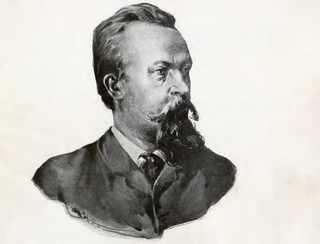 3
Bolesław Czerwieński – polski poeta i dramatopisarz, publicysta, działacz socjalistyczny, autor słów pieśni Czerwony sztandar (1881).
3
Bolesław Czerwieński – polski poeta i dramatopisarz, publicysta, działacz socjalistyczny, autor słów pieśni Czerwony sztandar (1881).
Józef Grzegorzek
 3
Józef Grzegorzek – polski działacz narodowy, przywódca peowiacki, uczestnik akcji plebiscytowej i III powstania śląskiego.
3
Józef Grzegorzek – polski działacz narodowy, przywódca peowiacki, uczestnik akcji plebiscytowej i III powstania śląskiego.
Karl Godulla
 3
Karl Godulla, Carolus Godulla, in Polish spelled Karol Godula was a Silesian self-made industrialist, and one of the best-known pioneers in the industrial development of Prussian Silesia.
3
Karl Godulla, Carolus Godulla, in Polish spelled Karol Godula was a Silesian self-made industrialist, and one of the best-known pioneers in the industrial development of Prussian Silesia.
Barnim I, Duke of Pomerania
 3
Barnim I the Good from the Griffin dynasty was a Duke of Pomerania from 1220 until his death.
3
Barnim I the Good from the Griffin dynasty was a Duke of Pomerania from 1220 until his death.
Mikołaj Zyblikiewicz
 3
Mikołaj Zyblikiewicz was a Polish politician and lawyer of Ruthenian origin. He was the two-term Mayor of Kraków – in the then Austrian sector of Partitioned Poland. A street in Kraków's Old Town is...
3
Mikołaj Zyblikiewicz was a Polish politician and lawyer of Ruthenian origin. He was the two-term Mayor of Kraków – in the then Austrian sector of Partitioned Poland. A street in Kraków's Old Town is...
Mikołaj Wierzynek (młodszy)
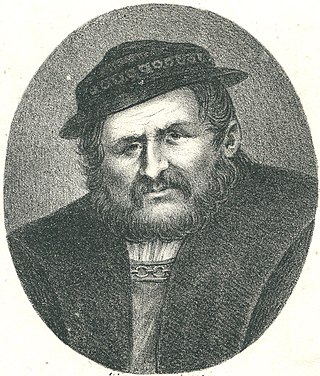 3
Mikołaj Wierzynek (młodszy) – średniowieczny kupiec, patrycjusz i bankier, syn Mikołaja Wierzynka (starszego).
3
Mikołaj Wierzynek (młodszy) – średniowieczny kupiec, patrycjusz i bankier, syn Mikołaja Wierzynka (starszego).
Stanisław Dębicki
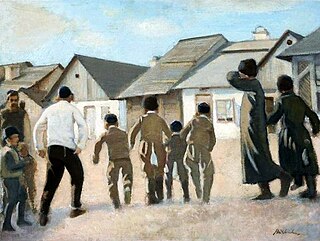 3
Stanisław Mieczysław Dębicki, was a Polish painter and illustrator.
3
Stanisław Mieczysław Dębicki, was a Polish painter and illustrator.
Biernat of Lublin
 3
Biernat of Lublin was a Polish poet, fabulist, translator, and physician. He was one of the first Polish-language writers known by name, and the most interesting of the earliest ones. He expressed...
3
Biernat of Lublin was a Polish poet, fabulist, translator, and physician. He was one of the first Polish-language writers known by name, and the most interesting of the earliest ones. He expressed...
Wawrzyniec Hajda
 3
Wawrzyniec Bartłomiej Hajda – polski działacz ludowy i poeta, z zawodu górnik.
3
Wawrzyniec Bartłomiej Hajda – polski działacz ludowy i poeta, z zawodu górnik.
Stefan Pogonowski
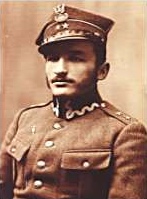 3
Stefan Pogonowski was a Polish professional soldier and military officer. He served in the Imperial Russian Army during World War I and then the newly recreated Polish Army during the...
3
Stefan Pogonowski was a Polish professional soldier and military officer. He served in the Imperial Russian Army during World War I and then the newly recreated Polish Army during the...
Wacław Seweryn Rzewuski
 3
Wacław Seweryn Rzewuski was a Polish explorer, poet, orientalist and horse expert.
3
Wacław Seweryn Rzewuski was a Polish explorer, poet, orientalist and horse expert.
Henryk Wiercieński
 3
Henryk Wojciech Jakub Wiercieński – uczestnik powstania styczniowego, sybirak, publicysta. Zaznaczył się jako obrońca ziemi chełmskiej. Mieszkał w Nałęczowie, Lublinie. Był społecznikiem na terenie...
3
Henryk Wojciech Jakub Wiercieński – uczestnik powstania styczniowego, sybirak, publicysta. Zaznaczył się jako obrońca ziemi chełmskiej. Mieszkał w Nałęczowie, Lublinie. Był społecznikiem na terenie...
Kazimierz Szpotański
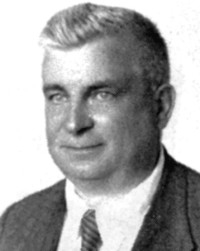 3
Kazimierz Tadeusz Szpotański – polski inżynier elektryk, pionier przemysłu aparatów elektrycznych.
3
Kazimierz Tadeusz Szpotański – polski inżynier elektryk, pionier przemysłu aparatów elektrycznych.
Jan Nepomucen Umiński
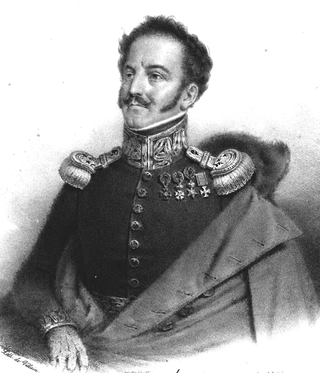 3
Jan Nepomucen Umiński of Cholewa (1778–1851) was a Polish military officer and a brigadier general of the Army of the Duchy of Warsaw. A veteran of the Kościuszko Uprising, Napoleonic Wars and the...
3
Jan Nepomucen Umiński of Cholewa (1778–1851) was a Polish military officer and a brigadier general of the Army of the Duchy of Warsaw. A veteran of the Kościuszko Uprising, Napoleonic Wars and the...
Stanisław Smolka
 3
Stanisław Smolka was a Polish historian and publicist, professor at the Jagiellonian University and the Catholic University of Lublin, Secretary General of the Polish Academy of Arts and Sciences.
3
Stanisław Smolka was a Polish historian and publicist, professor at the Jagiellonian University and the Catholic University of Lublin, Secretary General of the Polish Academy of Arts and Sciences.
Jerzy Duda-Gracz
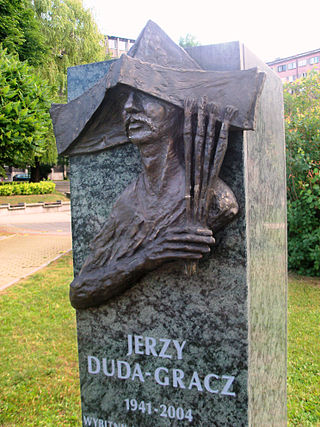 3
Jerzy Duda-Gracz was a Polish painter.
3
Jerzy Duda-Gracz was a Polish painter.
Karol Pomianowski
 3
Karol Pomianowski – polski profesor hydrotechniki, inicjator budowy zapory na Dunajcu w Rożnowie, pierwszy dziekan Wydziału Inżynierii Lądowej na polskiej Politechnice Gdańskiej.
3
Karol Pomianowski – polski profesor hydrotechniki, inicjator budowy zapory na Dunajcu w Rożnowie, pierwszy dziekan Wydziału Inżynierii Lądowej na polskiej Politechnice Gdańskiej.
Hanna Januszewska
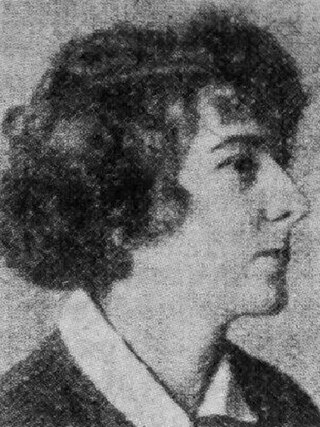 3
Hanna Januszewska-Moszyńska – polska prozaiczka, poetka, tłumaczka, autorka sztuk teatralnych i słuchowisk.
3
Hanna Januszewska-Moszyńska – polska prozaiczka, poetka, tłumaczka, autorka sztuk teatralnych i słuchowisk.
Józef Weyssenhoff
 3
Józef Weyssenhoff was a Polish novelist, poet, literary critic, publisher. Close to the National Democracy political movement after 1905, he paid tribute to the tradition of the Polish landed gentry...
3
Józef Weyssenhoff was a Polish novelist, poet, literary critic, publisher. Close to the National Democracy political movement after 1905, he paid tribute to the tradition of the Polish landed gentry...
Adam Napieralski
 3
Adam Napieralski ps. Marian Firlej – polski redaktor, polityk, poeta, powieściopisarz, działacz narodowy i społeczny. Wydawca pierwszej „gadzinówki”.
3
Adam Napieralski ps. Marian Firlej – polski redaktor, polityk, poeta, powieściopisarz, działacz narodowy i społeczny. Wydawca pierwszej „gadzinówki”.
Michał Oczapowski
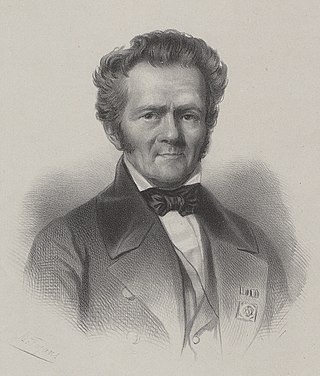 3
Michał Oczapowski – polski agronom, profesor Cesarskiego Uniwersytetu Wileńskiego, pionier doświadczalnictwa rolniczego, teoretyk rolnictwa.
3
Michał Oczapowski – polski agronom, profesor Cesarskiego Uniwersytetu Wileńskiego, pionier doświadczalnictwa rolniczego, teoretyk rolnictwa.
Franciszek Ksawery Drucki-Lubecki
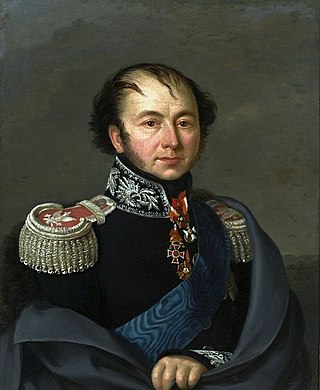 3
Prince Franciszek Ksawery Drucki-Lubecki was an important Polish politician, freemason and diplomat of the first half of the 19th century. He served as the minister of the treasury in the Congress...
3
Prince Franciszek Ksawery Drucki-Lubecki was an important Polish politician, freemason and diplomat of the first half of the 19th century. He served as the minister of the treasury in the Congress...
Feliks Konarski
 3
Feliks Konarski was a Polish poet, songwriter, and cabaret performer.
3
Feliks Konarski was a Polish poet, songwriter, and cabaret performer.
Kazimierz Michałowski
 3
Kazimierz Józef Marian Michałowski was a Polish archaeologist and Egyptologist, art historian, member of the Polish Academy of Sciences, professor ordinarius of the University of Warsaw as well as...
3
Kazimierz Józef Marian Michałowski was a Polish archaeologist and Egyptologist, art historian, member of the Polish Academy of Sciences, professor ordinarius of the University of Warsaw as well as...
Juliusz Rómmel
 3
Juliusz Karol Wilhelm Józef Rómmel was a Polish military commander, a general of the Polish Armed Forces.
3
Juliusz Karol Wilhelm Józef Rómmel was a Polish military commander, a general of the Polish Armed Forces.
Stanisław Barcewicz
 3
Stanisław Barcewicz was a Polish violinist, conductor and teacher. Although his repertoire included almost all of the classical and romantic violin literature, he was valued primarily for his...
3
Stanisław Barcewicz was a Polish violinist, conductor and teacher. Although his repertoire included almost all of the classical and romantic violin literature, he was valued primarily for his...
Pablo Picasso
 3
Pablo Ruiz Picasso was a Spanish painter, sculptor, printmaker, ceramicist, and theatre designer who spent most of his adult life in France. One of the most influential artists of the 20th century,...
3
Pablo Ruiz Picasso was a Spanish painter, sculptor, printmaker, ceramicist, and theatre designer who spent most of his adult life in France. One of the most influential artists of the 20th century,...
Ferdynand Ruszczyc
 3
Ferdynand Ruszczyc (1870–1936) was Polish painter, printmaker, and stage designer. He was a member of the aristocratic Ruszczyc de Lis family.
3
Ferdynand Ruszczyc (1870–1936) was Polish painter, printmaker, and stage designer. He was a member of the aristocratic Ruszczyc de Lis family.
Adam Bień
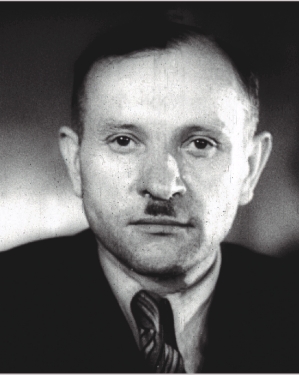 3
Adam Bień – polski polityk ruchu ludowego, adwokat, sędzia, członek władz Polskiego Państwa Podziemnego. Kawaler Orderu Orła Białego.
3
Adam Bień – polski polityk ruchu ludowego, adwokat, sędzia, członek władz Polskiego Państwa Podziemnego. Kawaler Orderu Orła Białego.
Władysław Sebyła
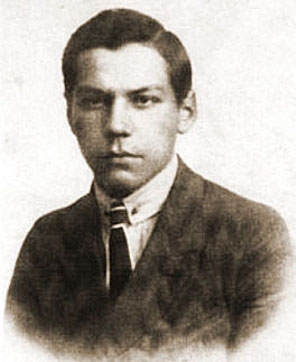 3
Władysław Sebyła (1902–1940) was a Polish poet, a member of the Kwadryga (Four-in-Hand) literary group, which also included Konstanty Ildefons Gałczyński and Stefan Flukowski. He was executed in...
3
Władysław Sebyła (1902–1940) was a Polish poet, a member of the Kwadryga (Four-in-Hand) literary group, which also included Konstanty Ildefons Gałczyński and Stefan Flukowski. He was executed in...
Jerzy Iwanow-Szajnowicz
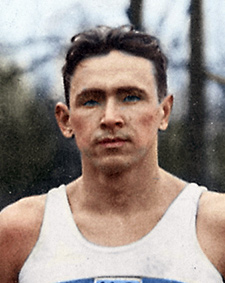 3
Jerzy Iwanow-Szajnowicz was a Polish-Greek athlete who fought as a saboteur in the Greek Resistance during World War II and was executed by the Germans.
3
Jerzy Iwanow-Szajnowicz was a Polish-Greek athlete who fought as a saboteur in the Greek Resistance during World War II and was executed by the Germans.
Aleksander Czekanowski
 3
Aleksander Piotr Czekanowski, or Aleksandr Lavrentyevich Chekanovsky was a Polish geologist and explorer of Siberia during his exile after participating in the January Uprising. He took part in and...
3
Aleksander Piotr Czekanowski, or Aleksandr Lavrentyevich Chekanovsky was a Polish geologist and explorer of Siberia during his exile after participating in the January Uprising. He took part in and...
Eugeniusz Paukszta
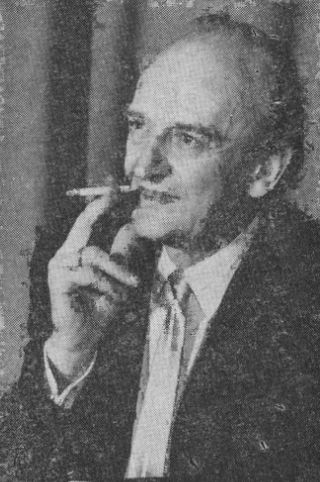 3
Eugeniusz Paukszta – polski powieściopisarz i publicysta.
3
Eugeniusz Paukszta – polski powieściopisarz i publicysta.
Zbigniew Religa
 3
Zbigniew Eugeniusz Religa was a Polish cardiac surgeon and politician.
3
Zbigniew Eugeniusz Religa was a Polish cardiac surgeon and politician.
Louis Braille
 3
Louis Braille was a French educator and the inventor of a reading and writing system named after him, braille, intended for use by visually impaired people. His system is used worldwide and remains...
3
Louis Braille was a French educator and the inventor of a reading and writing system named after him, braille, intended for use by visually impaired people. His system is used worldwide and remains...
Antoni Stabik
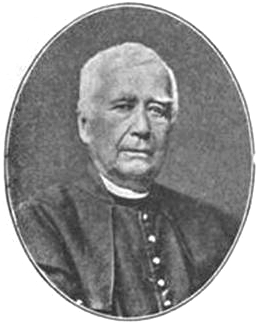 3
Antoni Stabik – polski ksiądz katolicki, poeta, autor polskich wierszy zamieszczanych na łamach prasy oraz zebranych w tomie Żarty nieżarty wydanym w 1848 roku w Raciborzu. Autor pierwszego...
3
Antoni Stabik – polski ksiądz katolicki, poeta, autor polskich wierszy zamieszczanych na łamach prasy oraz zebranych w tomie Żarty nieżarty wydanym w 1848 roku w Raciborzu. Autor pierwszego...
Franciszek Żymirski
 3
Franciszek Żymirski herbu Jastrzębiec – generał polski, dowódca 2 dywizji piechoty, kawaler orderu Virtuti Militari.
3
Franciszek Żymirski herbu Jastrzębiec – generał polski, dowódca 2 dywizji piechoty, kawaler orderu Virtuti Militari.
Wacław Aleksander Lachman
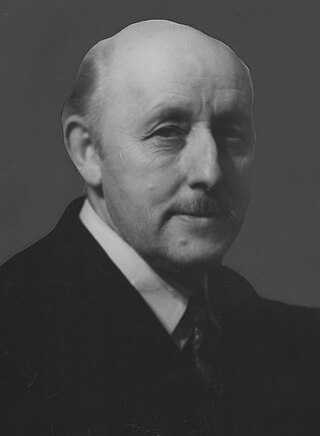 3
Wacław Aleksander Lachman – kompozytor, dyrygent, pedagog, autor podręczników i śpiewników, animator życia muzycznego, zasłużony dla muzyki chóralnej w Polsce, także bardzo aktywny społecznik i...
3
Wacław Aleksander Lachman – kompozytor, dyrygent, pedagog, autor podręczników i śpiewników, animator życia muzycznego, zasłużony dla muzyki chóralnej w Polsce, także bardzo aktywny społecznik i...
Franciszek Salezy Jezierski
 3
Franciszek Salezy Jezierski (1740–1791) was a Polish writer, social and political activist of the Enlightenment period. A Catholic priest, he was involved with the creation of the Commission of...
3
Franciszek Salezy Jezierski (1740–1791) was a Polish writer, social and political activist of the Enlightenment period. A Catholic priest, he was involved with the creation of the Commission of...
Jan Rekowski-Styp
 3
Jan Rekowski-Styp, również Jan Styp-Rekowski – włościanin kaszubski, działacz Związku Polaków w Niemczech, więzień niemieckiego obozu koncentracyjnego.
3
Jan Rekowski-Styp, również Jan Styp-Rekowski – włościanin kaszubski, działacz Związku Polaków w Niemczech, więzień niemieckiego obozu koncentracyjnego.
Jerzy Waldorff
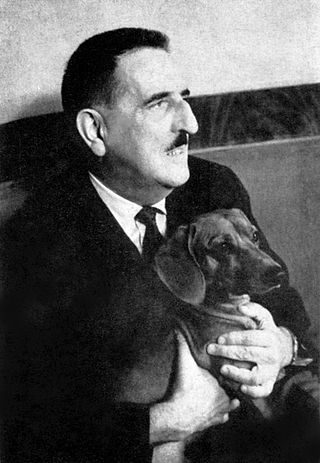 3
Jerzy Waldorff-Preyss of the Nabram coat of arms was a Polish media personality, public intellectual, socialite, music critic and music aficionado. He wrote over twenty books, mostly on the subject...
3
Jerzy Waldorff-Preyss of the Nabram coat of arms was a Polish media personality, public intellectual, socialite, music critic and music aficionado. He wrote over twenty books, mostly on the subject...
Izydor Gulgowski
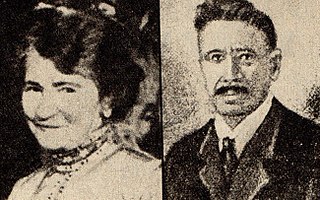 3
Izydor Gulgowski, także Ernst Seefried-Gulgowski – nauczyciel, współzałożyciel Kaszubskiego Towarzystwa Ludoznawczego w Kartuzach, poeta kaszubski, dziennikarz, publicysta, porucznik Wojska...
3
Izydor Gulgowski, także Ernst Seefried-Gulgowski – nauczyciel, współzałożyciel Kaszubskiego Towarzystwa Ludoznawczego w Kartuzach, poeta kaszubski, dziennikarz, publicysta, porucznik Wojska...
Archimedes
 3
Archimedes of Syracuse was an Ancient Greek mathematician, physicist, engineer, astronomer, and inventor from the ancient city of Syracuse in Sicily. Although few details of his life are known, he is...
3
Archimedes of Syracuse was an Ancient Greek mathematician, physicist, engineer, astronomer, and inventor from the ancient city of Syracuse in Sicily. Although few details of his life are known, he is...
Czesław Janczarski
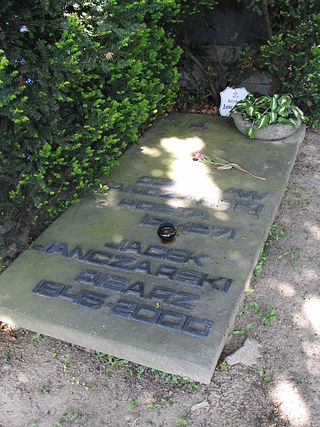 3
Czeslaw Janczarski was a Polish writer of children's books as well as a translator from the Russian language.
3
Czeslaw Janczarski was a Polish writer of children's books as well as a translator from the Russian language.
Zbigniew Przybyszewski
 3
Zbigniew Przybyszewski (1907–1952) was a Polish military officer and a Commander in the Polish Navy. During the early stages of World War II he served with distinction as the commanding officer of...
3
Zbigniew Przybyszewski (1907–1952) was a Polish military officer and a Commander in the Polish Navy. During the early stages of World War II he served with distinction as the commanding officer of...
Józef Toczyski
 3
Józef Toczyski – naczelnik Wydziału Skarbu Rządu Narodowego.
3
Józef Toczyski – naczelnik Wydziału Skarbu Rządu Narodowego.
Władysław Odonic
 3
Władysław Odonic, nicknamed Plwacz or the Spitter, was a duke of Kalisz 1207–1217, duke of Poznań 1216–1217, ruler of Ujście in 1223, ruler of Nakło from 1225, and duke of all Greater Poland...
3
Władysław Odonic, nicknamed Plwacz or the Spitter, was a duke of Kalisz 1207–1217, duke of Poznań 1216–1217, ruler of Ujście in 1223, ruler of Nakło from 1225, and duke of all Greater Poland...
Augustyn Szamarzewski
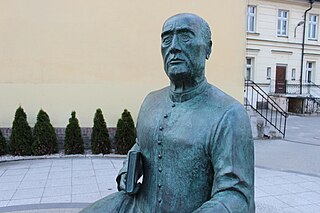 3
Augustyn Szamarzewski – polski działacz społeczny i ksiądz związany z Wielkopolską.
3
Augustyn Szamarzewski – polski działacz społeczny i ksiądz związany z Wielkopolską.
Bernard Chrzanowski
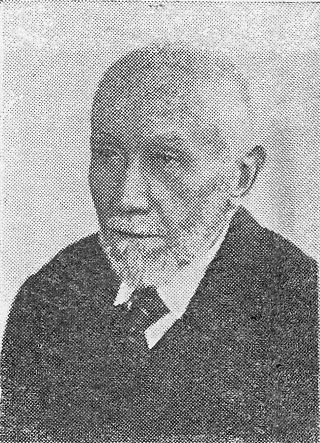 3
Bernard Chrzanowski was a Polish social and political activist, president of the Union of the Greater Poland Falcons "Sokół".
3
Bernard Chrzanowski was a Polish social and political activist, president of the Union of the Greater Poland Falcons "Sokół".
Walerian Czuma
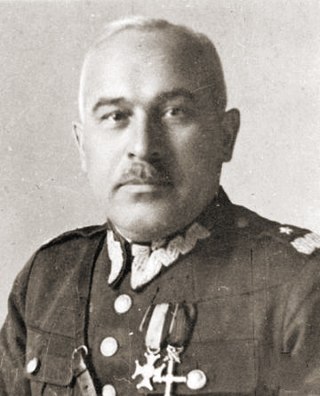 3
Walerian Czuma was a Polish general and military commander. He is notable for his command over a Polish unit in Siberia during the Russian Civil War, and the commander of the defence of Warsaw during...
3
Walerian Czuma was a Polish general and military commander. He is notable for his command over a Polish unit in Siberia during the Russian Civil War, and the commander of the defence of Warsaw during...
Władysław Raczkiewicz
 3
Władysław Raczkiewicz was a Polish politician, lawyer, diplomat and President of Poland-in-exile from 1939 until his death in 1947. Until 1945, he was the internationally recognized Polish head of...
3
Władysław Raczkiewicz was a Polish politician, lawyer, diplomat and President of Poland-in-exile from 1939 until his death in 1947. Until 1945, he was the internationally recognized Polish head of...
Stanisław Trembecki
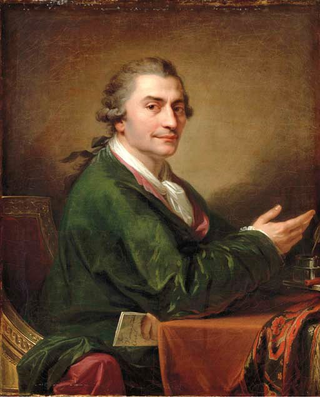 3
Stanisław Trembecki was a Polish Enlightenment poet and translator, well known for his poems Na dzień siódmy września and Nadgrobek hajduka that are said to have started a new trend in Polish...
3
Stanisław Trembecki was a Polish Enlightenment poet and translator, well known for his poems Na dzień siódmy września and Nadgrobek hajduka that are said to have started a new trend in Polish...
Jan Piotr Szturmowski
 3
Jan Piotr Szturmowski – polski rolnik, polityk i działacz społeczny, poseł na Sejm I,II i III kadencji w II RP z ramienia Związku Ludowo-Narodowego oraz Stronnictwa Narodowego.
3
Jan Piotr Szturmowski – polski rolnik, polityk i działacz społeczny, poseł na Sejm I,II i III kadencji w II RP z ramienia Związku Ludowo-Narodowego oraz Stronnictwa Narodowego.
Оксинский, Юзеф
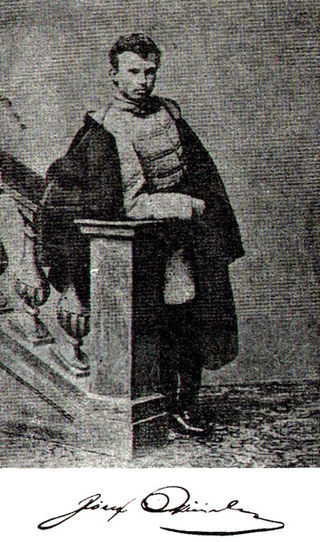 3
Юзеф Оксинский — польский националист, революционер. Активный участник Польского восстания 1863 года.
Майор повстанческих войск.
3
Юзеф Оксинский — польский националист, революционер. Активный участник Польского восстания 1863 года.
Майор повстанческих войск.
Juliusz Kraziewicz
 3
Juliusz Bernard Kraziewicz – polski działacz oświatowo-gospodarczy.
3
Juliusz Bernard Kraziewicz – polski działacz oświatowo-gospodarczy.
Alexander Herzen
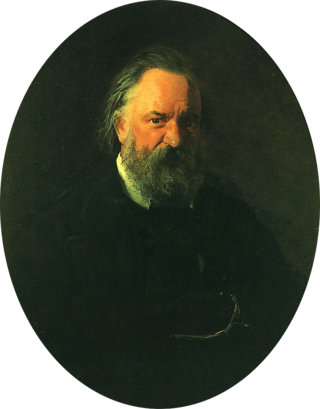 3
Alexander Ivanovich Herzen was a Russian writer and thinker known as the precursor of Russian socialism and one of the main precursors of agrarian populism. With his writings, many composed while...
3
Alexander Ivanovich Herzen was a Russian writer and thinker known as the precursor of Russian socialism and one of the main precursors of agrarian populism. With his writings, many composed while...
Krzysztof Żegocki
 3
Krzysztof Jan Żegocki was a commander of partisan units which fought with Sweden during 1655–1659. He was also a voivod of Inowrocław, bishop of Chełm, starosta of Babimost and Konin, supporter of...
3
Krzysztof Jan Żegocki was a commander of partisan units which fought with Sweden during 1655–1659. He was also a voivod of Inowrocław, bishop of Chełm, starosta of Babimost and Konin, supporter of...
Pan Kleks
 3
Professor Ambroży Kleks, commonly referred to as Pan Kleks, is a fictional character in the Pan Kleks series, a trilogy of books written by Polish author Jan Brzechwa. He is depicted as the founder...
3
Professor Ambroży Kleks, commonly referred to as Pan Kleks, is a fictional character in the Pan Kleks series, a trilogy of books written by Polish author Jan Brzechwa. He is depicted as the founder...
Jerzy Różycki
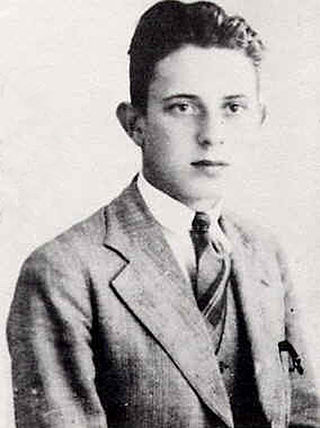 3
Jerzy Witold Różycki was a Polish mathematician and cryptologist who worked at breaking German Enigma-machine ciphers before and during World War II.
3
Jerzy Witold Różycki was a Polish mathematician and cryptologist who worked at breaking German Enigma-machine ciphers before and during World War II.
Paweł Cyms
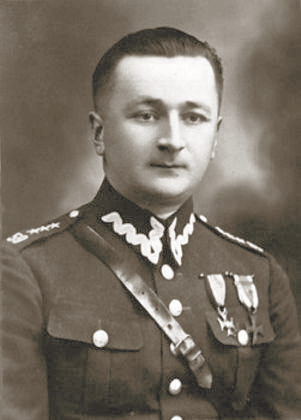 3
Paweł Cyms was a soldier of the Imperial German Army and captain of infantry in the Second Polish Republic. He fought in World War I, Greater Poland Uprising (1918–19), Silesian Uprisings, Invasion...
3
Paweł Cyms was a soldier of the Imperial German Army and captain of infantry in the Second Polish Republic. He fought in World War I, Greater Poland Uprising (1918–19), Silesian Uprisings, Invasion...
Onufry Kopczyński
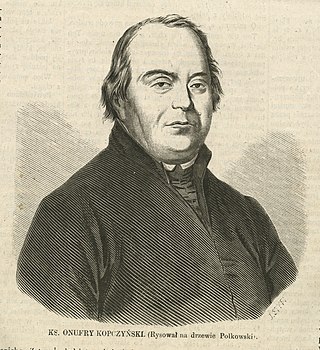 3
Onufry Kopczyński was an important educator and grammarian of the Polish language during the Polish Enlightenment.
3
Onufry Kopczyński was an important educator and grammarian of the Polish language during the Polish Enlightenment.
Władysław Strzemiński
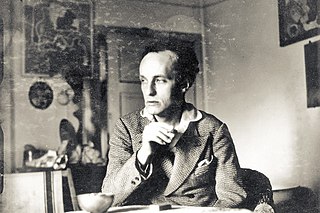 3
Władysław Strzemiński was a Polish painter, art theoretician and pedagogue. He is regarded as a pioneer of Constructivist avant-garde of the 1920s and 1930s and the developer of the theory of unism.
3
Władysław Strzemiński was a Polish painter, art theoretician and pedagogue. He is regarded as a pioneer of Constructivist avant-garde of the 1920s and 1930s and the developer of the theory of unism.
Hieronim Dekutowski
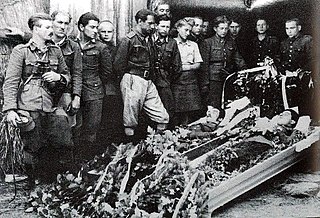 3
Hieronim Dekutowski was a Polish boy scout and soldier, who fought in Polish September Campaign, was a member of the elite forces Cichociemni, fought in the Home Army and after World War II, fought...
3
Hieronim Dekutowski was a Polish boy scout and soldier, who fought in Polish September Campaign, was a member of the elite forces Cichociemni, fought in the Home Army and after World War II, fought...
Jakub Świnka
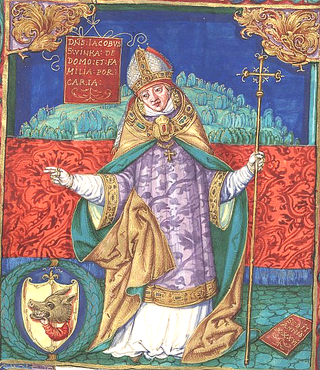 3
Jakub Świnka was a Polish Catholic priest, the Archbishop of Gniezno and a notable politician and statesman, supporter of the idea of unification of all Polish lands under the rule of Władysław I the...
3
Jakub Świnka was a Polish Catholic priest, the Archbishop of Gniezno and a notable politician and statesman, supporter of the idea of unification of all Polish lands under the rule of Władysław I the...
Wiktor Czajewski
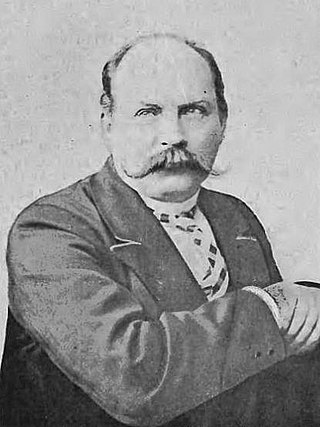 3
Wiktor Czajewski – literat, dziennikarz, historyk, wydawca gazet i właściciel drukarni prasowej; badacz kurpiowskiej Puszczy Zielonej.
3
Wiktor Czajewski – literat, dziennikarz, historyk, wydawca gazet i właściciel drukarni prasowej; badacz kurpiowskiej Puszczy Zielonej.
Eugeniusz Bodo
 3
Eugeniusz Bodo was a film director, producer, and one of the most popular Polish actors and comedians of the interwar period. He starred in some of the most popular Polish film productions of the...
3
Eugeniusz Bodo was a film director, producer, and one of the most popular Polish actors and comedians of the interwar period. He starred in some of the most popular Polish film productions of the...
Andrzej Niemojewski
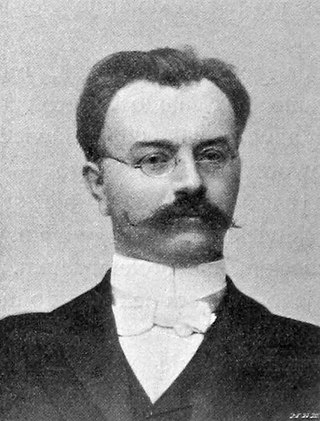 3
Andrzej Niemojewski was a Polish social and political activist, poet, rationalist and writer of the Young Poland period.
3
Andrzej Niemojewski was a Polish social and political activist, poet, rationalist and writer of the Young Poland period.
Oddział Antoniego Jeziorańskiego
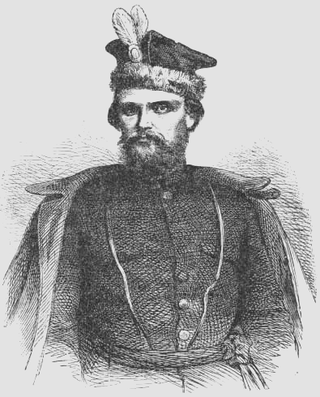 3
Oddział Antoniego Jeziorańskiego – partia powstańcza okresu powstania styczniowego, operująca w Łódzkiem a potem w Małopolsce.
3
Oddział Antoniego Jeziorańskiego – partia powstańcza okresu powstania styczniowego, operująca w Łódzkiem a potem w Małopolsce.
Julian Korsak
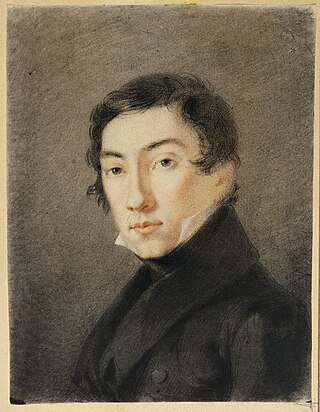 3
Julian Korsak – polski poeta i tłumacz, przedstawiciel romantyzmu krajowego.
3
Julian Korsak – polski poeta i tłumacz, przedstawiciel romantyzmu krajowego.
Karol Bohdanowicz
 3
Karol Bohdanowicz was a Polish geologist, an expert in mining geology and physical geography. Bohdanowicz' research contributed to the construction of the Caspian railway line and enabled the...
3
Karol Bohdanowicz was a Polish geologist, an expert in mining geology and physical geography. Bohdanowicz' research contributed to the construction of the Caspian railway line and enabled the...
Vladislaus II of Opole
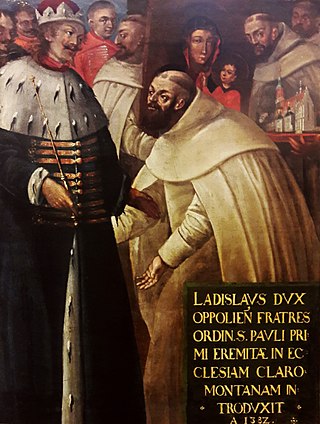 3
Vladislaus II of Opole, nicknamed Naderspan, was Duke of Opole from 1356, Count palatine of Hungary (1367–1372), Duke of Wieluń (1370–1392), Governor of Ruthenia (1372–1378), Count palatine of Poland...
3
Vladislaus II of Opole, nicknamed Naderspan, was Duke of Opole from 1356, Count palatine of Hungary (1367–1372), Duke of Wieluń (1370–1392), Governor of Ruthenia (1372–1378), Count palatine of Poland...
Stefan Myczkowski
 3
Stefan Myczkowski – profesor botaniki leśnej i ekologii lasu na Wydziale Leśnym Akademii Rolniczej w Krakowie oraz w Zakładzie Ochrony Przyrody Polskiej Akademii Nauk, wicedyrektor Instytutu Hodowli...
3
Stefan Myczkowski – profesor botaniki leśnej i ekologii lasu na Wydziale Leśnym Akademii Rolniczej w Krakowie oraz w Zakładzie Ochrony Przyrody Polskiej Akademii Nauk, wicedyrektor Instytutu Hodowli...
Józef Zieliński (działacz robotniczy)
 3
Józef Zieliński, pseud. dr Józef Zielczak, krypt. J. Z. – jeden z pierwszych polskich lekarzy-higienistów, społecznik, działacz anarchistyczny i socjalistyczny, publicysta i wydawca prasy...
3
Józef Zieliński, pseud. dr Józef Zielczak, krypt. J. Z. – jeden z pierwszych polskich lekarzy-higienistów, społecznik, działacz anarchistyczny i socjalistyczny, publicysta i wydawca prasy...
Jan Czerski
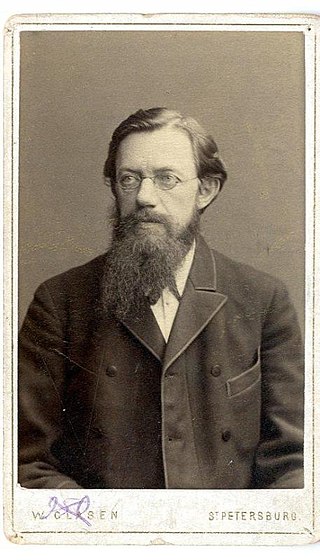 3
Jan Stanisław Franciszek Czerski, also Ivan Dementievich Chersky or Yan Dominikovich Chersky was a Russian and Polish paleontologist, osteologist, geologist, geographer and explorer of Siberia.
3
Jan Stanisław Franciszek Czerski, also Ivan Dementievich Chersky or Yan Dominikovich Chersky was a Russian and Polish paleontologist, osteologist, geologist, geographer and explorer of Siberia.
Jan Klemens Branicki
 3
Count Jan Klemens Branicki was a Polish nobleman, magnate and Hetman, Field Crown Hetman of the Polish–Lithuanian Commonwealth between 1735 and 1752, and Great Crown Hetman between 1752 and 1771. One...
3
Count Jan Klemens Branicki was a Polish nobleman, magnate and Hetman, Field Crown Hetman of the Polish–Lithuanian Commonwealth between 1735 and 1752, and Great Crown Hetman between 1752 and 1771. One...
Maurice Ravel
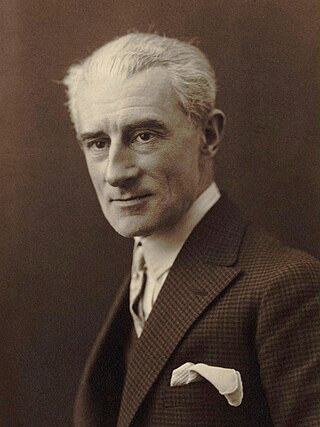 3
Joseph Maurice Ravel was a French composer, pianist and conductor. He is often associated with Impressionism along with his elder contemporary Claude Debussy, although both composers rejected the...
3
Joseph Maurice Ravel was a French composer, pianist and conductor. He is often associated with Impressionism along with his elder contemporary Claude Debussy, although both composers rejected the...
Błażej Stolarski
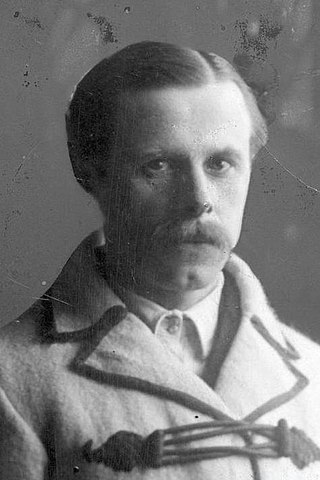 3
Błażej Stolarski – polski działacz społeczny i polityczny, jeden z przywódców ruchu ludowego, etnograf i publicysta, członek Zarządu Koła Parlamentarnego Obozu Zjednoczenia Narodowego w 1938 roku,...
3
Błażej Stolarski – polski działacz społeczny i polityczny, jeden z przywódców ruchu ludowego, etnograf i publicysta, członek Zarządu Koła Parlamentarnego Obozu Zjednoczenia Narodowego w 1938 roku,...
Henryk Czeczott
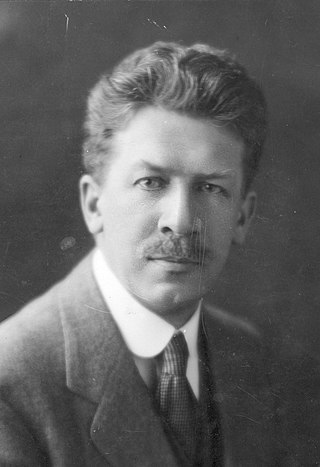 3
Henryk Czeczott – polski inżynier, profesor Akademii Górniczej w Krakowie, kierownik Katedry Górnictwa.
3
Henryk Czeczott – polski inżynier, profesor Akademii Górniczej w Krakowie, kierownik Katedry Górnictwa.
Pius Weloński
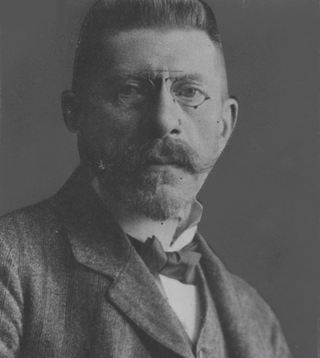 3
Pius Weloński – polski rzeźbiarz, malarz.
3
Pius Weloński – polski rzeźbiarz, malarz.
Władysław Pytlasiński
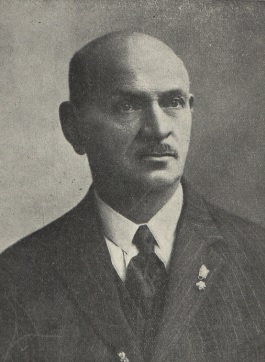 3
Władysław Pytlasiński – polski zapaśnik, mistrz świata i trener, oficer Policji Państwowej. Ze względu na swój wkład w rozwój polskiego zapaśnictwa jest nazywany „ojcem polskich zapasów”.
3
Władysław Pytlasiński – polski zapaśnik, mistrz świata i trener, oficer Policji Państwowej. Ze względu na swój wkład w rozwój polskiego zapaśnictwa jest nazywany „ojcem polskich zapasów”.
Wilhelm Mach
 3
Wilhelm Mach, pen names il., Quidam, s., S., Współpracownik was a Polish writer, essayist, poet and literary critic.
3
Wilhelm Mach, pen names il., Quidam, s., S., Współpracownik was a Polish writer, essayist, poet and literary critic.
Władysław Bortnowski
 3
Władysław Bortnowski was a Polish historian, military commander and one of the highest ranking generals of the Polish Army. He is most famous for commanding the Pomorze Army in the Battle of Bzura...
3
Władysław Bortnowski was a Polish historian, military commander and one of the highest ranking generals of the Polish Army. He is most famous for commanding the Pomorze Army in the Battle of Bzura...
Helena Mniszek
 3
Helena Mniszek was a Polish novelist. She was born in Volhynia and died in Sabnie. Her debut novel Trędowata written in 1909 brought her to prominence.
3
Helena Mniszek was a Polish novelist. She was born in Volhynia and died in Sabnie. Her debut novel Trędowata written in 1909 brought her to prominence.
Wojciech Weiss
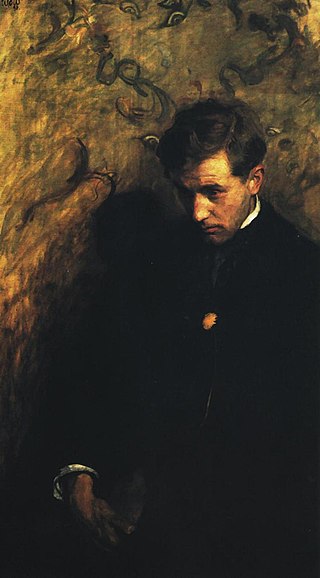 3
Wojciech Weiss was a prominent Polish painter and draughtsman of the Young Poland movement.
3
Wojciech Weiss was a prominent Polish painter and draughtsman of the Young Poland movement.
Władysław Gurgacz
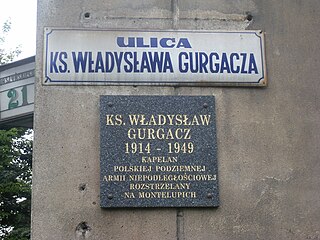 3
Władysław Gurgacz was a Polish Catholic priest, member of the Society of Jesus, and chaplain of the anti-communist underground.
3
Władysław Gurgacz was a Polish Catholic priest, member of the Society of Jesus, and chaplain of the anti-communist underground.
Władysław Wiewiórowski
 3
Władysław Wiewiórowski – nadleśniczy, działacz niepodległościowy, podporucznik i dowódca wrzesińskiego batalionu powstańczego w powstaniu wielkopolskim.
3
Władysław Wiewiórowski – nadleśniczy, działacz niepodległościowy, podporucznik i dowódca wrzesińskiego batalionu powstańczego w powstaniu wielkopolskim.
Fryderyk Leyk
 3
Fryderyk Leyk lub Lejk ps. Mirosław Różyński, Grom – mazurski działacz ludowy, publicysta, poeta.
3
Fryderyk Leyk lub Lejk ps. Mirosław Różyński, Grom – mazurski działacz ludowy, publicysta, poeta.
Josef Božek
 3
Josef Božek was an engineer and inventor from Cieszyn Silesia. The area was part of the Austrian Empire during much of his life. He is considered one of founders of Czech mechanics. He put into...
3
Josef Božek was an engineer and inventor from Cieszyn Silesia. The area was part of the Austrian Empire during much of his life. He is considered one of founders of Czech mechanics. He put into...
Stanisław Miłkowski (literat)
 3
Stanisław Miłkowski – polski literat ; powstaniec styczniowy. Autor powieści współczesnych, wspomnień i licznych przekładów.
3
Stanisław Miłkowski – polski literat ; powstaniec styczniowy. Autor powieści współczesnych, wspomnień i licznych przekładów.
Tadeusz Kulisiewicz
 3
Tadeusz Kulisiewicz – polski grafik i rysownik.
3
Tadeusz Kulisiewicz – polski grafik i rysownik.
Philip Neri
 3
Philip Romolo Neri, known as the "Second Apostle of Rome" after Saint Peter, was an Italian Catholic priest noted for founding the Congregation of the Oratory, a society of secular clergy.
3
Philip Romolo Neri, known as the "Second Apostle of Rome" after Saint Peter, was an Italian Catholic priest noted for founding the Congregation of the Oratory, a society of secular clergy.
Maria Piotrowiczowa
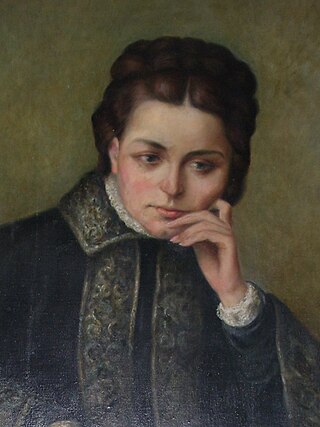 3
Maria Piotrowiczowa was a Polish January insurgent and a participant of the battle of Dobra. She was born in 1839 and killed on 24 February 1863.
3
Maria Piotrowiczowa was a Polish January insurgent and a participant of the battle of Dobra. She was born in 1839 and killed on 24 February 1863.
Włodzimierz Steyer
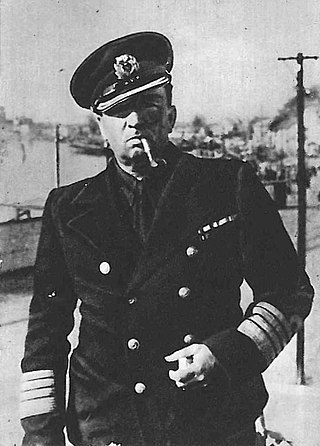 3
Kontradmirał Włodzimierz Steyer was a Polish naval officer before and during the Second World War. During the Invasion of Poland in 1939 he commanded the Polish land forces defending the Hel...
3
Kontradmirał Włodzimierz Steyer was a Polish naval officer before and during the Second World War. During the Invasion of Poland in 1939 he commanded the Polish land forces defending the Hel...
Stanisław Pruszyński (generał)
 3
Stanisław Napoleon Ursyn-Pruszyński herbu Rawicz – cesarski i królewski szambelan, Feldmarschalleutnant cesarskiej i królewskiej armii, generał dywizji Wojska Polskiego.
3
Stanisław Napoleon Ursyn-Pruszyński herbu Rawicz – cesarski i królewski szambelan, Feldmarschalleutnant cesarskiej i królewskiej armii, generał dywizji Wojska Polskiego.
Augustine of Hippo
 3
Augustine of Hippo, also known as Saint Augustine, was a theologian and philosopher of Berber origin and the bishop of Hippo Regius in Numidia, Roman North Africa. His writings influenced the...
3
Augustine of Hippo, also known as Saint Augustine, was a theologian and philosopher of Berber origin and the bishop of Hippo Regius in Numidia, Roman North Africa. His writings influenced the...
Józef Szermentowski
 3
Józef Szermentowski, or Szermętowski, was a Polish landscape painter, influenced by the Barbizon School.
3
Józef Szermentowski, or Szermętowski, was a Polish landscape painter, influenced by the Barbizon School.
Heliodor Święcicki
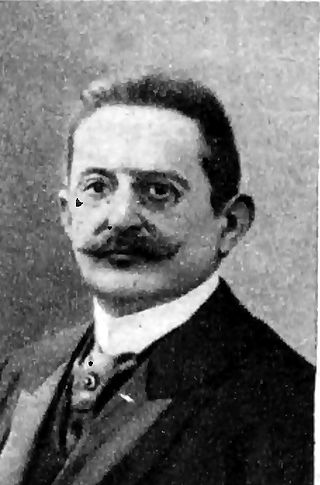 3
Heliodor Święcicki – lekarz ginekolog, społecznik, filantrop, założyciel i pierwszy rektor Wszechnicy Piastowskiej.
3
Heliodor Święcicki – lekarz ginekolog, społecznik, filantrop, założyciel i pierwszy rektor Wszechnicy Piastowskiej.
Ernest Malinowski
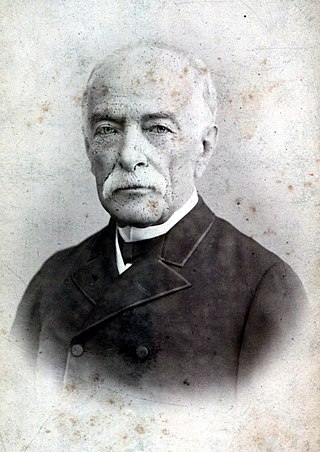 3
Adam Stanisław Hipolit Ernest Nepomucen Malinowski was a Polish civil engineer best known for constructing the world's highest railway at the time, the Ferrovias Central, in the Peruvian Andes...
3
Adam Stanisław Hipolit Ernest Nepomucen Malinowski was a Polish civil engineer best known for constructing the world's highest railway at the time, the Ferrovias Central, in the Peruvian Andes...
Wespazjan Kochowski
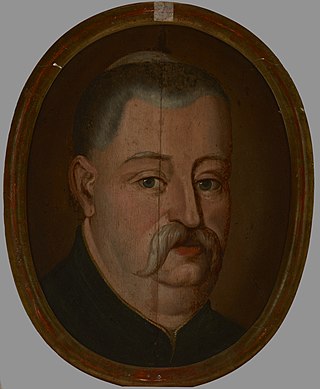 3
Wespazjan (Vespasian) Kochowski was one of the most noted historians and poets of Polish Baroque, the most typical representative of the philosophy and literature of Sarmatism.
3
Wespazjan (Vespasian) Kochowski was one of the most noted historians and poets of Polish Baroque, the most typical representative of the philosophy and literature of Sarmatism.
Maria Sawicka
 3
Maria Elżbieta Sawicka – polska działaczka społeczna, adwokat.
3
Maria Elżbieta Sawicka – polska działaczka społeczna, adwokat.
Zygmunt Kaczkowski
 3
Zygmunt Kaczkowski (1825–1896) was a Polish writer, independence activist, and an Austrian spy. He was convicted in 1864 of espionage by an underground court in the January Uprising. There is a...
3
Zygmunt Kaczkowski (1825–1896) was a Polish writer, independence activist, and an Austrian spy. He was convicted in 1864 of espionage by an underground court in the January Uprising. There is a...
Janusz I the Old
 3
Janusz I of Warsaw, also known as Janusz I the Old, was a Polish prince member of the House of Piast in the Masovian branch, from 1373/74 Duke of Warsaw and after the division of the paternal...
3
Janusz I of Warsaw, also known as Janusz I the Old, was a Polish prince member of the House of Piast in the Masovian branch, from 1373/74 Duke of Warsaw and after the division of the paternal...
Johann Gottfried Herder
 3
Johann Gottfried von Herder was a German philosopher, theologian, poet, and literary critic. He is associated with the Enlightenment, Sturm und Drang, and Weimar Classicism. He was a Romantic...
3
Johann Gottfried von Herder was a German philosopher, theologian, poet, and literary critic. He is associated with the Enlightenment, Sturm und Drang, and Weimar Classicism. He was a Romantic...
Saints Faith, Hope and Charity
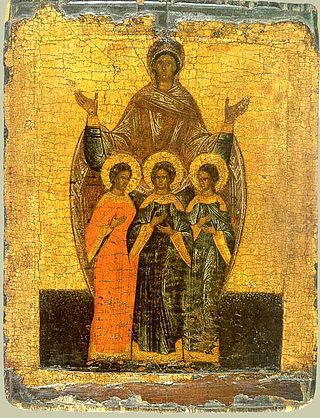 3
Saints Faith, Hope, and Charity, are a group of Christian martyred saints who are venerated together with their mother, Sophia ("Wisdom").
3
Saints Faith, Hope, and Charity, are a group of Christian martyred saints who are venerated together with their mother, Sophia ("Wisdom").
Ignacy Busza
 3
Ignacy Busza – oficer armii niemieckiej, powstaniec wielkopolski, porucznik Wojska Polskiego w II Rzeczypospolitej. Kawaler Orderu Virtuti Militari. Pośmiertnie mianowany kapitanem.
3
Ignacy Busza – oficer armii niemieckiej, powstaniec wielkopolski, porucznik Wojska Polskiego w II Rzeczypospolitej. Kawaler Orderu Virtuti Militari. Pośmiertnie mianowany kapitanem.
Nikodem Sulik-Sarnowski
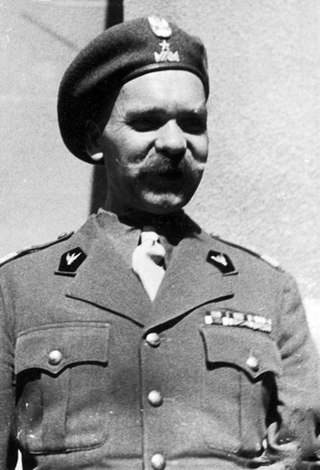 3
Nikodem Sulik-Sarnowski was an officer of the Russian Imperial Army, and Generał brygady of the Polish Army.
3
Nikodem Sulik-Sarnowski was an officer of the Russian Imperial Army, and Generał brygady of the Polish Army.
Matthew the Apostle
 3
Matthew the Apostle is named in the New Testament as one of the twelve apostles of Jesus. According to Christian traditions, he was also one of the four Evangelists as author of the Gospel of...
3
Matthew the Apostle is named in the New Testament as one of the twelve apostles of Jesus. According to Christian traditions, he was also one of the four Evangelists as author of the Gospel of...
Jude the Apostle
 3
Jude was one of the Twelve Apostles of Jesus according to the New Testament. He is generally identified as Thaddeus and is also variously called Judas Thaddaeus, Jude Thaddaeus, Jude of James, or...
3
Jude was one of the Twelve Apostles of Jesus according to the New Testament. He is generally identified as Thaddeus and is also variously called Judas Thaddaeus, Jude Thaddaeus, Jude of James, or...
Władysław Gębik
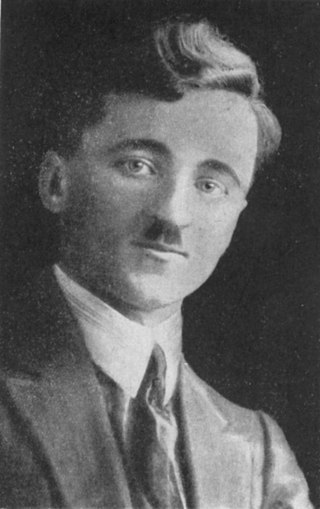 3
Władysław Gębik – doktor nauk filozoficznych, pedagog, pisarz, literat, działacz społeczno-kulturalny spod znaku Rodła, członek Związku Polaków w Niemczech, etnograf.
3
Władysław Gębik – doktor nauk filozoficznych, pedagog, pisarz, literat, działacz społeczno-kulturalny spod znaku Rodła, członek Związku Polaków w Niemczech, etnograf.
Michał Spisak
 3
Michał Spisak – polski kompozytor głównie utworów instrumentalnych, stanowiących przykład neoklasycyzmu.
3
Michał Spisak – polski kompozytor głównie utworów instrumentalnych, stanowiących przykład neoklasycyzmu.
Józef Patelski
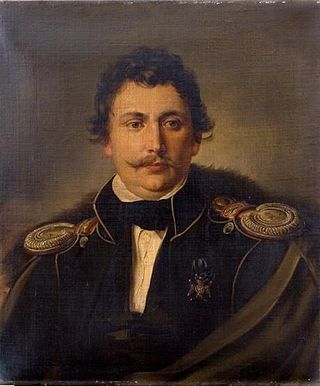 3
Józef Patelski – polski szlachcic i wojskowy, uczestnik powstania listopadowego odznaczony orderem Virtuti Militari oraz uczestnik powstania styczniowego.
3
Józef Patelski – polski szlachcic i wojskowy, uczestnik powstania listopadowego odznaczony orderem Virtuti Militari oraz uczestnik powstania styczniowego.
Stanisław Betlej
 3
Stanisław Ludwik Betlej ps. „Lampart” – polski żołnierz, kapitan piechoty Wojska Polskiego.
3
Stanisław Ludwik Betlej ps. „Lampart” – polski żołnierz, kapitan piechoty Wojska Polskiego.
Orpheus
 3
In Greek mythology, Orpheus was a Thracian bard, legendary musician and prophet. He was also a renowned poet and, according to the legend, travelled with Jason and the Argonauts in search of the...
3
In Greek mythology, Orpheus was a Thracian bard, legendary musician and prophet. He was also a renowned poet and, according to the legend, travelled with Jason and the Argonauts in search of the...
Tony Halik
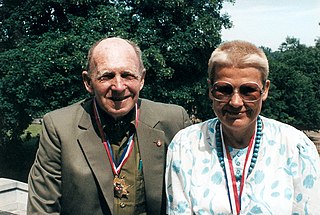 3
Tony Halik, born Mieczysław Antoni Sędzimir Halik was a Polish film operator, documentary film-maker, author of travel books, traveller, explorer, and polyglot.
3
Tony Halik, born Mieczysław Antoni Sędzimir Halik was a Polish film operator, documentary film-maker, author of travel books, traveller, explorer, and polyglot.
Maria Danilewicz-Zielińska
 3
Maria Danilewicz-Zielińska, z d. Markowska – polska pisarka, prozaiczka, krytyk literacki, bibliotekarka.
3
Maria Danilewicz-Zielińska, z d. Markowska – polska pisarka, prozaiczka, krytyk literacki, bibliotekarka.
John Lennon
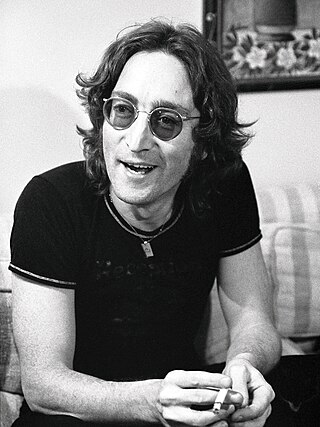 3
John Winston Ono Lennon was an English singer, songwriter and musician. He gained worldwide fame as the founder, co-songwriter, co-lead vocalist and rhythm guitarist of the Beatles. His work included...
3
John Winston Ono Lennon was an English singer, songwriter and musician. He gained worldwide fame as the founder, co-songwriter, co-lead vocalist and rhythm guitarist of the Beatles. His work included...
Adam Stefan Sapieha
 3
Prince Adam Stefan Stanisław Bonifacy Józef Cardinal Sapieha was a senior-ranking Polish prelate of the Catholic Church who served as Archbishop of Kraków from 1911 to 1951. Between 1922 and 1923, he...
3
Prince Adam Stefan Stanisław Bonifacy Józef Cardinal Sapieha was a senior-ranking Polish prelate of the Catholic Church who served as Archbishop of Kraków from 1911 to 1951. Between 1922 and 1923, he...
Jan Czochralski
 3
Jan Czochralski was a Polish chemist who invented the Czochralski method, which is used for growing single crystals and in the production of semiconductor wafers. It is still used in over 90 percent...
3
Jan Czochralski was a Polish chemist who invented the Czochralski method, which is used for growing single crystals and in the production of semiconductor wafers. It is still used in over 90 percent...
Ludwik Musioł
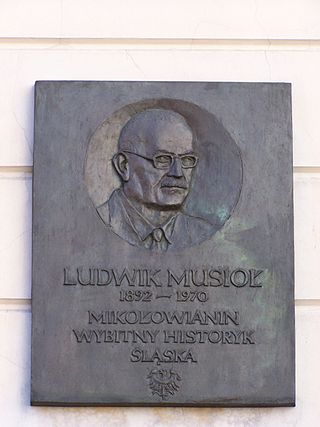 3
Ludwik Musioł – nauczyciel, wizytator, archiwista, historyk górnośląski, prekursor krajoznawstwa, historyk kultury oraz Kościoła katolickiego, lingwista, etnograf. Autor ponad 300 prac naukowych.
3
Ludwik Musioł – nauczyciel, wizytator, archiwista, historyk górnośląski, prekursor krajoznawstwa, historyk kultury oraz Kościoła katolickiego, lingwista, etnograf. Autor ponad 300 prac naukowych.
Karol Świerczewski
 3
Karol Wacław Świerczewski was a Polish and Soviet Red Army general and statesman. He was a Bolshevik Party member during the Russian Civil War and a Soviet officer in the wars fought abroad by the...
3
Karol Wacław Świerczewski was a Polish and Soviet Red Army general and statesman. He was a Bolshevik Party member during the Russian Civil War and a Soviet officer in the wars fought abroad by the...
Stanisław Herbst
 3
Stanisław Herbst was a Polish historian, researcher of modern history, and military historian. He was a professor at the University of Warsaw and the Dzerzhinsky Political-Military Academy in Warsaw,...
3
Stanisław Herbst was a Polish historian, researcher of modern history, and military historian. He was a professor at the University of Warsaw and the Dzerzhinsky Political-Military Academy in Warsaw,...
Kazimierz Grudzielski
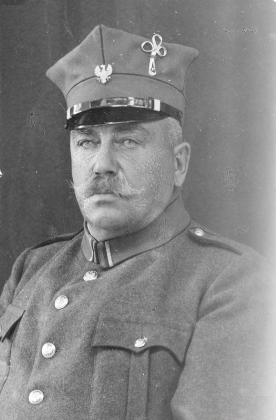 3
Kazimierz Grudzielski – generał porucznik Wojska Polskiego, działacz niepodległościowy, kawaler Orderu Virtuti Militari.
3
Kazimierz Grudzielski – generał porucznik Wojska Polskiego, działacz niepodległościowy, kawaler Orderu Virtuti Militari.
Krzysztof Kieślowski
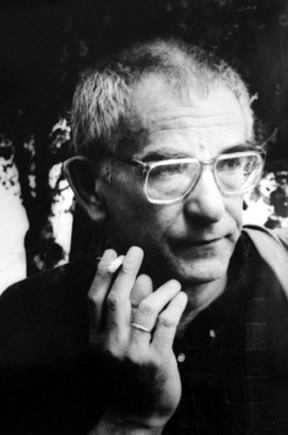 3
Krzysztof Kieślowski was a Polish film director and screenwriter. He is known internationally for Dekalog (1989), The Double Life of Veronique (1991), and the Three Colours trilogy (1993
–1994)....
3
Krzysztof Kieślowski was a Polish film director and screenwriter. He is known internationally for Dekalog (1989), The Double Life of Veronique (1991), and the Three Colours trilogy (1993
–1994)....
Anne of Green Gables
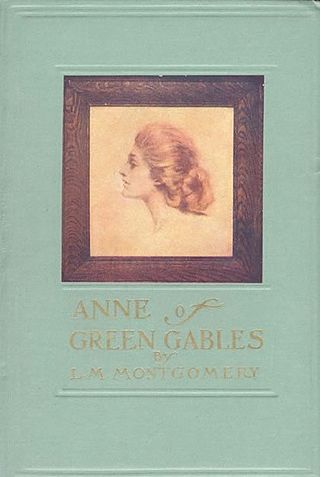 3
Anne of Green Gables is a 1908 novel by Canadian author Lucy Maud Montgomery. Written for all ages, it has been considered a classic children's novel since the mid-20th century. Set in the late 19th...
3
Anne of Green Gables is a 1908 novel by Canadian author Lucy Maud Montgomery. Written for all ages, it has been considered a classic children's novel since the mid-20th century. Set in the late 19th...
Kazimierz Drewnowski
 3
Kazimierz Bolesław Drewnowski – polski profesor, inżynier, rektor Politechniki Warszawskiej, pułkownik łączności Wojska Polskiego.
3
Kazimierz Bolesław Drewnowski – polski profesor, inżynier, rektor Politechniki Warszawskiej, pułkownik łączności Wojska Polskiego.
Teresa Remiszewska
 3
Teresa Remiszewska-Damsz – polska żeglarka, jachtowy kapitan żeglugi wielkiej, instruktorka żeglarstwa, harcmistrz Związku Harcerstwa Polskiego i członkini Rady Harcerskiego Kręgu Morskiego,...
3
Teresa Remiszewska-Damsz – polska żeglarka, jachtowy kapitan żeglugi wielkiej, instruktorka żeglarstwa, harcmistrz Związku Harcerstwa Polskiego i członkini Rady Harcerskiego Kręgu Morskiego,...
Józef Kałuża
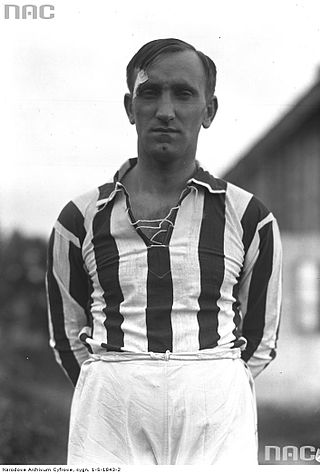 3
Józef Ignacy Kałuża was a Polish footballer and later coach, was one of the legends of Polish sports.
3
Józef Ignacy Kałuża was a Polish footballer and later coach, was one of the legends of Polish sports.
Ryszard Riedel
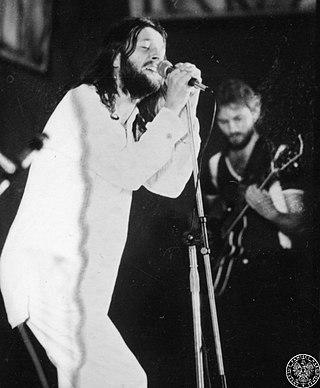 3
Ryszard Henryk Riedel was the original lead singer of blues-rock band Dżem. He is often regarded as one of the most popular and well known
Silesian vocalist, along with an occasional collaborator...
3
Ryszard Henryk Riedel was the original lead singer of blues-rock band Dżem. He is often regarded as one of the most popular and well known
Silesian vocalist, along with an occasional collaborator...
Gerhart Hauptmann
 3
Gerhart Johann Robert Hauptmann was a German dramatist and novelist. He is counted among the most important promoters of literary naturalism, though he integrated other styles into his work as well....
3
Gerhart Johann Robert Hauptmann was a German dramatist and novelist. He is counted among the most important promoters of literary naturalism, though he integrated other styles into his work as well....
Irena Szewińska
 3
Irena Szewińska was a Polish sprinter who was one of the world's foremost track athletes for nearly two decades, in multiple events. She is the only athlete in history, male or female, to have held...
3
Irena Szewińska was a Polish sprinter who was one of the world's foremost track athletes for nearly two decades, in multiple events. She is the only athlete in history, male or female, to have held...
Kazimierz Wiłkomirski
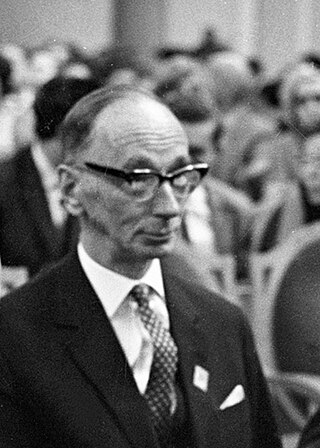 3
Kazimierz Wiłkomirski; was a Polish cellist, composer and conductor. Son of Alfred Wiłkomirski, brother of Maria Wiłkomirska, Wanda Wiłkomirska and violinist Michael Wilkomirski.
Graduate of the...
3
Kazimierz Wiłkomirski; was a Polish cellist, composer and conductor. Son of Alfred Wiłkomirski, brother of Maria Wiłkomirska, Wanda Wiłkomirska and violinist Michael Wilkomirski.
Graduate of the...
Nikola Tesla
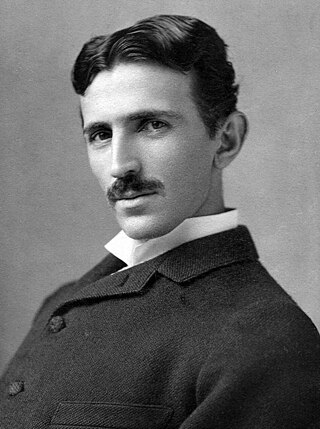 3
Nikola Tesla was a Serbian-American inventor, electrical engineer, mechanical engineer, and futurist. He is known for his contributions to the design of the modern alternating current (AC)...
3
Nikola Tesla was a Serbian-American inventor, electrical engineer, mechanical engineer, and futurist. He is known for his contributions to the design of the modern alternating current (AC)...
Jan Łaski
 3
Jan Łaski or Johannes à Lasco was a Polish Calvinist reformer. Owing to his influential work in England (1548–1553) during the English Reformation, he is known to the English-speaking world by the...
3
Jan Łaski or Johannes à Lasco was a Polish Calvinist reformer. Owing to his influential work in England (1548–1553) during the English Reformation, he is known to the English-speaking world by the...
Jan Žižka
 3
Jan Žižka z Trocnova a Kalicha was a Czech general who was a contemporary and follower of Jan Hus and a Radical Hussite and led the Taborites. Žižka was a successful military leader and is now a...
3
Jan Žižka z Trocnova a Kalicha was a Czech general who was a contemporary and follower of Jan Hus and a Radical Hussite and led the Taborites. Žižka was a successful military leader and is now a...
Maciej Kazimierz Sarbiewski
 3
Maciej Kazimierz Sarbiewski, was Europe's most prominent Latin poet of the 17th century, and a renowned theoretician of poetics.
3
Maciej Kazimierz Sarbiewski, was Europe's most prominent Latin poet of the 17th century, and a renowned theoretician of poetics.
Aleksander Bednarczyk
 3
Aleksander Bednarczyk, ps. „Adam” – żołnierz wojny obronnej 1939, członek Armii Krajowej, Zrzeszenia Wolność i Niezawisłość.
3
Aleksander Bednarczyk, ps. „Adam” – żołnierz wojny obronnej 1939, członek Armii Krajowej, Zrzeszenia Wolność i Niezawisłość.
Antonio Vivaldi
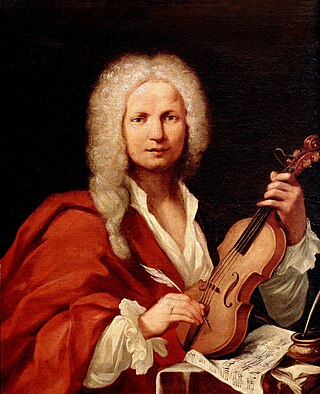 3
Antonio Lucio Vivaldi was an Italian composer, virtuoso violinist and impresario of Baroque music. Along with Johann Sebastian Bach and George Frideric Handel, Vivaldi ranks amongst the greatest...
3
Antonio Lucio Vivaldi was an Italian composer, virtuoso violinist and impresario of Baroque music. Along with Johann Sebastian Bach and George Frideric Handel, Vivaldi ranks amongst the greatest...
Anna of Masovia
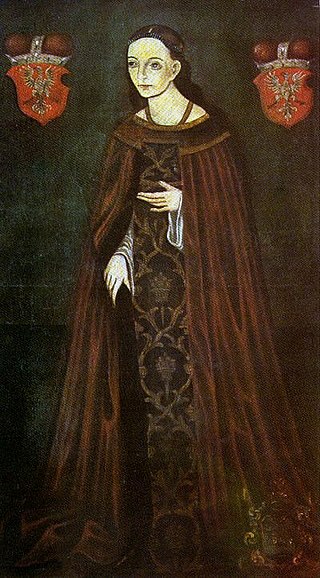 3
Anna of Masovia was a Polish princess, Titular Duchess of Masovia and the last representative of the Masovian branch of the Piast dynasty.
3
Anna of Masovia was a Polish princess, Titular Duchess of Masovia and the last representative of the Masovian branch of the Piast dynasty.
Antoni Serbeński
 3
Antoni Serbeński – polski malarz, grafik, pedagog.
3
Antoni Serbeński – polski malarz, grafik, pedagog.
Artur Malawski
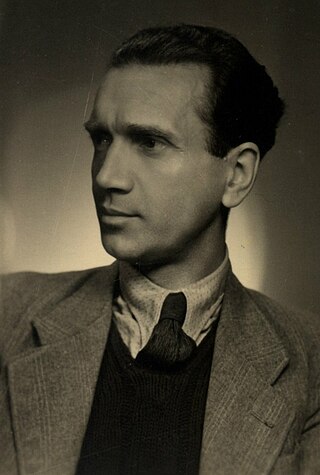 3
Artur Malawski – polski kompozytor, pedagog i dyrygent.
3
Artur Malawski – polski kompozytor, pedagog i dyrygent.
Marian Kukiel
 3
Marian Włodzimierz Kukiel was a Polish major general, historian, social and political activist.
3
Marian Włodzimierz Kukiel was a Polish major general, historian, social and political activist.
Józef Węgrzyn
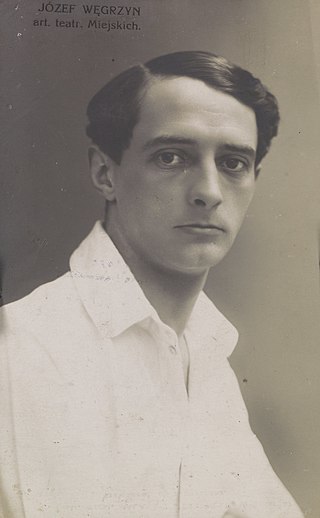 3
Józef Wegrzyn (1884–1952) was a Polish film actor.
3
Józef Wegrzyn (1884–1952) was a Polish film actor.
Gandalf
 3
Gandalf is a protagonist in J. R. R. Tolkien's novels The Hobbit and The Lord of the Rings. He is a wizard, one of the Istari order, and the leader of the Fellowship of the Ring. Tolkien took the...
3
Gandalf is a protagonist in J. R. R. Tolkien's novels The Hobbit and The Lord of the Rings. He is a wizard, one of the Istari order, and the leader of the Fellowship of the Ring. Tolkien took the...
Jacek Woszczerowicz
 3
Marian Jacek Woszczerowicz (1904–1970) was a Polish actor.
3
Marian Jacek Woszczerowicz (1904–1970) was a Polish actor.
Stanisław Szeptycki
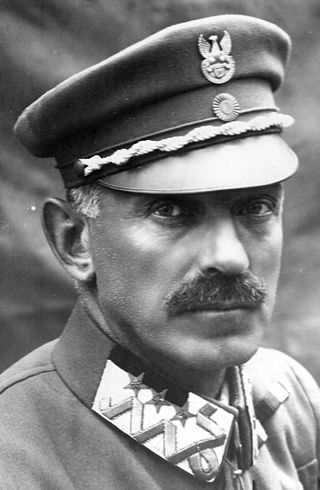 3
Stanisław Maria Jan Teofil Szeptycki was a Polish count, general and military commander.
3
Stanisław Maria Jan Teofil Szeptycki was a Polish count, general and military commander.
Olga Drahonowska-Małkowska
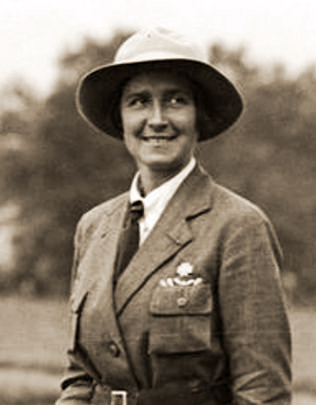 3
Olga Drahonowska-Małkowska, with her husband, founded scouting in Poland.
3
Olga Drahonowska-Małkowska, with her husband, founded scouting in Poland.
Stanisław Mastalerz
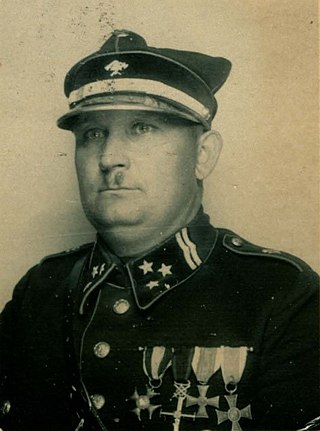 3
Stanisław Mastalerz, ps. Karol Gorczek, Wiktor Gans − kapitan piechoty Wojska Polskiego, działacz niepodległościowy, kawaler Orderu Virtuti Militari, uczestnik powstań śląskich.
3
Stanisław Mastalerz, ps. Karol Gorczek, Wiktor Gans − kapitan piechoty Wojska Polskiego, działacz niepodległościowy, kawaler Orderu Virtuti Militari, uczestnik powstań śląskich.
Jan Łangowski
 3
Jan Łangowski – dziennikarz, działacz Związku Polaków w Niemczech, autor głośnego "Memoriału dotyczącego praw ludności polskiej w Niemczech" z 1929 roku.
3
Jan Łangowski – dziennikarz, działacz Związku Polaków w Niemczech, autor głośnego "Memoriału dotyczącego praw ludności polskiej w Niemczech" z 1929 roku.